At Tuck, you create your own future. Through everyday encounters with people who inspire you, global experiences that expand your horizons, and activities that connect you to our community for life, Tuck offers an education as individual as each of its students. Discover the pathways others have taken and begin charting yours today.
Technology
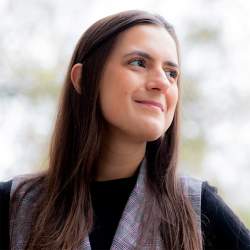
Thamires Mouta T’25
ON DECIDING TO PURSUE AN MBA
After five years at Santander—my first and only employer after college—I realized it was time to step outside of my comfort zone and pursue new growth opportunities. A highlight of that chapter was launching a digital lending fintech from the ground up in Uruguay, an experience that introduced me to technology and product development and sparked a lasting passion.
With an engineering background, I viewed the MBA as a way to complement my technical foundation with business thinking, leadership development, and exposure to global markets. Tuck stood out by offering all of that, within an immersive, close-knit environment.
RESOURCES LEVERAGED DURING MY MBA
The Center for Digital Strategies was pivotal during my two years at Tuck. As a Fellow, I had the opportunity to attend the Consumer Electronics Show (CES) 2025 in Las Vegas and engage in small-group dinners with alumni shaping the tech world—from social media moderation to gamification in AI. These experiences expanded my thinking and provided direct access to leaders innovating in real time.
I also cross-registered at the Thayer School of Engineering, where I took classes on generative AI and platform strategy. That cross-disciplinary experience helped sharpen both my technical fluency and strategic mindset, skills that are already shaping the next phase of my career.
ON TUCK’S UNIQUE LOCATION
Hanover was one of the key reasons I chose Tuck. As an international student, I wanted a truly immersive experience, not one where people disappeared into city life after class. At Tuck, everyone is present and engaged. We even share a school-wide social calendar, something hard to find at a bigger program.
The bonds we form here are incredibly strong. The Latin American Business Association (LABA), in particular, gave me a deep sense of community. In my second year, I lived at the Dojo—a house overlooking the Connecticut River passed down through generations of Latin American students. Daily dog walks in the woods and spontaneous hangouts made this chapter feel truly special and uniquely Tuck.
WHAT I’LL MISS MOST
What I’ll miss most is the serendipity: the unexpected hallway conversations, spontaneous study breaks, and long dinners that turn into deep conversations. But I’ll especially miss the time—time to think, to explore, to dive into emerging technologies like AI and teach myself how to build full-stack applications, something I never imagined doing before business school. Tuck gave me the breathing room to discover passions I didn’t even know I had, and the courage to pursue them. I’ll carry my Tuck experience forever.
Technology
Rio de Janeiro, Brazil
Industrial Engineering, Universidade Federal Fluminense
Santander Bank
Center for Digital Strategies Fellow, GenAI Student Champion, Latin American Business Association Co-chair, Magnuson Center for Entrepreneurship Student Leadership Board, Wine Club Co-chair
I participated in the India GIX program, studying “Mega Entrepreneurs in a Mega Market” with Professor Ramon Lecuona. I also joined Professor Lecuona on the Global Leadership Program in Kenya, where we worked closely with executives as they advanced their business projects.
McKinsey and Company
Competition and Cooperation in the 21st Century Global Economy, with Professor Emily Blanchard, and Data Analytics Project Lab, with Professor Geoffrey Parker
Two encounters stand out most:
First, the pre-MBA trip to Croatia with 30 strangers who would later become some of my closest friends at Tuck. They taught me to ski, loaned me winter clothes, and helped this Brazilian acclimate, literally and figuratively, to life in New Hampshire.
Second, participating in Tuck’s “river of life” tradition. Sharing my story with a classmate sparked one of the most meaningful connections of my time here—we became best friends, and eventually, partners.
The truth is, what I thought I’d gain from Tuck turned out to be very different from what I walked away with—and I mean that in the best way. I came in with a clear, structured plan. However, as I approached those goals, I realized they no longer fit. What Tuck gave me was more profound: curiosity, intellectual rigor, and the courage to pivot. I’m walking away with completely different dreams than I came in with, and that’s the most exciting part of all.
Consulting
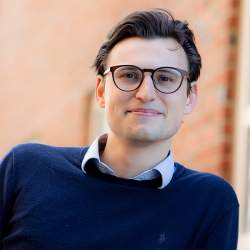
Maximilian Theodor Muennighoff T’25
WHY MBA?
I was a fellow at McKinsey in Berlin before entering graduate school. While I knew I wanted to return to McKinsey after graduation, my long-term vision has always been entrepreneurship – both due to family roots and my passion. At McKinsey, I've built a strong analytical foundation and learned to work in high-performing teams. However, transitioning from consultant to entrepreneur requires a fundamental mindset shift, moving from risk-aversion and perfectionism to embracing uncertainty and innovation.
The MBA/MEM dual degree at Tuck/Thayer offered the perfect opportunity to bridge this gap. Here, I can reflect on my leadership style, develop new skills, and connect with diverse perspectives from around the world. The program creates space to experiment, take risks, and build the entrepreneurial mindset I'll need for my future ventures, all while engaging with a vibrant community that challenges and supports me.
WHY TUCK?
Tuck's intimate and personal nature captivated me from my first visit to Hanover. The program's size creates an ideal learning environment, and small classes allow for deeper engagement with professors and genuine connections with classmates. In this collaborative setting, I'm developing both the entrepreneurial mindset and general management skills essential for my future aspirations.
Additionally, Dartmouth offers me the unique opportunity for me to pursue a dual degree with the Thayer School of Engineering. This combination allows me to complement my business perspective with technical expertise, a powerful combination for someone who aims to build innovative solutions and ventures in the future.
ON TUCK’S POWERFUL COMMUNITY
Through family and friends, I know most of the top business schools in the world. Hanover is not Boston or Chicago – but it is the perfect framework to make magic happen. And the magic happens among the members of this small community. Attending Tuck – for me – is an “all-in” decision: people who choose Tuck are explicitly signing up for a high level of engagement, intimacy and connection, creating a unique ecosystem of students, faculty and administration – a family. And it happens only at Dartmouth. And you will keep this family for life.
ON TUCK’S IMMERSIVE LOCATION
Tuck's location in Hanover is central to its transformative experience. The picturesque college town away from the city works as a filter—those who choose Tuck are deliberately opting for immersion over distraction, fully committing to their education and community.
Since few students have existing connections in Hanover and leaving requires effort, everyone invests deeply in building relationships within the community from day one. This geographic isolation becomes our greatest strength, forging bonds that would take years to develop elsewhere.
The location also transforms our educational experience. Visiting executives who come to co-teach typically stay for extended periods, creating organic opportunities for students to connect with industry leaders over meals or coffee. These intimate conversations simply wouldn't happen in a bustling city campus where executives rush in and out for their commitments.
MY ADVICE FOR FUTURE MBAS
My advice to prospective MBA students is deceptively simple but crucial: amid the whirlwind of activities, regularly reconnect with your original purpose for pursuing an MBA. Time at Tuck moves incredibly quickly, and it's easy to get swept up in the constant flow of coursework, events, and club commitments.
It is especially crucial to do this before you get to Tuck. Sit with yourself and reflect on what you enjoy doing and who you want to be in 5 years, 10 years, even 20 years from now. When you’ve done this, you can be intentional about prioritizing experiences that align with your aspirations. Then, take time each term to reflect on your progress toward your personal and professional goals. Stay focused on your 'why' even as you embrace all that Tuck has to offer.
Consulting
Munich/Germany
École Supérieure de Commerce de Paris (ESCP), BSc, Economics
Senior Consultant, McKinsey & Company
Tuck Europe, Tuck Admissions Associate
GIX in South Korea: exploration of world-class operations excellence; GIX in Vietnam: analysis of the economic transformation through “Renovation” reforms; PrimeRoots (first-year): assessment of new market entry
Executive intern to the founder and chairman at Parallel Wireless, Boston, MA (for Tuck); project manager, process improvement at Trillium Engineering, Portland, OR (for Thayer)
VC Practicum with Jim Feuille, an immersive course that puts you in the investor's seat. It delivers real-world experience as startups pitch directly to you, and VC partners challenge your due diligence work
Professor Ramon Lecuona Torres: for his mentorship; Professor Emily Blanchard: the most outstanding economics teacher; Steve Janko T’16 and Alex Dichter T’99 for their support in my transition to McKinsey Boston; Alex Schwoerer T’02 for being an outstanding Tuck alum; the Tuck 2025 class: a group of extraordinary individuals
Senior Consultant at McKinsey & Company, Boston
Tuck and the general Dartmouth community have transformed me both personally and professionally. Personally, I have become a more mature, reflective, and independent member and leader within my community. Professionally, I have been able to refine my toolbox with relevant skills such as financial analysis, operational improvement, product development—all based on interactive case studies, study groups, and study trips nationally and internationally.
Public Sector
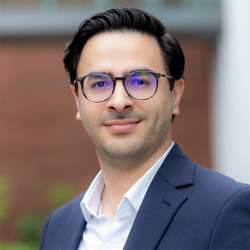
Emilio Rosillo T’25
ON CHOOSING TUCK
Applying to Tuck was a deliberate and thoughtful decision. I wanted a top MBA program that offered a balance of academic excellence, access to world-class faculty, and a highly personalized experience alongside just 299 classmates. Tuck’s unique location in the woods fosters a strong sense of community, making the learning journey not just intellectually rigorous but personally transformative. What truly set Tuck apart were its opportunities for applied learning. Through programs like the First-Year Project, the ESG Fund, Nonprofit Board of Fellows, and the Center for Business, Government & Society, among others, I was able to gain hands-on experience across industries, diversify my professional background, and explore new sectors—all with the mentorship of faculty and industry leaders. Tuck offered not just an education, but a full immersion into growth and discovery.
HOW I’LL USE MY MBA
I pursued an MBA to build new skills and strengthen existing ones, particularly in strategy, finance, and leadership. I plan to apply these capabilities to support the development and implementation of monetary policy in Mexico, working within a high-performing operations team at the central bank. I aspire to contribute thoughtfully to Mexico’s economic and financial stability while continuing to grow as a leader committed to public service. Over time, I hope to build a career at the intersection of finance, policy, and global impact.
HIGHLIGHTS OF MY TUCK EXPERIENCE
One of the most transformative and inspiring experiences at Tuck was the Global Insight Expedition (GIX) to India. Working with a highly engaged group of classmates, alumni, and professors, I explored financial services in emerging markets—a fast-growing and increasingly sophisticated sector. We met with a range of stakeholders, from rural self-lending communities to microfinance executives and VC investors. A standout moment was visiting a rural lending group outside Chennai, led by women who organized and ensured access to capital in areas underserved by banks. Along with this, our conversations with entrepreneurs and industry leaders provided access and insight into the depths of the structural and technical complexities, allowing us to question how we could replicate this model in other economies—a once-in-a-lifetime opportunity.
ON RESOURCES I’VE LEVERAGED AT TUCK
Tuck offers an extraordinary range of resources, which makes it essential to be intentional about where to focus your time and energy to truly maximize the experience. I took full advantage of opportunities such as the View from the Top series hosted by the Center for Business, Government & Society (CBGS) and the Visiting Executive Program talks—both of which allowed me to learn from and connect with accomplished industry leaders. The small-group lunches organized around these visits created an even closer setting, where, beyond learning about professional experiences, I could hear personal stories and life lessons from people who have achieved extraordinary careers. Additionally, as a Fellow for the CBGS, I had the opportunity to represent Tuck at conferences in Boston, New York, and Chicago alongside other MBA programs. These experiences enabled me to strengthen bonds both within and beyond the Tuck community, broadening my perspective on leadership and impact across various industries.
ON WHAT MAKES THE TUCK COMMUNITY DISTINCT
Tuck’s strong sense of community and commitment to service are what truly set it apart. With a small class size and a fully immersive experience, Tuck fosters authentic, supportive relationships that extend beyond the classroom. Students are deeply invested in one another’s success, creating a collaborative and trusting environment that is rare among business schools.
This culture helps build not just a professional network but lifelong friendships grounded in trust, empathy, and shared values. At Tuck, you grow not only as a leader but as a person, ready to make a lasting impact in whatever path you choose.
Public Sector
Mexico City, Mexico
Tec de Monterrey, BA, Economics and Finance
Head of Financial Planning in Foreign Currency, Bank of Mexico
Tuck ESG Fund, Co-Director; Center for Business, Government & Society Fellow; Nonprofit Board Fellow (NPBF); Tuck Mentor
My First-Year Project (FYP) experience developing a go-to-market strategy for a plant-based meat company in California; my participation in the ESG Fund, evaluating the portfolio, pitching, and investing in new stocks; and my Global Insight Expedition (GIX) trip exploring the financial services industry in India.
Investment Intern, Bay Partners
Strategy in Emerging Markets with Professor Ramón Lecuona, Real Estate with Professor Brian Melzer, Negotiations with Aram Donigian, and Leadership in the Global Economy with Dean Slaughter.
View from the Top speaker series with Susan Collins, president and the Federal Reserve Bank of Boston as well as Chris Kempczinski, CEO of McDonald’s; serving as a Nonprofit Board Fellow; attending the Golub Capital Conference Trip in Chicago
Bank of Mexico
At Tuck, I experienced a profound personal and professional transformation. Through a close-knit community and applied learning, I had the opportunity to broaden my horizons both geographically and intellectually, across various industries. This transformational journey helped me grow into a more prepared, assertive, and empathetic person, ready to take on future leadership challenges with purpose and perspective.
Consulting

Apeksha Atal T’25
WHY MBA?
My path makes more sense when you connect the dots backwards. Over the past 10 years or so I’ve gone from studying Biology and English, to teaching English in Rural Thailand, to climbing my way through a startup in India, to finally finding myself in Hanover. It took a while, but I finally figured out business was where I could best apply myself. I’ve always been analytical, and through my education and work experience have developed a love for problem solving, working with people, and making an impact.
When I found myself wanting a change, not just in job, but in country, industry, and environment, an MBA made a lot of sense. I wanted to build a foundation in business fundamentals, grow a network, and look beyond India and Thailand. I also wanted to press pause on work and give myself room to grow as a person.
While I sometimes wish I had figured it out earlier, I do believe that the time I spent meandering worked in my favor, giving me lots of great experience to apply to Tuck with and share in the classroom.
ON TUCK’S GLOBAL FOCUS
Having lived and worked around the world, it was very important to me to join an MBA program that had a clear global focus, and Tuck really delivered on this for me. The network I’ve forged over the past two years is full of individuals from different backgrounds, all of whom bring diverse perspectives to the table.
In class, we talk about businesses and economies all over the world, often with people (classmates, guests, or professors) with experience in these geographies. Beyond the classroom, it’s been awesome to take the global focus to another level through Global Insight Expeditions and other trips I’ve taken during my time at Tuck.
My GIX was to South Korea, a country that had been discussed in classes like Managing People and Growth Economics. On this trip, we not only peeked under the hood of businesses ranging from skincare to industrial manufacturing, but also got to experience first-hand the customs and culture of this country, and hear the voices of the individuals that had lived what we had read about just months before.
Without such experiences, it is difficult to envision how businesses (and the people who run them) truly operate in other parts of the world. What’s on paper often looks very different in person. I am so grateful for what I’ve been able to experience during my two years here.
ON TUCK’S ACADEMIC EXPERIENCE
I came to Tuck for the core curriculum. The core is such a great way to not only build a strong foundation in business fundamentals, but also to get to know your classmates and hear their experiences in the context of key subjects. In the core and beyond, there is a healthy mix of case method and lecture-style teaching, which is great for different types of learners and different levels of experience. Our class size is small enough that you can really get to know your professors, both in and outside the classroom, and our professors are so passionate about what they teach that it resonates in their material. I’ve loved the mix of electives, and the fact that so many professors have been excited to talk to me about further questions and pursuits that their classes have inspired. In fact, I’ve even gotten the chance to work with professors on some of the material they’ve developed for class, which has been an incredible honor and learning experience.
ON COMMUNITY AND RECRUITING
I think most people know, when they apply to Tuck, that the sense of community here is exceptional. To have lived it, however, is really something else. I felt it most strongly during the consulting recruitment process. I had two second year mentors and plenty of others who were willing to do mock case interviews with me, a full curriculum laid out by past Consulting Club members that helped me learn how to interview, alumni at various firms excited to talk to me, and, of course, peers in my own class that I was prepping alongside. To say we support each other here is an understatement, we uplift, encourage and challenge each other. This of course extends well beyond recruiting, but to feel the power of the Tuck community so early in my first year, in what could have been a cut-throat environment, was amazing
ON TUCK’S UNIQUE LOCATION
Leaving my comfort zone at business school wasn’t just about academics or recruiting. A lot of it, actually, had to do with activities that come with a life in the Upper Valley. I am a city girl, and so the idea of ice hockey, skiing, hiking, canoeing, and everything in between, was a little overwhelming at first. That being said, after some nudges from classmates, I can happily report that these activities became important parts of my experience at Tuck, not only because of the friends I made while partaking, but also because of how I was pushed to get comfortable with being a humble beginner at something at this stage of my life, and get excited about starting at square one, stumbling as I was.
In fact, I remember my first tripod hockey game, we played at Thompson Arena: I was my team’s goalie, and I had never set foot on the ice before. Moments after getting dragged into the goal by my teammates, I attempted to stand up and found myself slipping and falling on my back. Fortunately, I was wearing so much padding that I didn’t get hurt, but I was like a turtle on my back and incredibly annoyed. I started yelling “flip me!” and after what felt like an eternity, two of my teammates came and helped me up. They gave me a thumbs up and shortly after, I blocked my first goal. We lost, but I felt like I had won, just a little.
Consulting
Portland, OR; Bengaluru, India
Carnegie Mellon University, BS, Biology, BA, English Studies
Fulbright Thailand (Fulbright Scholar), Niyo Solutions Inc. (roles in Marketing, Strategy, Communications, and HR)
Student Board, Quality of Life Chair; Tuck Pride Co-Chair; SABA Co-Chair, Tuck Admissions Associate; Initiative on Workplace Inclusion Fellow; Women in Business, Newsletter Co-Chair; Teaching Assistant (Marketing and Managerial Economics); Peer Support Counselor (MHWI)
First Year Project: US-ASEAN Business Council, recommending strategies to improve revenue and reach new customers
GIX to South Korea: Visited Seoul and Ulsan to explore industries ranging from skincare to car manufacturing through an Operations lens
Summer Consultant, BCG Boston
Current Issues in Global Food Systems, Cost and Control, Strategy in Emerging Markets, Communicating with Presence
Visiting VC firms in Bengaluru, India with Professor Ramon Lecuona during winter break was impactful—I enjoyed accompanying a professor in the field and hearing conversations that were relevant to both my career and the Strategy in Emerging Markets course; Designing a Tuck SABA sweatshirt that was full of hand-drawn symbols from all over South Asia and seeing people wear it around campus.; Student-led treks—including one I helped co-lead to India;
Consultant, BCG Boston
Coming from a Humanities and STEM background, the world of business felt alien (perhaps even intimating) to me; Tuck changed this for me. Through experiences both in and out of the classroom, Tuck has helped me see every challenge as a puzzle to be solved, and experience and appreciate the power of humanity in the world of business. Today, I feel like I’m standing on the shoulders of many Tuck alumni and am able to see my future a bit clearer, all while bringing my authentic self to the table.
Health Care
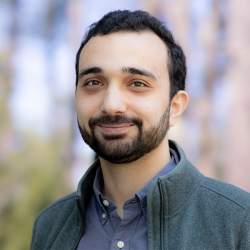
Amirali Yousefli T’25
ON DECIDING TO PURSUE AN MBA
My path to an MBA was deeply rooted in my personal experiences with health care systems across several countries. After witnessing my father battle cancer three times and working on the frontlines during the COVID-19 pandemic, I recognized that scientific expertise alone wasn’t enough to drive meaningful improvement in patient outcomes. While working in pharmaceutical R&D and quality assurance, I observed how business decisions significantly impacted health care. I realized that to truly bridge the gap between scientific innovation and effective health-care delivery, I needed to develop strategic business acumen alongside my technical knowledge. The MBA represented not just a degree, but a transformative experience that would allow me to operate at the intersection of health care, business, and technology—ultimately enabling me to fulfill my mission of dedicating my career to health care and positively impacting patient outcomes.
ON CHOOSING TUCK
From my first interaction with Tuck students, I felt an immediate sense of belonging that reminded me of the close bonds I had formed during my challenging teenage years. The school’s intimate setting and collaborative culture appealed to me as someone who had navigated multiple cultural transitions throughout my life. My conversations with T’23s and T’24s revealed a community where people genuinely cared about each other’s growth and success. Interestingly, I almost didn’t submit my application—believing my chances were slim, I envied those who would attend Tuck but doubted I could be among them. Just minutes before the deadline, I decided that even with limited chances, I needed to try. What truly set Tuck apart was the unique opportunity to pursue a joint MBA/MPH with the Geisel School of Medicine—a perfect alignment with my vision of integrating business strategy with health-care innovation. The school’s emphasis on personal growth resonated deeply with my journey of resilience and transformation across geographical and ideological borders.
HIGHLIGHTS OF MY TUCK MBA EXPERIENCE
The Global Insights Expedition (GIX) to India with Professor Ramon Torras stands as a defining highlight of my Tuck journey. Immersing myself in India’s remarkably innovative health care system opened my eyes to extraordinary resourcefulness under constraints. Being welcomed as a guest in households across Chennai—from urban slums to downtown neighborhoods—provided intimate insights into how families navigate their health needs with limited resources. These personal interactions revealed health care innovation at its most fundamental level, where necessity truly becomes the mother of invention. Equally transformative was our Alabama trip with the Initiative on Workplace Inclusion (IWI). Walking through the National Memorial for Peace and Justice with Professor Ella Bell created a profound emotional impact that textbooks could never replicate. Visiting museums and historic sites central to the civil rights movement helped me understand the complex struggle for racial justice in ways that transcended my previous international perspective. These immersive experiences expanded my understanding of health care beyond clinical settings to encompass the social determinants and historical contexts that shape health outcomes across communities. Both journeys—exploring health care innovation in Chennai and confronting the aching history in Alabama—embodied Tuck’s commitment to developing leaders with a global perspective and moral awareness.
ON TUCK’S LEARNING ENVIRONMENT
The academic experience at Tuck seamlessly blends rigorous theoretical frameworks with practical, real-world applications—creating a distinctive learning environment that prepares students for immediate impact. Taking Startup Strategizing with Professor Hart Posen exemplifies this approach and stands out as a transformative academic experience. The course provided invaluable insights into how founders should identify problems of value and address market gaps, which proved remarkably applicable during my summer internship with Molecular You, a precision medicine startup. The concepts we explored in class directly informed my strategic work, allowing me to contribute meaningfully from day one.
What makes Tuck’s learning environment truly special is how it creates full-circle moments that connect classroom learning with professional practice. In my second year, I had the privilege of serving as a Teaching Assistant for the same Startup Strategizing course. This opportunity allowed me to craft a case study about Molecular You, which was subsequently used to teach current students. The experience culminated in inviting Jim Kean T’91, CEO of Molecular You, as a guest speaker in the class. Witnessing students engage with the case I had written while learning directly from the company’s leader represented a perfect synthesis of Tuck’s academic rigor and real-world relevance. This full-circle journey—from student to practitioner to teacher—epitomizes the transformative learning environment that makes Tuck exceptional.
ADVICE FOR PROSPECTIVE MBA STUDENTS
Knowing yourself through deep reflection on who you are and what you need will guide you toward determining if Tuck would be a great fit for your journey. Be intentional about your choice—this decision deserves deliberate consideration beyond rankings or perceived prestige. For future students who will attend Tuck, I relay the advice that was given to me: these two years will fly by with remarkable speed, and you’ll need to intentionally choose your path at Tuck. It might be challenging to decline certain events or opportunities, but staying true to your goals and prioritizing your objectives will ultimately pay dividends.
Make friends and fully immerse yourself in the community—you will find your people here. Perhaps most importantly, be authentic and show vulnerability, as that openness creates space for others to be vulnerable as well, building the essential foundation of trust that defines the Tuck experience. The relationships you develop here can only reach their full depth and meaning when you bring your whole self to each interaction. In a place as intimate as Hanover, your willingness to be genuine will not only enhance your own experience but will contribute to the transformative journey of your classmates as well.
WHAT I’LL MISS MOST
After Tuck, I will deeply miss the unique community that fostered both professional growth and profound friendships. I’ll miss the faculty who transcended traditional professor roles to become trusted mentors and advisors. Perhaps most significantly, I’ll miss the profound sense of belonging that Tuck cultivated. As someone who has navigated multiple cultural transitions, finding a community that embraced my full journey was transformative. The close-knit nature of Tuck turned classmates into confidants who supported each other through professional challenges and personal milestones alike. While I know these connections will endure beyond Hanover, the daily presence of this extraordinary community is irreplaceable.
Health Care, Pharma
Winnipeg, Canada; Mashhad, Iran
University of Manitoba, Bachelor of Science, Biology, Chemistry
Molecular You, AI scientist; Cardinal Health, quality assurance senior specialist; Apotex, R&D scientist
Tuck Center for Health Care Fellow; Co-Chair, Low Income & First-Generation Students at Tuck (LIFT); Startup Advisor, B-ALIVE; Pro Bono Consultant, Windham Aging (nonprofit)
Capstone Project: AI Integration in Clinical Workflow; Independent Study on LLM Applications in Health Care; Health Care Strategy Analyst for Rural Hospital at Home program at Dartmouth-Hitchcock Health System (First-Year Project)
strategy & commercialization summer associate, Molecular You
Startup Strategizing with Professor Hart Posen; Product Management in Technology with Professor Peter Chiu; Contemporary Issues in Biotech with Professor Kirsten Detrick
Alabama Trip with Tuck Initiative on Workplace Inclusion (IWI) visiting National Memorial for Peace and Justice; Lenhardt Leadership Challenge with Jim Creighton; India Global Insights Expedition with Professor Ramon Torras
My Tuck transformation integrated my fragmented identities—the scientific researcher, the immigrant, and the son who witnessed health care’s limitations. At Tuck, I unified these dimensions into an authentic servant leadership identity, discovering that my cross-cultural perspective and personal health care journey were central to my professional value, not peripheral. Faculty mentors and diverse classmates helped me reimagine how my unique background could drive health care innovation. Beyond business acumen, I now carry a coherent story connecting my past experiences to my future impact, giving me confidence to pursue solutions at the intersection of AI, business strategy, and health care delivery.
Real Estate
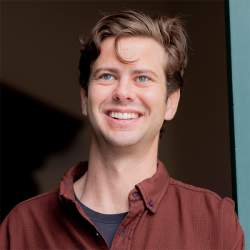
Harley Mayoff T’25
WHY MBA
I pursued an MBA for a variety of reasons—from personal growth to career exploration. What ultimately prompted the decision, though, was a desire to supercharge my transition from law to real estate development. I believed business school would equip me with the finance skills, strategic frameworks, and network needed to accelerate that pivot.
WHY TUCK
My decision to go to Tuck caught me by surprise. I had already paid my deposit at a peer school and genuinely believed that’s where I was headed. But when I received my offer from Tuck and an invitation to Admitted Students’ Weekend, I figured—why not? At worst, it would be a fun weekend in the mountains. The experience turned into a whirlwind. I felt the closeness and connection that others had tried to describe. At Tuck, connection to people and to place isn’t just marketing—it’s built into the experience. I realized I didn’t want an MBA that I’d weave into my life part-time. I wanted one that would fully immerse me—a Tuck MBA.
HIGHLIGHTS FROM MY TUCK MBA EXPERIENCE
One highlight of my Tuck experience was traveling to Boulder, Colorado, with my First-Year Project (FYP) team to visit our client, Viver Properties. Viver was founded by Karlston Nasser T’06, inspired by his own challenges finding housing for his son at CU Boulder. Being on the ground—comparing Viver houses to non-Viver ones, touring neighborhoods, and meeting with local stakeholders—gave us insights we never could have gotten from behind a laptop. It was a great reminder of how powerful it is to be there.
Equally meaningful were the relationships we built. We grew close with Karlston and his key team member, Nicolas, over the course of sunrise hikes, ping pong tournaments, and visits to local breweries. A true highlight was when Karlston welcomed us into his home, introduced us to his family, and served us homemade pizza from his backyard oven. It was one of those moments where professional lines blur in the best way—where you connect deeply over shared values, mutual respect, and, in this case, a love of craft beer.
ON TUCK’S ACADEMIC EXPERIENCE
The academic experience at Tuck is defined by mutual respect, trust, and a shared commitment to growth. Everyone comes here to stretch—to take risks, try new things, and push beyond their comfort zones. That only works because the community is all-in. There’s a collective understanding that experimentation, vulnerability, and even failure are part of the process. What makes Tuck unique is how deeply invested people are in each other’s development. That co-investment—between students, faculty, and staff—creates a learning environment that feels both challenging and safe. It’s not just about mastering material; it’s about learning to lead through ambiguity, risk, and discomfort.
Communicating with Presence, taught by Dartmouth theater professor James Rice, is a perfect example of this in action. The course draws from the craft of the stage actor and is the only business school class I know of that requires students to perform a fairy tale—complete with character voices. As unusual as it sounds, it created a space where I could stretch in ways I never expected. That kind of practice gave me the tools and courage to show up when I recently was called upon to speak in front of a large audience during a moment that was emotionally weighty and deeply personal, I was able to deliver the message and impact that I needed to. And that, more than anything, speaks to the kind of growth Tuck makes possible.
Real Estate Development
Montreal, Quebec, Canada
McGill University, Juris Doctor and Bachelor of Civil Law
Associate, Mergers and Acquisitions Group at Stikeman Elliott LLP
Co-President, Jewish Students’ Association; Co-President, Real Estate Club; Teacher’s Assistant—Accounting, Managing People, and Real Estate
First-Year-Project: Collaborated with Viver Properties to develop a fund strategy for scattered-site student housing; Taiwan Global Insight Expedition: Studied Taiwan’s economic success story and the role of strategic support in critical industries like semiconductors; Community Consulting: Partnered with the Sunapee Heritage Alliance to explore revenue-generating uses of a historic landmark, aiming to fund its preservation through community-oriented solutions like co-working space, event rentals, or a small business storefront.
Development Summer Associate at The Allen Morris Company (Miami, FL)
Cost and Control with Professor Joseph Gerakos; Corporate Valuation with Professor Anant Sundaram; Entrepreneurial Finance with Professor Morten Sorensen; Structuring Mergers and Acquisitions with Professor Karin Thorburn; and Real Estate with Professor Brian T. Melzer.
Tuck’s alumni network opened doors to lasting relationships with real estate leaders, including Charlie Humphreys T’17, Todd Liker T’00, and Dartmouth alumni David Donato and Michael Salzhauer.
Associate, Office of the President, The Allen Morris Company
More than any technical skill or business framework, Tuck has taught me how to lean into the power of a team. Tuck is full of impressive individuals—but even more impressive teams. Over these two years, I’ve transformed how I lead, collaborate, and build teams—and I leave Tuck confident in my ability to carry that forward into whatever personal or professional challenges come next.
Consulting

Alison Nordell T’25
HIGHLIGHTS OF MY TUCK MBA EXPERIENCE
Truly, there are too many to choose from! Each week brings new experiences, deeper connections, and little triumphs, from witnessing your classmates succeed, winning a hockey game, or realizing you’ve stretched into opportunities beyond your old limits and are still standing tall, ready for the next challenge.
Many of the greatest moments were just that: mere moments. Hosting a Small Group Dinner and sharing stories with classmates you had never met before. Uphill ski laps at the Dartmouth Skiway, sharing sweaty, steady steps and words of encouragement as the group chases the sunrise. Singing your heart out with the crowd as your classmates perform in the Tuck Band, everyone’s eyes alight and jaws dropped in awe of our talented friends. Mentoring Olympic athletes and retired veterans in Tuck’s Next Step MBA program, exchanging lessons learned from disparate life experiences, yet similar shared values. Listening to visiting executives reiterate how non-linear their career paths have been, how they too faced uncertainty and failure, and learned to lean in. Tripod Hockey games late at night, the adrenaline from a close win, or the joy from a new skater’s bravery keeping you awake long after leaving the ice. Tuck Community Bike rides with professors and peers through the rolling hills of forest and farmland of the Upper Valley. The first warm day of spring, everyone sitting outside drinking in the sunshine, faces drawn up, impossible not to smile.
ON TUCK’S LEARNING ENVIRONMENT
One of my regrets from college was how little I knew my professors, so when I was considering MBA programs, I knew I wanted a school that enabled students, faculty, and staff to interact as members of the community together. Here at Tuck, I’ve had the privilege of taking courses from world-class instructors who are all dynamic educators and seasoned practitioners, and I’ve had the pleasure of getting to know them outside the classroom, too! Some stand-out experiences include discussing (over beers) the effect of U.S. tariffs on international relations with economics professor Emily Blanchard, former U.S. chief economist; cycling with Ken French, of the Fama-French three-factor financial model, and Joe Hall, Senior Associate Dean of Teaching and Learning, during a Tuck Community Ride; beating my real estate finance professor Brian Melzer on the ice during a Tripod Hockey game this winter; the list goes on.
It's so clear that Tuck professors care deeply about their students, about fostering an environment of curiosity and creative dissent, and about sharing the passion behind their research and curricula. A course that really changed my perspective was Leading Diverse Organizations with professor Sonya Mishra. My key takeaway? That championing diversity in teams not only aligns with my values, but it’s also just good business strategy. Teams comprised of people who look and think differently from each other outperform traditionally homogenous groups. I am grateful to have had two years learning from professors (and peers) whose life experiences, backgrounds, interests, and goals are incredibly different than mine.
ON TUCK’S UNIQUE LOCATION
As we Tuckies fondly say, we’re “out here in the woods.” Life in Hanover, NH is very different from life in Boston, New York, San Francisco, Mumbai, Tokyo, Lagos, Shanghai, London, or Lima. You can see the stars, hear the birds, breathe clean air, and feel the wind bringing warm rain or soft snow. The quiet can be unnerving for people who have never lived outside of big cities. But this is the beauty of the Tuck experience. Each student has chosen to come spend two years away in this tight-knit community. It’s not just a two-year break from a job; it’s an intentional step out of the fast-paced lives most of us have always lived, a commitment to something unfamiliar, to something we choose to share. At any school, you will see your classmates during the week; here at Tuck, we see each other on the weekends, too. Tuck’s intimate location creates bonds that transcend the two years spent together in the woods—it fosters a support system for life.
LESSONS THAT WILL STAY WITH ME
One of the simplest lessons I learned here as a student at Tuck has also been one of the most impactful in my life beyond the classroom. A key concept from our Operations class during the first year is that 70 percent utilization of resources yields the highest output over the longest horizon. Beyond the business application of this insight—proof of which we calculated in countless scenarios and read testimonials in company cases from a variety of industries—it made me think about my own life. I tend to run at 100 percent utilization, so to speak. On any given day, my schedule is packed from dawn to dusk with classes, meetings, errands, workouts, events, etc. I want to do it all! But though I have cherished the opportunity to be integrated in countless elements of this Tuck community, I have also learned I am a better friend, leader, and learner when I build in buffer time. We can all do better by this. Remember to invite stillness into each day. You might find—as I have—that it’s often the quiet moments that bring clarity for whatever you tackle next.
ADVICE FOR PROSPECTIVE MBA STUDENTS
If you are considering an MBA, I cannot emphasize enough the importance of pressure-testing your reason why and cultivating confidence in that purpose. You deserve the opportunity to gift yourself optionality for life. That’s what a business degree brings. New perspectives, new horizons, new skills, new connections. Yes, all the newness brings plenty of uncertainty, but don’t balk at this. Lean into the possibility of it all. Be brave! Surprise yourself! If you are at all curious, ask more questions. If you are unsure about applying, take the risk. And if you are nervous to accept an offer, take the leap. If your reason why excites you and feels true to who you are, then no matter what happens, you’ll end up where you’re meant to be. You’ll learn something new about yourself and about the world, and that’s never a waste.
Cleveland, OH
Yale University, Bachelor of Arts, American Studies
Kantar Consulting, Brand Strategy
Student Board – Class President; Business Bridge Fellow; Next Step Fellow; Tripod Hockey Captain; TA for Marketing and Corporate Communications; Tuck Band
Early-Stage Project with Spring & Mulberry; First-Year Project with WestView Partners; Japan Global Insight Expedition (GIX)
Maine Venture Fund Summer Associate; Strategic Operations at BlueTrace
Communicating with Presence with Professor James Rice; Strategy in Emerging Markets with Professor Ramon Lecona Torras; Leading Diverse Organizations with Professor Sonya Mishra
Mentoring participants in Tuck Executive Education’s Next Step program; Bike ride with Ken French (of the Fama-French Investing Model)
At Tuck, I’ve been able to be multidimensional in ways that I had never dreamed before. I’ve developed new hobbies and life-long interests, learned to think differently about solving problems, and come to trust that my ability to lead with empathy and vulnerability is a strength, not a weakness.
Consulting
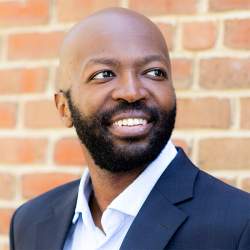
Fred Kamuzinzi T’25
ON CHOOSING TUCK
When deciding to pursue an MBA, my wife, Jill Kamuzinzi T’25, and I spent a great deal of time thinking about what type of environment might best support our personal and professional goals. We knew we wanted to be in a small, tight-knit community where we could create meaningful connections and feel a sense of belonging. We also wanted our MBA experience to be in a place where our daughter could enjoy her life and thrive. Looking back, we feel that we made the perfect decision.
HIGHLIGHTS OF MY TUCK MBA EXPERIENCE
Reflecting on highlights of my Tuck experience, one thing that immediately comes to mind is my First-Year Project (FYP). I was able to work on a project in Uganda and Rwanda, where I am from, which I hope to scale to provide broader agricultural solutions. Outside of the FYP, my involvement in clubs such as Consortium and Glen Tuck were also standout experiences. The Consortium, an alliance of some of the world’s leading graduate business schools and business organizations, provided a strong and supportive community of friends who share similar values and aspirations. Meanwhile, Glen Tuck provided a mental break in the middle of the week to enjoy whiskey and catch up with friends, or make new ones.
ON TUCK’S LEARNING ENVIRONMENT
There are very few, if any, classes that I did not enjoy. It is difficult not to enjoy a course when all professors are extremely passionate and knowledgeable about their specific interest areas.
ON TUCK’S UNIQUE COMMUNITY
Tuck is a place where everyone is genuinely in it together. People stop, listen, and help—no matter how busy they are. When I applied, I reached out to over five alumni and got a 100 percent response rate. That speaks to the trust-based, tight-knit community that defines Tuck—people show up for each other, always.
ADVICE FOR PROSPECTIVE MBA STUDENTS
My advice for prospective students considering an MBA, and specifically an MBA at Tuck, is to get involved in everything you can. You won’t do this the entire time you’re at Tuck, but something will stick and then become something you look forward to every week. Try something you haven’t tried before, everyone is beyond welcoming. Growth happens at the edge of your comfort zone; Tuck is the perfect place to test this out.
Consulting
Kabale, Uganda
United States Military Academy at West Point
United States Army
Consortium, Black Students Association at Tuck; Tuck Africa Club; Glen Tuck
For my First-Year Project (FYP), I had the opportunity to work on a self-started venture that focused on improving crop yield in Eastern Africa by introducing fertilizer micro-dosing techniques.
Summer Associate, Bain & Company
Social Entrepreneurship helped advance the idea formed during my eFYP and confirmed that the venture would fail as a result of adjacent problems, shifting our venture idea to better solve the agricultural problems.
Immersing in the Tuck culture and opportunities at hand is a crucial part of the experience here. Alumni, professors, business leaders, and fellow classmates encounters equally provide ideas and experiences that would be minimized if one group is to be removed. Every day at Tuck often leads to a key encounter. I have too many to count.
Consultant, Bain & Co., Austin, TX
I gained a world of knowledge from Tuck professors and—equally important—my classmates. Tuck gave me the confidence and power to tell my story that I’ve rarely shared with anyone over the past 25+ years. I’ve reached levels of courage, vulnerability, and insight that I believe I couldn’t have achieved elsewhere.
Marketing
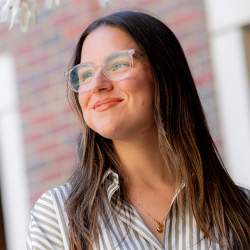
Cristina Lozada T’25
ON DECIDING TO PURSUE AN MBA
I decided to pursue an MBA after a period of meaningful reflection and a strong drive for growth. My sister can attest to this, as I very carefully considered my motivations and what I hoped to achieve from an MBA experience. I wanted to transition to the tech industry, where innovation and customer-centric thinking move at a different pace. I viewed the MBA as a way to intentionally challenge my way of thinking and expand my network beyond my Lima roots. I also hoped to learn from diverse peers, push myself outside my comfort zone, and take the time to reflect on the kind of leader I aspire to be. Pursuing an MBA felt like the right investment to open new doors, both professionally and personally, and prepare me to lead with a broader, more global perspective.
ON CHOOSING TUCK
I was genuinely curious and truthfully impressed by the love Tuck alumni have for the school. There was something about it—perhaps a gut feeling—that drew me in. Everyone I talked to was so enthusiastic about their experience that it made me want to be part of it, too.
Another (very true) cliché is the people. The kind hearts in this community have exceeded every expectation I had. Coming from a big family and having close friendships back home, I knew I needed a place where I could build a real community and a strong support system. Looking back, I’m grateful for the friendships I’ve built here because I know they’ll last far beyond the classroom.
ON TUCK CAREER SERVICES & RECRUITING
I had a great experience with Career Services and felt incredibly supported by the Tuck community in landing my tech internship at Microsoft. From second-year students who had already gone through internship recruiting, to the consistent encouragement I received from Career Services, I’m truly grateful for the one-on-one investment so many made in me.
I remember early in the year, I was second-guessing whether I should pursue marketing in tech—it felt a bit too niche—but Laura, my career advisor, encouraged me to follow my aspirations and helped me prep thoroughly for my interviews.
The Tuck alumni network was also immensely helpful. Even without knowing me personally, alumni offered valuable advice and coaching that helped me land my internship at Microsoft. The level of commitment and willingness to help is something I’ll always appreciate.
ON TUCK’S UNIQUE LOCATION
I knew that after Tuck, I’d want to be in a city—so when else would I have the chance to live in the woods? I truly loved experiencing every season here, and I think the location has a meaningful impact on our experience. I remember during one of my first weeks, a now very good friend invited me to the dock by the Connecticut River for her birthday. It was such a simple moment—sitting in the sun, sharing snacks, talking by the water—but it was one of my favorite memories from those early weeks. Making new friends in a setting like this is something special. I knew winter might be tough, especially coming from South America, but I ended up loving it. I was so excited about skiing—and it absolutely lived up to the hype. I’ll never forget our Fridays at Killington, where you’d run into Tuckies at nearly every lift line, or squeezing in a few runs at Dartmouth Skiway before class. Being this close to nature is truly priceless, and living just five minutes away from all your friends is something I’ll miss deeply.
ADVICE FOR PROSPECTIVE STUDENTS
My biggest advice for prospective students considering an MBA is to reflect on what you want your two years to look like. It goes by quickly, and being intentional about what you want to achieve and take away from the experience is key to not getting lost in everything that happens. I didn’t have a perfectly logical explanation for why Tuck was the best place for me, I just knew it was. Trust your intuition and ask a lot of questions! Every Tuckie I talked to before applying made me feel like I was already part of the community, long before I had been accepted. That feeling stayed true throughout recruiting, academics, and everything in between. We build a network that extends far beyond these two years, and that’s something truly special and unique about an MBA at Tuck.
WHAT I’LL MISS MOST
What is there not to miss? I’ll miss being a student again and having this time to focus on learning and personal growth. I’ll miss being part of the Student Board; it was such a pleasure to work alongside incredible classmates to help shape the best experience possible for our community (special shoutout to Alison, Jess, and Paige: we did it!) I’ll miss my professors, not just for what they taught us in class, but for the moments beyond it, like inviting us into their homes for dinner and sharing lessons far beyond academics. I’ll miss Hanover: the river, the green, the leaves, the snow, the outdoors. I’ll miss looking for a weekday ski carpool, the 10:50 p.m. Tripod hockey games at Campion Arena, and bumping into people I know on the street. Most of all, I’ll miss seeing my friends every day. I’ll be proud of their accomplishments wherever they go, but I’ll miss having them just a few steps away. I am deeply grateful for them and for the memories we created here.
Marketing/Technology
Lima, Peru
Bachelor of Business Administration, Universidad del Pacífico, Lima, Peru
Consumer Engagement Manager at Belcorp, a direct-selling beauty company in Latin America
Student Board: Class Treasurer; Tuck Admissions Associate; Teacher Assistant; Tuck Winter Carnival Co-Chair; active member at LABA, Tripod Hockey, and Ski Club.
I did an e-FYP (with an AMAZING team) in which we delved into the world of food and beverage at sporting venues, exploring an opportunity to reduce wait times at concession stands. In my second year, I went on the project-based GIX trip to Kenya and spent time with Generation Kenya, a nonprofit that aims to reduce youth unemployment by up-skilling young professionals and helping them secure long-term employment. Professor Ramon Lecuona led this trip to Nairobi, and it was one of the most rewarding experiences I’ve had at Tuck.
Marketing MBA Intern, Microsoft
It’s so hard to pick! I loved Communicating with Presence with Jim Rice, People Analytics with Julia Melin, Corporate Communication with Paul Argenti, Negotiations with Aram Donigan, and CCCGE (Cooperation and Competition in the 21st Century Global Economy) with Emily Blanchard.
The magic about Tuck is that every encounter, as simple as it may seem, can become a key encounter. For me, it’s been a mix of big, anticipated events and smaller, unexpected moments like hanging out in the locker room before a Tripod Hockey game, an unplanned swim at the river, or meeting up with a friend in the lift line at Killington. From seeing the breathtaking Taj Mahal with friends from India as your guides, to meeting someone new at a small group dinner, or staying late over a glass of wine because you simply found too much in common with a couple of new friends, the memories I’ve built over these two years are countless—yet each one unforgettable.
Product Marketing Manager at Microsoft
I am so grateful that I got to live this experience. Now I truly understand why every alum I’ve spoken with as a prospective student said, “Tuck was the best two years of my life.” What a privilege it has been not only to grow as a person and reflect on the kind of leader I aspire to be, but also to meet so many brilliant minds and kind hearts. I leave this place filled with eternal gratitude, admiration, and love for my classmates, professors, and the incredible staff who make Tuck what it is. Tuck is its people. It became my home away from home—a place to pause and reflect, but also a place to run, stumble, get back up, and grow. At the end of the day, it was a learning journey. Through coursework and leadership roles, I became more comfortable being uncomfortable and I found a voice that balances empathy with decisiveness. I’ve also learned how to be a better leader while also staying true to myself. The greatest gift, however, has been the friendships I’ve built and the connections I’ve formed with people from all over the world—sharing cultures, dreams, and laughter. My friendships here have expanded my heart and perspective in ways I will carry with me forever.
Consumer Goods, Retail
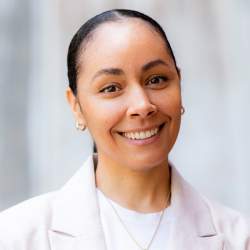
Venise Crawford T’24
ON DECIDING TO PURSUE AN MBA
I chose to pursue an MBA to make a 180-degree career pivot. With no business experience, I knew an MBA would provide me with the analytical and leadership skills necessary for this transition. Initially, I thought I may be well suited to a traditional consulting path. However, once I arrived at Tuck, I discovered that my interests lie in the retail and consumer goods sectors. My strategy internship at New Balance confirmed that this was the right industry for me, and I am eager to embark on my post-graduate career there.
WHY TUCK?
A few concrete reasons drove me to pursue an MBA at Tuck. Through conversations with alumni and research of past classes' career outcomes, I was confident that I could achieve my career goals here. Additionally, I knew that going to Tuck and living in the Upper Valley would be an immersive experience. Coming from LA, a city vastly different from Hanover, I found this particularly appealing. Lastly, I was drawn to Tuck’s general management program. As someone without a business background, I appreciated how, in my first year, I would receive a strong business foundation, and in my second year be able to explore electives aligned with my interests. From the first virtual information session I attended as a prospective student to this moment, just days away from graduation, the Tuck community has proven to be supportive, encouraging, and appropriately challenging.
HIGHLIGHTS OF MY TUCK EXPERIENCE
One undeniable highlight of my Tuck experience was attending the Global Insight Expedition (GIX) in Stockholm, Sweden. The trip topic covered lifestyle branding, sustainability, and gender equity, led by Professor Hanne Pico Larsen. Through this experience, I learned about Swedish culture, visited various Swedish companies, and strengthened relationships with fellow Tuckies. Because of my interest in retail, I found this trip especially rewarding.
Another highlight was attending Tuck Black Ski (TBS) as a first-year and planning the trip as a second-year. While planning TBS as a second year was one of the most stressful endeavors I’ve taken on, it was also one of the most rewarding experiences I’ve had at Tuck, or elsewhere. Throughout the process, I bonded with my fellow BSAT co-chairs and felt a sense of accomplishment in organizing a trip that Black MBA students from across the country could enjoy. Coming together to celebrate Black excellence, all while enjoying time on the slopes, is a uniquely affirming experience I was happy to help create.
ON TUCK’S INTIMATE LOCATION
Each year BSAT hosts a Fall Cabin Night at Mt. Moosilauke. It is a cherished tradition and one of the first opportunities we have to gather off-campus, get to know each other, and bond as a group. The night includes games, campfires, a family-style dinner at the lodge, and an early morning hike. Being able to go to Moosilauke, just an hour away, and enjoy cozy cabin vibes in the fall is an unmatched experience that you can't get at most business schools. Tuck’s location enables these unique bonding experiences. As someone born and raised in a major city (Los Angeles, CA), I was drawn to Tuck’s location for this very reason.
Retail, Consumer Goods
Los Angeles, CA
Amherst College, BA in Black Studies
Program Manager at UCLA
Black Students Association at Tuck (BSAT), Tennis Club, Consortium for Graduate Study in Management (CGSM), Community Consulting
Global Insight Expedition, Stockholm: Lifestyle Branding, Sustainability, and Gender Equity with Professor Hanne Pico Larsen—one of my favorite Tuck experiences!
Strategy Intern, New Balance (Boston, MA)
Corporate Communication taught by Professor Argenti and Communicating with Presence taught by Professor Rice. Both courses offered practical communication principles that are applicable in professional and personal settings.
Attending DivCo (Diversity Conference) as a prospective student; learning to ski at the Dartmouth Skiway; Tuck Black Ski in Park City, UT; BSAT Moosilauke cabin night
Senior Strategy Analyst, New Balance (Boston, MA)
When I first came to Tuck, I felt somewhat intimidated about transitioning from the education/nonprofit sector to the private sector. With no formal business education, I worried about keeping up with peers who had consulting, finance, and other business experience. Nearing the end of my two years, I’ve learned so much, but I still don’t know everything. However, this experience has taught me that it’s okay to not have all the answers. With confident humility, I feel more secure in my ability to lead with vulnerability, ask the right questions, and rely on my community to solve big problems.
Consulting
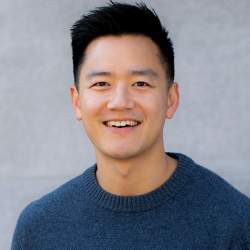
Edmund Ong T’24
HIGHLIGHTS OF MY TUCK EXPERIENCE
A defining highlight of my Tuck experience was contributing to the creation of the inaugural International Culture Crawl in 2023. Epitomizing Tuck’s student-led ethos, this event allowed the community to “travel the world” within the confines of Hanover, showcasing the diverse backgrounds of our student body. We successfully represented five continents and twenty-two countries, creating a vibrant tapestry of global cultures. What made this event particularly special was the personalized invitation extended to faculty and staff, ensuring the celebration was inclusive of the entire Tuck community. Participants shared their national pride through food, games, attire, and historical insights, fostering a rich exchange of cultural heritage. The event’s success, drawing over 200 attendees, not only highlighted the diversity of our campus but also provided a platform for students to feel recognized and valued. This initiative exemplified a profound expression of Tuck’s community spirit, and further, showcased the impact of collective student efforts which can lead to a personal, connected, and transformative experience.
ON CAREER SERVICES AND RECRUITING AT TUCK
The career services and recruiting experience at Tuck are exceptionally personal and community-driven. With a favorable career services-to-student ratio, Tuck fosters intimate and supportive relationships between students and career advisers. My experience with Deirdre O’Donnell, the lead adviser for finance careers, epitomizes this approach. She was not just an adviser but also a mentor, confidant, and at times, a therapist—meeting with me weekly and closely tracking my progress through the recruiting cycle. Her deep industry insight and process understanding provided a solid foundation of support, ensuring that I remained anchored in the inherent ups and downs of the recruiting journey. Beyond the career services team, the second-year students were invaluable, readily offering advice, acting as a sounding board, and rigorously preparing us for interviews. The collective effort and camaraderie at Tuck were instrumental in my recruiting achievements.
ON THE ACADEMIC EXPERIENCE
When I think about the academic environment at Tuck, two words come to my mind: personal and engaging. Tuck faculty are deeply invested in student success. For me, this personalized approach was exemplified through my interactions with Professor Ken French in his Research to Practicum course. Professor French demonstrated exceptional dedication, supporting me extensively as I developed and refined a presentation on the potential of generative AI in stock selection. Further, his commitment extended beyond the classroom; Professor French facilitated valuable networking opportunities and arranged lunches with prominent figures in finance, such as founding partners of AQR, the former chief investment officer of Yale’s endowment fund, David Booth, and more. He even hosted a dinner for our class, encapsulating the nurturing and expansive educational ethos of Tuck. This level of faculty engagement underscores the unique and profound learning experience at Tuck whereby they truly go above and beyond for the students.
ON TUCK’S INTIMATE LOCATION
Tuck’s intimate location in Hanover significantly shapes the student experience, creating a tight-knit community where trust and mutual growth prevail. The decision of each classmate to relocate here for their MBA journey creates a unique environment of commitment and collaboration. A vivid example of this dynamic is the tradition of Tripod Hockey, an activity that embodies the spirit of unity and learning at Tuck. Despite many of us, myself included, having no prior experience with hockey—or even ice—each year, we collectively embrace the challenge. This endeavor is not just about the sport; it’s a shared journey of vulnerability and growth, learning to skate and play together. My second-year team captain was incredibly encouraging, which allowed me to feel comfortable in building my skills. My progression from a novice player to becoming a captain myself illustrates the cycle of support and mentorship inherent in our community. Not only has this experience enhanced my hockey skills, but it has deepened my connections within the Tuck community, including both students and their partners, illustrating the profound impact of Tuck’s intimate setting on building enduring bonds and shared experiences.
A MOMENT THAT WILL STAY WITH ME
A particularly transformative moment from my time at Tuck occurred during my Global Insight Expedition (GIX) to Kenya. The pivotal experience was a dinner with Kenyan MBA students from a local university, where conversations transitioned from shared MBA experiences to in-depth discussions about Kenya’s socio-economic and political landscape. The Kenyan students’ candid insights revealed both challenges and optimism for their country’s future, providing a nuanced understanding of Kenya’s role in Africa. This exchange not only broadened my worldview but also symbolized the essence of the GIX—bridging global divides and fostering meaningful connections. It forever altered my perspective on Kenya and greater Africa. Further, it instilled in me a profound appreciation for perspectives from around the world and underscored the value of international dialogue in shaping a more comprehensive understanding of global contexts. This experience, along with the rest of the GIX, was rich in learning and relationship-building with old and new friends. It is a treasured aspect of my Tuck journey that will resonate with me well beyond Hanover.
Consulting
Singapore
University of British Columbia, BASc in Chemical Engineering
Accenture, Management Consultant
Student Board President, Revers Fellow, Admitted Students Weekend co-chair, Tripod Hockey Captain, Teaching Assistant
Revers Trek to Georgia to learn about energy security in Eastern Europe; Global Insight Expedition in Kenya—worked with a local startup on their go-to-market strategy; First-Year Project with Wasted* on identifying a new business opportunity
Investment Banking at Morgan Stanley
My Research to Practice Seminar with Ken French—Empirical Evidence in Finance
Hosting Meera Bhatia T’04, COO of Fabletics, for Admitted Students Weekend; presenting to US Ambassador Meg Whitman; Dinners with various professors
Investment Banking Associate, Morgan Stanley
Tuck equipped me with both the technical and business acumen that I sought. More importantly, the true value lies in my transformation on a personal level. The immersive experience at Tuck, extending beyond the confines of the classroom, fostered profound growth in my self-perception and leadership abilities. I emerged with a newfound confidence in my capacity to lead and inspire accompanied by a broader perspective and a more nuanced view of the world, marking the most significant evolution of my Tuck experience.
Consulting
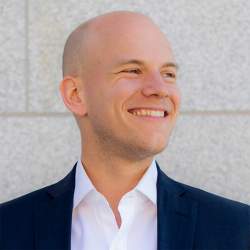
Charlie Jersey T’24
ON DECIDING TO PURSUE AN MBA
When I decided to pursue an MBA two words encapsulated my goals: environment and community. Both are critical issues globally and locally—and from youthful growing pains to culture shock on a rural German dairy farm, and from discussing poor coffee harvests with Peruvian farmers to breathing wildfire smoke in the Rockies—I have experienced firsthand the importance of each.
At McKinsey, I balanced the two by building energy transition expertise and leading local connectivity, but I found myself hitting a wall. The leaders I admire possess a quiet capability, confidently managing ethical work done with integrity, while also finding time to live lives rich in wild spaces and self-reflection. I believed the content expertise and personal growth provided by an MBA would enable me to become that type of leader.
ON CHOOSING TUCK
Any top MBA would build the managerial skills I require, but only Tuck—with its position in the Upper Valley near the White Mountains, its emphasis on deep class connection, and its energy offerings from the Revers Center—provided the perfect combination for my goals. For some, Tuck’s rural location is a negative, but for me, the opportunity to build deeper connections with both my classmates and the New England landscape was too good to pass up. Others may chafe at small classes that force participation, however, I saw it as a chance to engage with courses and professors at the level only Tuck allows.
HIGHLIGHTS OF MY TUCK EXPERIENCE
Academically, the First-Year Project (FYP) was probably my most memorable experience at Tuck. I coordinated a team of five students to assist a cleantech startup in deciding which geographical market, and application of its technology, to expand into next. By leveraging Tuck resources, like the Feldberg Library’s collection of databases, the startup employees were able to apply more rigorous decision criteria than would have been possible without our help.
Socially, I’ve loved cocaptaining the Tuck Soccer Club. It’s been incredible to foster an inclusive and fun environment to play a sport that holds a special place in my heart. Finally, Tuck’s Small Group Dinners have been a highlight—I’ve hosted over five! SGDs are a perfect encapsulation of Tuck’s emphasis on community, and I found some of my favorite people at Tuck through those events.
ON LEVERAGING TUCK RESOURCES
At Tuck, I relied most on the Revers Center to deliver the experiential learning I needed to deepen my understanding of global energy systems. Not only did it provide professional and academic opportunities, but the network that it opened up to me has given me insight into where I could potentially go with my career post-McKinsey.
ON TUCK’S INTIMATE COMMUNITY
At Tuck, no one comes in with an existing network; everybody is in the same boat—trying to balance making friends with recruiting, classes, sports, getting outside, and every other activity you could imagine. Combined with small class sizes and limited ability to “escape” the Tuck bubble, Tuckies have no choice but to build a special community, unique to each class. In contrast to city schools, where many (or most) people have existing networks—the depth of relationships you build simply can’t be the same. Tuckies tend to spend their weekends in the Upper Valley, deepening bonds with each other rather than regularly escaping to far-flung destinations. I feel connected to almost everybody in my class, not just the ten to fifteen people who might go on the same trips as me.
GENERAL ADVICE FOR PROSPECTIVE MBA STUDENTS
An MBA is a generalist’s degree, not a specialist’s. Tuck’s courses have helped me round out my business skill set, but I found experiential learning to be far superior to classroom learning for deepening my understanding of my interest in energy. To that end, it doesn’t matter if the curriculum has ten courses in a specific topic of interest, or zero; all that matters is whether the program will support you in learning outside of the classroom. The personalized attention that Tuck’s small size affords has enabled me to go far deeper into the energy transition than adding a few more energy-based courses would have—not that it slouches on that front, either.
ON LIFE IN THE UPPER VALLEY
Every morning from my window, I see Mount Ascutney presiding over the Connecticut River and the Vermont countryside. I walk around campus and feel the seasons change. I finish classes and walk directly to soccer fields, or drive an hour to Killington to fly down the snowy (icy?) mountainside. Some might say Tuck is “in the middle of nowhere”, but to me, it is far more centrally located than any city. At Tuck, I was able to live the kind of lifestyle that concrete-bound city students could only visit on weekends. Though I am excited to start the next chapter of my life in Boston, I am already scheming for ways to return to the Upper Valley so I can relive the beauty and ease of living that I have enjoyed for the past two years.
Energy Transition Consulting
Westport, CT
B.A. in Chemistry and German from Williams College
Business Analyst at McKinsey & Company in Boston and Düsseldorf
Revers Fellow, co-captain of Tuck Soccer Club, tutoring, basketball, woodworking
Global Insight Expeditions to China to learn about the digital economy, Revers Trek to Georgia (the country), helping CT Green Bank on end-of-life PV module strategy
McKinsey Boston (sponsored)
Taxes and Business Strategy, Financing the Clean Energy Economy, Energy Economics, Negotiations (so hard to pick just one!)
Connecting with classmates over barbecue during an MBA soccer tournament in Austin TX, sharing a tiny hotel room in Japan with someone I barely knew, playing music and spike ball on the Green with future roommates
Back to McKinsey, Boston!
Tuck’s focus on community and reflection helped create a richness of experience that went far beyond what I could have expected. Any top MBA program would have helped me develop the concrete skills required for my career, but my time at Tuck provided the space to foster a sense of confidence and well-being across all facets of life. With the Tuck network I’ve built blowing wind in my sails, I feel ready to explore.
Consulting
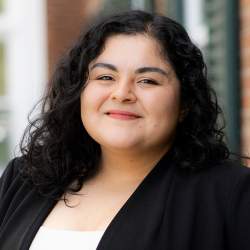
Jennifer Chacon Salas T’24
WHY TUCK?
As a first-generation, low-income student from the small Latin country of Costa Rica, I knew that finding the right support system was the key to my success. Tuck is consistently celebrated for its close-knit community which deeply resonated with my personal and professional goals. Since arriving here, I understand why it’s held in such high regard. Tuck has a built-in network of the most passionate and committed alumni, a self-selecting student body that prioritizes relationships, and an engaged faculty and staff that cultivates personal bonds with the students. I knew coming to Tuck would give me the tools and human capital needed to succeed while also enabling me to stay true to myself.
HIGHLIGHTS OF MY TUCK EXPERIENCE
My GIX trip to Kenya stands out as one of the most challenging yet rewarding learning experiences of my time at Tuck. I was drawn to this trip because it was the only project-based GIX, led by Professor Ramon Lecuona. Being in Kenya turned out to be a rich cultural and professional experience. We met with CEOs, the US ambassador, partners of big firms, and entrepreneurs. We also had the opportunity to help local, socially conscious startups think about their business strategies. In doing this, I traveled to one of the more rural areas of Kenya to interview customers and business partners of the organization. In addition to seeing more of the country, this helped me understand some of the challenges the company faces. It was a heavy lift, but I wouldn’t change any of it.
ON THE ACADEMIC EXPERIENCE
The academic environment at Tuck is supportive yet rigorous. While I gained extensive knowledge from my professors, I also gained invaluable insights from my classmates. I was constantly encouraged to step out of my comfort zone. One of my favorite courses at Tuck was Leadership in the Global Economy. Partaking in this class allowed me to reconsider my biases and pushed me to find ways to constructively disagree, something I had steered away from in the past. Overall, I have experienced tremendous personal and professional growth, and can confidently say there is a Jennifer before Tuck and a Jennifer after Tuck.
MOMENTS THAT WILL STAY WITH ME
Despite the stress of recruiting, I never felt lonely while navigating the process thanks to the supportive atmosphere at Tuck. Instead of viewing each other as rivals, everyone seemed to cheer each other on. A memorable example of this camaraderie was when one of my floormates received a call during dinner in which he received an offer for a position he had previously interviewed for. The entire atmosphere erupted with joy as people around us clapped, hugged him, and shouted in celebration. It’s a prime example of the Tuck community and how we all celebrate one another.
WHAT I’LL MISS ABOUT TUCK
What I’ll miss most about Tuck are the people, more specifically my friends and classmates. Over the past two years, I’ve met some of the kindest, most resilient, supportive, and brilliant individuals. The quality of the Tuck community is truly unmatched. Looking back on the amazing friends I’ve made here, I’ll genuinely miss the moments spent with them, the lessons learned, and the authentic kindness they show every day. Don’t get me wrong though, we plan to stay in touch!
Consulting
Costa Rica
The University of Costa Rica, Bachelor of Public Accounting, Master in Public Accounting
Deloitte & Touche, S.A and SmileDirectClub – Regulation and Compliance
Student Board – International Experience Chair, Tuck Admissions Associate, Accounting Tutor
First-Year Project – PERI, learning about go-to-market strategies for disruptive technology; Project-based Kenya Global Insight Expedition, working with a social enterprise focused on bringing household goods to rural areas of Kenya
Summer Associate, McKinsey & Co.
Leadership in the Global Economy and Strategy in Emerging Markets
During Spring break, I traveled to Germany as part of my FYP. My group and I had the opportunity to meet Alex Schwörer T’02, owner and deputy chairman of the board at PERI, and he was incredible. He spent every dinner with us telling us about his Tuck experience and how it shaped his professional career. It was a highlight of Tuck for me. I also enjoyed every encounter with Associate Dean Sally Jaeger, who consistently demonstrated incredible support and was truly amazing.
Associate, McKinsey & Co., Boston
While I gained extensive knowledge from my professors, I also gained invaluable insights from my classmates. I was constantly encouraged to step out of my comfort zone. … Overall, I have experienced tremendous personal and professional growth, and can confidently say there is a Jennifer before Tuck and a Jennifer after Tuck.
Technology
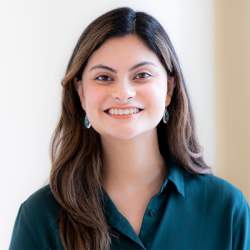
Amna Sohail T’24
WHY MBA?
With a background in chemistry, the transition to the tech sector through startup VC and corporate innovation was pivotal. The MBA was seen as an investment to scale the impact I could make, understand business fundamentals, and explore what it means to be an inclusive leader, creating equitable spaces in the workplace and beyond. It also offered a chance to build a diverse and lifelong network with peers from different backgrounds who have navigated unique industry challenges.
WHY TUCK?
The decision to attend Tuck was influenced by its tight-knit and immersive community, which I experienced firsthand during both Women in Business Conference (WIBCo) and Admitted Students Weekend (ASW). Tuck’s philosophy on coinvestment—where the MBA experience is about mutual growth and learning to be an inclusive leader—was appealing. Your MBA is ultimately a coinvestment.
Tuck’s Next50 Initiative, the opportunity to be a Fellow with the Centers for Digital Strategies and Health Care, and groups like the Tech Club also provided a rich environment to foster community, give back, and learn from my peers. This was especially valuable coming from an underrepresented background within the tech sector.
My biggest internship takeaway was how important it is to be curious and to continue to seek out diverse perspectives. Whether you’re building a process or a framework, it’s important to get diverse perspectives before pivoting to solutioning. My internship also highlighted the significance of being a DEI champion and creating inclusive spaces for ESL speakers.
MY CAREER GOALS
Before Tuck, I had the opportunity to work in both health care and tech. My goal coming into Tuck was to build off my pre-MBA experience and develop a career at a big tech platform business, focusing on product and partnership roles. My experiences at Tuck and my internship with Microsoft reinforced my desire to drive impact at scale through building and growing strategic technology partnerships.
ON CAREER SERVICES AND RECRUITING IN TECH
The tech recruitment process looks a bit different, a bit more unstructured, at Tuck than recruiting for other paths like consulting. I was fortunate to receive an offer early in the process—resume drops were in September, I went through interviews in October, and in December I received an offer.
I leaned heavily on the Tuck network, including second years, alumni, the Tech Club, and the Center for Digital Strategies. Anyone I’ve reached out to throughout this process has been super willing to talk and to candidly share their experiences. One-on-one mentorship and Tuck’s leadership coaching program were also pivotal in preparing for this journey.
MY INTERNSHIP AT MICROSOFT
I had an impactful summer experience as a Partner Development Manager MBA intern on the Global Partner Solutions team at Microsoft. In my role, I gained valuable exposure to various aspects of the business, from technical solution road mapping to learning how to go-to-market and coinnovate with the company’s diverse ecosystem of software partners. Outside of my day-to-day work, it was great to connect with other interns, explore Seattle, and participate in Microsoft’s speaker series, where I got to learn from innovation leaders across industries. In fact, one of favorite events was hearing from the cofounder of Salt & Straw on how the company thinks about systemizing innovation in the ice cream industry, while building a platform for connection and community.
My biggest internship takeaway was how important it is to be curious and to continue to seek out diverse perspectives. Whether you’re building a process or a framework, it’s important to get diverse perspectives before pivoting to solutioning. My internship also highlighted the significance of being a DEI champion and creating inclusive spaces for English-as-a-second language (ESL) speakers. This topic especially resonated for me having seen my family and friends navigate the challenges of being ESL speakers in the workplace. It felt very rewarding to have the opportunity to coplan a discussion at Microsoft’s Inspire Conference on Being a Champion for ESL Speakers and host a community conversation on this topic with my MBA intern cohort.
Tuck’s curriculum—including the First-Year-Project, core courses like ManComm, and Analytics electives—was instrumental in providing a solid foundation for the internship.
MY ADVICE FOR PIVOTING INTO TECH
For those pivoting into tech, it’s important to not self-select yourself out of the process before you even start, recognize your transferable skills, and to be clear on your career motivations. Using resources like career mentors, connecting with your classmates, and tapping into Tuck’s supportive alumni network can make a big impact. Don’t be afraid to also do cold outreaches on LinkedIn and even email. At the same time, I think it’s important to be open to new opportunities you may not even have thought about. Overall, the bottom line is to not be afraid to bet on yourself and your potential!
ON BUILDING COMMUNITY
I have seen how important it is to not only find community, but to also build community for others coming from diverse backgrounds to be able to participate. As a Tech Club co-chair and fellow with both the Center for Digital Strategies and Center for Health Care, it has been so rewarding to have contributed to creating more spaces for people to learn, seek mentorship opportunities, grow professionally, and support each other on their career journeys. These communities have given me the opportunity build a diverse, lifelong network of peers whom I am looking forward to staying connected with in my journey beyond Tuck.
Tech
Indianapolis, IN
Purdue University, BA, Chemistry
Strategy & Operations, Innovation Team – Elevance Health (Anthem); B2B Tech and Life Sciences VC Investing – Elevate Ventures; Corporate Innovation & Business Design – High Alpha
Tech Club Co-Chair, Center for Digital Strategies (CDS) Associate & Fellow, Center for Health Care Fellow, Next50 Fellow, Member of the South Asian Business Association (SABA) and Women in Business (WIB), Career Services Mentor, Marketing Teaching Assistant, Tuck Compass Personal Board of Advisers Program Participant
Fall Term Exchange at IE University in Madrid, Spain; First-Year Project (FYP) working with Uber on evaluating market expansion opportunities in Latin America; Center for Digital Strategies Fellow project on transforming health care through building AI capabilities and partnerships
Partner Development Manager, Global Partner Solutions at Microsoft
Leading Disruptive Change with Professor Scott Anthony; Customer Analytics with Professor Scott Neslin; Negotiations with Professor Aram Donigian; Technology-Enabled Disruption in Health Care Delivery with Professors Lindsey Leininger, Liam Donohue, and Dr. Reena Pande
Tuck Women’s Symposium by Women in Business (WIB), Winter Wellness Retreat led by T’24 Holly Mowbray; Small Group Dinner with Professor Sonya Mishra; CDS Fellows NVIDIA AI Conference Trip in San Jose, CA; Tech Club West Coast Tech Trek
I came to Tuck with the vision to not only invest in my leadership potential and expand on my business fundamentals, but also learn how to become a more inclusive leader in the workplace and beyond. These past two years, I am fortunate to have been surrounded by classmates, faculty, and professors who have pushed me to continuously reflect on and pursue this vision through a variety of different platforms such as the Next50 Fellows and Tuck Compass’ Personal Board of Advisers program.
Consulting
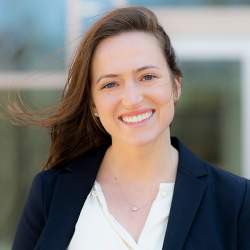
Alison Tilson T’24
ON DECIDING TO PURSUE AN MBA
As a graduate of Carleton College, a liberal arts school, I realized there were gaps in my business knowledge that could be addressed by pursuing an MBA. My primary motivation for pursuing this degree was to acquire a strong foundation in business principles. However, I also sought to create genuine connections within a community of peers who were navigating similar stages of life. The Tuck School of Business offered me both. After spending the last two years at Tuck, I am confident that there could not have been a better place to accelerate my career and cultivate a network that will support me for a lifetime.
WHY TUCK?
I chose Tuck because it offered the immersive MBA experience I was seeking. Upon visiting the campus, I felt immediately at ease with the welcoming community and kind people. I admired how Tuck students’ interests extended beyond academic achievement; they seemed genuinely dedicated to getting to know one another on a personal level and contributing to the close-knit community Tuck is known for. As I considered which institution would be the right fit for me, I knew that at Tuck, I would be joining a community that cares about my personal and professional development. At that point, the choice seemed obvious, and I haven’t regretted it since. I am excited that the mentors and friends I’ve made here will be a part of my network for the rest of my life.
HIGHLIGHTS OF MY TUCK EXPERIENCE
Among the many memorable moments of my Tuck journey, spending time with my original study group stands out as my favorite. Upon arriving at Tuck, I was fortunate to be grouped with five individuals who quickly became my closest friends and dependable constants. We worked incredibly well together. After the work stopped, we’d spend hours together, long after most study groups stopped meeting. The small community and comradery that they gave me was indispensable during what was an uneasy, transitional time at Tuck. This early experience highlighted what Tuck is all about and provided me with an outlet to meet my first real friends whom I know will always be there for me.
ON LEVERAGING TUCK RESOURCES
During my first year, a pilot program for Tuck Compass was announced with a component called the Personal Board of Advisers (PBA). The PBA is, as its name indicates, a program in which students assemble a personal board of advisors consisting of 4-6 people who offer guidance and advice during a time of immense career and life development. I was assigned four advisors from Tuck—Andy Kaestle from Career Services, Vincent Mack from the MBAPO, Jen Tietz from the leadership coaching program, and an alumna. I then added two board members from my job before Tuck.
One of my most fulfilling moments at Tuck was assembling my board and creating relationships with each member. The experience allowed me to practice meaningful reflection, gain leadership skills and confidence, receive consistent support, and obtain invaluable insights. Each person brought something unique to the table, and I know that I have benefited greatly from their feedback. It was a privilege to learn from them, and I feel grateful knowing that they’re willing to lend an ear and offer advice when needed, even after I graduate from Tuck. This experience is something that I will never take for granted and I truly don’t think I would have gotten it anywhere else.
ADVICE FOR PROSPECTIVE MBA STUDENTS
The most valuable advice I can offer to prospective MBA students is what a T’22 shared with me during admitted students’ weekend when I was in their shoes: Trust your gut when deciding which school to attend. By learning to listen to that inner voice and following your intuition, you will end up where you’re meant to be. Research, conversations with current students, and attending events at different institutions are key steps in this process.
Tuck is special because of everything it offers, especially its community. Visiting campus and meeting people who would be in my class gave me the feeling that it was the right place for me. Also, I knew that I would love being out of a city for two years and having access to the people and outdoors that I do here. I trusted my gut and have not regretted that decision for a single moment. If you have that gut feeling, I recommend trusting it because it often leads you to an environment where you can thrive, with everything else generally falling into place.
WHAT I’LL MISS ABOUT TUCK
It is so hard for me to put into words what I will miss most about Tuck because I will truly miss everything about my life here. I will miss the fact that there are so many people that I want to spend time with, and they all live within a five-minute drive of me. I will miss the access to the outdoors and the incredible scenery of the Upper Valley. I will miss my professors, I will miss being a student and focusing on my learning, I will miss the comradery of tripod, and the hoard of people to go skiing with any day of the week. I will miss study group dinners, weekly Survivor screenings at Summer’s, and planning my social calendar with all my friends. I will miss when it finally gets nice out and we can work outside, I will miss the beauty of the snow, and I will miss quiet mornings at the Nest with my green heron breakfast sandwich. Most of all, I will miss my friends who have become family and the incredible times that we have shared over the last two years.
Consulting
New York, NY
Carleton College, BA in Economics
EY-Parthenon focused on supply chain
Tuck Admissions Associate; Judicial Board; Admitted Students Weekend co-chair; Tuck Compass pilot participant (Personal Board of Advisers); Non-Profit Board Fellow at the Vermont Institute of Natural Science; Tripod Hockey, and anything else that would get me active and/or outdoors
Global Insight Expedition in Japan with Senior Associate Dean Joe Hall where we got to see operations principles in practice; First-Year Project working with a running shoe company to expand urban market share; my Negotiations course, in which we’d role-play negotiations each class and learn how to effectively advocate for ourselves
EY-Parthenon
My favorite Tuck electives were Managerial Accounting with Joseph Gerakos and Client Project Management with Amy Florentino and Matt Kummell. Both classes made me think in a new way and approach problems differently. They provided tangible takeaways I will use for the rest of my life. Also, they were taught by some of my favorite professors at Tuck!
EY-Parthenon
My key Tuck encounters include both the big, significant events and the smaller, everyday experiences. The big ones—like my pre-term trip with Outward Bound where I made my very first friends, running 2023 Admitted Students Weekend and giving speeches both years to prospective students about why they should choose Tuck, or winning a dinner at one of my favorite professor’s houses during the Tuck Gives auction—are classically Tuck things that I will remember forever. At the same time, I will equally remember the small moments such as running into professors at the Norwich Farmers Market, having special dinners with my original study group every term, swimming in the Connecticut River, sitting on Raether deck when the weather warms up and marveling with my friends at the beautiful place we live in, or playing trivia on Thursdays at Dunks. In these moments, I often take a second to think about how lucky I am to have spent two years focusing on becoming a better version of myself and getting to know my incredible community. That privilege is never lost on me, and it’s something I do not think I could’ve gotten anywhere else.
When coming to Tuck, I was expecting my two years to be a time of tremendous career growth. While I have learned so much that will be instrumental in my career, I have also experienced profound personal growth. Leaving Tuck, I am a more confident, aware, engaged, understanding, and kind person than I was when I walked in two years ago.
The relationships that I have made here will stay with me longer than any one thing I learn in class, and for that, I am eternally grateful. I feel lucky to say that I’ve found a group of people—not only my classmates, but also faculty and staff, members of my personal board of advisors, and my leadership coach—who care about me and my development in a way that I’ve never experienced before. None of us succeed alone, and I know that these relationships and the ripple effects of coming to Tuck will serve me for the rest of my life.
Consulting
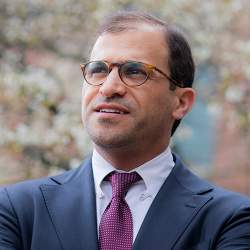
Karim Grira T’24
HIGHLIGHTS OF MY TUCK EXPERIENCE
When I first arrived at Tuck, there was no dedicated club for European students and interests. Recognizing this gap, my accomplished classmate Ben Marshall T’24 and I co-founded the Tuck Europe Club during our first year. Over the past two years, we’ve worked to organize events that foster awareness and appreciation for European culture, business, and politics. As we graduate, I am excited to see how the next co-chairs will continue to grow and strengthen the Tuck Europe Club.
Building camaraderie with classmates was another highlight of my Tuck experience. This bond grew naturally during international travels, like my GIX to China, and through launching ExperTuck in 2023, a peer learning initiative similar to TEDx.
ON LEVERAGING TUCK RESOURCES
At Tuck, I’ve been fortunate to utilize the alumni network to develop invaluable relationships. Surprisingly, the network’s impact was immediate—just hours after receiving my admission, a Paris-based alumnus contacted me to guide my decision. He’s remained a dedicated mentor, tracking my progress throughout my two years.
ADVICE FOR PROSPECTIVE MBA STUDENTS
I advise people considering an MBA to select a program that focuses on leadership development. Realistically, you can learn accounting or finance from online videos, but becoming an effective leader requires a fully immersive, hands-on experience. The Tuck MBA program creates a safe space for students to step up, take risks, and learn by doing. Due to the uniquely collaborative nature of a Tuck MBA, students have opportunities to lead teams, manage projects, and understand what it takes to inspire and influence others. So, as you’re evaluating programs, dig into each school’s approach to leadership development.
WHAT I WILL MISS ABOUT TUCK
After Tuck, I will miss my classmates and faculty, many of whom have become lifelong friends. While many of the T’24s will be living in different cities across the US and around the globe, I have no doubt that our friendships will endure, and the geographical differences will only enrich our future adventures.
Consulting
France
Grenoble Ecole de Management
BNP Paribas
Tuck Europe Club (co-founder); Tuck Africa Club; Tuck Emerging Markets Conference; ExperTuck; Visiting Executive Program
Global Insight Expedition to China; First-Year Project supporting BlackRock in identifying investment opportunities in the Green Economy
Liberty Mutual Corporate Strategy
Corporate Valuation with Anant Sundaram; Power and Influence with Pino Audia; Strategic Leadership with Sydney Finkelstein
The close-knit community at Tuck provides an unparalleled environment for developing strong relationships and friendships with classmates, faculty, and alumni. To this day, one of my best friends is a former study group member who was also my dorm neighbor. Additionally, I’ve been fortunate to develop mentorship relationships with high-caliber alumni who have consistently taken the time to offer valuable advice. I am confident that these relationships will endure well beyond my time at Tuck.
Bain & Co, New York
My experience at Tuck has been transformative, shaping me into a more self-aware and authentic leader. This journey began with a thought-provoking conversation with a faculty member, who shared a profound insight: “Leadership is an inward journey.” Inspired by this, I tapped into Tuck’s rich resources to explore my core values, motivations, and passions. I embraced the opportunity to receive coaching from career mentors, alumni, and seasoned executives, whose guidance helped me better understand myself and my goals.
Moreover, I developed my leadership skills through experiential learning opportunities at Tuck, notably by leading two conferences. This hands-on experience challenged me to put theory into practice. As I approach graduation, I am better equipped to influence people, drive change, and make a meaningful impact.
Financial Services
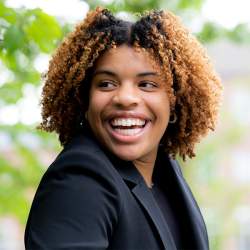
D’Najah Picou T’24
A HIGHLIGHT OF MY TUCK EXPERIENCE
A highlight of my Tuck experience was planning Tuck Black Ski. As part of this program, the Tuck Black Student Association brought together more than 300 MBA students from across the country to partake in a weekend filled with fun, skiing, and leadership development opportunities. This year, we went to Park City, UT! It was rewarding to coordinate a successful event of this caliber, and it made me grateful to be at a school that celebrates diversity and initiative.
ON THE ACADEMIC EXPERIENCE
My Global Innovation Exchange (GIX) trip to Kenya with Professor Ramon Lecuona Torras was undoubtedly the best trip I’ve been on. It was my first time visiting East Africa, and the opportunity to make a difference in the local community during my brief stay was invaluable. Since it was a project-based GIX, our group of 25 individuals was divided into five teams of five. Each team was assigned to collaborate with different startups, assisting with any challenges they faced. My group worked with Craydel, an education startup working to make the study abroad process more accessible and transparent for high school students. We were tasked with interviewing key stakeholders to gather insights into their experiences with Craydel and the overall process. We then presented our findings to the startup. Additionally, we dedicated a day to providing feedback on various startup pitches, leveraging knowledge gained from our ecosystems strategy class.
ON THE TUCK NETWORK
I found Tuck’s alumni network and database to be invaluable. One of my goals when coming to Tuck was to learn more about private equity and engage in a project within that space. When I verbalized this goal, I was met with overwhelming support and was encouraged to self-source a first-year project. Teaming up with a classmate, we combed through Tuck’s alumni network and reached out to numerous alumni. Through at least 15-20 engaging conversations, we established partnerships with the individuals we eventually collaborated with, notably Steven Drake T’19.
ON TUCK’S INTIMATE LOCATION
At Tuck, the close-knit community offers numerous opportunities for students to foster close relationships with one another. Among these, Tuck’s small group dinners are my favorite. Being welcomed into the homes of my classmates and witnessing firsthand how they live and they host has been an unparalleled experience. I had never lived away from home before coming to Tuck, so feeling like I had a family here made all the difference.
Banking
New Orleans, LA
University of Cincinnati
Financial Analyst, Walmart
Non-Profit Board fellow, Black Student Association co-chair, PEVC Co-chair, PEVC Fellow
Kenya Global Insight Expedition with Professor Ramon Lacuona Torras
Investment Banking Associate, Evercore
Entrepreneurship through Acquisition (ETA)
Tuck has allowed me to slow down and evaluate who I am, who I want to be and what it will take to get me to where I want to go. The community inspires me to be curious, thoughtful and kind.
During my first year at Tuck, one of my classmates threw me a surprise birthday party. No one had ever done that for me before, and I cried tears of joy (another thing I had never done before).
Another key encounter was connecting with Laureen Costa T’94 during the Visiting Executive Program. I’ve maintained a connection with Laureen through access to the board of directors via my PEVC fellow and co-chair role. She has been so helpful in thinking about my career after graduation.
Investment Banking Associate, Evercore
Consulting
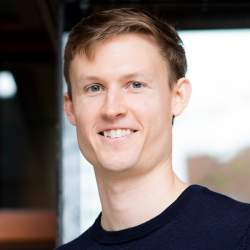
Pierce Gibson T’24
ALIGNING WITH MY PURPOSE
I chose to pursue an MBA at Tuck to better align my career path with my purpose. I wanted to explore my particular areas of interest—the food, agriculture, health, and sustainability industries—and Tuck provided me with the opportunity to do so. Further, I recognized that Tuck’s impressive core curriculum would enhance my financial fluency, particularly through hands-on experience in early-stage investing, positioning me for success after graduation.
ON TUCK’S INTIMATE LOCATION
I was drawn to Tuck because of its smaller student population and close-knit community. Tuck’s open-door policy allowed me to get 1:1 time with faculty, visitors, and alumni in my areas of interest. Knowing that my interest in food systems might be niche for a typical MBA program, I found this to be invaluable.
I was also attracted to the opportunity to be involved with the broader Dartmouth community through programs like the Dartmouth Greenshot Climate Solutions Accelerator and the Dartmouth Innovation Accelerator for Digital Health. Additionally, the opportunity to live amongst the stunning natural scenery of the Upper Valley was a significant attraction.
ON TUCK’S LEARNING ENVIRONMENT AND ACADEMICS
Academically, Tuck offers a strong core curriculum that provides one with the business fundamentals; however, I’ve been surprised at the breadth and salience of the elective courses I’ve been able to take. Engaging in courses on International Climate Negotiations, Generative AI, Venture Capital, Product Management, Global Food Systems, and Social Impact prompted me to deeply consider how to effectively integrate purpose and technology into core business strategy.
A MOMENT THAT WILL STAY WITH ME
One of my professors liked to say that “A managers hire A+ players, B managers hire C players.” The phrase implies that great managers don’t hesitate to confront challenges. At Tuck, I’ve been surrounded by classmates, faculty, and professors who are much more talented, experienced, or wise in certain areas than I am. Engaging vulnerably with them has allowed me to grow in many ways, and I look forward to continuing to surround myself with people who will expand my perspective on the world throughout my career.
Consulting
Charlotte, NC
University of North Carolina at Chapel Hill, BA, Political Science & Public Policy
Deloitte Consulting
COP28 Delegate; Tuck Center for Entrepreneurship’s Venture Learning Lab; Food & Agriculture Club; Venture Capital Investment Competition
Independent Study on Early-Stage Climate/Health Investing; Term Exchange in Germany; First-Year Project with Fat Sheep Farm
Maine Venture Fund
Current Issues in the Global Food System with Professor Jose Alvarez
Having the opportunity to partake in an Early-Stage Venture Capital Workshop with Jim Feuille, an adjunct professor and venture partner at Crosslink Capital, was an invaluable experience in my Tuck career.
Deloitte Consulting
Tuck helped me better align my career with purpose and gave me a lifelong support network of caring, like-minded individuals.
Health Care
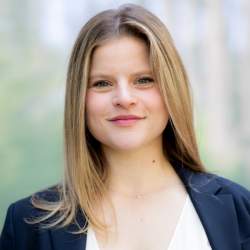
Abby Rohman T’23
WHY MBA
I knew that I loved the health-care industry but hadn’t found the right role yet. While exploring roles after consulting, I saw that most people in my dream jobs had MBAs. I recognized that the investment in myself as well as the opportunities available in business school would help me accelerate my career trajectory.
WHY TUCK
Tuck’s location makes it distinct from all other schools that I explored. My classmates have all opted into this experience; students and partners have consciously made the decision to move to a rural area and be active participants in the Tuck community. People take the commitment to the community seriously. I’m always amazed by the creativity, support, and enthusiasm of my classmates, the Tuck partners, professors, and staff. Additionally, I love the outdoor opportunities available in the Upper Valley!
ON COMMUNICATING WITH PRESENCE
The class Communicating with Presence was a life-changing experience for me. It’s a small class that is taught by a theater professor. Every week, we would practice 45 minutes of acting warmups. These exercises reinforced the importance of interpersonal connection and of presence within the body. We practiced communicating a variety of stories—made-up fairytales, our life stories, and a classmate’s life story. This course changed my relationship with my voice and gave me confidence in my ability to communicate effectively. Most importantly, practicing being present has drastically improved my stress levels.
ON VULNERABILITY
Students allow themselves to be vulnerable at Tuck, starting from Tuck Launch, our orientation program. During Tuck Launch we’re partnered with a classmate to share our “River of Life.” In this multi-part exercise, we share our story with one classmate and craft a personal mission statement. I believe that by starting with vulnerability from day one, we have created a trusting, supportive environment. Classmates throw themselves into new activities or academic challenges with the knowledge that it’s healthy to feel challenged and it’s safe to fail intelligently.
BIKING WITH PROFESSORS
Tuck’s remote location encourages connections across classes, faculty, and staff. An example is Professor Leslie Robinson’s Tuck Community Rides. Road bikers of all stripes meet up for 15- to 25-mile rides around the Upper Valley. Every week brings new participants: students, staff, professors, alumni, partners, etc. Professor Robinson is passionate about engaging her students outside of the classroom setting and encouraging us to explore the Upper Valley. On these rides I’ve met students in other class years, received career advice from alumni, and have occasionally discussed accounting concepts with Professor Robinson!
Health Care
Larchmont, NY
Dartmouth College, BA, History and Public Policy
Healthcare Consulting at EY-Parthenon and Kx Advisors
Women in Business co-chair; Tuck Sailing Club co-chair; Center for Health Care fellow; and LOTS of road biking and skiing
GIX in Vietnam; courses like Negotiations and Leading Individuals in Teams in which each case is a role-play scenario
Digital Strategy at UPMC Enterprises (Corporate VC at University of Pittsburgh Medical Center)
Communicating with Presence; Leading Disruptive Change; and Leading Individuals in Teams
To me, the pivotal moments at Tuck are the serendipitous, meaningful encounters that occur on or around campus. Sitting down to lunch with classmates I haven’t yet connected with. Chatting with my professors at the farmer’s market—These are the interactions that reinforce the connectedness of the Tuck community. And, these moments speak to Tuck being a full, immersive experience.
Advisor to Strategic Leadership Team at Corewell Health (Chief of Staff to the President of Corewell-Beamount Hospital System)
I am a more present and connected version of myself because of my experience at Tuck. With this newfound confidence, I feel I can encounter any professional challenge with poise. Additionally, my classmates have exposed me to new perspectives. Whether from a different country, different region, or the veteran community, I have had conversations and experiences that have widened my aperture.
Financial Services
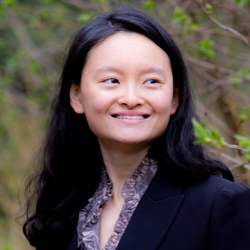
Yue Huang T’23
ON TUCK’S LEARNING ENVIRONMENT AND ACADEMICS
The academic experience and learning environment at Tuck have been exceptional. For instance, as someone without a formal health care background, I found the healthcare-themed courses and activities to be immensely informative and highly applicable to real-world scenarios. The course Structure, Organization, and Economics of the Health Care Industry provided a solid foundation of the U.S. health care industry and was instrumental in preparing me for my summer internship in health care investment banking. It equipped me with a comprehensive understanding of the health care industry’s dynamics and intricacies.
Another remarkable course that expanded my perspective was Investing and Deal Making in Health Care: Practitioners’ Perspectives which was taught by experienced bankers and venture capitalists. Through the use of real-life cases and the sharing of their investing experiences, these industry professionals enriched my understanding of health-care services, medical technology, and pharmaceuticals sectors.
Moreover, the course Entrepreneurship in Health Care Services and Technology was taught by serial entrepreneurs with extensive experience in the health care services sector. Insights from them and guest speakers who shared their entrepreneurial journeys offered a unique perspective on the industry’s developments.
These are just a few examples of the exceptional courses and faculty at Tuck. The list goes on. The learning environment at Tuck is characterized by engaged faculty, interactive classroom discussions, and a supportive community that encourages intellectual curiosity and growth.
ON THE TUCK CENTER FOR HEALTH CARE
One of the standout resources at Tuck that greatly enhanced my experience was the Center for Health Care. As a second-year fellow, I participated in monthly meetings focused on various healthcare-related topics. These sessions covered a wide range of subjects, from the latest developments in blockbuster drugs to the J.P. Morgan health care conference, from career in hospitals to venture capital investing. These meetings provided invaluable insights and served as a wonderful complement to our classroom learning, expanding my understanding of the health care field.
What made these sessions particularly exceptional was the opportunity to interact with industry experts. We had the chance to engage in discussions, ask them questions, and seek their career advice. This direct interaction provided unique perspectives and real-world insights that allowed me to make more informed decisions about my career path.
ON TUCK’S INTIMATE LOCATION
The intimate location of Tuck has profoundly shaped my Tuck experience, creating an environment that offers unique opportunities and memorable moments. I will deeply miss the tranquility and natural beauty that envelops Tuck and its surroundings.
Tuck sits right by the picturesque Connecticut River, where we kayak and canoe in the summer, fall, and spring. It is surrounded by beautiful mountains and lakes and a lot of wildlife. Farms and maple trees are within a short distance from campus where we can taste fresh farm food and meet adorable baby farm animals. During my two winters at Tuck, I learned skiing and snowboarding at the Dartmouth Skiway just half an hour away.
Away from the city, Tuck’s location nurtures an atmosphere conducive to personal growth, connection, and self-reflection. From the outdoor adventures to the close bonds forged, the peaceful environment and connection with nature have allowed me to pause, reflect, and prepare for the next exciting steps in my journey.
A MOMENT THAT WILL STAY WITH ME
On a chilly spring afternoon, I went to a serene hilltop near campus with a few friends. As the sun gracefully descended, it cast a warm glow over the breathtaking expanse of mountains, including the Killington Peak. Nearby, a pair of bluebirds fluttered in and out of their nestbox, as we chatted and shared laughter. It was during that moment that I realized how fortunate I am to be spending two transformative years in this extraordinary place and to forge lifelong friendships.
Financial Services, Investment Banking; Health Care
China
The Chinese University of Hong Kong, BBA, Professional Accountancy
PwC Hong Kong
Center for Health Care fellow; Outdoor Club co-chair
First-Year Project helping an early-stage startup refine its business model and formulate a revenue strategy; entrepreneurship project with The Dartmouth Innovation Accelerator for Digital Health (DIADH) developing a digital health solution for patients and providers
UBS Investment Bank, Healthcare Group
Structure, Organization, and Economics of the Health Care Industry with Professors Paul B. Gardent and Mike Zubkoff; Investing and Deal Making in Health Care: Practitioners’ Perspectives with Professors Michael McIvor, Michael A. Carusi, Suzie Rubin and Mike Zubkoff; Entrepreneurship in Health Care Services and Technology with Professors Adam Groff, Trevor Price and Mike Zubkoff; Entrepreneurial Finance with Professor Morten Sorensen
Together with my fellow co-chairs, I organized an ice climbing event that took students on a full-day adventure in the White Mountains. It was the first collaboration between the Tuck Africa Club and Tuck Outdoor Club.
UBS Investment Bank, Healthcare Group
As an international student, Tuck warmly embraced me and provided the support I needed to adapt to a new environment. It is through Tuck’s transformative experience that I was able to successfully transition into a career in health care investment banking. Tuck has provided me with the knowledge, skills, and network necessary to excel in my chosen field. As I embark on my post-MBA adventures, I feel fully prepared to navigate the complexities of the business world.
Energy and Sustainability
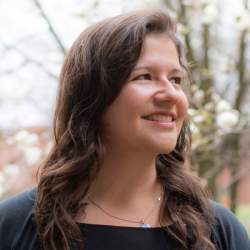
Kate Bayeux T’23
HIGHLIGHTS FROM MY TUCK MBA
Tuck gives you the tools you need to make a difference and then helps you to execute. For me this meant turning a conversation I had with classmates about climate change’s pervasive impacts, into an Earth Week event that brought this issue to the forefront of conversations at Tuck. We were able to leverage our resources at the Revers Center while also reaching out to other club chairs about putting together one-pagers on how climate change impacts their sectors. Through these channels we were able to engage a larger audience and learn from one another about how one issue can manifest in drastically different ways depending on the industry.
ON CAREER RECRUITING AND SUPPORT FROM THE COMMUNITY
Although the investment banking recruitment process can be demanding, the entire Tuck finance community is willing to support you through the process. This means one-on-one coffee chats with second-years as you craft your “why banking” story as well as study sessions late into the night with your fellow first-year classmates as you learn how to walk through a DCF. It also means frequent visits to our career services adviser Deirdre O’Donnell’s office to talk about everything and anything recruitment related, including frequent check-ins. And once all the prep is done, the community also celebrates the successes of all its members. Rather than being cutthroat, we are collaborative, and work as a team to ensure the success of our classmates. The incredible Tuck network starts here, in the recruitment process.
ON THE REVERS CENTER FOR ENERGY, SUSTAINABILITY AND INNOVATION
As a career switcher interested in pivoting into the energy industry with no prior experience, I relied heavily on programming with the Revers Center for Energy, Sustainability and Innovation. During my first year at Tuck, I learned everything I could through the weekly Power-Up Thursday lunch-and-learn sessions, participation in case competitions as well as through course offerings. As a second-year student, I took on leadership opportunities that allowed me to continue learning about the industry while also giving back to the broader community. Having the opportunity to attend COP27 was incredibly enlightening and allowed me to broaden my viewpoint on climate change to include a diversity of perspectives. Several of these perspectives came directly from those who are most impacted by climate change. I believe that these experiences together prepared me to be a better and more well-rounded leader in the space.
VULNERABILITY FROM DAY ONE
Tuck’s tight-knit community allowed me the opportunity to be vulnerable with my classmates from day one. During Tuck Launch we were assigned a River of Life Partner to share our life story with—everything that we think made us into the person we are today: the good, the bad and the pivotal. When I shared my story with my partner, we were both blown away by how many similarities we shared, despite growing up on opposite sides of the country. I once again was given the opportunity to be vulnerable with my classmates when I delivered a Tuck Talk, providing intimate details of my life experiences with all 300 of my classmates in attendance. I cannot imagine having the strength to be vulnerable in any other environment and I am so thankful Tuck’s community provided me with this incredible opportunity. These events strengthen the Tuck fabric and allow us to form unparalleled connections, inviting others to also be vulnerable, thus creating a cycle of support.
MY ADVICE FOR PROSPECTIVE MBAS
Saying no to some things is a way of saying yes to others. While it’s true that you get out of Tuck what you put into it, sometimes the best way to get the most out of your experience is to choose fewer activities but excel at those few. Tuck is incredible because there are so many different paths to pursue and organizations to be a part of. But over my two years at Tuck I have found that by focusing on a smaller number of activities I have been able to truly help shape their trajectory and leave my mark on Tuck. You also don’t need to be a member of every club in order to interact with your classmates—some of the most meaningful interactions happen over a cup of coffee at Joe’s.
Financial Services, Investment Banking; Energy
Basking Ridge, NJ
Villanova University, BA
Federal Reserve Bank of New York, Markets Group
Finance Club co-chair; Revers Center for Energy, Sustainability & Innovation fellow; Tuck Student Initiative for Decarbonization director; Tuck ESG Fund Director; Leadership Development fellow; Tuck Mentor
Tuck Environmental, Social, and Governance (ESG) Fund Director: through the sessions offered during the accompanying practicum I was able to learn not only various ways of evaluating firms on ESG criteria, but also how to interpret both what is and is not said in a firm’s reporting. Taking this information and presenting it to my fellow directors and guest portfolio managers gave me invaluable practice making pitches and learning what is vital to pull out in an investment memo. Seeing that work turn into actual investments for the fund was not only satisfying, but also invigorating.
Barclays, Power & Utilities Group, Investment Banking
There are so many incredible ones, but I think my favorite was a December mini elective called Financial Reporting for CFOs. The course work drew from what we learned throughout the core classes and asked us to apply that learning by thinking critically about real challenges that CFOs face.
Attending the COP27 Energy Conference in Sharm el Sheikh and witnessing the ongoing climate negotiations in real time. Moderating a panel on Business and Climate Change with a few of the authors of the recently released Handbook on Business and Climate Change. Assisting a goal during the Winter Tripod Championship Game (helping us ultimately win the game!)
Barclays, Power & Utilities Group, Investment Banking
Tuck has provided me with a safe space to take risks and learn from failures. Throughout my time at Tuck, I have pushed my boundaries on all fronts to facilitate personal growth. Whether it’s going for the goal in Tripod, even when, as a novice ice skater, I know full well that I need to have my hockey stick on the ice for balance, or pursuing an independent study into a topic I know very little about, I have tried to embrace everything Tuck has to offer. By doing this, I have learned that what may have once seemed terrifying or had the potential for failure in my eyes, were actually incredible opportunities for growth.
Technology
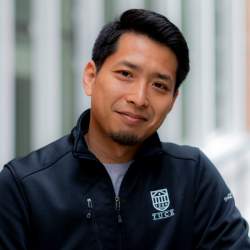
Kakeru Tsubota T’23
WHY MBA
On one hand, I wanted to refine my skills to prepare me to manage a team of diverse perspectives and backgrounds before I landed a career in the U.S. The truth is that, on the other hand, I had long dreamed of the journey of spending time with the world’s sharpest minds. The ten years I had spent wishing for it made me appreciate even more the value of spending two years at Tuck.
STAYING ENGAGED
As I will soon be working for a Tuck alumnus, Zach Hogan T’14, I am confident that I will have opportunities to practice the wise, decisive leadership that Tuck has prepared me with. I aspire to serve as an active alumni member to give back to the community. The problem is that I have too many role models, including Ace Suzuki T’00, Steven Tseng T’01, and Akiko Maeda T’02, who continue to spend significant time with Tuck and provide integral mentorship support to current students.
A FEW HIGHLIGHTS FROM MY TUCK MBA
Building camaraderie with like-minded classmates at International Orientation; pitching my platform at the Student Board election; and sharing my personal stories at Tuck Talks. These opportunities to learn about unheard voices and advocate for them led to the belief that everyone at Tuck has something to teach the community. In March 2023, I founded ExperTuck Peer Learning Theaters with four other mindful and thoughtful students who shared in this belief. As soon as we saw 19 students and partners step forward to share their expertise with the entire community, we became confident the event would become an annual tradition at Tuck.
WHAT SETS TUCK APART
It’s the alumni network. The 200+ alumni I reached out to during my two years at Tuck all left me feeling like they were genuinely excited to offer a helping hand. In the Tuck network, I have already found a few lifelong mentors. Tuck alumni helped me land my dream job. Quite a few alumni also encouraged me to take on a leadership role at the Tuck Club of Japan.
SHARING MY STORY AT TUCK TALKS
I would never forget the nerve-wracking feeling on the Tuck Talks stage in the fall term of the first year. I was unsure how the packed audience would react to my personal story. It turned out that I received countless hand-written message cards, texts, emails, and in-person encouragements, which all showed how much the community cared about my story that evening. It was the first night of many when I felt the community had all ears to what I had to tell.
WHAT I’LL MISS MOST
Walking into classmates everywhere you go. Murphy’s: the unofficial Tuck bar. People forgetting how to lock their units because they have never done so.
Hanover has become my second home. As a father of three kids, I am beyond grateful for the inviting community. Quoting my wife who has never spent time in a distant location so far from home; “Tuck has been extremely welcoming to the partners and families. Hanover is the first and only location where I felt like I could be my genuine self, outside of my hometown.”
Technology
Fukui, Japan
International Christian University (Tokyo, Japan), BA, International Relations
Chief of Staff to Chief Transformation Officer, SAP Japan
Quality of Life Chair, Tuck Student Board; Co-Chair, Technology Club, Entrepreneurship Club Co-Chair, and Asia Business Club; Founder, ExperTuck Peer Learning Theaters; Tuck Admissions Associate (Admissions Interviewer); MBA Fellow, Center for Digital Strategies; Student Leadership Board, Magnuson Center for Entrepreneurship; Teaching Assistant, Analytics I & II and TuckLAB (Entrepreneurship for Undergraduates); MBA Tutor, Analytics and Financial Accounting; Tuck Peer Support Counselor; Board Member, Tuck Club of Japan
FYP with Dream.org, a non-profit organization fighting against post-incarceration injustice; Worked with Megan McGee from Peak Tide Operating Partners to support her ETA pursuit as part of an elective course, Entrepreneurship through Acquisition; Externed at CariClub, a New York-based HR tech startup, as part of another elective course, Diversity Entrepreneurship Collaboration Practicum
MBA Summer Intern, Strategy and Operations, ServiceNow
Leadership Out of the Box by Professor Ella Bell. This course focuses on internalized reflection on our leadership archetypes and goals, through studying various role models. A group of us had the honor of exploring a case study on the leadership journey of Alex Torpey, town manager of Hanover, Dartmouth's home base. Inspired by his fresh, entrepreneurial spirit, we decided to invite him to a school-wide conversation. I can’t advocate enough for Tuck’s focus on personal reflection and opportunities to share key lessons with the rest of the community.
On a Sunday in April 2021, Kinya Seto T’96, CEO of LIXIL Corp., called me personally congratulate me on my admission to Tuck, when I was still choosing a school to spend the next two years with. Since then, he has never hesitated to make time to chat, providing me with a breadth of management insights through his extensive leadership experience as a CEO. Leela Srinivasan T’06, CEO of Parity, and I sat at the same dinner table in April 2022, when she was visiting Hanover for the Tuck MBA Council meeting. I am honored to be able to call her my mentor to advance my career in Silicon Valley. It has been an extremely humbling experience to build a personal relationship with two Tuck Advisory Board members and speaks volumes about the most inviting and caring alumni network in the world.
The Tuck community shares a fundamental belief in celebrating others’ success and empowering them to pursue bold visions. When I shared some ideas to revitalize the alumni chapter in Japan, Tuck alumni encouraged me to formalize the Tuck Club of Japan and invited me to sit on its board before I even started Tuck Launch. When a classmate of mine and I sat down in the Byrne Dining Hall and discussed how we could further facilitate the peer-learning culture at Tuck, a few classmates and faculty members excitedly joined our table and added so many ideas, which eventually led to the inaugural ExperTuck Peer Learning Theaters. People here are the fundamental reason why I keep myself devoted to and invested in the community.
Business Manager, Strategy and Operations, ServiceNow
Entrepreneurship
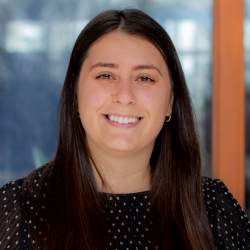
Ania Aliev T’23
WHY MBA
I decided to pursue my MBA because I wanted to make a career change and pivot more into an entrepreneurial path. I felt like the path I was on before was very linear and I would not be able to switch to a more entrepreneurial role without filling out some missing skills. Given that, I thought pursuing an MBA would be the perfect opportunity to fill some of those gaps and make the big change to entrepreneurship.
WHY TUCK
I picked Tuck because of the small class size and emphasis on community. I knew I wanted to be a part of a more intimate class and saw the value of that right away. At Tuck, you can participate in almost any activity or club that you want. Additionally, due to the class size, you naturally get to know more of your classmates better as well as many of the professors. Finally, I wanted to be part of a strong community (both with current students and alumni) and that is exactly what I have gotten here.
ON TUCK WOMEN IN BUSINESS CLUB
There are so many things to get involved with at Tuck, but one of the biggest highlights for me has been my involvement with the Women in Business Club. I was fortunate enough to serve on the board during my first year as a programming and events co-chair and this year currently serve as the club president. I am extremely passionate about the promotion of Women in Business across all sectors and have enjoyed helping facilitate all that the club does for current students and alumni. One of the new initiatives that I implemented for this year was the creation of a newsletter team. The newsletter team focuses on creating an issue (around a certain theme) once a term highlighting female classmates, professors, and alumni.
MY ADVICE FOR PROSPECTIVE MBAS
I would advise people to think critically about why they want to pursue the MBA and what is most important to them about a program. Additionally, I would encourage people to think about what career paths are most interesting to them before getting to business school, but to not be afraid to explore something new. I feel that Tuck is the perfect place for exploration given its size, so there is never a doubt that you can explore new industries and career opportunities (whether it be through clubs, classes, or chatting with alumni). For example, many of my classmates have experimented with entrepreneurship while at Tuck, but few are starting their careers post-MBA in that industry, so overall, this is a great time to try something new and explore new industries even if it is not where you are planning to start out.
ON FEELINGS OF IMPOSTER SYNDROME
It is completely normal to have feelings of imposter syndrome. Personally, this is something I had to quickly get over as I am one of the younger members of my class. At first, I felt like others had more experiences to draw from, but I realized that almost everyone’s background was different and we could all learn from each other. Additionally, imposter syndrome can creep in as you think about recruiting and what you would like to do post-MBA. It is important to remember that you are meant to be where you are and it is completely normal to ask tough questions of potential employers.
Entrepreneurship
Boston, MA
Trinity College, BS, Psychology
Institutional Sales Associate on the Sales & Trading Desk at Needham & Company
Tuck Women in Business President, Entrepreneurship Club co-chair, Inclusive Workplace Fellow
Global Insight Expedition Israel: Technology and Entrepreneurship in Israel with Professor Adam Kleinbaum
Maynard Grant Participant
Corporate Communications and Power and Influence
Entrepreneurship through Acquisition
Consulting
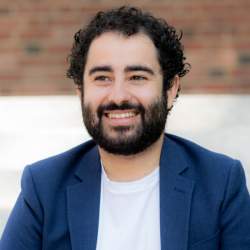
Andrew Key T’23
WHY MBA
I had an internship at The Aspen Institute’s Initiative on Financial Security that really reframed for me the ways in which I could contribute to societal good. I no longer had to become a policy analyst or a speechwriter (or specifically a Sam Seaborn for my fellow West Wing fans out there). I saw that MBAs in the public, private, and social sectors could speak a common language and get things done, leveraging the individual strengths of the various sectors for a comprehensive solution.
This latter approach resonated better with me in terms of a theory of change as well as in terms of the professional experiences that I could potentially have.
WHY TUCK
After setting my personal non-negotiables (top program, explicit focus on cross-sector collaboration, small class size), I knew I was optimizing for happiness. Tuck quickly established itself as the far-and-away leader on that dimension. While I technically applied to multiple schools, in my heart of hearts, I only ever truly applied to Tuck.
I loved that it is a community of people who specifically wanted this experience; a “24/7 MBA” in a small town off the beaten track, and that they were willing to uproot themselves in order to get it. And based on the levels of alumni engagement, it was clear that the attachment to this community had real staying power—it was not just something you did to help two years more pleasantly go by. By going to Tuck, you are expanding your identity for life.
HOCKEY AND COMMUNICATING WITH PRESENCE
As someone who earned his high school varsity letter in debate, going into a real Division I locker room and hitting the ice beneath the jumbotron for Tripod tryouts (everyone gets picked, they just want to evenly distribute the lucky few who went to ice rink birthday parties as kids) was easily my first Friday Night Lights-sort of experience. That was just a really, really cool moment, and I am absolutely going to hang my framed hockey jersey one day.
More substantively, I remain in awe of the heart that every one of my classmates brought to our hybrid acting/leadership development/public speaking course Communicating with Presence. The confluence of sincere reflection and the courage to publicly share one’s true self caused emotional tears to be a regular byproduct of class time. Oftentimes this came just minutes after a good run of laughing tears because the radical shedding of self-consciousness and hesitation required us to be plenty silly. I cannot tell you the first thing of how/why this class works, only that Professor James Rice is a miracle worker.
SUPPORT FROM CAREER SERVICES
Caroline Cannon T’98 is the career adviser for social impact and entrepreneurship (in addition to holding a number of other cool complementary roles at Tuck, like being one of my professors for the Diversity Entrepreneurship Collaboration Practicum) and she is my rock. When I told her that my first-choice employer had invited me to interview, she was fully there for me, scheduling at least a half dozen mock interview blocks. And thanks to deep personal familiarity with the field, she was able to just devise new cases on the fly. By the time the interview came, I felt super ready, and I was able to secure the offer.
A CULTURE OF CO-INVESTMENT
Tuck’s small size plus its culture of “co-investment” means that there is no room for loafers. Intentionality with this school does not end once you unload your moving truck; by choosing Tuck, you are choosing to take ownership of a slice of life at Tuck. Even something as simple as making sure that Tuckies get home safely after long nights out is student-owned; we have the SafeRides club to coordinate nightly coverage of designated drivers from a student body-wide pool of volunteers.
The number of jobs to be done lines up pretty well with the number of students, and it creates a motivating sense of shared communal purpose. Moreover, I think it means that there are enough leadership and other developmental opportunities to go around: Getting involved in campus life does not come with the corresponding hoopla of getting involved in a competition. In addition, I think it also keeps the programming fresh and relevant. Events happen because a group of students care enough about the event to put their own sweat equity into it. That’s very different from a model where the school’s administrators take the lead on coordinating student life.
ON TUCK’S INTIMATE LOCATION
When I was a teen living in Florida, a lot of people used to say, “I live where you vacation,” and that used to make me roll my eyes. But now that I live in a place where I inhale the scent of pine as I canoe, where I sit under a starry night sky with my firepit, where I’m a text message and a short drive away from being with a dozen buddies at a world-class ski resort (and then just run into a dozen other friends when I’m there), I finally understood what those Florida folks were getting at. I just didn’t appreciate at the time that my idea of an amazing vacation involved wearing flannel and eating maple everything. It’s a real gift to be able to call the Upper Valley my home, even if only for a short period of my life.
MY ADVICE FOR PROSPECTIVE MBAS
Just as you (probably) would not write a fifty-item checklist for a new friend, focus on your key non-negotiables and operate with an open mind from there. Like friends, the schools with which you click might surprise you. On that point, after you have had some time to reflect, trust me that deep down you will know whether a school feels right. From there, you can do no wrong.
Consulting/Nonprofit
Gaithersburg, MD
Cornell University, BS, Industrial and Labor Relations
Consultant, KPMG. Advised large enterprise clients through their digital transformations of their HR, Finance, and Supply Chain functions.
Diversity Conference co-chair; Low Income/First Generation at Tuck (LIFT) co-chair; Consortium for Graduate Study in Management co-liaison; Non-Profit Board fellow; Center for Business, Government & Society fellow; Study Group manager, Tuck Business Bridge; Tripod Hockey
Consultant, The Bridgespan Group. Helped nonprofit client operationalize a new service delivery model as part of a strategic refresh.
Corporate Valuation; Managing for Social Impact; Countries and Companies in the International Economy
Consultant, The Bridgespan Group
Consulting

Francesca Ferrero T’23
HARNESSING MY MBA TO GIVE BACK
Through the learning experience in classes, active participation in class, and interactions with my classmates, Tuck has helped me deepen my understanding of what it means to be a wise and purposeful leader. I know being decisive demands courage and will not be easy, but I believe Tuck has given me the right tools to figure it out. I feel grateful for having the opportunity to gather so much knowledge in a country and culture significantly different from mine. With this in mind, I plan to use my MBA to give back and help create more opportunities for Peruvians, especially women. Specifically, in the long term I want to put all the lessons I learned into practice in the family business, looking to scale it up and expand its social footprint.
THE BEST PART OF MY TUCK MBA
After almost two years at Tuck, I can say that one of the highlights of my experience has been the people. Tuck students share this special trait that smoothly combines both intellectual and emotional intelligence, making them super smart, kind, and always willing to help at the same time. I will never forget how amazed I was with the genuine excitement of my classmates to learn about Peru, my home country. Almost 50 percent of the class voluntarily signed up to be part of the student-organized Peruvian Trek. I can proudly say that interactions throughout the trip helped everyone meet more Tuckies and deepen existing bonds.
A TRUE SENSE OF BELONGING
With the risk of sounding redundant, rooted from the people themselves, the tight-knit community at Tuck is truly unique. During these two immersive years, classmates create a special strong bond, making everyone go above and beyond to invest in others’ success. This is particularly evident during the recruiting season, where second-year students are eager to help first years on navigating this process, even if this entails putting aside many hours for coffee chats, casing, and interview prep.
The sense of belonging developed at Tuck transcends time, reflected in the alumni network’s openness to help and genuine interest in current students’ success. Coming from a different culture, the intense networking dynamics were completely new to me, making me naturally nervous about my adaptation process. That anxiousness was soon drifted away by the incredible help from Tuckies working at a vast number of firms and cities.
EMBRACE THE PERSONAL JOURNEY
My advice for prospective students would be to remember that there is no right way to experience your MBA at Tuck. Be sure to embrace it as a personal journey and seize the opportunity of pursuing an MBA; it is certainly a privilege. I finally confirmed what worried me at the beginning: two years in an immersive experience at Tuck happened incredible fast, so make the best of them.
Consulting
Perú
Universidad de Lima, Industrial Engineering
Alicorp S.A, consumer and B2B products company
Consulting Club co-chair; LAIBC co-chair; Latin America Admissions Regional captain Tuck Mentor; Tuck Community Consulting
Global Insight Expedition to Norway; First Year Project helping a Vermont local business to develop and design an efficient pricing strategy
Summer Consultant, Boston Consulting Group, New York
Corporate Valuation with Anant Sundaram; Power and Influence with Pino Audia; Strategy in Emerging Markets with Ramon Lecuona
Tuck’s unparalleled close-knit community has allowed me to develop meaningful relationships with faculty and classmates from all over the world. To date, the first Tuckies I met from my first assigned study group remain as my closest friends. Study groups changed, I met other amazing people, but we still formally gather at least once per term to have dinner. Another key Tuck encounter was planning, alongside other Peruvian Tuckies, a trip to Peru for over 120 classmates. It was really rewarding to see how this trip made it to the list of favorite Tuck moments for many of them.
Consultant, Boston Consulting Group, New York
I came to Tuck with my partner, Nicolas Rizo Patron T’23, without fully understanding the incredible impact an MBA would have on my life. At Tuck, I not only deepened my leadership skills, I was challenged and driven out of my comfort zone, which allowed me to learn more about myself every single day. One of the most important lessons I will take with me from Tuck is that passion is the ultimate driver for making things happen.
Technology
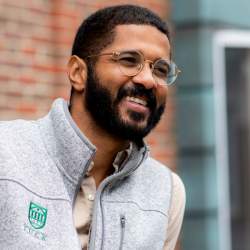
Adrian Rodriguez T’23
WHY MBA
As someone with a liberal arts background, I always had a keen interest in developing my quantitative and managerial skills. So, I figured that enrolling in a business school was the perfect way to achieve my goals. After working for seven years in various tech companies, both big and small, in business development and sales roles, I felt that the time was right to take the leap and explore new functions within the tech sector.
I made the decision to pursue further education because I wanted to challenge myself and broaden my horizons. I was excited to delve into different aspects of the technology industry and gain a deeper understanding of other functions. I had every confidence that the academic rigor of a business school program would provide me with the necessary tools and knowledge to tackle complex business problems and make informed decisions that would drive organizational growth, something as aspire to be part of as I progress in my career.
WHY TUCK
When considering where to pursue my MBA, I had a clear vision of what I wanted out of the experience. Living in New York City, I craved a change of pace and scenery. I wanted to be a part of a small and remote community, free of distractions, where I could fully immerse myself in my studies and IN MY personal growth, just like I did for my undergrad. Tuck offered me that and more.
What drew me to Tuck initially was its reputation as one of the best MBA programs in the country. However, what truly impressed me was its unique, close-knit community. Throughout the application process, I was blown away by how responsive and helpful everyone was. The admissions team, current students, and alumni all took the time to answer my questions and share their experiences, making me feel welcomed and valued.
As I learned more about Tuck’s culture, I realized that its collaborative and supportive community was exactly what I was looking for in a business school. The faculty and staff are committed to providing a personalized educational experience, and the small class size ensures that every student receives individual attention and support. Tuck’s immersive First-Year Project and second-year Elective Curriculum offer opportunities to apply classroom knowledge to real-world challenges, preparing students to become effective leaders and problem-solvers.
When I received my acceptance letter from Tuck, my decision to accept the offer was easy. I knew that Tuck’s community, combined with its exceptional academic program, would provide the transformative experience I was seeking. I am excited to be part of the Tuck family and to contribute to its legacy of producing outstanding business leaders.
ON TUCK’S CENTER FOR DIGITAL STRATEGIES
My career has been exclusively in the AdTech space and although I’ve found the industry fascinating and impactful, I also wanted to expand my understanding of other areas in tech. Being a Center for Digital Strategies fellow has allowed me to do just that. CDS fellows are curiously-minded individuals who bring different and unique perspectives about relevant topics in the wider tech industry. The best part is our bi-weekly sessions where we get to dive deeper into different topics and questions relevant to the future and the role technology plays in it all. Over the last year, I have had the opportunity to work on a fellowship research about the future of work in regards to hybrid and remote work. This research has allowed me to speak with various executives and business leaders gaining their knowledge and perspective to inform not only my project but also for my career and aspirations as a future business leader.
ON THE TUCK ACADEMIC AND LEARNING EXPERIENCE
It’s been transformative. One of the best parts of being at Tuck is the diversity of different class structures you can have; from experiential, to lectures, to case-based—there is a learning method for everyone. I was particularly grateful to engage in the experiential classes, such as the First-Year project (FYP). During my FYP, I, along with four other students, got to work with Wayfair as an MBA consultant to solve a real strategic problem for them. We met regularly and collected all the data we needed, making sure we stayed within our scope. After months of analysis and research, we delivered a final recommendation with clear steps and risk assessment the Wayfair team found extremely valuable as they were building up a case internally. It was great opportunity to be part of such a unique experience of delivering great value to a well-known organization.
RELATIONSHIPS WITH FACULTY
Building authentic relationships with your professors is a big plus of being at Tuck. Due to the size and just the general culture of Tuck, it is amazingly easy to engage with professors in ways that I never would have imagined when I first came to campus. As co-chair of the Hispanic-American Student Association (HASA), I’ve had the amazing opportunity to collaborate closely with two Latino professors, Professor José Alvarez and Professor Ramon Lecuona, on programing, increasing the pipeline of Latinx students to campus, and bringing alumni to speak with our current members.
One of my favorite events was being able to host a welcoming hike and breakfast session for our HASA members at Professor Alvarez’s beautiful barn. He was kind enough to open his home to us and allowed us the opportunity to kick off the year with such a wholesome bonding event. Professor Lecuona helped us put together a great tequila tasting event for the school which was a big hit.
ON LEARING TO SKI
I was skeptical about learning how to ski as it is an obviously dangerous and expensive activity but boy have I fallen in love with it. Being in the Upper Valley has made it easy to dedicate time and energy to the sport. It also provides a great bonding exercise with other new learners. It is hard to imagine doing this in any other place outside of Tuck!
ON WHAT I’LL MISS MOST
What I will miss the most about the Tuck community is undoubtedly the people. From my fellow students to the faculty and staff, everyone at Tuck is incredibly supportive, collaborative, and inclusive. The sense of belonging and connection that I have felt here is unparalleled, and I know it will be hard to find elsewhere.
One of the things that made my time at Tuck so special was the opportunity to participate in the school’s unique traditions. Whether leading certain clubs like HASA and the Consortium for Graduate Study in Management, enjoying winter festivities and activities from skiing to tripod hockey, or getting to know different students at various Tuck Tails events, these traditions have helped to build a sense of identity and pride within the Tuck community. I will always cherish these memories and the relationships that I have formed through them.
As I prepare to leave Tuck and move on to the next chapter of my life, I feel grateful for the experiences and connections that I have gained here. The Tuck community is truly a special and tight-knit group, and I know that the relationships and memories that I have built during my time here will stay with me for a lifetime.
Technology
Lynn, MA
Bowdoin College, BA, Government & Legal Studies
AdTech Partnerships
Center for Digital Strategies fellow; Co-chair of Hispanic-American Student Association; Co-chair of Consortium for Graduate Study in Management; Tuck Community Consulting; Tuck Mentors; Ski Club; Black Students Association at Tuck (BSAT)
During my first term at Tuck, I had the tremendous opportunity to be part of the Tuck Community Consulting Club. I worked with local nonprofit Counseling Associates to help them solve a pressing strategic issue. I was able to connect with other Tuckies outside of my Study Group and also learn how to work like a consultant for an organization looking to improve and expand their services to the broader Upper Valley community—a definite highlight of my Tuck experience.
Business Program Manager, Microsoft
Managerial Accounting; Real Estate
Tuck Black Ski; Tuck Winter Carnival; A hike followed by breakfast at Professor José Alvarez’s house for a HASA brainstorming session; Lunch with Professor Joseph Gerakos; Tequila tasting with Professor Ramon Lecuona
Sales Excellence & Strategy Manager II, Microsoft
I came to business school with two specific and targeted goals: to become more data-driven in my decision-making and to become a more comfortable and impactful leader. Throughout my time at Tuck, I can say that I’ve certainly transformed myself in those two areas.
My choice of elective courses such as Professional Decision Modeling, Data-Driven Analytics, Growth Economics, Managerial Accounting, and many others have elevated my quantitative and data-centric approach to making important business decisions.
My involvement in clubs, especially in leadership roles such as being co-chair of HASA and of the Consortium, have allowed me to harness my leadership skills to help mobilize different groups of people for a common cause—whether through organizing specific events, bringing in new speakers, or working with admissions and professors to enhance the experience of student members. I feel I am a much more confident leader walking out of Tuck than when I first came in.
Health Care
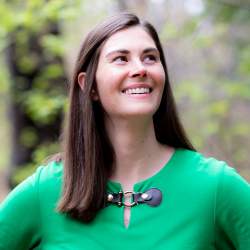
Lena Rice T’23
WHY TUCK
I chose to pursue an MBA at Tuck because of its small and intimate community, strong alumni network, health care resources, and proximity to the outdoors. Although those reasons are not unique to me, they have definitely rung true throughout the past two years. I have become much more confident in my decision making and ability to lead others within Tuck’s trust-based community. It has enabled me to get out of my comfort zone and take more risks.
MY TUCK HIGHLIGHTS
There are several highlights from my time at Tuck, but a few that stand out are:
ON TUCK’S LOCATION
Tuck’s location has certainly been a defining factor of my business school experience. Few schools can boast limitless access to outdoor activities and a student-run hockey league that encourages participation regardless of skill level. Having the opportunity to live in the Upper Valley for two years away from the distractions of a city is pretty unique. Tuckies spend time together on weekends, going skiing and hiking, playing hockey, tennis, squash, paddle, you name it—this, I would argue, forges bonds unrivaled by other MBA programs.
WHAT I’LL MISS MOST
Reflecting on what I’ll miss most about Tuck, it is definitely the people. It is a privilege to be surrounded by approximately 300 intelligent, engaging, and supportive classmates on a given day. After working in isolation during the height of the pandemic, it was a welcome change to meet and learn from hundreds of people in person every day. Although I’ll miss the energy of Tuck’s small but mighty community, I feel immensely grateful for the lifelong friendships I’ve formed.
Health Care
Philadelphia, PA
Amherst College, BA, Psychology and French
Optum, Senior Consultant; Advisory Board Company, Consultant
Tuck Social Venture Fund, Center for Health Care fellow; Center for Venture Capital/Private Equity fellow; Health Care Club co-chair; Squash Club co-chair
Business Development & Partnerships Intern, Thirty Madison
Entrepreneurship in Health Care with Professors Trevor Price, Michael Zubkoff, and Adam Groff; Corporate Valuation with Professor Anant Sundaram; Health Care Analytics and Society with Professor Lindsey Leininger; Investing and Dealmaking in Health Care with Professors Michael Carusi, Michael McIvor, Suzie Rubin, and Michael Zubkoff
Moderating a health care investing panel at the Private Equity Venture Capital Conference with Leah O’Donnell of Seae Ventures and Daniel Gottlieb of Broadview Ventures; Facilitating a health care speaker event with John Parker, CEO and founder of Springhood Ventures, to discuss early-stage investing in children’s health.
Sr. Director, Strategic Partnership Alliance at The Health Management Academy
Tuck Social Venture Fund student director: working with a team of nine peers to operate and manage an early-stage impact investing fund, including sourcing new companies, performing due diligence, developing investment memos and recommendations, managing portfolio companies, and leading alumni relations; Center for Private Equity and Venture Capital fellows project: developed an investment thesis promoting investment in women’s reproductive health and the Medicaid population; sourced FYP with Materna Medical, a women’s reproductive and sexual health medical device startup to develop a consumer-facing app and improve the user experience; Early-Stage VC workshop with Jim Feuille
Tuck has transformed me into a more confident and authentic person, teammate, peer, and leader. From experiential learning and coursework to social activities and personal relationships, I have taken more risks and have gotten involved in programs and activities I might not have tried otherwise.
Tuck has inspired me to be deeply curious, to constantly surround myself with much smarter people than myself, and to not be afraid to ask questions. As my time at Tuck comes to an end, I am even more motivated to prioritize continuous learning throughout my professional and personal life.
I look forward to upcoming reunions when I can reconnect with classmates and hear about all their professional and personal accomplishments!
Health Care
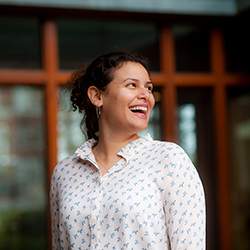
Gissell Castellón T’22
Highlights from my Tuck experience include bonding with my Consortium classmates via ski trips, our end-of-first-year celebrations, and Zoom homework help sessions. The Consortium community is where I met my first Tuckies who became a family far away from home. A major highlight of my experience was the class trips I was fortunate to go on where I got to meet new classmates and befriend people that went on to become my best friends. On these trips I also conquered some of my fears: hiking where bears live, treading water in the sea, and fear of heights in the Alps. When I contracted COVID, I relied on my Tuck community to get me through. It was a dark time, but the bright side of it was letting others help me in my time of need—something that is incredibly hard for me to do and let go of. My classmates were the sweetest—not only checking in on me but also delivering groceries and home cooked meals.
The top three things I’ll miss about Tuck are the location, living close to friends, and having easy access to ski mountains.
The location: My first year at Tuck was infinitely better because we were so remote and were able to be outside while weathering through the pandemic. Did the pandemic make it a little harder to meet people? Yes, but we were still able to bond and really get to know each other living in the Upper Valley.
Friendships: I live five minutes from every person I am close to at Tuck. Some are within walking distance and some are within driving distance, but I won’t ever be at a place where I can have all my favorite people in one spot again. More coordination will be necessary as we all spread out in the country and abroad. But these bonds will never be broken.
Mountains: While at Tuck, I fell in love with skiing (after taking a few one-on-one lessons and of course the group lessons). After avoiding being outside for too long in the brutal winters of Minnesota, I embraced all that winter had to offer at Tuck. I cannot wait for ski season to start and continue to improve my skiing, although I will miss my beginners ski crew and seeing Tuckies on the slopes.
If you are ready to learn new things in a place that is unlike any big city with a group of people who are invested in your success, there is no place better than Tuck. You must be willing to take the leap and push yourself out of your comfort zone.
Health Care
Miami, FL
Wellesley College, BA, Abstract Mathematics and French
Sr Merchandise Planner, Target Corporation
Consortium Liaison, DivCo Co-Chair, Hispanic-American Student Association (HASA) Co-Chair, Next50 Co-Chair
Diversity Entrepreneurship Collaboration Program, John Lewis Case Competition, Small Business School Challenge
Summer Associate, Bain Boston
My top 5 favorite electives include: Taxes and Business Strategy; Arrhythmia of Finance; Leadership in the Global Economy; Power & Influence; Communicating with Presence
Meeting classmates for the first time while we learned how to ski at the Dartmouth Skiway; fulfilling my dream of hosting the Tuck Diversity Conference; bonding with my OG study group over Zoom; going on class trips to new places (last frontier, ocean, Alps); setting up Next50 for success
Optum Launch Leadership Program
Does transformation ever really end? I feel that while at Tuck I learned how to have more patience while facing the unknown, how to have the courage and confidence to share my perspective, and how to take time for self-reflection and not think that it is time wasted.
Technology
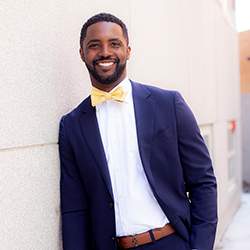
Kevin White T’22
Once I got my architecture license and moved into corporate architecture, I was able to gain exposure to the business side of hotel brands and broader business decision-making. In concert with a growing interest in innovation within the tech industry, I found the barrier to successfully pivoting into a new industry was my lack of a strong business foundation. It was then I began to explore top MBA programs, with the goal of gaining long-term career flexibility and a clearer pathway into the tech industry.
Tuck rested at the intersection of the things I identified as most important for an MBA program: a flexible curriculum that allowed me to explore the business world without choosing a path before I knew what was available to me, an immersive learning experience that provided access to professors and thought leaders from which I could further my learning through conversations outside of the classroom, and a social experience that rested outside of my comfort zone as someone who had lived in a city my entire life. It was important to me that my MBA experience come with a bit of stretch; that I was going to be challenged to develop personally and professionally.
I plan to gain industry-relevant skills as a product manager before moving into an innovation role—one which allows me to identify whitespace for leading companies and lead cross-functional teams that develop solutions to better integrate technology into daily life. Tuck’s curriculum has provided me with exposure to the range of knowledge that these future roles will entail, while also providing an environment to better hone my leadership skills both in and out of the classroom.
Other students were the main resource I leveraged during my MBA. Candid conversations about job interviews and career goals with classmates that have experience in my target industry were useful in helping me identify gaps in my skillset and learning how best to position myself for success. Laura Mogilner in Career Services and Patrick Wheeler at the Center for Digital Strategies were also invaluable.
My advice for prospective students is to connect with current students, alumni, and student groups to better understand the Tuck culture. The insight you gain from conversations with these groups will help to illustrate how Tuck can set you up for success and how well you may integrate into the community once on campus, which is equally important.
Technology
Atlanta, Georgia
Kennesaw State University, B.Arch, Architecture
Design Manager-Architect, Intercontinental Hotels Group; Jr. Architect, C+TC Design Studios
Liaison for The Consortium for Graduate Study in Management; Center for Digital Strategies Fellow & Associate; Black Students Association at Tuck (BSAT); Design and Innovation Club Co-Chair; Tuck Diversity Conference Co-Chair; Tuck-Magnuson Startup Incubator
Participated in the Center for Entrepreneurship's Early-Stage Project Exchange where I worked with a data privacy startup to conduct market research to identify new use cases for their existing product and measure the impact of entering this new area.
Summer Associate, Kearney
Arrhythmia of Finance; Real Estate; Taxes and Business Strategy (Yes, all three!)
Small Group Dinner with Professor Ella Bell Smith; learning to snowboard, Tuck Black Ski in Breckenridge; breakfast with FTC Commissioner Noah Phillips D’00
Sr. Product Manager, Amazon, Washington D.C.
Tuck’s flexible curriculum provided the opportunity for me to tailor my learning experience so that, in concert with a world-class business foundation, I would have the necessary experience and skills to be competitive in applying to product roles.
Outside of the classroom, Tuck’s small, immersive community allowed for more in-depth conversations with classmates, exposing me to new interests as well as helping to expand my awareness of the world around us by understanding the lived experiences of my classmates.
Consulting
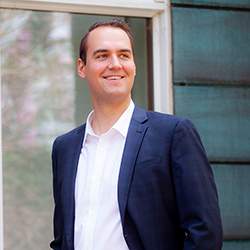
Mikael Clement T’22
From the first time I stepped foot in Tuck Hall, it was clear that Tuck was a place where I could forge my path to becoming a business leader, but, just as importantly, leave with lifelong friendships. Although I grew up in and have spent most of my life in Canada, I studied for two years at a preparatory school in Wolfeboro, NH. Many relationships with close friends and mentors that are an integral part of my life were forged during my time there. When I first visited Tuck, I immediately felt that same palpable sense of culture and community.
While there are many great large events that bring together the Tuck community, it has been the small encounters that have been the highlight of my experience here. Small group dinners, coffee chats, trips overseas, hikes, and golfing with faculty members are some of the activities that I have cherished and will remember most. They have allowed me to get to know members of Tuck community on a deeper level and foster relationships that will undoubtedly stay with me and continue to grow well beyond my two years at Tuck.
Long before I applied to Tuck, I heard from many that it has a special culture. I was thrilled to discover that the communal spirit at Tuck still managed to exceed my expectations in so many ways: the second-year students are dedicated mentors, your classmates are collaborators, not competitors, and the faculty serves as a tremendous support system that has been there for me every step of the way.
Over my two years at Tuck, every single alumni that I have reached out to has been more than happy to take the time to chat and lend invaluable guidance. Weeknights and weekends in Hanover are spent bonding with the Tuck community, a tight-knit group whose closeness makes it very different from the student experience at other business schools. I am incredibly grateful to be a part of this community, in which everyone genuinely invests in each other’s success and personal well-being.
Consulting/Sports
Montreal, Québec, Canada
Concordia University (John Molson School of Business), Bachelor of Commerce, Marketing and Finance
Management Consultant, Accenture
Tuck Admissions Associate; Admissions Regional Captain (Canada); Admitted Students Weekend Co-Chair; A Team Hockey Co-Captain; Consulting Club Co-Chair; Leadership Fellow; McGowan Fellow; Mental Health and Wellness Initiative Co-Lead; Peer Support Counselor; Tuck Mentor
Sourced and led a First-Year Project working with Kurt Zwald T’12, Senior Director of Research, Insights, and Analytics at the Boston Red Sox. The project helped me gain the sports industry experience I was seeking, supporting Fenway Sports Management through a business process optimization project.
Summer Associate, McKinsey & Company
Strategic Leadership with Professor Finkelstein; Communicating with Presence with Professor Rice; Strategy in Emerging Markets with Professor Lecuona Torras
Tuck’s incredible alumni network has allowed me to develop meaningful relationships with established sports executives, including Kurt Zwald T’12, Boston Red Sox; Catie Griggs T’09, Seattle Mariners; Kevin Demoff T’06, Los Angeles Rams; and many more.
Associate at McKinsey & Company
I came to Tuck with the hopes of developing business skills and becoming a better leader. While Tuck has allowed me to accomplish these goals, what strikes me most is both the self-awareness and confidence I have gained. These two years have not only helped transform me as a leader but also as a person—I feel well-prepared to tackle any upcoming personal or professional challenges.
Health Care
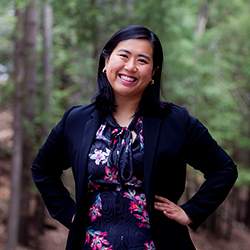
Jean Rieuthavorn T’22
Tuck is a school that is willing to get to know the applicant—an experience I found unique and encouraging. I felt like an underdog in the MBA application process, so I knew I had to find a place where the community would encourage me to thrive and build my confidence. Starting with the admissions team and the professors, and extending to my peers, they have all encouraged me to flourish.
I’ve taken Tuck’s mission to produce wise and decisive leaders who better the world through business to heart. I will always be working on my leadership skills, but I have also become more cognizant about my impact on others in and out of the workplace. My MBA will have immediate use in the short term, enabling me to establish myself in roles in the companies I want to work for. Further out, I plan to use my MBA as a source of confidence to contribute what I do know and ask questions when I don’t know.
There are so many highlights from my time at Tuck: small group dinners, living in Sachem with my Tuck Partner (TP), the spring break ski trip in France, Literati events at Still North, attending a Tuck wedding in Mexico, and the first day of second-year spring term, experiencing a full and maskless classroom for the first time.
I am extremely grateful for the Center for Digital Strategies. I owe a lot of my tech-related learnings and growth to Patrick Wheeler at CDS. Having the platform of the Tech Club and the support of my co-chairs also enabled me to bring novel resources to Tuck, including a product management workshop, an AdTech learning session, and job search small groups for just-in-time/targeted job seekers.
Technology
Franklin, Massachusetts
Bucknell University, BS, Biology
Healthcare sales, Sanofi, Allergan; Senior Consulting Analyst, Health Advances
Center for Digital Strategies Fellow; Technology Club Co-Chair; Literati Club Co-Chair; Leadership Fellow; Tuck in Colombia
Case study on scaling challenges in mental health and tech with Professor Alva Taylor, Professor Trevor Price, and Professor Robert Shumsky. First-Year Project for Shangri-La Hotel and Resorts.
Corporate and Business Strategy, Electronic Arts
Growth Economics with Professor Davin Chor; Design Thinking with Professor Alva Taylor
Reaching out to speakers and moderating the 2021 Tuck Tech SHIFT Conference; attending the Center for Digital Strategies’ speaker drop-ins.
Emerging Healthcare Partnerships Manager, Lyft
Tuck has transformed me into a braver person, one who is willing to take risks, ask questions, and try things I normally would not. I have skated terribly in tripod hockey, participated often in finance classes (shout-out to my Corporate Valuations professor’s patience), and skied on weekday mornings.
Tuck has enabled me to be fearless and to explore all of my interests because of how supportive the community is and because of the immersion in the Upper Valley. My classmates have inspired me through their different lived experiences; learning from them has made me a more inquisitive and open-minded person. I think more about what I truly want from life and the type of life I want to create.
As I rejoin the “real world”, I know Tuck will always be a special place to me and encourage me to always be learning from others and to always pursue my truest passions.
Entrepreneurship

Elena Nikvashvili T’22
Before Tuck, I was not growing in my role, and I wanted to pursue a career path that was fulfilling and better aligned with my values. An MBA was a perfect opportunity to self-reflect, test my leadership capabilities, and identify a new career path.
Tuck’s combination of core and elective classes provide the perfect opportunity to build strong business skills while also exploring a breadth of diverse coursework and topics. Co-curricular activities are a wonderful way to apply the knowledge acquired in the classroom to real-world problems. Tuck’s small class size is ideal for engaging discussions. “Cold calling,” though uncomfortable for some students, is a widespread practice that co-creates rich dialogue by allowing everyone to participate. I experienced this firsthand during my Structure, Economics and Organization of Healthcare course with Professor Paul Gardent. With only 10 students, this class provided an opportunity to dive deep and discuss the pros and cons of the U.S. health-care system. Knowledge acquired in this class will set me up for success while I pursue a career in biotech.
My advice: Don’t get caught up in what everyone else is doing. My Tuck Startup Incubator advisor, Eileen O’Toole, once told me a story: successful rowers do not look at the other boats; they look ahead to the finish line. Focus on your journey and what you want to get out of your Tuck experience. You will feel the pressure to do what others are doing and will be pulled in many directions. Take time to reflect and stay focused on your goals and aspirations.
I will miss the flexibility to explore my interests in a collaborative and supportive environment. I will miss connecting with peers through outdoor/physical activities like hiking, skiing, paddle boarding, and playing ice hockey. Lastly, I will miss the diversity of activities, learning opportunities, and social interactions I have every day—at Tuck, no other day is like the previous one.
Biotech
Tbilisi, Georgia
Vassar College, BA, Economics and Psychology
Transfer Pricing Consultant, EY Amsterdam
Founder of Dance Club; Co-Chair of International Club, Wine Club and Film Society; Co-Lead for Dartmouth Students 4 Ukraine; Teaching Assistant for Financial Accounting, Corporate Communication, Global Economics for Managers, Marketing and Managing Organizations; Tuck Startup Incubator
Starting my own company was never a plan when I came to Tuck, but the Center for Entrepreneurship has created an ecosystem to bring ideas to action. I took Entrepreneurial Thinking and followed up with an entrepreneurial First Year-Project and Tuck Startup Incubator in the second year. I always wanted to help my grandfather, a farmer in the country of Georgia, but I never knew how. Future Farmers is a two-sided marketplace connecting farmers with the retailers bypassing the squeeze from the middlemen in developing countries. We interviewed 50 customers, developed the first MVP (Minimum Viable Product), and raised funds.
Marketing Summer Associate, Genentech
Customer Analytics with Scott Neslin; Negotiations with David Sally
Meeting the CEO of Pernod Ricard, Ann Mukherjee, an inspiring, genuine, and compassionate leader; Brainstorming with IDEO for Project Night Sky about the ways to encourage reflection and self-discovery for Tuck students; Learning about how to apply design-thinking principles to life from Jess Kessin, a speaker during my Entrepreneurial Thinking course
Commercial Rotational Development Program, Genentech
I came to Tuck to pivot from consulting into tech/health care—little did I know that my Tuck experience would be so much more multi-faceted and diverse than just a simple career switch. Tuck is a perfect playground for experimentation and discovery. Tuck gives you all the necessary tools and resources to reflect and discover your passion. Through the Center for Entrepreneurship and the Personal Leadership Program, I discovered that I thrive in entrepreneurial and community-based environments. This discovery gave me the courage to not only start my own venture, but to create a space for students to share their cultural backgrounds through movies via the Tuck International Film Festival and even help raise funds for a greater cause. Tuck allowed me to take risks, be vulnerable, form meaningful bonds, and grow as a servant leader.
Health Care
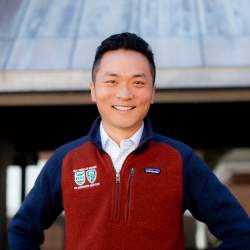
Max Wang T’22
Through one of Tuck’s most popular electives, Communicate with Presence, fifteen Tuckies and I inspired each other with our life stories. The empathy and vulnerability we showed in class quickly bonded us. As part of an assignment, I voluntarily paired with Connor Peasley T’22 to tell him my life story and to hear his. Connor is a West Point graduate and Army veteran who grew up in the Pacific Northwest. I was born and raised in China and worked in IT.
By pairing with Connor, I hoped that, despite our vastly different backgrounds, we could find some similarities between us. And we did. The deliverable of the assignment was to tell your partner’s life story in front of the class, and Connor told my story beautifully—better than I could have. Later that term, Connor and I signed up to become speakers at Tuck Talks where we shared our stories again, this time with the whole Tuck community.
The amount of support we received after our Tuck Talks was overwhelming. I was pleasantly surprised by the number of people (including professors) who told me they could relate to my story, even though we came from different countries, cultures, and religions.
Tuck promotes personal growth beyond our careers. The Tuck community offers a safe space that encourages personal reflection, and the Tuck culture recognizes the importance of success outside of our jobs. During my time at Tuck, I had many chats with Tuckies where we inspired each other with new perspectives around the purpose of our lives and careers.
I think Tuck’s intimate location encourages Tuckies to reach out to each other and stay connected. You can count on the Tuck community for almost any favor you need: a ride to Killington, a bag of flour, a mock case interview, a jumper cable, a dog sitter, etc. Many friendships sprung from these favors, and they happen every day at Tuck. Nature, of course, is also a big part of living in the Upper Valley. It’s not uncommon for students to schedule their electives to accommodate their skiing schedules, me included.
What I hope to share with future MBA students is this: Choose the school where you can see yourself grow.
Consulting, Health Care
Shenzhen, China
Dual Degree (Master of Public Health) at The Dartmouth Institute; Boston College, MS, Accounting; Southwestern University of Finance and Economics (China), BA, Finance
Senior Consultant, IT Risk, Deloitte; Global IT Compliance Manager, TJX
2021 Diversity Conference Co-Chair; Tuck Magnuson Incubator; Center of Health Care Fellow; Tuck Pride
Sizeable: For a group project during Entrepreneurial Thinking, a Tuck elective, fellow T’22s Chris White, Ryan McNamara, and I founded a startup to make the baby clothes shopping experience less wasteful and more sustainable. After the class concluded, we kept working on this concept with the Tuck Magnuson Incubator, which enriched our learning with real-world experiences such as market research, designing and delivering MVP, pitch competitions, and more. Such learning changed the way we think and will benefit us for the rest of our careers.
Strategy & Performance Summer Consultant, The Chartis Group
Communicating with Presence; Product Management in Technology
The pandemic helped me discover my passion for health care. As soon as I realized that health care is my calling, I talked to Marc Aquila T’07 from Tuck’s career services office, and he introduced me to a system of health care resources at Tuck. From career services to TDI’s MPH program, from the Center of Health Care to Tuck’s comprehensive health care curriculum, Tuck gave me all the resources I needed to grow as a health care professional
Strategy & Performance Consultant, The Chartis Group
Tuck helped me find the voice I didn’t know I had. With its rich academic offering, Tuck helped me identify my strengths and showed me how to amplify them. With its supportive community, Tuck gave me an audience who could relate to my life stories and vice versa. With its diversity programs, Tuck taught me the power of my identity and how I could influence others as an empathetic leader.
Financial Services
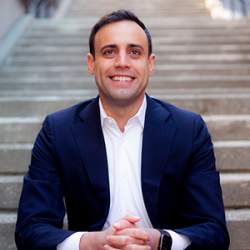
Michael Barbé T’22
Tuck is a special place for many reasons. As far as the academic experience is concerned, classes are discussion- and case-based. I found this to be an essential differentiator because the classroom experience is much more engaging, and by design, your classmates contribute to your learning. The relationships students have with staff are often personal. It was effortless for me to connect on a one-on-one basis with my professors, MBAPO staff, and my career advisor.
My advice to prospective students is to choose a business school that will encourage you to reflect on your core purpose. When I was applying, I had just come out of a severe medical crisis. For me, what I wanted deep down was to be immersed in a new community and make quality friends. Tuck lends itself to that, and it has been deeply rewarding to experience.
As a self-proclaimed “city boy,” moving to Hanover was out of my comfort zone. What I came to appreciate is that there are few places like it. The charm of the Upper Valley grows on you. The people are friendly, and the connectivity with the outdoors provides time for reflection.
Hanover’s remote location is a significant advantage. It’s true there aren’t as many restaurants and bars as you’d find near other business schools. Without the distractions of a bustling city, the focus is on each other. What the social scene looks like is: going to dinner in town, small group dinners, and parties at friends' places. It’s a change of pace from big city life, but I’ve realized that this cultivates strong bonds between classmates.
Applying to business school is a competitive process. It's easy to get caught up in the noise and lose sight of yourself and why you’re applying. The best advice I can give is that this school genuinely values authenticity. Let your true self shine through the application, and I’m sure you’ll be successful.
Investment Banking
Weston, Florida
Florida State University; BS, Finance
The Vanguard Group
Tuck Pride, Hispanic American Student Association, Finance Club, Technology Club, Healthcare Club
I participated in an eFYP (entrepreneurial First-Year Project). One of my classmates had an idea to use technology to improve the triaging process in emergency rooms. Our group did extensive research, engaged multiple health systems, patients, and physicians, and we created a minimum viable product.
Investment Banking Summer Associate—Technology; RBC Capital Markets, San Francisco, CA
Arrhythmia of Finance with Peter Fisher
My two years at Tuck are filled with many memorable experiences. My first cold call, listening to Madeleine Albright, networking with Tuck alumni, and many more. My fondest experience was hosting a small group dinner. At one point, I paused and surveyed the room and realized that every person there had not been in my life just a year before—at that moment, I realized I was exactly where I wanted to be.
Investment Banking Associate—Technology, RBC Capital Markets, San Francisco, CA; Volunteer, Stanford Health Care, University of Pennsylvania Health System, and the Adult Congenital Heart Association
What strikes me most is how different my life is now than before Tuck, both personally and professionally. Personally, I am surrounded by a remarkable community of people that I’m privileged to call lifelong friends. They support, challenge, and inspire me. Professionally, I was afforded countless resources as I sought to pivot careers. My career advisor, second-year student mentors, professors, and a profoundly dedicated alumni base all took particular interest in seeing me succeed. My personal and professional transformation truly marks the quintessential Tuck experience. I come out of this experience more confident, informed, and sensitive, and I owe that all to Tuck.
Technology
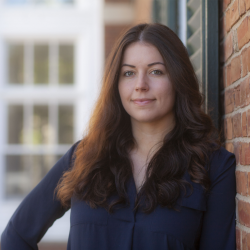
Stephanie Puzak T’22
Prior to Tuck I spent time as a skydiving instructor, military officer, and management consultant specializing in technology strategy in the commercial sector and innovation strategy in the public sector. Working on innovation in the public sector was my first direct exposure to the startup and venture capital world. From that experience, I immediately knew I wanted to be a part of it. I went back to school to get an MBA with the goals of broadening my mindset and experience in the startup world, learning about venture capital, and deepening my understanding of business concepts to better build or support startups in my future career.
My short-to-midterm goal is to join a startup as a builder or founder. I am especially drawn to mission-driven startups, VC firms and companies. In the long-term, I hope to be an investor using capital to empower others to create (especially female and BIPOC founders). Tuck’s mission to “develop wise, decisive leaders who better the world through business” resonates now with me more than ever. I am excited to see how my classmates and I can live this mission in the years to come.
I think what makes Tuck distinct comes down to the network and community. I’ve always been blown away by Tuck alumni. Before I left the firm I was at prior to Tuck, I had a senior leader (who I barely knew) reach out and share his favorite things about the Upper Valley and then introduce me to one of his classmates who he thought might help me in my journey. Similar situations have played out repeatedly in the past two years, I have learned so much from alumni and been connected to jobs, mentors, and experiences. Likewise, while at Tuck, peers are eager to support one another, and the mindset is focused on achieving more together—whether that is learning how to play tripod hockey or ski or tackle a hard accounting case before class the next day. Some of this may be due to the size or location of the school but I also think the culture is very distinct in that way, later manifesting itself after graduation into a tight-knit network you can rely on.
I feel lucky to be part of this community. We’ve had a unique MBA experience, but we are here, together, and continue to make the most of our time. I’ve had such an incredible time learning from those around me and look forward to staying in touch and championing their success for years to come.
Technology, Startups, Venture Capital
Boulder, CO
The United States Air Force Academy, BS, Behavioral Sciences; Sacred Heart University, MS, Applied Psychology
Skydiving instructor/jumpmaster; US Air Force officer, cybersecurity/technology; Deloitte Consulting, strategy & analytics
Center for Private Equity and Venture Capital (PEVC) Fellow; Women in Business (WIB) Board member and Conference Co-chair; Entrepreneurship Club Co-chair; Magnuson Center for Entrepreneurship Student Leadership Board; Tuck Admissions Associate; Tuck Next Step Fellow
e-FYP where I assembled a team of my peers to explore my own startup idea; early-stage project with Rownd, a data privacy/auth startup; negotiations project with the COO of the LA Rams, Kevin Demoff T’06
Operations Strategy MBA Intern, Iron Ox (YC W16, Series B)
Early-Stage VC Workshop with Jim Feuille; Strategy in Emerging Markets with Ramon Lecuona Torras; How to Become an Expert Strategist with Giovanni Gavetti; and so many more
Getting to meet and speak with WIBC keynote speakers Kate Jhaveri T’03, CMO of the NBA, and Aisha Barry T’10, president of ASP; Moderating a panel of inspiring managing partners for the PEVC Conference including Kate Beardsley of Hannah Grey, David Silverman D’93 of Crosslink Capital, and Liam Donohue T’95 of .406 Ventures
I came to Tuck with the goal of stepping outside of my comfort zone and to challenge my personal views by intentionally learning from experiences and perspectives that differ from my own. If you seek to lead impactful and meaningful change in the world (or even on your team), you must take the time to master yourself. The strongest leaders are those who can confidently articulate their values, celebrate their own wins as much as those around them, and empower their team to achieve rather than expect the team to achieve in a way they prescribe. My time at Tuck has helped me solidify how I wish to lead and how best to create impact; simultaneously, it has opened my mental aperture on how I see the world and what can be avenues for impact.
Energy and Sustainability
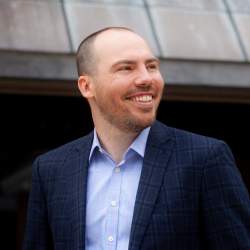
Ed Beshers T’21
I wanted to get an MBA for so long that my first GMAT scores expired. A general management education was the perfect way to pull together my wide-ranging experiences from the first 10 years of my career. It took a while for the timing to work out, but eventually the stars aligned around Tuck and I couldn’t be happier with how it turned out.
Tuck wasn’t on my radar at first, but after I visited Hanover, it jumped to the top of my list. Sachem and the partner community were a huge draw for me and my wife Alena, plus we both love spending time outdoors. Still, it was a big shift from our lives in DC, so we weren’t sure coming into Admitted Students Weekend, but we felt so at home with the people we met here that we sent in the deposit before we checked out of our hotel! The impact career session was what sealed it for me. I felt like I could see my whole Tuck experience based around the Center for Business, Government, and Society and the Tuck Social Venture Fund—and that’s pretty much how it turned out! They were the bedrock of my time at Tuck.
In my first year, I got the opportunity to represent Tuck as a delegate to COP25, the UN climate change conference in Madrid. It was an unparalleled opportunity to learn directly from leaders at the pinnacle of international climate change action. In my second year, I led a team in hosting the inaugural Tuck Natural Capital Summit. It was a perfect capstone for my time at Tuck, allowing me to reconnect with the leaders who taught me the world of natural capital and to share that world with my classmates.
The Tuck faculty is ready, willing, and eager to help students learn key business concepts and apply them outside of the classroom. Professors Curt Welling and Ramon Torras, for example, not only taught me the frameworks I needed for my Hancock internship in their Impact Investing and Strategy classes, but they also took the time over the summer to help me think through the complexities of building value proposition around forest carbon.
The trust and generosity of the Tuck community is unlike anything else I’ve experienced. I’ve had a lot of discussions with classmates about whether Tuckies are different or if we act differently because we’re Tuckies. I think it’s the latter, and I find that more inspiring. Year after year, hundreds of people choose to opt in, pay it forward, and keep the Tuck culture alive.
There’s something magical about leaving the first set of footprints after a fresh snowfall. I did my best thinking in the fields and forests around Sachem, usually with my daughter Davia strapped to my back and my dog Fenway scouting ahead. We also had so many great experiences exploring the Upper Valley with classmates and partners, even in the face of the pandemic. It obviously wasn’t an ideal time to go to business school, but I’ll always be grateful that we spent the pandemic in a place that allowed us to keep getting outside and keep making connections.
Tuck is a place that rewards intentionality. Dedicating two years of your life to the Upper Valley is a big commitment. The more time you spend on self-reflection, the more you’ll get out of your time here.
Natural Capital
Providence, Rhode Island
Franklin & Marshall College, BA, Philosophy
Director of Grants Administration, National Fish and Wildlife Foundation; General Manager, Marvelous Market; co-founder and CFO, Siren Medical; English Teacher, Jungchul English Academy
Tuck Social Venture Fund Director; Natural Capital Summit Founder; Admissions Associate; Men As Allies Co-chair; Center for Business, Government, and Society Fellow; Impact Capital Club Co-founder; Career Services Mentor; Tripod Hockey; Tuck Soccer; Tuck Games Club
Real Options in Forest Carbon independent study with Professors Curt Welling and Jim Smith; self-sourced First Year Project with the Conservation Finance Network
Hancock Natural Resource Group: as the Carbon Strategy MBA Intern, I worked directly with the Global Head of Business Development and Chief Sustainability Officer to help develop a business plan for a new impact investing platform.
Impact Investing: Capital for Social Impact! with Clinical Professor Curt Welling; Negotiations Accelerated with Professor Daniel Feiler; Leading Individuals In Teams with Professor Jennifer Dannals
Leadership coaching with Assistant Dean Dia Draper; Visiting Executive dinners at Pine; representing Tuck as a delegate to COP25, the UN climate change conference in Madrid; scoring the final hockey goal to seal (yet another) Section 4 victory in Section Wars
Heading to Boston to continue working in natural capital strategy
During my summer internship, I had these moments where I would hear myself talking and realize that there was no way I could have had this conversation a year earlier. I used concepts from almost every core class in my work with Hancock, and I’ve been able to build on and refine that business skillset in my second year. I feel incredibly well-prepared for my post-MBA career.
My time at Tuck has also pushed me to be more intentional about the impact I want to have in my career. I like to say that I have green handcuffs because I can’t imagine moving into another field after working on climate change. That’s still true, but thanks to conversations with classmates, professors, and partners, as well as my experience working with the incredible team of Rod Milligan, Lia Parker-Belfer, and Dia Draper on the inaugural MBA DEI Summit, I’ve realized that I also have the opportunity and responsibility to create social change through my environmental work by building a diverse, equitable, and inclusive team.
On a personal level, my time at Tuck will always be defined as the place where Alena and I started our family. Our daughter Davia was born halfway through first year, and while it hasn’t always been easy being pandemic parents, we are so lucky to have had the Tuck community to support us. I am incredibly grateful to Alena for the love and support she has given me throughout this journey. I could not possibly have done it without her, and I look forward to returning the favor in the next chapter of our lives as she pursues her new career in school psychology.
Financial Services

Emma Sapat T’21
The core reason I chose to pursue an MBA was a desire to take more risks: to learn how to make the leaps of faith necessary to lead in ways that go beyond the expected. Prior to Tuck, I would describe myself as 80 percent thought and 20 percent action. But through my MBA, I’ve become more decisive and more experimental: I’ve gained the confidence to bring my ideas into reality.
Coming to Tuck from a government background, I also wanted to test a hypothesis: that not only can business work to better society, but in fact business support is an integral part of solving global problems. I came to Tuck to develop a private-sector skill set that would help me better tackle the challenges I faced in public service; I left with both an expanded toolkit and a mandate to consider my own role in creating positive change as a business leader.
For me, the decision to choose Tuck came from both the head and the heart. On an intellectual level, I knew that, coming from a non-business background, I needed a program that would give me a strong conceptual foundation for business fundamentals while also incorporating an experiential element to help me internalize the lessons learned. Tuck’s combination of a vigorous core curriculum and many experiential learning options (including through the Centers) was the fast-track to learning I needed. But on an emotional level, I fell in love with Tuck’s close-knit and supportive community. A self-described introvert, in choosing an MBA I committed to overcoming shyness and developing my networking skills. I knew that to feel comfortable taking more risks, I needed mentors, advisors, professors, and friends who I could be vulnerable with.
A few memorable experiences while at Tuck include co-chairing Tuck Talks, an event where students, partners, staff, and faculty gather to share the stories that have shaped their lives with the Tuck Community. This was a formative experience for me. Tuck Talks as an event is only possible through the high level of respect and trust that Tuckies have for one another. Being a Tuck Talks co-chair has taught me so much about both my classmates and about the amazing environment of vulnerability and empathy that exists because of Tuck’s unique culture.
I’ll come out and say it: I had the best Tuck First-Year Project ever! Getting to work on an entrepreneurial FYP with a startup focused on 3D printing miniature figurines for Dungeons & Dragons games is an experience I’d never get anywhere else. Business leaders constantly emphasize the need for hypothesis-driven thinking and a “fail fast, fail cheap” mentality—having to design and build a business model while facing all the constraints of a real startup during EFYP is how you actually develop these skills.
Academically, Tuck offers students a rock-solid core foundation of understanding on business fundamentals combined with innumerable experiential opportunities tailored to your goals and interests. I came to Tuck with essentially zero knowledge of accounting, corporate finance, or operations, but I will leave knowing the right questions to ask practitioners in any of them. Meanwhile, my experiences as a fellow with the Center for Digital Strategies and the Center for Business, Government & Society allowed me to home in on my passions for technology and financial inclusion, interests that I’ll be pursuing in my post-Tuck work at Capital One.
In my mind, the key differentiators are how invested the entire Tuck community is in ensuring your success, and how support here is offered proactively vs. reactively. For example, my career advisor reached out to schedule a conversation about my recruiting goals in June of my first year, before the term had even started! At Tuck, you’ll never be a “face in the crowd”: your career advisors, professors, classmates, and alumni mentors all take the time to get to know you as an individual. I’m especially awed by the willingness of Tuck alumni to go above and beyond to help current students.
As someone who grew up in Northern New England, coming to Tuck felt like a homecoming for me. One of my favorite Tuck outdoor memories was ice skating with friends on Lake Morey this winter. Another highlight was learning to cross country ski. Overall, I think Tuck’s intimate setting encourages students to fully immerse themselves in the experience, both academically and personally.
What you get out of Tuck depends on what you put in: In other words, the better you understand what excites and motivates you personally, the easier it will be to make decisions that maximize your long-term happiness, whether that’s while applying to business school or attending an MBA program. The most challenging part of the Tuck experience is choosing which opportunities to prioritize—the most valuable thing you can spend is your time. It’s easy to substitute commonly-held perceptions of what’s valuable for what truly matters to you as an individual, which is why spending time on reflection is so important.
Financial Services & Technology
Falmouth, Maine
Yale University, BA in Ethics, Politics, and Economics
Consumer Financial Protection Bureau, a federal financial regulator
Center for Business, Government & Society (CBGS) fellow; Center for Digital Strategies (CDS) fellow; Tuck Talks co-chair; Global Economics for Managers head teaching assistant.
Center for Digital Strategies Project with Google: worked with two other fellows on a project to develop a playbook for small mobile gaming studios to leverage brand-based marketing; e-FYP with MiniPrint, a startup 3D printing miniature figurines for tabletop games: worked with four classmates to develop a business model and interviewed over 20 current Dungeons & Dragons players and DMs.
Business Analysis Manager Intern, Capital One
My two Research to Practice Seminars—I could never pick between them! Time in the Consumer Mind with Professor Ellie Kyung, and Strategy in Innovation Ecosystems with Professor Ron Adner.
Moderating a joint CBGS and CDS panel with Karan Bhatia, VP of Government Affairs & Public Policy at Google; posing a question to Valerie Jarrett, former senior advisor to President Obama, during a Tuck event; hosting Tuck’s first-ever virtual Tuck Talks in spring 2020, a moment of hope amidst a disrupted semester; the final session of my RTP Time in the Consumer Mind, where we reflected on how we should spend our time in the future.
Business Analysis Manager, Small Business Bank Platform Strategy, Capital One
I came to Tuck with the goal of pushing myself beyond my comfort zone and learning how to be a leader. When I applied to MBA programs, I worried that my lack of experience and my non-business background meant I wasn’t ready: How could I confidently lead others when I didn’t know the answers myself? But in Tuck’s core value of “confident humility,” I found a vision of leadership that made me believe my thirst for knowledge and willingness to admit what I didn’t know could help me become a better leader. My Tuck transformation has made me bolder and more action-oriented: I’ve gained both confidence in my ability to act as an agent of positive change and a greater sense of my responsibility to do so.
Marketing
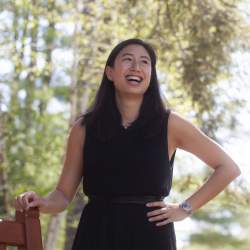
Arleen Chien T’21
My role before Tuck was in business services and I worked specifically with marketing professionals. I knew I wanted to pursue an MBA because I wanted a broader understanding of the business world and how different functions within a company actually work together.
I wanted a fully immersive business school experience with a strong core curriculum. With this in mind, Tuck easily rose to the top of my list. Beyond that, when I came on campus for my interview, I really felt how supportive the community was. Everyone was so welcoming, and I immediately felt so at home.
Being an associate and fellow of the Center for Digital Strategies has been the highlight of my Tuck experience. I met some of my best friends through the center, found mentors who I know will support and challenge me throughout my career, and got to learn about everything from esports to bitcoin from my classmates.
The learning environment at Tuck is incredibly supportive. I love that every professor has an open-door policy—I feel like I can always ask questions and that my professors and classmates are actually eager to help me understand the material we cover in class. Beyond that, Tuck has a very collaborative learning environment that encourages us to work effectively and excel in team settings.
I really got to experience the strength of the Tuck community—both on campus and throughout our alumni base—when I lost my original summer internship due to the global pandemic. Classmates and Tuck alumni I had never spoken to reached out to help me brainstorm potential project ideas and offered to connect me with anyone within their rolodexes. I think the trust that every Tuckie has in each other is something so special. I am so proud to be part of this community.
Because of Tuck’s remote location, everyone is 110 percent invested in being here. I love this because it has meant that I’ve gotten to know my classmates incredibly well, immerse myself in my classes, and try new things (like Tripod!) that I would have never thought to do outside of the Upper Valley. Everyone is present and it helps foster a community that I believe is unrivaled!
I encourage prospective students to reflect on what they want to get out of their business school experience and start getting to know the distinct Tuck community. Our motto is “Your time, Your Tuck.” Every Tuckie you speak to will offer a unique perspective on this special place.
Marketing & Technology
Taipei, Taiwan
Harvard College, AB, Psychology
Researcher at Forrester
Center for Digital Strategies associate and fellow; Visiting Executive Program fellow; Tuck Admissions associate; Marketing and Brand Management Club co-chair; Wine Club co-chair; Tripod Hockey
First-Year Project with Caerus Wines, working with José Salgado T’18 to help him identify and define a go-to-market strategy for his direct-to-consumer wine business in Napa, CA; Research with Professor Praveen Kopalle to develop a teaching note for his Retail Pricing Analytics elective that explored the different opportunities modern retailers have to use machine learning in their pricing strategies.
Product Strategy & Consumer Insights, Allbirds
Tuck INTEL with Professor Praveen Kopalle (experiential course that brings together the entire Tuck core curriculum); The CEO Experience with N.H. Governor John Lynch (case-based elective that explores the different opportunities and challenges CEOs face in their leadership positions)
Hosting student conversations with Joey Bergstein, CEO of Seventh Generation, and Chip Bergh, president & CEO of Levi Strauss & Co., as a Visiting Executive Program fellow; feeling the support and mentorship of alumni near and far in my internship search when my original plans changed due to COVID-19; whiteboarding with my CDS co-fellows to outline my research paper on “consumer data used for good;” spending the summer in the Upper Valley and floating down the Connecticut at golden hour; learning to ski; team hugs after Tripod games, win or lose
Product Marketing Manager, Store No. 8, Walmart’s technology incubator, New York City
I feel extremely lucky to be surrounded by a community at Tuck that always encourages me to face challenges head-on. Whether it was taking an elective to learn more about a topic I had limited familiarity with or figuring out what type of career I wanted to pursue after Tuck, I always knew that my friends, mentors, and professors were rooting for me. The Tuck community has shown me how to take control of my own time, prioritize the things I care about most, and be truly present in the opportunities I take on. My Tuck Transformation has been in gaining the confidence to identify and go after what I want. I hope to carry forward what I have learned from the Tuck community throughout my personal and professional life.
Financial Services
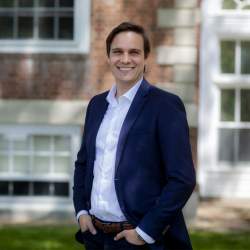
Franco Coria T’21
On a professional level, I wanted to pursue an MBA to explore new career paths and pivot industries. I was not sure exactly what I wanted to do, but having worked in only one industry and company for so long (10 years), I knew I needed an MBA to make the switch. I was also looking for a big challenge: something that pushed me mentally (and physically!), forcing me to step outside my comfort zone. Additionally, my wife Sol is a fashion designer, and it has always been our dream to live in New York, so I wanted to explore career paths there.
On a personal level, I believe diversity unlocks innovation, compassion, and empathy, and I wanted to spend two years surrounded by 500 people from very different backgrounds to become a better version of myself, and a better leader.
Within one hour of arriving to campus for the first time, I knew Tuck was the right place for me. From a career standpoint, most top programs open very similar doors, so my decision was based entirely on people and how I felt during my interactions with the Tuck community. I have a “people first” mentality and I base most of my decisions around that motto, and Tuck was no different. And on top of that, the school is situated in one of the most beautiful places I have ever been!
The people are what make the Tuck community distinct from other business schools. It is a collaborative, intimate environment with a real sense of community, and everybody is willing to help anyone at any time. At the risk of sounding repetitive, in challenging times the support from a community like Tuck made a huge difference.
This is a magic place. We were fortunate enough to enjoy all four seasons in Hanover and each season has something unique to offer. From hikes, soccer, and lake swimming in spring and summer, to the beautiful fall foliage during fall, to the amazing experience of being able to ski every day. My wife learned how to ski the first year and spent over 30 days on the slopes during our second winter. We have the most beautiful memories from our Hanover winters.
In addition to what you will hear from other Tuckies, I offer two very simple but powerful pieces of advice. First, “Gut feeling” weights a lot; do not ignore it. Second, people first, then the rest.
Financial Services/Investments
Olavarria, Bs. As., Argentina
Industrial Engineering, UNICEN (Olavarria, Bs. As.)
Manufacturing, technical sales, and business development in the energy sector (oil and gas), Buenos Aires (ARG); Houston, TX (USA)
Hispanic American Student Association (HASA) co-chair; John Barleycorn Society Club co-chair; Tuck Winter Carnival co-chair; Finance, LAIBC, tripod hockey, and ski club member; LatAm Admissions Ambassador; Toigo Foundation Tuck School captain; Tuck Mentors; Personal Leadership Program fellow.
First-Year Project helping a Tuck-founded startup launch their plant-based pulled pork product in the South East Asian market; Entrepreneurship Through Acquisition independent study, working with a health care company and a UK operator in the education industry; The MBA Fights COVID-19 Initiative, supporting startups in emerging markets by reviewing their pitch decks and financial models before meeting investors.
Investment Banking Summer Associate (TMT), Bank of America
Managing Stakeholders Issues in Private Equity with David Marchick; Strategy in Emerging Markets with Ramon Lecuona; Communicating with Presence with James Rice
Attending TuckTalks and forming deeper connections with my classmates who shared their stories with us; Engaging in deep discussions with my fellow Tuckies and educating myself around matters that drastically affected all of us during our time at Tuck, such as the COVID-19 global pandemic, racism, police brutality, and leadership challenges.
Investment Banking Associate (TMT), Bank of America, NYC
I came to Tuck not only to explore different industries and career options, but also to meet people from different cultures and backgrounds and learn from them. I came to be challenged and exposed, and to get to know myself better. During our time at Tuck, there were many challenges that affected millions of people around the world (COVID-19, police brutality, racism, among others). Being in this place during these times made me realize how privileged I am and helped me realize what our true responsibility is after we leave this place: To make people’s lives better through business and leadership. Our true responsibility lies around our people and communities, regardless of what institution we are part of.
Technology
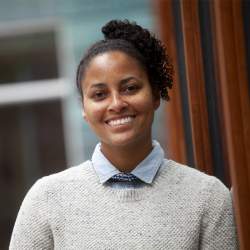
Kristen Hughes T’21
I decided to get an MBA because I wanted to career switch. I had spent years working in the education non-profit sector, and although I liked the mission-driven work, my career trajectory had plateaued. An MBA was the best way for me to develop my business acumen and open myself up to other industries/functions while setting the stage for greater responsibility and impact throughout my life.
I chose Tuck because it’s a place where it’s impossible to be invisible. With my non-traditional business background, I was intimidated to go to business school. I wanted to learn a lot and fully invest in the experience, and I felt like I would get lost in the shuffle at a larger less intimate program. Tuck gave me the opportunity to practice what I was learning in the classroom. Being surrounded by so many passionate and involved classmates inspired me to raise my hand for leadership opportunities and take risks that have made me a wiser leader.
I’ve been so surprised by how impactful my extracurricular experiences were. I attended Tuck’s Diversity Conference in 2018, and it was so special to have a full circle moment as a co-chair of the 2020 Diversity Conference. I also loved interviewing so many great prospective students as an Admissions Associate.
Tuck’s core curriculum creates a strong foundation for students to build upon in the elective courses. Professors are so invested in your success, and I’ve been so impressed by how accessible they are. Tuck also prioritizes learning and development outside of the classroom. In the spring of my first year, I began working with a leadership coach, Nariah Broadus, who helped me redefine my goals. She’s been pivotal in coaching me through my Tuck experience. Because of her support, I’ve been able to bounce back from failure and make the most of my time at Tuck.
Tuck is unique because of the people. Current students and alumni really care about this school and are committed to being involved and helping shape the experience. If there’s something about the Tuck experience you want to improve, you’re encouraged by other students and administration to change it. It’s a great environment to challenge the status quo as you navigate the type of legacy you want to leave.
Attending school in the Upper Valley really allowed me to focus over the last two years. I was able to immerse myself in the MBA experience, and living in Hanover made me a more passionate and engaged member of the Tuck community. Because I was less distracted, I feel like I committed more of myself to classes, recruitment, and relationships than I would have in a larger city.
As a prospective student, my conversations with alumni and current students were so helpful in building my understanding of Tuck’s culture. If you’re able to visit, I recommend taking a trip to Hanover to see if the setting resonates with you. When you’re deciding between MBA programs, it’s important to think about what environment is going to challenge you and give you the best chance to grow and develop. Tuck will push you out of your comfort zone, and I encourage everyone to embrace the highs and lows along the journey.
Tech
Midlothian, Virginia
Davidson College, BA, Anthropology
Senior Associate, Achievement Network; Corps Member, City Year New York
Tuck Pride co-chair; Diversity Conference co-chair; Tuck Admissions Associate; Member of The Consortium for Graduate Study in Management; Member of Black Students Association at Tuck (BSAT)
Working with my FYP team to help a ski resort refine their business strategy
Modern Workplace Intern, US Education, Microsoft
Advanced Management Communication with Julie Lang & Courtney Pierson; Negotiations with Aram Donigian T’08
Scoring my first (and only) tripod goal; participating in personal leadership coaching with Nariah Broadus; adapting to the COVID-19 pandemic; planning a virtual Diversity Conference
Modern Workplace Specialist, US Education, Microsoft
My experience at Tuck was truly transformational. I came to business school to career pivot from the non-profit sector—and Tuck opened so many doors for me. I’m leaving with a new career ahead of me in tech as well as so many life lessons. At Tuck, I’ve taken a lot of risks and made a lot of mistakes. Because of the small and supportive environment, I’ve felt like a part of a team which included faculty, administration, and classmates. Tuck significantly shaped my perspectives on leadership and impact, and I’m excited to see where my new skillset will take me.
Consulting
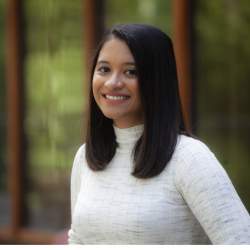
Saachi Shah T’21
I decided to pursue an MBA to bridge a knowledge gap when it came to operations and execution. As an individual who has primarily worked in strategy organizations, I had an intense desire to learn business from a five-foot level. An MBA seemed like the obvious next step that would help me gain the theoretical knowledge I needed in my career moving forward.
Tuck’s program aligned the best in terms of what I was seeking out of an MBA, specifically from an administration and faculty support, global learning, and tight-knit community perspective. I wanted to be in a location that was not a major city, so I could fully immerse myself in the MBA experience, and when it came to making the decision about where to spend two years, Tuck seemed like the obvious choice.
My eight-week eFYP was by far a highlight of my Tuck experience. I gained an inner self-confidence in my ability to lead and communicate. In addition, I got the opportunity to closely work with four rockstars in my class while learning about the wildfire industry.
Tuck professors are truly committed to supporting the educational journeys of students. During first-year core, a couple of us would spend hours in Professor Praveen Kopalle’s office understanding analytics, while he supported us by answering questions. The dedication to teaching exhibited by Professor Kopalle speaks to Tuck’s learning environment.
Tuck’s alumni network makes us stand apart from other business schools. During recruiting season, I encountered a Tuck alumnus in the technology sector who went above and beyond to connect me with prominent startups in the Bay Area. His openness to helping a person he had never met was a true representation of the Tuck community.
Tuck’s remote location has helped me step out of my comfort zone. Growing up in the suburbs of Chicago, I never saw myself as an individual who would try winter sports. However, living in the Upper Valley motivated me to put on 25 pounds of hockey gear because it was quintessential to the Tuck experience!
In order to succeed at Tuck, it is important to have a vision in terms of what you want to gain out of your two years. There are an immense number of opportunities at Tuck, and it is very easy to get pulled in different directions. However, if you have a goal and vision in mind from the beginning, then you will focus your time on the right opportunities.
Design & Innovation
Skokie, Illinois
University of Illinois Urbana Champaign, BS, Systems Engineering
Strategy at Thales xPlor, an innovation lab within a French tech conglomerate & Technology Strategy at Accenture
Tech Club, co-chair; Design & Innovation Club, co-chair; Future of Automotive Mobility Club, founder & co-chair; Wine Club, marketing lead; Women in Business Conference, co-chair; Tuck Admissions, associate
Led team of four classmates to conduct customer research and identify pain points within the wildfire industry. With mentorship from Daniella Reichstetter T’07 and Nick Russell, I assisted the team in developing a Minimum Viable Product (MVP) for private jet companies to combat wildfires.
Strategy & Innovation at Honeywell
Negotiations Accelerated with Professor Dan Feiler; Marketing Research with Professor Kusum Ailawadi
Learning how to ski; having fries and wine with Professor Praveen Kopalle at Norwich Inn; winning section wars alongside Section 4; and having dinner with Mr. Stuart Weitzman, designer & founder of Stuart Weitzman
Bain, design & innovation team (ADAPT)
One sentence that sums up my Tuck Transformation: a two-year journey of self-improvement that will forever underpin my leadership and communication approach. Like many of my classmates, I came to Tuck with deep-seeded imposter syndrome. Through experiential learning opportunities such as an eFYP and mentorship from Professors Alva Taylor, Praveen Kopalle, and Daniella Reichstetter T’07, I gained confidence in my abilities as a leader while forging life-long connections with my peers. The Tuck Transformation is real as long as you are willing to reflect and embrace your true self, commit to a journey of growth, and leverage the myriad opportunities provided by the school. A specific opportunity I leveraged over my two years was the Personal Leadership Program that enabled me to explore my weaknesses in a one-on-one setting with a Tuck leader. The combination of all the opportunities mentioned above has made me a stronger leader and communicator that is ready to continue to adapt and evolve.
Entrepreneurship
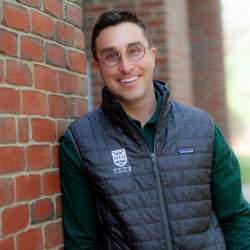
Mark Noble T’21
My reasons for pursuing an MBA were threefold: (1) make a full leap into entrepreneurship, (2) round out my marketing skill set with a general management foundation, and (3) gain and learn from inspiring friends from all around the world.
I chose Tuck because of the people. Period. I was fortunate to work with graduates of many renowned MBA programs while at Amazon; all of these colleagues were exceptionally smart, but Tuckies distinctly stood out because of their consistent, authentic care and kindness, and because of how they lit up when they described their MBA experience. I knew this was the community I had to be a part of.
One of the highlights of my Tuck experience has been the family-like relationships built with classmates, Tuck Partners, and Tiny Tuckies. From being blessed with the best next-door neighbors, attending and hosting dozens of dinners, racing bicycles with (and always losing to) the many Tiny Tuckies we love so much, to gaining the nickname "Mr. Marky Poo,” I’ll always look back fondly on these memories and be grateful for my friends that turned into family.
Tuck’s learning environment is immersive. Tuck is not a commuter school where students can go through the experience anonymously or retreat back to their old friend groups after class. Each student is here intentionally and uniquely contributes to the Tuck fabric. Learning takes place 24/7 and extends far beyond the classroom. As my friend Teo Gonzalez T’21 puts it, Tuckies are “all-in.”
Tuck is a special place to pursue entrepreneurship. The program’s small scale and supremely supportive community empowered me to chart my own entrepreneurial path. Staff and faculty partnered closely with me at every turn providing generous, individualized attention and feedback—a huge thank you to Daniella Reichstetter T’07, Eileen O’Toole TP’14, and Steve Kahl at the Center for Entrepreneurship, and Jim Feuille at the Center for Private Equity and Venture Capital.
The Upper Valley is a beautiful place to live with vibrant seasons and convenient access to the great outdoors. With hiking trails that lead to Boston Lot Lake right behind our home in Sachem Village, multiple ski resorts less than an hour away, famous New Hampshire and Vermont foliage during the Fall, and the Connecticut and White Rivers flowing nearby, there is no shortage of opportunities to get outside and take advantage of our surroundings. My wife, two close friends, and I were even lucky enough to witness Mink—a legendary local black bear (RIP)—and her cubs from a safe distance one sunny afternoon.
If Tuck’s culture, scale, and location resonate with you, I believe there is no better MBA experience in the world. My advice to prospective students is to tell your authentic story, reflect on how you can uniquely contribute to the Tuck community, and not to give up if things don’t work out the first time around. I am a waitlister and reapplicant. I knew Tuck was the right fit for me and persisting through the application process was unequivocally worth it. My advice to incoming students is to be true to yourself. Stop to think holistically about what’s important to you and what will make you happy before defaulting to the most popular and prestigious career paths. Leave room to explore and take risks—and enjoy the ride!
Entrepreneurship Through Acquisition (ETA)
Newbury Park, CA
Pepperdine University, BA, Rhetoric and Leadership
Demand generation for Amazon.com’s new B2B marketplace, Amazon Business, Seattle, WA. Marketing for the world’s first ‘all-you-can-fly’ membership airline, Surf Air, Santa Monica, CA.
Entrepreneurship Club, Co-Chair; Tuck Startup Incubator; Magnuson Center Campus Ventures; Career Mentor; Leadership Fellow; Tripod Hockey
1. Hands-On Startup Experience: Partnered with fellow T’21, Willem Sandberg, during first-year to build a startup in the childcare space and co-led an eFYP focused on defining the business model. 2. ETA Speaker Series: Led an ETA speaker series on the shoulders of tremendous work done the prior year by Ryan Turk T’20 and Jim Prial T’20, which ultimately gave rise to Tuck’s first-ever group ETA independent study course taught by Mark Anderegg. 3. Tailored Research: Engaged in two ETA-centric independent studies with Daniella Reichstetter T’07 and Jim Feuille, focusing on a vertical software investment thesis and scalable search methods, respectively
Newbury Franklin: as an Entrepreneur-In-Residence Intern, I developed an investment thesis for the sleep apnea treatment industry, working remotely from Sachem Village. I’m deeply grateful to the Maynard Internship Program and Venture Capital and Private Equity Award for supporting my summer internship experience
Entrepreneurship Through Acquisition independent study, Mark Anderegg; The CEO Experience, Governor John Lynch
1. My Wife’s Support: Unwavering and tireless support from my wife throughout the entire experience—love you, Krysta. Thank you. 2. Sachem Village: The relationships built in Sachem Village are very personal and special to me, and will extend far beyond my time at Tuck. 3. Summer in the Upper Valley: Spent with great friends smoking barbecue, running half-marathons, and hanging out on the Connecticut River and White River. 4. Riding Motorcycles: Learned how to ride a motorcycle thanks to Peter Bourgeois T’21 and thereafter spent an unforgettable day riding NH and VT backroads with my dad. 5. Pre-Tuck Mentorship: Received wise and generous mentorship from Derrick Deese T’12, Vishnu Malli T’17, and Juliet Horton T’14—they made me feel like I belonged to the Tuck community far before I was admitted
I’m partnering with Newbury Franklin to acquire, lead, and grow vertical software businesses over the long term.
Tuck enabled me to craft a highly personalized path to launch my career in Entrepreneurship Through Acquisition. Beyond my professional transformation, I was faced with unexpected family health challenges amidst the global pandemic. I was stretched to learn about myself, reevaluate my priorities, and turn obstacles into opportunities. These experiences, along with the skills and insights gained through Tuck, have prepared me to lead others with empathy and optimism.
Technology
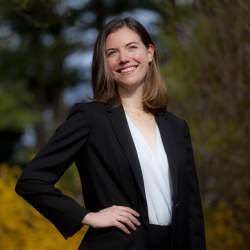
Katherine Britt T’21
My professional background prior to Tuck was in mission-driven organizations experiencing significant change—operational, financial, and even structural with facilities. Working in development during capital campaigns exposed me to relationship-driven partnerships and funding structures, and the critical need for creative problem solving amidst limited resources and unexpected change. I also had a front-row seat to organizations trying to scale efficiently without compromising the experiences and services provided to the community. Reflecting on my future, I realized that to be an executive leader creating sustainable, positive change, I would need to build my business acumen. An MBA was the critical bridge from where I was to where I wanted to be.
After spending four years at a small liberal arts college in New England (Amherst College), I felt immediately at ease when visiting Tuck. I understood the power of a smaller community that includes not only the students, but also engaged faculty, administrators, staff, and alumni. The prospect of developing deep friendships as well as meaningful relationships with faculty was a key differentiator for Tuck. Alumni and current students were earnest, generous, and enthusiastic with me before I even applied! People are Tuck’s greatest asset and for someone who is relationship-driven, I couldn’t wait to join this community.
Tuck offers its students a comprehensive first-year core academic experience that each individual can then build on in a way that distinctively elevates her skills, interests, and aspirations. Be it club leadership, center fellowships, writing a case with a professor, hiking with friends, or creating something completely new—you customize and co-create your experience in everything you do. At Tuck, no two MBAs are alike and that’s why transformational experiences happen here.
My most impactful and influential experiences at Tuck came from opportunities that allowed me to collaborate and build with peers, faculty, and deans alike. Alongside a group of extraordinary women classmates and in partnership with Dia Draper, assistant dean for Diversity, Equity, and Inclusion, I had the opportunity to co-create Next50—a student-led initiative to advocate for more case protagonist diversity in the cases taught at Tuck. The Next50 Founding Fellows have been organizing, mobilizing, and creating buy-in that will achieve sustainable and impactful change for the Tuck community. Additionally, my independent study under Dean Matthew Slaughter and Professor Ella Bell allowed me to research and write about the next generation of change-leaders tackling the harmful divisiveness throughout American society—a project that is simultaneously inspiring and humbling. Both these experiences made me realize that I am energized when leading and contributing to change that builds and elevates more inclusive communities. With this, I am looking forward with a clarified focus on how I can continue to amplify positive change across levels of society and within business contexts.
I am constantly in awe of how invested and engaged Tuck faculty are in students’ successes. During my first year, both my core professors in Strategy (Professor Giovanni Gavetti) and Marketing (Professor Ellie Kyung) took the time to advise me on recruiting interview prep as well as evaluating my offer options and discussing my evolving career goals. Through my electives, I have had the great fortune of building a relationship with Professor Ella Bell, who has mentored me with both professional advice and personal wisdom. The faculty at Tuck go above and beyond in how they show up for their students, and I appreciate it every day.
When you apply to Tuck, you hear a lot about how remarkable the alumni network is. Then you arrive and see firsthand that it is real. I was blown away at how generous and approachable Tuck alumni were across companies, seniority, and industries (I recruited for athletic retail and technology my first-year). Every single Tuckie I reached out to made time for me and ensured that I was well-informed and positioned for applications, interviews, or offer decisions. The alumni network is an extension of Tuck’s distinctively relationship-driven culture—something that cannot be replicated elsewhere.
One of my priorities when coming to Tuck was to get outdoors. During my second-year fall, a classmate and I became close friends during our standing weekly Friday (the joys of an MBA schedule!) hikes throughout the region—the season culminating with Franconia Ridge. I spent my winters experimenting with both downhill skiing at Killington and cross-country skiing in Woodstock, Lyme, and Hanover. Tuck students have the entire range of experience and interests with outdoor activities, so I loved how I could learn from my peers and stretch myself while enjoying being outside.
It’s never too early to start reflecting on who you are now, who you want to be, and how Tuck is the unique bridge that will get you there. Understand that Tuck and its community is ready to partner with you on your journey, and with that, reciprocity is part of the chemistry that makes this place remarkable. Ask yourself, how will I contribute to Tuck? How will I support and elevate the interests of my peers? What will I be remembered for? Then, show up with a willingness and enthusiasm to learn, stretch, and grow, knowing that the Tuck community will be supporting you every step of the way.
Technology
Arlington, Massachusetts
Amherst College, BA, Neuroscience
Donor Relations, Office of Development, Beth Israel Deaconess Medical Center, Boston, MA; Business Development, Artists for Humanity, Boston, MA
Center for Business, Government, & Society Fellow; Outdoors Club Co-Chair; Career Services mentor; Marketing & Retail Club mentor; Technology Club; Tripod Hockey; Marketing Teaching Assistant; Admissions Ambassador; Founding Fellow and Chair, Next50
First-Year Project with CrossBoundary, Washington D.C.; independent study with Dean Matthew Slaughter and Professor Ella Bell researching leaders sparking positive social change and building inclusive communities in the U.S.
Go-To-Market Strategy, HubSpot, Cambridge, MA
The CEO Experience with former N.H. Governor John Lynch; Research-To-Practice Seminar Time in the Consumer Mind with Professor Ellie Kyung; Leadership in the Global Economy with Dean Matthew Slaughter; Taxes and Business Strategy with Professor Leslie Robinson
Moderating Tuck-wide conversation with Beto O’Rourke, former U.S. Representative (D-TX) and 2020 presidential candidate, through Center for Business, Government, & Society; attending a group dinner with Andrea Perez T’08, Global Vice President and General Manager, Nike Jordan Women’s; advising conversations with Professor Giovanni Gavetti, Strategy; testifying about climate change in Leadership in the Global Economy elective
Accelerated Leadership Program at HubSpot, Cambridge, Massachusetts
My time at Tuck has been so much more than just a professional pivot. I experienced a holistic and personal transformation that has profoundly impacted how I see myself, how I connect with others, and how I aspire to contribute to the organizations and communities I will be a part of in the future.
Completing a Tuck MBA during a time of intersectional crises pushed me not only to reflect, but more importantly, to live and honor my values in a time of extreme uncertainty and change.
I refined my personal and professional goals so they more strongly align with issues I care deeply about—democratic systems, inclusive community, public-private partnerships, small business, and neighborhood vibrancy, to name a few.
My Tuck experience gave me clarity on who I am and how I want to show up—as a leader, colleague, friend, neighbor—as well as the humility to continuously listen, learn, and evolve in a resilient and authentic way.
Technology
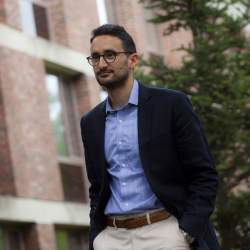
Nadeem Almoayyed T’20
I spent my entire career in finance getting good at managing financial statements and solving analytical problems. However after working on a few projects that involved cross-functional management, I came to realize that I really enjoyed the idea of being a general manager, and that in order to successfully pursue this path I need to reinforce some of my non-analytical skills. An MBA afforded me the ability to become a more well-rounded leader while also expanding my network beyond my bubble of tech and finance.
I visited Tuck during ASW and immediately fell in love with the people. Never have I been around so many encouraging, down-to-earth people as during my two years at Tuck, and it really gave me the intimate college experience I never had. Additionally, Tuck is known as a general management school, and the year-long core forced me to engage with topics that are crucial to a company’s operations, but that I might not have studied otherwise. I leave Tuck knowing that I have what it takes to be an effective general manager, as well as a network of Tuckies that will be a pillar of support and friendship throughout my life.
Tuck gave me the space and support to push myself beyond my comfort zone and grow in the way I lead and communicate. In Communicating with Presence I learned how to harness emotion and empathy to make powerful presentations, while my club leadership roles taught me how to manage people and navigate bureaucracy. As a creative director for Follies, I poked fun at Tuck and had the ability to perform a live comedy sketch on stage in front of 200 people. I wanted to participate in international work projects and I got my wish when I was selected to spend three weeks in Seoul with five Tuckies advising a multinational pharmaceutical company in December 2019. Tuck’s small size affords you the ability to craft an experience that’s unique to you, and I’m incredibly grateful to have been able to take advantage of all that Tuck has to offer.
Tuck’s academic experience is intense and supportive. The first year, and especially the fall term, is a lot of work. Looking back, I learned a lot and retained much of it thanks to Tuck’s supportive network of students and professors. Some of my favorite elective courses were The CEO Experience with former NH Governor John Lynch, Countries and Companies in the International Economy with Professor Andy Bernard, and Managing Stakeholder Issues in Private Equity with Professor David Marchick.
Tuck alumni will always pick up the phone, no matter what. In my first year I leaned on the network to explore new companies and functions, and without fail every Tuckie I reached out to was happy to jump on a phone call with me. I remember cold emailing VPs at various tech companies half-expecting them not to respond, but lo and behold I was chatting with them a few days later. Recruiting for full-time roles during my second year was difficult due to Covid, and I was surprised at the number of Tuck alumni in venture capital who were willing to take 30 minutes away from their hectic schedules to hop on a call, give me career advice, and provide connections to their network. The Tuck network is a special group of people who I know will always have my back.
Tuck is a magical place. Spending two years in rural New Hampshire is not for everyone, but I found it to be the perfect backdrop for my journey of growth and learning. Being far away from a major city means that you are far from distractions and are always immersed in the Tuck community. This allows you to build powerful bonds with your classmates, have shared experiences, and create the space you need for your own growth and development. I never thought I would spend two years of my life living in the woods (literally), but my two years at Tuck gave me all the time and space I needed to embark upon my transformation into an effective leader and a more empathetic human.
Tech
Isa Town, Bahrain
The Wharton School, University of Pennsylvania, BS, Finance
Helped launch YouTube Originals, Google’s first subscription video service, and led investments and deal selection post-launch
Tech Club, co-chair; Tuck Follies, creative director; Center for Digital Strategies, fellow; Tuck Film Society, co-founder
Center for Digital Strategies Gaming Project: Worked with two other fellows on a project for Google to create a “Mobile Gaming Playbook” for small mobile developers. Interviewed large AAA gaming companies such as Xbox, PlayStation, EA, Rockstar Games, and more, to learn best practices for marketing and monetizing mobile games. Created 20-page white paper with our findings, which Google will distribute to mobile game studios. First-Year Project: Conducted customer research for a Peruvian accelerator to understand the needs of underbanked South American youth. Created user personas, identified pain points, conducted competitor analysis, and developed an MVP for a fintech app to solve these pain points.
OnSite Global Consulting (Seoul, South Korea): Advised a multinational pharmaceutical company on enhancing its digital customer engagement efforts. Spent three weeks in Seoul with a team of Tuck students working for the client by day and exploring the city by night. It was a top three experience at Tuck: I learned a lot about the pharma space, grew as a leader and a teammate, and made lifelong friends. Global Insight Expedition (Peru): Spent two weeks with a fantastic group of Tuckies visiting businesses and Tuck alumni in Lima, and subsequently exploring Cusco, the Sacred Valley, and Machu Picchu. Other Trips: Croatia Pre-term Trip (2018), Colombia Trek (2018), Philippines Winter Break Trip (2019)
Senior Product Manager at Amazon, Seattle
Communicating with Presence with Professor James Rice; a course taught by a Dartmouth theater professor in which you study the tools that actors use in their craft in order to improve your stage presence and charisma. Each class concludes with a powerful emotional presentation in front of an intimate audience, which is both nerve-wracking but also powerful and cathartic. No other class has had as profound an impact on my ability to communicate and connect with audiences, which is a skill that will be incredibly useful to me as I progress throughout my career.
Winning a tripod championship in my first term; learning how to ski; performing a live comedy routine at Follies in front of a 200-person audience; having lunch with Barry McCarthy, former CFO of Spotify and Netflix and the grandfather of the Direct Listing
A digital media startup in San Francisco, Senior Product Manager
Tuck is such a small community, and as a result, you interact daily with students from all walks of life. This helps you engage and work with people from all types of backgrounds since there is nowhere to hide. Tuck is also an incredibly student-driven community. Many Tuck events are organized by students which creates a lot of space for leadership opportunities. I took full advantage, immersingmyself in a variety of clubs, taking on multiple leadership roles including co-leading the Tech Club, co-founding the Film Society, co-directing Tuck Follies, and serving as a fellow in the Center for Digital Strategies. These leadership opportunities are priceless in terms of practical leadership and management experience, and Tuck’s small size means that there is no shortage of opportunities to get involved, lead student activities, and give back to the community that will be your home for two wonderful years.
Financial Services
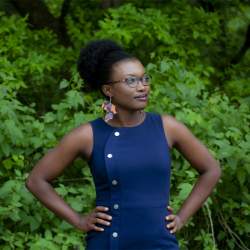
Linda Horner T’20
I pursued an MBA because I wanted to gain a deeper understanding of business strategy, develop my leadership repertoire, grow my professional network, and have a greater impact on my community. I am passionate about solving global health problems and am fascinated by the role of business in providing out-of-the box, low-cost innovations to meet these problems for example, franchising health or leveraging ubiquitous mobile technology. Reflecting on personal experiences, such as the death of my cousin in Uganda from an undiagnosed disease or the high rate of maternal mortality in my community, instilled in me a yearning to make a difference. I knew that the toolkit and leadership development I would gain from the MBA would help me do just that.
I chose Tuck, because of its world-class professors and industry leaders, its tight-knit community, and its wonderful opportunities for my family living in Sachem Village. Even knowing this going in,Tuck has far exceeded my expectations. The willingness of this community to pour into one another has astounded me. For example, I recall one coffee chat with Prof. Peter Fisher, Prof. of Arrhythmia of Finance and former Head of Fixed Income at BlackRock. What started off as a half-hour coffee chat turned into a three-hour conversation, where we chatted about everything from how to determine if an M&A deal is value-add to how to choose a career to parenting. In another of these great conversations, which occur all the time at Tuck, I was sitting across from Tom Linebarger, chair and CEO of Cummins, at dinner as he gave a very vulnerable account of his leadership journey. There is no other school that could have given me these opportunities to connect with world-class leaders in such an intimate setting.
There have been many highlights of my Tuck experience, but the most indelible are first, representing the “Tuck Woman of Today” at the launch of the ‘Fifty Years of Women at Tuck’ year-long celebration. It was awe-inspiring for me to take the stage in front of the women and men who paved the way and removed the obstacles for what it took for me, an African immigrant, first generation college student and mother of two, to attend Tuck. Second, giving a Tuck Talk. I had always struggled with being vulnerable in front of a large group of people. Going through the exercise of understanding my journey, articulating what has made me who I am, and then sharing that with the Tuck community was a powerful revelation of my transformation. The many hours preparing for the fifteen-minute speech, which involved a deep self-reflection of who I am and how I relate to the world, have been some of the most transformative of my life. Third, participating in an outdoors leadership challenge where I guided my classmates through obstacle challenges, including a canoe race down a river to fill cans of water—my very first time being on the water. It was one of the most terrifying experiences of my life, and yet I got through it with the trust and support of my classmates. To top it all off, we won!
The academic experience and learning environment at Tuck is both rigorous and highly collaborative. The faculty challenged me to step out of my comfort zone in a supportive learning environment, and it has paid off big time. When I left Tuck for my summer internship, I was astonished to realize how much I had learned. Collaborating with and learning from classmates is also so fundamental to Tuck’s academic experience. The faculty encourage dialogue in a manner that allows us to learn from our smart wise classmates who come in with an average of about five years of experience—that is a total 1,500+ years of combined diverse professional and personal experiences to share with one another in this tight-knit setting.
I came to Tuck to develop my leadership skills, and it was here that I truly found my voice. Tuck provided several opportunities for this journey: the well-rounded general management curriculum gave me the intellectual growth and confidence to speak up and articulate my perspective on issues. The Tuck faculty taught me to think critically and to create clarity out of ambiguity in decision making and to approach decisions with humility. I learned to pause and ask myself, “why might I be wrong?” Self-reflection in courses like Personal Leadership, Leadership Out of the Box, and Communicating with Presence, led me to realize that leadership is an affair of the heart, and that I must lead from a place of authenticity. Outside the classroom, I profited greatly from Tuck’s personal leadership coaching to understand the experiences that have shaped me, articulate my values, and develop leadership goals for the impact I desire to make. From the openness of Dean Slaughter and the accessibility of Tuck faculty and staff, I gleaned insights for my emotional growth. Finally, my classmates’ willingness to be vulnerable and “dig deeper” in sharing their diverse personal and professional experiences expanded my worldview. Then it was time to implement. Opportunities such as leading a club, working on peer-led teams to plan events, and working on real client projects helped me to concretize my goals and “try them on for size” in a setting where I received immediate, genuine feedback from classmates who truly cared for my growth as a leader.
If you are considering applying to Tuck, reach out to current students and alumni and hear first-hand why Tuck was the best school for them. Ask a lot of questions, both big and small, and carefully listen to their candid responses. I strongly advise you to also visit Tuck- I know that for myself, attending the Diversity Conference and later the Admitted Students Weekend really solidified in my mind that this was the community I needed in order to grow in the ways I wanted to grow and achieve the goals I wanted to achieve. When you make the decision to attend Tuck, lean into Tuck—be authentic and share your perspective, your experiences, your stories, your energy, and your unique presence. Then, you will see this community give back to you enduring friendships, life-long memories, greater self-confidence, and clarity on how to think about your purpose in life. It is truly transformative.
Finance / Health Care
Kampala, Uganda
The Master’s College, BS, Business Administration, Accounting emphasis
Audit Project Manager, Aetna Health
2019 Admitted Students Weekend Co-chair; Tuck Africa Co-chair; Tuck Mentors; Tuck Diversity Conference; Dartmouth Global Health Fellow; Toigo Foundation School Captain at Tuck; Tuck Minority Business Programs consulting; Black Students at Tuck; Spring 2020 Tuck Startup Incubator
Entrepreneurship First-Year Project (e-FYP)—working on a bean-to-bar premium chocolate venture in Côte d’Ivoire focused on sustainable sourcing and giving back to the local community; Tuck startup incubator founder—developing a natural herbal supplement for a more manageable menstruation cycle; Tuck minority business programs consulting—working with a minority- woman-owned business to develop a plan for transition from startup to scalable enterprise; MBA Impact Investing Network and Training (MIINT) competition; Business as Mission Case Competition; Tuck outdoor leadership training led by four retired Army and Air Force Colonels
Onsite Global Consulting: A project focused on studying the feasibility of launching an integrated wellness and lifestyle medicine pilot program in Croatia; Global Insight Expedition to Ireland and United Kingdom to understand business leaders’ sentiment and strategic approach to managing political risk and uncertainty in light of Brexit.
Investment banking summer associate, Credit Suisse, Los Angeles, CA
Arrhythmia of Finance with Prof. Fisher; Power and Influence with Prof. Audia; Communicating with Presence with Prof. Rice; Business & Ethics at the Base of the Pyramid with Prof. Hanson
Investment banking associate, Credit Suisse, Los Angeles, CA
Becoming a US citizen in April, 2019 and having my oath ceremony performed by two Tuck professors: The Honorable Judge Paul Barbadoro and former Governor of NH John Lynch; Seeing the joy on the faces of my two tiny Tuckies, Peter and Michael, when they marched through the Tuck halls during Halloween parade; Mentorship by Tuck staff and Tuck Professors Peter Fisher, Steve Kahl and Caroline Cannon; Witnessing the resilience and compassion of the Tuck community through the COVID-19 crisis; Hosting prospective students’ coffee chats in Kampala, Uganda and Nairobi, Kenya; Dancing at Diwali with classmates (and dancing in Raether Hall any chance I got!)
At Tuck, I have witnessed the power that comes when you commit to finding your purpose: the intersection of your passions, skill set, and the problems that need to be solved in your community and the world at large. For me, this transformation occurred with my newfound conviction to use the mentoring skills gained at Tuck, to empower others to become a better version of themselves. The Tuck MBA has helped me to see where my piece fits within the jigsaw puzzle that is our world.
Marketing
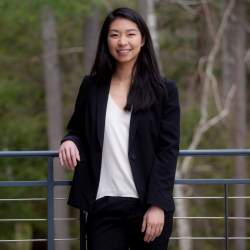
Kathy Liao T’20
My boss at my first job out of college recommended that I get an MBA. He really believed in me and thought it would be a great opportunity for me to learn and gain confidence in myself.
Business school for me was all about personal growth and this focus led to me directing my efforts on things outside the classroom. For example, as both a first and second year, I was elected to the Student Board as the Quality of Life chair, where I worked on promoting student wellness and happiness through planning fun events and programs, improving facilities, and making sure everyone feels included and part of the Tuck community.
I chose Tuck because of the people. I wanted to go to a school where everyone was “all in” on the experience and wanted to spend time getting to know and learning from each other. As I visited and explored other schools, I noticed that some of the incoming/prospective students I encountered seemed to be more interested in exploring the new city they were moving to than getting to know their new classmates. I was also motivated to find a MBA program that offered a community environment where I would feel safe and comfortable taking risks as I tried to grow. Tuck’s small community meant that I was always surrounded by friends who would support me as I tried out new things.
What really cemented my decision was attending Admit Student Weekend. During that weekend, I had the opportunity to meet current students who were extremely open in sharing their struggles and highlights of being in school. I appreciated their sincerity, and it seemed like they wanted me to walk away from our meeting equipped with the information I needed to make the best decision for myself. I also met prospective students who I immediately felt comfortable with and accepted by.
A major highlight of my Tuck experience was being able to serve as Quality of Life chair on the Student Board, building community, and bringing levity and smiles to people’s faces, even when we were going through tough times during recruiting. Visiting my classmates’ hometown, Salvador, in Brazil, and being welcomed by them as family was also an amazing experience. They introduced me to their culture, food, music, and dance. I can’t wait to return to Brazil for Carnival in the future! Lastly, I’ll never forget the little moments when my classmates took the extra step to help others and the Tuck community as a whole. It’s so inspiring to be surrounded by people who are motivated to make a difference and give back to the communities they are a part of.
The core class curriculum at Tuck really puts you through the ringer, with courses from finance, to modeling, accounting, and communication. You’re learning so many different topics at once that it’s easy to get overwhelmed. Thankfully, each study group is thoughtfully put together, with classmates who have varied experience, so any time I had trouble understanding a topic, I had my study group mates to lean on for help!
Coming into Tuck, I wanted to find a small to mid-size tech company on the West Coast and I knew I would need to do a lot of my own legwork. A Tuck alum I spoke to in the fall of my first year provided me with some key insights: That if I was really serious about recruiting for a smaller company on the West Coast, I would need to be really disciplined with my search. He recommended setting aside one hour a day, every weekday, to reach out to alumni who were working at tech companies I would be interested in working for. Ultimately, I decided to try working in big tech, but I learned a lot about different companies from these conversations and the alumni I spoke with provided great advice on how to best spend my time at Tuck.
As a Visiting Executive Fellow, I had the opportunity to host executives who were visiting Tuck to speak in classes and meet with students. Many of these visitors were alumni, and they were always so excited to return to Hanover and catch up with students. Since visiting Hanover is more than a quick trip away from the office, students have the chance to spend time with these alumni in small group settings, usually in the form of a lunch, dinner, or a coffee chat.
I think it’s most important to find a school where you like the current and other prospective students. You’ll be living and learning from these people for the next two years, so make sure they are people you want to learn from and are just as excited to meet you as you are to meet them. Talk to current students and alumni to get a feel for what the community is like and figure out if Tuck is the type of environment you will thrive in.
Marketing/Technology
Fremont, California
UCLA, BA, economics
Market research and analytics at trueX, a digital advertising startup that was acquired by 21st Century Fox (now part of The Walt Disney Company), Los Angeles, CA
Tuck Student Board Quality of Life chair; Center for Digital Strategies associate and fellow, Visiting Executive fellow; Consortium fellow
Project with Google Mobile Gaming through the Center for Digital Strategies, building a playbook for mobile game developers; First-Year Project with a fintech company in Peru, designing an app to help improve the financial literacy of underbanked youth in Latin America
Israel GIX with a few days in Jordan before class started; Center for Digital Strategies China trip to visit tech companies; student-led trips to Brazil, Belize, and the Philippines over school breaks
Microsoft, product marketing manager—partner marketing focused on cybersecurity in Redmond, WA
Traveling to my classmates’ hometowns in Brazil and spending New Years in Rio with a group of 20+ Tuckies, then staying with another classmate’s family in the state of Salvador; winning 2nd out of 40 business schools in the Tepper Tech Innovation Challenge with HP; camping, hiking, and exploring the Upper Valley with my pre-term camping group; our GIX to Israel; snowboarding trips with classmates in New Hampshire, Vermont, and Canada
Communicating with Presence, Negotiations, Power and Influence
Microsoft Marketing Rotational Program in Redmond, WA
At Tuck I’ve had the opportunity to: meet amazing classmates from around the world who broadened my perspective; to reflect on my life and how my experiences have shaped me into the person I am today; to better understand what values are most important to me, how to more intentionally live my life, and to become a better version of myself; to become more accepting of myself and more confident in my abilities; to learn more about my strengths and weaknesses, and the type of team member and leader I am.
Consumer Goods, Retail
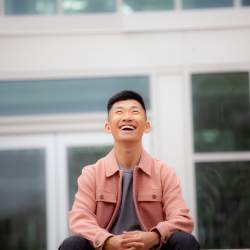
Kevin Yuan T’20
As an engineer, I’ve always liked solving problems. But three years into my engineering career I realized I did not want to pursue it as a profession. I looked around and saw that my managers and the people who were managing projects—the people side of the business—was something that I thoroughly enjoyed. I tried pivoting away from my career without an MBA first, but I was still seen as an engineer. I saw some of my mentors who were equipped with MBAs, and they had gone from an engineer who was good at managing people, to an MBA with an engineering background. The ability to transform my identity was extremely enticing.
I came to Tuck for the community. I attended an undergraduate institution with 50,000 other people. I then joined a company with 60,000 people. I felt like I was coming from places that lacked community. I was therefore very intentional about pursuing an MBA program at a business school where you know everyone and you’re no longer just a number or a face. I applied to three schools including Tuck and was admitted to all three. I then looked at the faculty and administrators I would be working with directly and their backgrounds—I was immediately struck by the directors of the Revers Center for Energy and the Center for Business, Government & Society. I was also struck by the fact that Tuck was not only the only business school to be invited to COP24, it was also the first business school among MBA programs to offer a course on climate change.
Tuck has allowed me to transform my professional career in a way that is truly unimaginable. Thanks to the tremendous assets in place at Tuck, I was able to transform from an engineer and photographer to a leader in the sustainable fashion space. From alumna Andrea Perez T’08, who graciously welcomed me to Portland and arranged for a full day of MBA visits stretching across the Nike organization, to Tuck being the only business school in the world to be invited to the UN Climate Conferences, to the tremendous mentorship I received from April Salas of the Revers Center and John McKinley of CBGS, I am eternally grateful for the opportunities I have been granted to allow for such a transformation.
My public speaking and public engagement confidence and presence has improved significantly since joining Tuck, and I have benefited greatly from such personal and professional development. Through courses like Leadership in the Global Economy, where I was able to testify in front of more than 100 of my Tuck classmates, and Communicating with Presence/ManComm, where my deepest social inhibitions were broken down and re-examined, I received tremendous academic support in gaining confidence and presence. I applied these learnings directly when presenting to Patagonia senior leadership during our FYP, sharing sustainable innovations at United Nations Climate Conferences, and ultimately advocating for climate solutions in conversation with Democratic Presidential Candidates at the NH Climate Townhall.
I think Tuck is a place that truly empowers you to chase your dreams. There’s no need for pragmatism when you come to Tuck. You have two years to transform your life, if you want to transform it. And however you want to transform it, however you want to pivot, Tuck and all its resources—its centers, its faculty, its staff and students—will empower you to do so. There is no such thing as too crazy. There is only “Is this crazy enough?” With my background as a wildlife photographer and an energy engineer, to transition to a career in sustainable fashion was a challenge as I had no expertise in the area. But since day one, my experience at Tuck has been, “That might be crazy, but let’s help you get there.”
Sustainability and Social Impact
Los Angeles, California
University of Texas at Austin, BS, engineering
Project Engineer, Chevron
Diversity and Inclusion Chair, Student Board; Revers Center for Energy Fellow; Center for Business, Government, and Society Fellow; Dartmouth United Nations COP24 and COP25 Delegate; Tuck Admissions Ambassador; TuckStuff Store Manager; Tuck Leadership Fellow
Sourced and led Patagonia First-Year-Project; UN COP24 and COP25; Hawaii Revers Fellow Trip; Democratic Presidential Candidate Climate Townhall
United Nations COP24 Delegate in Poland; GIX Morocco; Denmark Dartmouth Clean Energy Immersion; United Nations COP25 Delegate in Madrid
Sustainability and Innovation, Nike
Leadership in the Global Economy; Communicating with Presence
Direct mentorship by April Salas, executive director of the Revers Center for Energy and John McKinley, executive director of the Center for Business, Government & Society; direct mentorship by T’08 Andrea Perez
North America Sustainability Manager, Nike
Tuck has allowed me to transform my professional career in a way that is truly unimaginable. Thanks to the tremendous assets in place at Tuck, I was able to transform from an engineer and photographer to a leader in the sustainable fashion space. From alumna Andrea Perez T’08, who graciously welcomed me to Portland and arranged for a full day of MBA visits stretching across the Nike organization, to Tuck being the only business school in the world to be invited to the UN Climate Conferences, to the tremendous mentorship I received from April Salas of the Revers Center and John McKinley of CBGS, I am eternally grateful for the opportunities I have been granted to allow for such a transformation.
Consulting
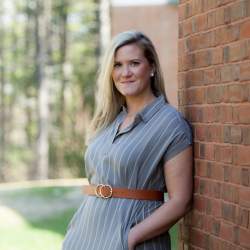
Caroline Wells T’20
Because I didn’t have a formal business education, I was looking for a school that placed a very high value on education. I wanted a place with a strong core curriculum that was really going to prepare me so that when I left after two years, I could say I got the business education that I needed. I was looking for a place that was going to tell me these are the things you should know foundationally to be a successful business leader. I was also looking for a school that had a mix of case-based education and lecture-based education. After living in D.C. for over four years, I was also looking to get out of the city. I was ready for something different—an adventure. I knew Tuck was a place that was going to challenge me and push me out of my comfort zone.
One of the most transformational experiences for me has been my experience as Tuck Student Board President. I think it’s given me a real-time opportunity to apply a lot of the lessons I’ve learned in the classroom—from strategy and leadership, to managing organizations, to even quant and accounting skills—in a very challenging yet safe space. I think there are unique challenges to managing your peers on a large-scale, and that really required me to be intentional about decisions while also creating really intense and real relationships with my peers. Through my role as Student Board President I was able to not only give back to Tuck, but also change and shape the school and shape the student experience here in a way that I hope is positive for everyone. The experience really helped me grow as a business leader.
My driving mantra around business school has been to be brave. I remember this moment in former NH governor John Lynch’s interactive seminar, How to Run for Office. He announced that we were going to have a mock debate and he asked for volunteers. Only one person raised his hand, and in that moment I told myself, ‘You have to be brave.’ So, I raised my hand and we had an impromptu mock debate in front of over 100 people. I was put on the spot. It was terrifying and exhilarating. And it was a chance to put my mantra into action. I look back on that moment fondly. I stepped out of my comfort zone and leaned into the scariness. It was also transformational because I had direct access to someone who ran for office, which I think is a rare opportunity.
So much of the magic of Tuck is a function of where it is. Tuck isn’t a place that you just stumble upon. Everyone at Tuck has made a deliberate decision to be there. It creates a unique and committed student body in a way that I don’t think others at peer business schools really get to experience. It can feel overwhelming at times, but it can also feel incredibly supportive and collaborative. You realize you will never again be surrounded by so many smart, engaged, interesting, and excited people in such a high concentration. There were moments where I had to remind myself how special it is that we’re here. If you kept everything the same about Tuck, and placed it in a different location from Hanover, I don’t think you’d have the same result.
During recruiting, I cast a very wide net. One of the tools that I really used to help filter down what I wanted in my career was the alumni network. I knew I was going to have to rely on the alumni network because I began looking at startups. Being able to leverage the power of the alumni network and send out 10 cold call emails and have nine helpful responses by the end of the week is something truly special. I felt like I wasn’t alone. When I received an offer from Google, I had a lot to consider. I found it helpful talking to alumni and my professors about my ultimate career goals and my career path. Ultimately, I decided to return to Deloitte in D.C., which is where my partner lives. After many valuable conversations with alumni, I realized I wasn’t quite ready to shut the door on consulting. With consulting, you’re constantly learning and there’s this velocity to your career. I wasn’t ready to stop moving at that high pace, and I knew consulting would help me to grind.
Tuck has managed to find a great balance between a timely and timeless curriculum. The function of the core curriculum is really providing that timeless foundation. Tuck is putting a stake in the ground that these are the core skills that every business leader should possess. You need to understand economics, strategy, marketing, and management. And yet, the curriculum acknowledges that the world is rapidly evolving and leading practices are always changing. That’s where our electives and experiential learning opportunities come in. For example, I went on a GIX to Vietnam where we met with American business leaders from Nike and Coca Cola. We were able to see in real time all these concepts from Macro Economics: How are business leaders thinking about interest rate risks? What is their strategy when moving part of their supply chain outside the U.S.? Part of being a wise and decisive leader is being able to look into your toolbox and consider the foundational lessons you’ve learned, but also being able to think in real time about how I apply those lessons differently today.
The biggest lesson I want to impart to prospective or incoming students is that no one person’s business school or Tuck experience will be the same as the other. That can be freeing and exciting. But it can also be scary. My call to action to everyone who comes to Tuck is to have agency over their experience and take ownership. Recognize that no one is going to step up unless you do. Don’t be afraid to say, ‘This is how I want my experience to look’ and then take the steps to make it happen.
Philadelphia, PA
University of Virginia, BA, foreign affairs and French
Deloitte Consulting, Global Public Sector Practice, Washington, DC
Tuck Student Board President; Center for Business, Government, and Society Fellow; Tuck Admissions Associate; Tuck Mentors; Tripod Hockey; Women in Business
Sourcing an early-stage digital health company and competing for seed money in the MBA Impact Investing Network and Training (MIINT) competition; founding a direct-to-consumer party supply venture through eFYP; applying my core curriculum learning through the Tuck INTEL program; developing a business plan and growth strategy for an Upper Valley wellness center through Tuck Community Consulting
Vietnam GIX; Graduate Business Conference (GBC) in Paris; Croatia pre-term trip; SDA Bocconi MBA Sustainability Conference and Regatta in Sardinia, Italy; Rotman Design Competition in Toronto, Canada; student-led trek to South Africa
Google Trust & Safety Team
Leadership in the Global Economy; Corporate Communications
Mock-debating in a “How to Run for Office” seminar taught by former-NH governor John Lynch; running 200 miles with a Tuck team for a “Ragnar” race; meeting with Nike and Coke executives in Vietnam; connecting with Tuck alums at Google to learn about their career paths and get advice; working with Dean Sally Jaeger and Dean Matt Slaughter to implement initiatives such as the Tuck Pulse Survey; living in a farmhouse in the mountains of Vermont with three of my closest friends; learning to ski and play ice hockey
I was drawn to Tuck specifically for its focus on transformation. I wanted to attend a business school where I could be confident that I would be a different person leaving than I was going in—a place that would challenge me, push me outside my comfort zone, and encourage me to really reflect on my goals and values. Tuck enables transformation because it creates a safe space for you to test ideas and fail. It encourages you to approach challenges from new perspectives and to confront your own pre-conceived ideas and biases. I’ve become a more confident and decisive leader because I’ve had the opportunity to develop, defend, and implement my ideas in a trusted and supportive community. Transformation takes work, trust, and confidence, but the end result is so worth it.
Deloitte Consulting, Commercial Practice, Washington, DC
Consulting
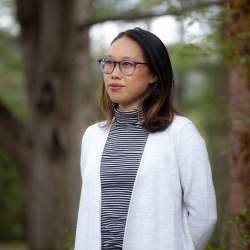
Suzy Wang T’20
I applied to Tuck because I realized that in order to implement long-term change in education, I needed business training to complement my policy and teaching backgrounds. As a high school math teacher, I loved working with students and seeing their learning happen in real time. However, students face many systemic barriers to equity outside of the classroom. Poverty and school financing practices rooted in institutional racism disproportionately disadvantage students of color, and meaningful change requires advocacy and management across sectors.
I wanted a school that gave me general management training in a welcoming and collaborative setting. I had no idea how to create a financial model before starting at Tuck. I knew I wanted to learn among supportive faculty and peers, and Tuck provides that environment. From your diverse study groups to your fall and winter sections, you feel like you can learn uninhibited here.
Speaking at Tuck Talks was one of the greatest highlights of my Tuck experience. I learned a lot about my vulnerabilities and strengths through working on a deeply personal story that I ultimately shared with much of the Tuck community. Delivering the talk to a packed crowd in Raether was rewarding not only because I was sharing a core part of my life to so many people, but because it was the culmination of new realizations about myself that I’d learned during the writing process.
I came to Tuck to be challenged analytically. The professors hold you accountable, but also encourage you to take risks in class. Professor Joseph Gerakos does this particularly well in Managerial Accounting, where most classes are run through the case method and led by student discussion. In his class, I volunteered for the sake of learning, not just because I wanted to be right. As a result, I became less afraid of making mistakes and more confident in using my voice.
Tuckies pay it forward. I accessed the alumni network during recruiting and never had to wait longer than 48 hours to get a response from an alum. Everyone wants to see you succeed. Alum remember being in our shoes and are eager to help us achieve our goals.
My advice to prospective students is two-fold: First, visit campus when and if you can and reflect on what you want out of the experience. A campus visit can give you a sense of the environment and culture of Tuck—much more than reading the website. Secondly, reflecting on what you want from an MBA is critical. Two years fly by! You certainly don’t need to have everything figured out but understanding what you care about and coming back to that when Fall term starts to feel overwhelming is incredibly centering.
Consulting
Brookline, MA, USA
Trinity College, BA, Economics & Public Policy; Harvard Kennedy School of Government, MPA
Secondary math teacher in New Orleans; Field Organizer for Obama 2012 campaign
Tuck Diversity Independent Study Program; Passing the Torch; DALI lab, Tripod hockey
Developing a business plan and app for my startup, teachDELTA, with the Magnuson Center and the DALI Lab; gathering customer research and forming a pricing model for teachDELTA with my eFYP team; advising the local Red Cross on how to improve its Net Promoter Score with my Community Consulting team; Tuck Center for Entrepreneurship
Armenia GIX; Tuck Tibet Trek (Summer 2019)
Boston Consulting Group, Atlanta
Managerial Accounting with Prof. Gerakos; Communicating with Presence with Prof. Rice; Structuring Mergers & Acquisitions with Prof. Thorburn
Working with Daniella Reichstetter on developing teachDELTA; being an all-star tripod goalie; going down my first Black Diamond after learning how to ski my first year; Tuck Talks speaker
Boston Consulting Group, Atlanta
Tuck is a place where you can run full speed ahead to create the experience you want. For example, as a former teacher, I am passionate about education equity in K-12 public schools. I arrived on campus with a loose hypothesis of how to address instructional bias in the classroom, but no business plan or strategy to actualize the mission. I met with Daniella Reichstetter, executive director of the Center for Entrepreneurship, and she directed me to the Magnuson Center, the DALI Lab, and grant opportunities to further my startup idea. More importantly, she encouraged me—which was critical to hear as a founder, having been told “No” many times early on. Through a partnership with DALI and an eFYP with other Tuck students, I was able to conduct customer research, test hypotheses, and develop a business plan for teachDELTA. At the end of my first year, teachDELTA was a finalist for the Teach for America Social Innovation Award and the winner of the Amazon Alexa Grant. Though I am not pursuing teachDELTA full-time, I’m grateful I had the chance to test, pivot, and re-channel my passion for education equity.
Technology
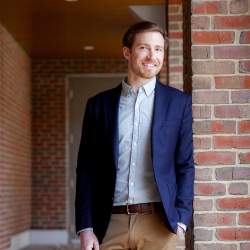
Brendan Berry T’20
Six years into my career I had obtained some early professional success and was living a comfortable life. However, I found my network to be increasingly homogenous, and I was concerned that not having a formal business education background would limit my professional progression later in life. I wanted to seek out an opportunity to be exposed to people from completely different professional backgrounds and parts of the globe, and business school seemed like a great way to do that.
More than anything, the thing I wanted most out of my MBA experience was community. While all schools offer incredible professors, I wanted to maximize my opportunity to learn from my peers, all of whom had wildly different backgrounds from myself. While on the surface a rural environment in New Hampshire may not seem like an ideal business school environment, I quickly learned that not having to compete with urban distractions meant that everyone who came to Tuck was fully invested in their Tuck experience, which in turn creates a strong sense of community.
While Tuck’s campus is in New Hampshire, I was shocked to realize that experiential learning opportunities afforded to you at Tuck are truly endless, and not bound by Tuck’s immediate environment. I was able to take on countless experiential learning opportunities, from screening pitch decks for a Silicon Valley venture capital firm, to completing consulting projects for Patagonia, to visiting technology startups in China—there are countless resources at Tuck to make any experience you want a reality.
The learning environment at Tuck forces you to truly learn what it means to work as a team. Beginning with your first days on campus, Tuck matches you with a diverse study group, carefully crafting teams with geographic and professional diversity. Through countless projects, you are forced to learn your individual strengths and weaknesses, and how to work collectively to achieve a common goal. While this may seem basic in nature, most students arrive to business school having had a long history of professional success based on their own efforts. However, Tuck teaches you that organizational success requires true collaboration—and the school works hard to foster an environment to build skills necessary to achieve organizational success.
The Tuck alumni network is incredibly accessible in ways that I did not remotely anticipate. Entering Tuck, I assumed my only true interaction with alumni would be through email, occasionally reaching out to people who may be directly relevant to my career. While Tuck alumni are very accessible via email, it is far from the only interaction I have had with the alumni network. While at Tuck I was shocked at how accessible and available Tuck alumni are in all aspects of Tuck life.
I was a Visiting Executive fellow, helping to run a program that fosters direct engagement between students and visiting executives through intimate interactions. Many of the visiting executives who visit Tuck are alumni, and they go above and beyond in making themselves available to Tuck students. Separate from that, on almost every domestic and international trip that I took while at Tuck, we often reached out to Tuck alumni. It was shocking how enthusiastic they were to take essentially strangers out to dinner, with the only thing connecting us being our bond to Tuck. These are some of the experiences that I have had with the Tuck alumni network that truly emphasized how strong the Tuck bond is.
Tuck is a special place. I firmly believe that all business schools will provide students with a great academic experience. While Tuck’s academic experience is excellent, what makes Tuck so truly unique—its supportive community and collaborative culture—is something that can only be experienced in person.
Lafayette, CA
Colorado College, BA, psychology, 2012
Amazon.com, senior product manager technical at Prime Now
Visiting Executive Program fellow; Center for Digital Strategies associate and fellow; tripod hockey; Tuck Technology Club
My First-Year Project with Patagonia: We helped the company evaluate entry into the rental apparel market. Our final presentation was delivered in person at Patagonia’s Ventura, CA headquarters, complete with a day of surfing with Patagonia employees.
Field Studies in Venture Capital: I helped screen pitch decks for potential investment for a Silicon Valley based venture capital firm.
Global Insight Expedition to Armenia, with a trip to Georgia beforehand to visit Tuck alumni; trip to China (Shanghai and Beijing) with the Center for Digital Strategies to evaluate China’s impact and approach to technology development.
I interned at Slack Technologies in San Francisco in a strategy role. Specifically, I worked on a product strategy project for them around potentially launching a new adjacent product in order to expand their addressable market.
The CEO Experience with Governor John Lynch. This class is the quintessential Tuck experience, taught by an extremely experienced professor in a very personal setting. I walked away from the class with a great appreciation for the true complexities associated with managing complex organizations, and a series of tools to handle issues as they arise.
While I constantly heard about the strength of the Tuck community, I was still blown away by how welcoming and approachable the community was when I became a student. Everywhere I have traveled, from China, to Georgia, to Colombia, to San Francisco, Tuckies have gone out of their way to meet me and help in any way they can. This sense of community is felt constantly on campus, with all events, social and professional alike, open to everyone.
I will be headed to San Francisco to continue my career in product management at Ripple.
Energy and Sustainability
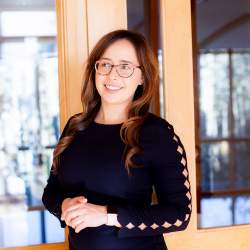
Aygul Sanzyapova T’19
While at Tuck, I switched my career to renewable energy finance. It was not an area in which I had experience, but I saw business school as a platform to finally jump into it. Before Tuck, I worked for my family’s business, and before that I had a brief gig in the fashion industry. So, for me, clean tech and corporate finance were both completely new topics that I had to learn from ground zero. Tuck was a perfect place to do that.
Tuck provided me access to incredible resources and opportunities, and it was up to me to lean in and take advantage of what was offered. The Revers Center for Energy was a tremendous source of knowledge, projects, and networking for me. I attended career and industry exploration events like Energy 101, the Speaker Series, and a project finance workshop that helped me to acquire necessary skills to recruit for a job in renewable energy finance. The Revers Center always had many project opportunities: for example, I was selected to work on a First-Year Project for a US leading solar developer, which not only enabled me to expand my resume but also learn a huge deal about wholesale electricity markets. I also participated in an independent study for a local private equity firm, for which we analyzed data and wrote a report on greenhouse gas abatement for their portfolio companies.
My summer internship was with Verogy, a commercial and industrial solar developer led by a Tuck alum. It was a real learning curve for me. In just a couple of months, I learned so much about the solar energy market on the ground that, in turn, helped me develop a solid knowledge base to pursue my full-time role in investment banking at Marathon Capital. While I greatly enjoyed my time at Verogy, I realized I wanted more exposure to the broader renewable energy sector, including wind and utility scale solar. That is why in my second year I decided to pursue investment banking.
I didn’t expect my first year to be so challenging. When I arrived at Tuck, I did not have experience in a traditional corporate environment. For me to catch up and build up my resume for future recruiting opportunities, then, I had to work. That’s why the Revers Center was key for me. April Salas, executive director of the Revers Center, would talk to me for hours, sharing her experience and giving me advice. Once you really take advantage of the programming the school offers, the world is your oyster.
If I could give advice to other students, I would recommend staying focused on what you really want to do. With so many recruiting events going on when the school starts it is very easy to get distracted and lured into recruiting events of companies that aren’t on your target list. From the start I knew that I wanted to pivot my career into clean energy. Tuck has a very strong and supportive alumni network and access to unmatched industry resources that helped me build up my resume and make this challenging transition into renewable energy finance. Just knowing what the opportunities are and what your preferences are will help you a ton, because the recruiting period could be very overwhelming. You are best served by directing your time with intention.
Krasnodar, Russia
Parsons the New School for Design, New York, AS, fashion marketing, 2011 – 2013; National Research University – Higher School of Economics Moscow, BS, economics and international affairs, 2007 – 2013
Astra Seafood, New York, 2016 – 2017; Merlette International, New York, 2015 – 2016; Bubnovsky Sport and Medical Center of Physiotherapy, Krasnodar, Russia, 2013 – 2015
Revers Center for Energy fellow; Tuck Sustains; Tuck Pride and Jewish Association co-chair; Tripod; Energy Club and Finance Club member
FYP with Cypress Creek Renewables; Independent Study with New Energy Capital
Morocco Global Insight Expedition; fun trek to Japan and Korea
Solar Developer Verogy, Project Finance and Commercial Operations summer associate
Arrhythmia of Finance; Managerial Accounting; Energy Economics; FYP
Meeting Daniel Revers T’89, founder of ArcLight Capital; trip with Revers fellows to Puerto Rico to research electric grid recovery opportunities after hurricane Maria
Tuck has opened tremendous opportunities for me to pursue my dream job. While I didn’t see it at first, I clearly see now how I have grown both professionally and personally during my time at the school; the transformation was gradual but pivotal.
Marathon Capital, investment banking
Health Care
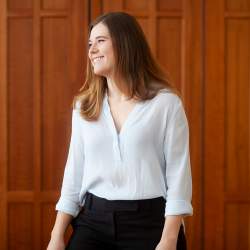
Sophia Cornew T’19
What you learn at business school is going to be similar at most of the top MBA programs. The question is, where are you going to learn best? What kind of environment is going to allow you to get the most out of your experience? When I considered my options during the application process, I knew I was ready to immerse myself in a tight-knit, close, remote environment in the woods. Tuck has been a safe space to learn, to challenge myself, and to prepare for my adventure.
I am passionate about tackling the fundamental issues of health care. For me, this process centers on taking the complex and making it simple. Here at Tuck, I am building my core competencies in a wide variety of functions crucial for effecting change in the health care space, from finance to marketing to strategy. The more I know, the more questions I can ask to get to the root of a nuanced problem and, in turn, develop practical solutions.
The Tuck MBA leverages my existing business experience to further my entrepreneurial ambitions. From my perspective, an MBA is valuable even for those who do not want traditional careers in business. The process of learning more perspectives makes you a more critical problem-solver—and that’s an ability that any company anywhere in the world needs. I think the value of Tuck is that I can now look ahead and see around corners better; my courses and activities have given me more entry points to a problem. I leave Tuck with a stronger intuition about what questions to ask and, perhaps even more importantly, when to ask why.
The health care industry is so massive. Tuck helped me to home in on a space within the industry that I really care about. I’ve been most influenced by my conversations with alumni and with in-class speakers who came through the Center for Health Care or the Visiting Executive Program. They challenged my positions and helped me to articulate the parts of health care I am drawn to most. I learned to look at industry sectors where no one is winning: in these contexts, people are more inclined to look critically at themselves and do something different. For me, those sectors presented a more attractive starting point, than, say, taking on more entrenched areas of the health care system.
For my next adventure I will be joining Ciitizen, a series-A startup in the Bay Area that is empowering patients through access to their health information. Tuck has been a safe place for me to examine my own patient experiences that motivate my desire to fix our health care system. It has been transformative to be able to take a personal mission, build my professional voice around it, and ultimately have the opportunity to build that mission with the team I will be joining this summer. Tuck has given me all the tools and confidence I need to pursue a career in line with what is most important to me.
My most important takeaway from Tuck are the people. Tuck brings people together who normally would never cross paths. I’ve worked side-by-side with people from countries I’ve never been to, hiked with people who spent their careers in industries I have zero experience with, and shared other countless meaningful experiences with my classmates over the past two years. We’re doing things, we’re out together, we’re sharing Tuck traditions. It’s not just about sitting in class: it’s about being here together.
Health Care Technology
Mexico City, Mexico / Portola Valley, CA
Bowdoin College, BA, economics and biology
Bridgewater Associates; LifeCo, seed stage health care tech company
Tuck Social Venture Fund director; Center for Health Care fellow; Entrepreneurship Club co-chair; Visiting Executive fellow; tripod hockey; Women in Business
Global Insight Expedition to Singapore / Laos; eFYP; founded company with MD/MBA classmate; Tuck Social Venture Fund; Tuck Community Consulting; Led Revolv x Tuck pilot launch
GIX to Singapore; Tuck Africa Namibia Trek (March 2019)
Collective Health, SF, product marketing intern
Arrhythmia of Finance with Peter Fisher: learning how to better assess risk and make judgements; Entrepreneurial Innovation Strategy with Ron Adner: thinking beyond the idea itself and holistically evaluating about what is required for successful ideas to scale
Daniella Reichstetter, Curt Welling, and John McKinley for their support of the Tuck Social Venture Fund; Suzie Rubin and Lindsey Leininger of the Center for Health Care; Pat Harrison in Admissions; Steve Lubrano, executive director, infrastructure and operations
Ciitizen, corporate development team, (a series-A health care tech startup in Palo Alto)
A general management education for me is about learning how to better see around corners and having a richer understanding of the different forces that come into play in order for a company to build and deliver value. Sharing this experience with people from backgrounds, countries, and walks of life I wouldn’t have met otherwise (e.g. military veterans, international students, and classmates from completely different industries than me) has added incredible richness to my life. When else are you thrown together with 290 talented, motivated, and inspired people in the remote woods of NH and asked to learn, grow, and explore together? Tuck is once in a lifetime.
Health Care
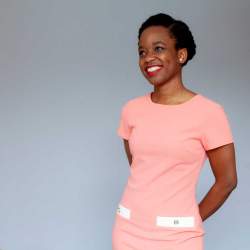
Tolulope Kehinde T’19
I moved to the United States in 2009 from Nigeria. After attending Mount Holyoke College, I knew I wanted to go to medical school. But as I learned more about what I wanted to do, I realized I didn't want to just be a doctor. I know how that sounds! But what I mean is, clinical work alone wasn’t going to get me where I wanted to go. So I figured out that I might want to do an MD/MBA program.
My focus is health care systems on the African continent. I had done some work in Uganda, and it hit me that things I wanted to change didn’t necessarily have to do with only physiology. There’s an entire socioeconomic side to the problem, as well as the business of dealing with insurance companies and people other than the patients. I wanted to understand the larger health care ecosystem. So that’s why the MBA, and Tuck specifically, was appealing to me.
In my eyes, African development has to do with giving Africans opportunities to create the lives they deserve. I’m very interested in social entrepreneurship. But I had never done anything business related in my life! Tuck's general coursework taught me so much—from the basic economic principles of supply and demand to more complex topics like capital markets. Consulting Project Management gave me a framework for tackling consulting problems. The Operations course in the core taught me about all the little things one has to think about when running a company—components that customers might not even notice until things don’t work. And my classmates’ varied levels of expertise were also quite an instructional part of my induction.
The most obvious asset I’ve gained from my time at Tuck is confidence. I did a short internship in South Africa last summer at African Leadership Academy. It’s a place I’d had an organizational crush on for a long time. I was consulting and building out a health care network for their alums. When I got there, I didn’t have any of the information I thought I would have. But because of my time at Tuck, I was able to jump in very quickly. I knew how to get the right answers and the right language to use. When I put my deck together, I was impressed by what I had learned in just one year! I also feel like I can talk to a wide array of people about just about anything.
Tuck has also given me the opportunity to think about what it means to lead, especially as an introvert. People often paint introversion as antithetical to leadership, but as I have seen myself navigate my internship or co-chair the Tuck Africa club, I’m even more emboldened to disagree. It also helps that I’ve discovered numerous examples of effective leaders, who also happen to be introverts.
Being an international student can be hard. This is a special place that grows on you. The community is very collegial. It feels more homey than, say, Boston. For that reason, if you are moving from far away, it’s easy to find a type of home here at Tuck.
Health Care
Lagos, Nigeria
Mount Holyoke College, BA, neuroscience and behavior, 2013; Geisel School of Medicine at Dartmouth, MD, 2019
Beth Israel Deaconess Medical Center 2013 – 2014, neurology research assistant
Tuck Africa co-chair, Association of Christian Students at Tuck co-chair, Tuck ambassador Africa region, teaching assistant, Global Economics for Managers, World Government Summit Global Universities Challenge participant
First-Year Project reimagining the future of senior living communities; Pfizer Case Competition on increasing Prevnar vaccine uptake
Global Insight Expedition to Peru to understand the role of public-private partnerships in economy development; summer internship in South Africa; prior to Tuck, internships and clinical experience in Uganda, Rwanda, and Nigeria
Strategic initiatives intern, African Leadership Academy, South Africa, Strategic Initiatives intern
Consulting Project Management, Managing for Social Impact, Social Entrepreneurship, Managerial Accounting, Operations Management
Sitting in GEM realizing I’d been missing out on Macroeconomics all my life; Getting feedback at my summer internship and realizing that I had learned and grown a great deal at Tuck; Meeting many amazing classmates and community members
Tuck has been a lesson in possibility. I came to Tuck with limited business knowledge, uncertain about whether this introverted woman would fit in. Since then, I have gone on to have the most wonderful experiences and have found my people and my place at Tuck. I’m leaving Tuck emboldened to keep dreaming, confident that this introverted woman can do anything she sets her heart on.
Residency in Anesthesiology
Consulting
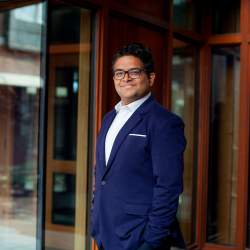
Abhijeet Deshmukh T’19
At my previous job, I started to feel like I was stagnating. I was repeating the exact same tasks, not really learning anything new, and was restricted in terms of my earning power. I wanted to get an MBA to get the skills to jump to the next level and have a larger source of impact. I was also looking to learn and live in another country for what was likely to be my final formal education degree. As an international applicant, I applied to many schools in the U.S. to maximize my chances of getting in without really thinking through why a school was or was not the right fit for me. Once I got my results and had to make a choice, I started thinking about the things I really valued in a place.
For me, Tuck was the right choice because it’s a small school, and I figured I would have greater access to a strong network because of it. I also really appreciated the fact that every single Tuckie I reached out to responded to me; it made me feel like they really valued my time. And finally, Tuck had a great placement record and offered a lot of financing to international students, which was an important factor for me.
Communicating with Presence was probably the most difficult, albeit interesting, course I have taken at Tuck. It is taught by someone who has a lot of professional acting experience. The goal is to help you unlock both your verbal and non-verbal presence to become a more effective communicator. This course required me to dig deep; to be okay showcasing vulnerability and work on something which I had never been good at. When I came to Tuck, everyone emphasized how important the soft skills in business are. After taking this course, I now understand why that is. I am a better communicator and discovered things about myself I had never really considered before.
I participated in an OnSite course that included travel to a client Australia, and it was a fantastic experience. It helped me professionally because it allowed me to continue to work in an area I am interested in: energy. I was also able to build my leadership skills by focusing on both being an individual contributor and trying to make sure I was planning for the overall objective and team, too. I had never worked on a team that was so diverse—our team included someone from Argentina, the U.S., Singapore, China, and India. Learning about so many new cultures, working with a large organization, and using everything I had learned in my first year to make a real impact at a company was probably the most defining experience I have had at Tuck.
I came to Tuck determined to step out of my comfort zone. I wanted to work on both hard and soft skills while making sure I was able to enjoy everything the Tuck community has to offer. Through class, I learned how business gets financed, how operations can be structured, and how organizations behave. Through the Tuck Startup Incubator course, I learned about the challenges of starting-up, the thrill of discovering a problem, and learning how to build a scrappy solution. And finally, through my classmates, I learned how to value more in life than just my job. I feel like I am leaving with a sense of belonging and bonds with classmates that I will be able to carry forward in the future.
After Tuck I’m going into digital consulting at McKinsey. I am graduating with a sense of confidence because I know that I will be able to handle what the world will throw at me. I am graduating with a sense of humility because one of the most important things Tuck has taught me is that I need to work with other people to create change and that I will never stop learning. And finally, I graduate knowing that I have a school and a support network that will always be by my side, and that sense of security is invaluable.
Consulting
Mumbai, India
IIT Bombay, Btech, Mechanical Engineering, 2010
nv vogt; SunEdison; KPMG
Consulting Club Co-Chair, International Club Co-Chair, Career Mentor, Tuck Incubator program
First-Year Project with a medical devices startup assessing the commercial potential of a new device in the U.S.; Independent project with the town of Hanover on selecting potential solar sites; Working on a tax and financial services startup with Tuck’s Startup Incubator
Global Insight Expedition to Armenia; OnSite Global Consulting project with a large oil and gas company in Australia
McKinsey & Company, summer associate (digital), Boston
The CEO Experience with John Lynch; Communicating with Presence with James Rice;, Fundamentals of Web Programming with Devin Balkcom; Tuck Startup Incubator
The speakers in the Startup Incubator course; Tuck alumni in Georgia; the International Club cabin night
McKinsey & Company, associate (digital), Boston
My time at Tuck has been defined by the incredible people I have met. They have given me the confidence to take risks, face failure, and work on my shortcomings. Their investment in my success and growth has allowed me not only to change careers but also become a better person. The two years I have spent here have given my some of my best friends and have created enduring relationships that will last a lifetime.
Consulting
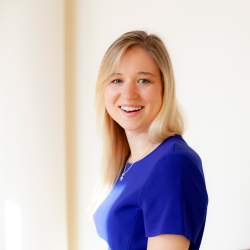
Joanna Gawlik T’19
Consulting
Brooklyn, NY
Johns Hopkins University, BA, International Studies, 2013
Goldman Sachs (Mergers & Acquisitions Group; Investment Banking Legal)
Center for Business, Government & Society fellow; Revers Board fellow for the Upper Valley Haven; Leadership Fellow; Consulting Club mentor; Women in Business
First-Year Project working with a Native American Navajo Hospital; OnSite Consulting project in Napa Valley, California for a South African winery
China Global Insight Expedition focused on startups/entrepreneurship in which we visited companies like Alibaba, NIO, JD.com; Travelling to Namibia with the Tuck Africa Club over Spring Break
Deloitte Consulting, New York, New York
Managing for Social Impact with Professor Nan Stone; Communicating with Presence with James Rice; The CEO Experience with former NH Governor John Lynch
Having dinner with Amy Goldstein, Pulitzer Prize-winning author of Janesville, the night before her talk as part of our CBGS Fellows Inequality Speaker Series; Celebrating with my Tuck Team for making it to the finals in the Rotman Design Thinking Case Competition in Toronto; Visiting the New Hampshire Statehouse with a small group hosted by Governor Lynch; Hosting a lunchtime Polish Culture Chat at Tuck and getting to have coffee with a renown Polish economist and author; Presenting my final project on healthy eating to the leadership of the Upper Valley Haven, a local nonprofit, as a Revers Board fellow
Deloitte Consulting in New York, New York
When I visited Tuck during September’s application season right as the leaves were turning color for the Fall, I felt immediately at home. Tuck’s campus has a magnetic pull that made choosing to pursue an MBA here a natural choice for me. I knew that Tuck’s friendly and supportive community, strong academic and professional programs, and enthusiastic alumni network would create an experience that I knew would allow me to make the most of my MBA experience.
During our orientation week at Tuck, Dean Slaughter spoke about the importance of reflection during our two years here. I took this lesson to heart and spent my time at Tuck immersed not only in trying to understand how I could sharpen my business toolkit, but also trying to articulate the principles and values that shape me as a leader. As a result, I feel that I’ve truly learned from Tuck the importance of being an empathetic, well-rounded, and wise leader capable of bettering business and society—a message that I look forward to carrying with me as I continue my professional and personal journey after Tuck.
Financial Services
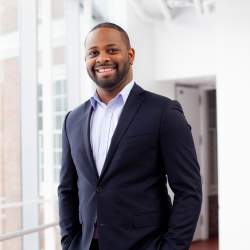
Obinna Arizor T’19
Once I spoke to people from Tuck, I just knew something was special. It’s hard to discern between different MBA programs when looking at business school websites alone. But the level of engagement and the sense of community here was really palpable. Being from New York I wanted something a little bit different, so it made sense for me to come here as a real stretch and growth opportunity. I knew I would love it for two years.
I’m going into general management at JP Morgan after Tuck. I didn’t come here with the expectation of doing that. I thought I was going to be a consultant. When I started at Tuck, I was like, you can’t tell me I’m not going to do consulting! Then I did it for the summer and determined it wasn’t the right fit for me immediately post-Tuck. I think that’s great. Tuck provides you with the option to do so many different things. You learn about so many industries and functions you didn’t have exposure to before. It allowed me to find out what I wanted, and what I didn’t want.
The international exposure I had when I went to South Africa was amazing. It was a GIX with Professor Stocken. Mostly we focused on the revitalization of the African continent. We looked at the industrial sector, entrepreneurship, and even met a woman who had a business making animals out of beads. I had never worked abroad, and never studied abroad. So, yes. You learn a lot about domestic business, but the school is putting a lot of resources behind making sure you understand the wider, global picture. That was important to me.
Time at Tuck feels like it has a multiplier to it. Living in the dorm for three months, it was like I knew those people for three years. The time it took for me to bond with people here is much shorter than anywhere else. I can’t imagine life without some of the classmates that I’ve met here.
This is a place you come if you want to grow. if you want to work on yourself professionally, personally, and you value relationships, this is a good match. It’s not for everyone. But if you are a relationship-driven person, and you want to come here to form life-long bonds with classmates and faculty, and you want an amazing educational experience, then Tuck is the place for you.
General Management/Financial Services
Stony Point, NY
Binghamton University (SUNY) BA, psychology; Duke University-The Fuqua School of Business, Master of Management Studies (MMS)
Education Pioneers, summer fellow, iMentor 2017; Faith Christian Academy, assistant director, 2012 – 2017
Admitted Students Weekend (ASW) 2018 co-chair; Diversity Conference (DivCo) 2018 co-chair; Tuck Admissions associate (TAA); Visiting Executive (VE) host fellow; Consortium for Graduate Study in Management (CGSM) liaison; academic representative; Consulting Club; Marketing & Brand Management Club; Technology Club; Black Students Association at Tuck (BSAT); Tuck Africa Club; Tuck Student Ambassadors
Entrepreneurship First-Year Project (e-FYP), working on a two-sided platform created to combat the inability of small businesses in the United States to effectively market their goods/services by connecting them with more affordable internationally outsourced freelancers/creatives
Global Insight Expedition (GIX) to South Africa with Financial Measurement Analysis and Reporting (FMAR) Professor Phil Stocken; Student organized treks to Colombia, Australia, New Zealand, and Thailand
McKinsey & Company, summer associate, Chicago, Illinois
Negotiations with Professor Daniel Feiler; Consulting Project Management with Professor Julie Lang; Ethical Decision Making with Professor Alexander Jordan; Entrepreneurship and Innovation Strategy with Professor Ron Adner; Power and Influence with Professor Pino Audia
I expected to enhance my quantitative ability and business acumen as a Tuck student. Not only have I done so, but I have grown personally, built relationships with lifelong friends/allies, and developed the confidence to truly effect the change I would like to see in business and society.
Meeting Amy Mitson, senior associate director of recruitment and communications, in 2016 at the Diversity MBA Admissions Conference (DMAC) in Los Angeles and instantly having a genuine connection with her is a fond memory. This affirmed my affinity for the Tuck MBA program—I knew from that day that Tuck was where I was meant to be. Further, meeting inspirational alumni at DivCo 2016 as a prospective student including Andrew Olaleye T’13 and (then) current students Brian Cook T’17, Sade Lawrence T’18, and Bianca Goins T’18, also solidified my interest in becoming a Tuck MBA. Since being at Tuck, some of my favorite moments include hosting prominent executives through Tuck’s Visiting Executive (VE) program, serving as a student representative on the Curriculum Review Committee (CRC), and interviewing countless talented prospective students as a Tuck Admissions associate (TAA)
J.P. Morgan Chase, Chase Associate Program (CAP) associate
Education
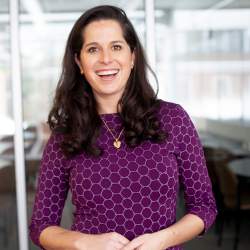
Jamie Mittelman T’19
Many of the skills I have learned have allowed me to develop meaningful professional relationships that I will continue to foster after graduation. The past two semesters alone I have worked directly with the World Economic Forum; first as a consultant in Johannesburg, South Africa, and now as a case writer. I look forward to remaining in touch with the Forum and (hopefully!) supporting them in the presentation of our teaching case. My relationship with the Forum is fully attributable to Tuck’s ability to form partnerships and create experiential learning opportunities with influential partner organizations.
Tuck taught me how to find and create joy during the hardest time in my life. My Dad passed away of incurable brain cancer the summer before I started Tuck. This past summer my siblings and I thought we were going to lose my Mom but saw her miraculously come back to life at the hands of emergency room surgeons and critical care teams. Tuck’s focus on reflection, our remote location, and our close-knit community have not only buoyed me through these difficult times but allowed me to find greater clarity around who I am as a leader. I share this because I want prospective students to understand how uniquely personal Tuck is in the larger MBA-landscape and how three attributes—our program’s focus on reflection, remote location, and commitment to community—were essential in not only my decision to come to Tuck, but also my ability to thrive while here.
Tuck’s focus on reflection in and out of the classroom has given me the time to determine how I want to live each and every day. While the social calendar is always chalk full of incredible events, due to my personal situation, I have learned how to find happiness in the unexpected, and to create my own happiness when I can’t seem to find it around me. After five years of living in NYC, I was eager to soak up the woods, as I realized that I am happiest outside. Our proximity to countless mountains and lakes has facilitated every type of outdoor activity possible.
Tuck surrounded me with classmates and faculty who have made me smarter, more resilient, and empathetic. Tuck’s commitment to community is truly special on its own, but even more so within the world of top MBA programs. Every MBA graduate knows how to read a balance sheet, assess a company’s liquidity, or bring a product to market. What makes Tuck unique and what has allowed me to thrive is our program’s ability to turn 290 individuals into a team.
Cause Marketing, International Education
Dover, MA
Middlebury College, international studies major with a concentration in geography; gender studies minor.
Senior Marketing Manager, Citizen AOL (now Verizon Media); Conservation Market Analyst, World Wildlife Fund; Project Manager & Access Academy Teacher; Asian University for Women
Co-Chair, Tuck Gives; Tuck Lead; World Government Summit, Global Universities Challenge; Fellow, Center for Digital Strategies; Soccer Club
Living in a dormitory as a 30-year old; fall study group with classmates from very different backgrounds; Patagonia case competition developing recommendations for supply chain improvements; Personal Leadership Initiative; First-Year Project developing a go-to-market strategy for an Ecuadorian agricultural startup hoping to launch in the US; Independent study writing a teaching case for the World Economic Forum
GIX with Professor Paul Argenti in Singapore and Laos; OnSite Global Consulting with the World Economic Forum in Switzerland and South Africa; Attended the 2018 World Government Summit in Dubai (2019 Tuck lead); classmate-led trek to South Korea
MBA Sustainability Intern, Diamond Star Ranch
Negotiations with Professor Dan Feiler; Corporate Communication with Professor Paul Argenti; Business and Society with Professor Curt Welling; Entrepreneurship and Innovation Strategy with Professor Adner
Speaking with current students and alums when I was applying and seeing and feeling their enthusiasm; Outward Bound pre-orientation trip; winning the World Government Summit the first year Tuck was invited to participate; Dartmouth Outdoor Club (DOC) cabins with friends; Receiving three concussions while at Tuck and working with faculty as I was recovering
Master in Public Administration, Harvard Kennedy School
Tuck has opened countless professional doors for me. The business skills I have developed and the relationships I have built will support me throughout the rest of my life. Tuck’s interdisciplinary program has allowed me to turn previous areas of weakness into strengths. Specifically, the curriculum has armed me with the technical skills to evaluate an organization’s financial stability, assess its strategic plan, and improve its marketing efficacy. My first semester, I hesitated to use Excel for anything beyond basic equations or charts—I now feel comfortable building complex predictive models.
Marketing
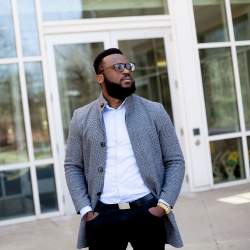
Mark-Emmanuel Onyenyili T’18
Growing up as a son of missionaries, my professional goals have always orbited around the mission of making a positive difference in the world by living a purpose-driven life. Prior to Tuck, I managed an insurance unit of 240 associates and it was during this time that I recognized the enormous capacity of business to solve complex problems within society. I also realized that that while my undergraduate degree in Finance & Investments gave me a strong quantitative background, I needed a much broader skillset that would prepare me to one day successfully lead a company in an increasingly global and connected economy.
I was considering other programs with a general management focus but ultimately chose Tuck because I found the mandatory first year curriculum, opportunities for experiential learning and global business learning opportunities compelling propositions that I knew would challenge me intellectually and help me grow as a leader. Over the past 18 months, what has made my Tuck experience transformative is the level of curation that’s only made possible by the ease of access to faculty and the support of administration. It’s an environment that has inspired my classmates to organize conferences like the inaugural Emerging Markets Conference, launch startups, and initiate independent studies in a plethora of fields. In my case, I chose to examine the possibility of rebranding Haiti as a historical and cultural tourist destination through an independent study.
Coming from an insurance background, I knew very little about the world of brand management where I wanted to pursue a career post Tuck. After reaching out to Tuck alumni in the industry, I soon found myself with multiple mentors who guided me through the interview process. One mentor went as far as spending 4 hours on the phone with me on a Saturday to ensure that I was fully prepared for a super day of interviews. This is a common shared experience that speaks to our community’s ethos and pay it forward mentality. In fact, at Tuck, we have a term called the ‘Tuck Fabric,’ and to many this term means different things but to me it refers to the fusion of woven trust-based heritage and small town values, rich in generosity, authenticity, and substance.
From being part of a study group that served as a primer for working collaboratively to serving on the board of a Child Care Center to helping a local school district create a new brand identity, many of my most valuable lessons have come outside the classroom. A key experiential learning engagement was working with an apparel company as part of the First-Year Project (FYP) requirement to derive metrics to evaluate their product life cycle and end-of-product management. A highlight of my Tuck experience was a learning expedition to South Africa where we explored the major industries that contributed to the country’s stalled economy while examining the leadership environment with the theme of “Rescuing the Renaissance.” I was also fortunate enough to be part of an OnSite Global Consulting project that helped Impact Hub, a global network of that serves as part innovation lab, part business incubator, and part community center develop and optimize their global media strategy. Having the opportunity to spend three weeks visiting the local centers in Amsterdam, Berlin, Madrid, Zurich, and Vienna while learning about the difference in business culture was such a unique experience.
After taking multiple leadership classes offered at Tuck, I’ve found myself questioning what it means to be an effective leader. Being in an environment full of leaders induced meaningful introspection that helped me reexamine the traits and skills needed to lead. While hosting fifteen executives as a Visiting Executives (VE) fellow, I’ve been fortunate to gain direct insight from some of the most successful leaders in the world. From these conversations, it became clear to me that leadership in today’s business environment entails caring about more than the bottom line, it means placing as much emphasis on people, the environment and sustainability. While strengthening my leadership skills, I’ve also actively worked on my weaknesses especially with the help of classes like “Communicating with Presence,” a leadership and communication class that inspired me to give a ‘Tuck Talk’ about a relationship that fundamentally changed the way I see the world in front of 300 classmates. The vulnerability, introspection and humility required to give that talk was purely a function of the leadership lessons learned while at Tuck.
Post-graduation, I’ll be heading to Nestlé USA in a brand management role. This is a role I’m excited about because it’s the ultimate general management role where I’ll be utilizing a lot of the skills I acquired at Tuck to help the world’s largest food and beverage company continues it quest to enhance quality of life and contribute to a healthier future. I’m excited about the prospect of helping create and build brands that make people’s lives better especially in developing countries where food security remains an important issue.
Marketing
Brooklyn, New York
Baruch College, BBA, finance and investments
GEICO Insurance, manager, 2011 – 2016
Marketing & Brand Management Club co-chair; Visiting Executives fellow; Revers Board fellow for the Norwich Child Care Center; Leadership Fellow; Rugby Club; Tuck Exchange student ambassador
First-Year Project, working with a Vermont-based clothing apparel company; Tuck Community Consulting
South Africa Global Insight Expedition with Professor Phil Stocken; OnSite Global Consulting project in Amsterdam, Berlin, Madrid, Zurich, and Vienna
Nestlé USA, Confections division, MBA marketing intern, Glendale, California
Entrepreneurship and Innovation Strategies with Professor Ron Adner; Communicating with Presence with Professor James Rice; Business & Society with Professor Curt Welling; Strategic Brand Management with Professor Kevin Keller; Arrhythmia of Finance with Peter Fisher
Being mentored by alumna Pasy Govindarajan T'15 during my first year at Tuck as I made the transition from insurance to marketing. Hosting Chris Weasler T’97, director of Global Connectivity at Facebook, during his visit to Tuck; First-hand leadership lessons with Professor Ella Bell Smith
Nestlé USA, marketing associate
Tuck created a perfect learning ecosystem that helped me broaden my skillset, challenge my assumptions about the role of business in society, and provided me with invaluable global experiential learning opportunities. I leave Tuck with advanced mental business models, a refined approach to tackling complex issues and most importantly, a diverse and loyal group of classmates who unconditionally support and challenge me to grow as a business leader while driving change that benefits society. This personal Tuck journey has been beyond transformational—it has altered the prism through which I view the world of business. It’s been a dream to discover the power within a community driven by authenticity, humility, and continuous learning. I hope to proudly represent Tuck and its values throughout my career.
Financial Services
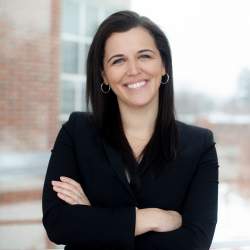
Lauren Fallon T’19
I decided to get an MBA because I knew something was fundamentally missing. I had a science background and always loved health care, but I knew my lack of a tangible business skillset would ultimately hold me back from being truly successful in my career. I worked in sales and consulting prior to Tuck, and while they were valuable experiences, it became obvious that something additional was needed. Tuck was on the top of my list because I had worked with Tuck alumni and a good friend of mine from high school was a Tuck alum. They always raved about the school and how much they enjoyed their two years there. After coming to campus and interviewing, I was sold.
The most impactful courses for me at Tuck were The CEO experience and Corporate Responsibility. Both of these courses focus on how you should evaluate difficult business decisions, while considering your role as an ethical business leader. They challenged me to think about business problems not only as an individual but as someone who is influencing an organization. Capital Markets with Professor Ing-Haw Cheng and Managerial Accounting with Professor Joseph Gerakos were also amazing, and drove home the importance of critical quantitative concepts. As someone who will be moving into financial services, these are both critical classes that were taught by two excellent professors.
The First-Year Project was a fantastic experience. My project allowed me to engage directly with a major metropolitan hospital system with the goal of developing strategy for improvement of a specific satellite office. The client received tangible results from the project and it helped them address a true real world issue. I was able to work with a team of interesting individuals from my class that prior to the project I did not know well and all of whom were very interested in health care. Our adviser was Professor Joe Hall, whose expertise in operations is unmatched. The project, team and adviser all combined to make the First Year Project an amazing experience.
For me, the most defining moment of my Tuck experience was going to Israel for my GIX. The theme of the GIX was startups, technology, and how Israel, a country that has been in conflict for decades, has the most tech startups in the world. I knew nothing about startups and Israel, and learning about the businesses and how they flourish was fascinating. The history of Israel is one that I was not all that familiar with, and being exposed to the Middle East was an incredible opportunity. It opened my eyes to a completely different culture, a way of doing business, and group of people, and was just an unforgettable experience.
Tuck is a place where you truly feel the community and make lifelong friends—something that I think is entirely unique to Tuck. I think most people like their business school experience, but I can say with confidence that the close-knit community is one that you will not find anywhere else. The academics, extracurriculars, and faculty are all incredible, but the student body is something that truly stands out in my mind. The diversity of background and thought, supportive nature, and driven attitude of my peers is impressive, and getting to know them has been my favorite part of this experience.
I’m headed to Harris Williams to work in technology and health care IT investment banking. I feel fundamentally changed by Tuck. This school has not only provided me with the expected skillset necessary for transitioning into a financial services role (and the opportunity to make this transition), but it has also broadened my horizons in the way I view the world. The academics have been rigorous, the clubs rewarding, and my peers fantastic. The best part of Tuck for me has been the community, and that is something I look forward to maintaining and contributing to in the future.
Finance, with a focus on health care and technology
Boston, MA
University of Massachusetts, Amherst
Johnson & Johnson; Huron Consulting Group
Center for Health Care Fellow, Tuck Admissions Ambassador, Tripod Hockey, Women in Business Club, Finance Club, Health Care Club
First-Year Project: engaging with a major metropolitan hospital system with the goal of diagnosing and developing strategy for financial and operational improvement of a specific satellite office; Tuck Community Consulting
Global Insight Expedition to Israel with Professor Adam Kleinbaum
Barclays, health care investment banking
Investing and Deal Making in Health Care; The CEO Experience
Health Care Fellows team, Admissions leadership
Harris Williams, health care IT & technology investment banking
This school has not only provided me with the expected skillset necessary for transitioning into a financial services role (and the opportunity to make this transition), but has also broadened my horizons in the way I view the world. The academics have been rigorous, the clubs rewarding, and my peers fantastic. The best part of Tuck for me has been the community, and that is something I look forward to maintaining and contributing to in the future.
Energy and Sustainability
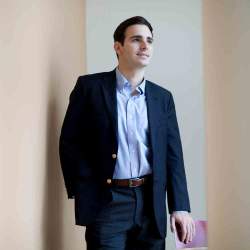
Constantine Triantafyllides T’19
I’ve always wanted to study in a small community. I am originally from Athens, Greece, but I came to the States for college and studied engineering at the University of Virginia. I loved my time there. It was the real college experience.
After graduation, I took a job in Houston working for Apache, an oil and gas company. It was an interesting time for the company. They were shifting from being a global player to a North American shale player. I felt like I wanted to be more involved in the bigger decisions that were going on at the company, but I didn’t have a finance background. I thought the timing was great for me to get back into a learning environment.
When I chose my MBA program, I wanted a lot of the same things I had in undergrad. I didn’t want a big class size. I wanted to be able to see familiar faces in the cafeteria. I wanted to live where people were invested in the community. I wanted to go to a top school and graduate with a tangible skillset in business and finance.
Energy is a topic I’m passionate about. The sector is changing so fast, and Tuck is ahead of the curve. The Revers Center for Energy, one of the reasons I chose Tuck, facilitates leading speakers and workshops. The professors and practitioners who are associated with the center have tremendous presence in the public and private sectors.
Before Tuck, I was focused on the oil and gas sector, but there’s so much else to do within energy. Tuck is a great place for me to hedge my bets. I’m getting exposure to a diverse network and different industries. I know that if, at one point in time, the oil and gas industry isn’t growing at the same rate it is today, I will have other opportunities.
One of my favorite classes has been an elective called Energy Economics which covers oil and gas, power and renewables. The class has been fascinating. Right now, we’re discussing OPEC (Organization of the Petroleum Exporting Countries) and examining the economic drivers that dictate how a cartel works. You can fill up your schedule quickly with all the great electives. The class is taught by Professor Erin Mansur, who is the Revers Professor of Business Administration and Faculty Director for the Revers Center. Mansur and all the other professors are extremely dedicated to teaching and to their students. They’re available after class. They have an open-door policy that is fantastic and makes them approachable.
I took a microeconomics class in high school, but other than that I didn’t really study business.
I’m learning the foundation in the classroom and applying that in the real world. I’m learning how to evaluate a business and what goes into a quantitative and qualitative assessment.
I’ve loved my experience at Tuck. It’s been great on a lot of levels. I am making lifelong friends. I’m continuing to develop my leadership skills. I worked in a more traditional male-dominated environment, and now I’m getting a new perspective on how different people lead. There’s diversity here, not just in ethnic background but in how people think.
At the same time, people really care about each other here and help each other out. I was mentored by a second-year student who was on the same career path as me. He did banking as well, and he has helped me navigate through the noise. I’m not even through my first year, and older folks who have graduated are making me feel like I’m part of a family.
Tuck’s alumni network has a strong presence in energy banking. This has really helped me. I reached out to a Tuck alumnus who works for an investment bank in Houston. He helped me with my internship application and gave me insight on a job market that was foreign to me. Tuck’s alumni network will open doors for you.
This summer, I’ll be interning at Morgan Stanley in investment banking. My focus will be on natural resources. If my internship goes well this summer, I’d like to go back to Morgan Stanley full time after graduation and see where that takes me. I’d love to run a company one day.
Energy, Oil & Gas
Athens, Greece
University of Virginia
Apache Corporation
Tuck Energy Club; Finance Club; ASW Career Panels; Soccer Club; Ski & Snowboarding Club
National Energy Finance Case Competition in Austin, TX
Natural Resources Investment Banking at Morgan Stanley
Energy Economics
Revers Center for Energy speaker series; Fall A and Fall B study group (encounters both academic and non-academic in nature)
Tuck has provided an incredibly motivating and immersive experience during my first year. Interacting with my fellow classmates in a fast-paced yet feedback-oriented environment while working on challenging problems inside and out of the classroom has truly been a transformative experience.
I would love to pursue a career in investment banking with a focus on energy.
Entrepreneurship
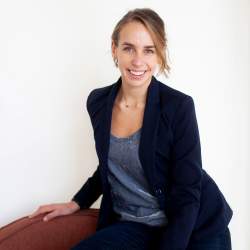
Rachel Baras T’19
I applied to law school and business school in the same year. I knew that I wanted to work on behalf of animal welfare issues, but was torn as to whether I should do so through the courts or the marketplace. After seeking advice from more people, though, I became increasingly drawn toward business: by promoting humane, affordable, and high-quality products, I could work with others to create a market that aligns consumer preferences with animal interests. Law, business, public advocacy, science, engineering, and other disciplines all play crucial roles in improving the lives of animals, humans, and the wider environment. For me and my skillset, business ultimately resonated most.
I came to Tuck intending to make a hard pivot professionally. I worked at Deloitte prior to applying to Tuck. It was a great opportunity to learn about client service, teamwork, analysis, and overall professionalism. With my choice to attend business school, I sought to leverage this platform toward a new field–but knew I would need to work hard to prove that my experience was relevant and that my commitment was strong. Tuck’s small community, remote location, and general core curriculum offered a supportive environment where I could take risks, diversify my skills, and regain some perspective after a lifetime of urban living.
The Venture Capital Fellowship with the Center for Private Equity and Venture Capital has offered a platform for pursuing my interests on campus. When I was discussing potential VC Fellowship projects with Jim Feuille, Executive Director of the CPEVC, he proposed the idea of launching an online, virtual summit focused on agriculture technology. A classmate (who is also my co-lead of the Tuck Food & Ag Club) and I have run with the idea, all with Jim’s support. The summit has enabled us to learn more about agtech, bring speakers to a wider audience, and build connections within and beyond Tuck.
My First-Year Project was with a company developing cultured meat. The FYP was a great opportunity to craft a project that complemented my professional interests. In the fall of my first year, I wrote a cold email to a company developing cultured (“lab-grown”) meat to see if a group of classmates and I could help them with a business problem they were facing. Soon enough, we were scoping an FYP that touched upon marketing research, consumer insights, regulatory conditions, and revenue models. Later on, when I was recruiting for internships, I could point to this FYP as evidence of my interest in cellular agriculture.
I interned with Modern Meadow, a company reimagining animal materials in a lab. My internship enabled me to both draw from my existing skillset and pivot into the very field I most wanted to enter after Tuck. The Center for Entrepreneurship (and, in particular, Daniella Reichstetter T’07) was valuable throughout the off-campus recruiting process. Moreover, Tuck’s remote location turned out to be fine: my interviews were largely done on video, and I could take the Dartmouth Coach down to Boston or New York when I needed to.
Tuck recognizes the importance of kindness for getting things done. For many here at Tuck, challenge and failure were prerequisites to the success we have found thus far; we can handle directness, harsh feedback, and difficult working conditions when necessary. But Tuck’s culture does not glamorize competition or aggressiveness beyond what is necessary. It is normal here to help each other with interview prep (even when we are competing for the same role), and the administration has been extremely helpful throughout my two years. I do not take this culture for granted.
Entrepreneurship
Brookline, MA
Tufts University, BA, International Relations
Senior consultant, Deloitte (Transfer Pricing)
Center for Private Equity and Venture Capital (Venture Capital fellow); Tuck Food and Agriculture Club (co-leader); Entrepreneurship Club (mentor)
Ulysses Fellow (Ulysses Holdings); sourcing and scoping an eFYP with a European lab-grown meat startup
Morocco GIX led by April Salas and Dirk Vandewalle
Strategic Finance Summer Associate at Modern Meadow
Corporate Valuation, taught by Anant Sundaram; Managerial Accounting, taught by Joseph Gerakos; Entrepreneurial Thinking, co-taught by Daniella Reichstetter and Trip Davis
Visiting the Pete & Gerry’s Organic Eggs headquarters for a factory tour led by Paul Turbeville T’14; visiting the Steinway & Sons piano factory tour in Queens, NY for a tour coordinated by Professor Joe Hall; running a half marathon in Martha’s Vineyard with six of my classmates; hiking and trail running throughout the Upper Valley.
Senior associate, Modern Meadow
I have always found fulfillment through work, even at the expense of my work-life balance. At Tuck, though, balance is thrown at me: our natural environment draws me outdoors in every season, and the small size of our community has enabled me to connect with virtually everyone in our class. I have learned so much from my peers and am grateful for the relationships formed thus far. I can point to numerous classes that have changed the way I think about business problems, but feel that I have been transformed most meaningfully in terms of my overall approach to living life.
Technology
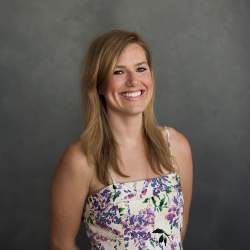
Meghan Lynch T’18
I came to Tuck with my husband, Brennen. When we met in San Francisco, we happened to be applying to business schools at the same time. We were so happy to find a program that we felt would accelerate both of our careers at the same time! Brennen had lived in Hanover twice before—as a Tiny Tuckie when his father studied here, and then when he attended Tuck’s Bridge Program during college. After we visited campus during the Women in Business Conference, it was easy for us to imagine how much we would love spending two years in Hanover. As a married couple both pursuing Tuck MBAs at the same time, it was important for us to be supported by a community where we weren’t the only people planning a dual career household.
I was attracted to Tuck’s program because I wanted to chart my own path. Because Tuck is a general management program, all elective courses are open to you after you complete the core curriculum. I loved that there were so many opportunities for experiential learning—my First-Year Project with a fintech startup confirmed my interest in early stage companies and my passion for technology to do good. My fellowship with the Center for Business, Government, and Society allowed me to learn about the responsibilities for serving on a Board of Directors by serving on the board of a local nonprofit, Positive Tracks. At Tuck, you not only belong to the MBA community, but you also belong to the greater Upper Valley community, too. I think it’s one of Tuck’s differentiating factors from other peer schools.
The network of support you’ll have is unparalleled. At Tuck, your classmates are excited to embrace who you are and who you want to be. When I first arrived on campus, I was shocked by how welcoming the T’17s were—they taught us how to be stewards of the school, so that when the T’19s arrived a year later, we were prepared to lead them. Similarly, Tuck professors are devoted from your first day on campus to helping you succeed in the classroom and beyond. Whenever I reached out to alumni for advice, they always candidly answered my questions.
Classes have application in the real world. In Design Thinking for Strategic Innovation with Alva Taylor, we learned the importance of a human-centered approach. It was incredibly helpful to practice before my summer internship with Nike Digital where I spent the majority of my time prototyping and testing new ideas for The Nike app.
I also loved Field Studies in Private Equity with Phil Ferneau D’84, T’86. The vignettes we role-played gave me insights into how my Tuck Social Venture Fund team and I should think about new deals and manage our impact portfolio.
I’ve always been a values-driven person. I did a lot of reflecting and experimenting at Tuck to figure out what would be the right role for me when I graduate. I challenged myself to find a company that aligned with my personal values and inspired me with its mission and purpose. Given my early career in tech at Apple and my role as a fellow with the Center for Digital Strategies, I strongly believe in technology’s ability to positively transform peoples’ lives. After graduation, I’ll be working for RippleWorks as a venture growth manager. They’re a technology startup that lives by Tuck’s mission to better the world of business.
Technology
Chicago, IL
Santa Clara University, BS, Commerce, Finance
Finance Development Program at Apple, Inc.; Global Finance Projects at Apple, Inc.
Tech Conference volunteer; Tuck Gives volunteer; Women in Business Week volunteer; Admitted Students Weekend volunteer; Orientation volunteer; Tuck Social Venture Fund director; Center for Digital Strategies fellow; Revers Nonprofit Board member; Center for Leadership fellow; ice hockey
Tuck Social Venture Fund (TSVF), a student-run impact investing fund; Board Member for Positive Tracks, a Hanover based nonprofit First-Year Project with PayJoy
Global Insight Expedition to Singapore and Myanmar with Professor Paul Argenti
Nike, Inc., digital product manager
The CEO Experience with former N.H. Governor John Lynch; Field Study/Private Equity & Growth with Professor Phil Ferneau D’84, T’96; Negotiations with Professor Daniel Feiler; Design Thinking with Professor Alva Taylor; Analysis for General Managers with Professor Paul Argenti
Daniella Reichstetter T’07 and Curt Welling D’71, T’77 who lead the TSVF; the entire T’18 TSVF team; Patrick Wheeler with the Center for Digital Strategies
RippleWorks, Inc.
Financial Services
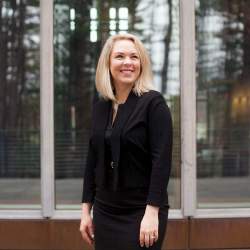
Vedrana Greatorex T’18
Business was the language I grew up with. My mom was a banker, and my dad was a business manager for several different companies. I was born into a white-collar family in Croatia, but when I moved to the U.S. alone, I found that I had to reestablish myself.
As an immigrant, it took me a while to learn how different institutions worked and how to best position myself for an exciting future. While completing my undergraduate degree, I worked in southern Vermont as a nuclear plant operator. When they announced a shutdown, I saw it as an opportunity to get back to business, something I felt naturally good at. I traded in my hard hat and steel-toe boots for suits and high heels.
I came to Tuck for a summer visit day, and never wanted to leave. Dean Matt Slaughter talked about the importance of visionary, globally-minded leadership. He believed that you could add a lot of satisfaction and richness to your life by being a force for the good in the lives of others. His vision for Tuck students matched what I hoped my future would look like. I only had six months to prepare my application, but I went after it full force. I wanted to come to Tuck and explore all of the things I never had access to.
Now that I am here, Tuck only exceeded my expectations. It feels like I am on an exciting trajectory again. I thrive in small, personal places where I can create meaningful and deep relationships. I would always choose to live in a community where it feels like I matter, like I have a place and I’m adding something to the whole. My husband said it best when he stated that he’s never been to a place like Tuck, where everybody is so happy to be exactly where they are. In this building, there is so much energy and so much hope. There’s so much excitement for the future. The walls reverberate with an amazing hum!
My biggest fear in life is boredom. I’m a person who thrives when I can engage with many disciplines marketing, strategy, finance and operations. It is when all those pieces create a meaningful whole that I feel extremely engaged and energized. It is where I thrive. That’s why I was so incredibly excited to discover general management and rotational programs. I could explore my passion for all disciplines.
I need to have interesting problems to solve that are going to engage me intellectually. One project I have been working on as a Deanery Fellow is a review of Tuck’s MBA curriculum. The Deanery Fellows are the eyes and ears of the curriculum committee. The goal is to make sure our classes and programs are timeless and timely. My input will help make sure that students continue to learn both the fundamentals of business and what it takes to excel in today’s environment. We want to help all Tuck students develop the leadership skills they need to succeed.
Tuck has opened doors for me. I’ve been able to access a network of incredibly smart and open people. I developed my leadership skills in The CEO Experience, a second-year elective with former New Hampshire Governor Lynch. He is the embodiment of a business and civic leader who represents all the values that make Tuck great. When I look at Governor Lynch, I see a person who is able to manage a business and make tough decisions while caring for the people within the organization. He taught me that even when you have to make tough decisions, you can still be honest, transparent and fair to everybody. He is an inspiration.
As part of my investment class with Professor French, I had an opportunity to meet Bill McNabb. He is the former CEO and now Chairman of the Board of Vanguard, where I interned and will be working after I graduate this year. I went in to my internship with certain expectations, and the company exceeded all of them. Vanguard reminds me a lot of Tuck. It’s a mission-driven, ethical company that values collaboration, its people and their clients. There’s a fantastic work-life balance and a strong emphasis on the integration of wellness and family. This is important to me because I have two children, who are 7 and 3 years old.
Tuck is great for couples and families. The MBA journey can be hard on a family because one member is going to be busy and going through a tremendous growth opportunity, but Tuck does so much to keep you in lockstep with your partner. They create an inclusive environment with a lot of shared activities and family-friendly events. Tuck believes that as you grow, your partner should grow with you.
Investment Management
Zagreb, Croatia
University of Massachusetts, BBA
Entergy, Nuclear Plant Operator, Vermont Yankee Nuclear Power Station
Deanery Fellow; Leadership Fellow; MIINT; Admissions ambassador; TA, Tutor; FYPGO to Nepal; ASW volunteer; New Students Orientation planning committee, leadership group
FYPGO with the Himalayan Cataract Project in Nepal
Vanguard, Institutional Sales division
The CEO Experience with John Lynch; Managerial Accounting with Richard Sansing; Negotiations with Judith White
Meeting Bill McNabb, previous CEO and now Vanguard’s Chairman of the Board
Investment Management, Vanguard, General Management Leadership Development Program
Tuck has opened doors for me that I did not even know existed. The opportunity to be here will forever change my life and the life of my family. Tuck is a set of perfect conditions and just the right amount of pressure to turn carbon into diamonds. Same raw material, but completely altered after Tuck.
Social Enterprise
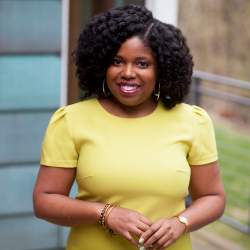
Sadé Lawrence T’18
I am passionate about people, their development, and the role they play in organizations. You can have a great business strategy, but if you don’t have the right people and the right infrastructure in place to support those people, then your strategy falls apart.
I knew coming in to Tuck that I wanted to focus on human capital. I’m someone who enjoys engaging with people from different backgrounds and parts of the world. In my professional career, I was taking on more internationally and globally focused work, and I was looking for a way to bring together all the different experiences I had. Getting an MBA gave me the opportunity to do that and to step back and dream a little bigger.
Tuck is unique because the school gives students an individualized and personalized experience. The faculty and staff are incredibly supportive. When I was choosing an MBA program, it was important for me to be in a place with strong values around community. I wanted to be at a school where people help each other out and care about getting to know you. I’ve always felt supported, even from the very beginning during my application process when I connected with senior admissions director Amy Mitson. She knew my name from day one. I am both an individual with my own goals and also a part of a community greater than myself. That’s what makes Tuck special.
Tuck has given me the opportunity to have hands-on experiences that I’ll be able to apply in my career. Toward the end of my first year, I planned the leadership development programming for the orientation program for incoming students. It gave me the opportunity to lead a team and design a unique peer-focused experience, which was incredibly valuable for me, as someone who is interested in individual and organizational development.
My goal with designing the orientation experience was to create a vulnerability that would make it easier for students to have honest conversations while working with each other. Tuckies are known for being great at working with people, and a lot of that is because of our study group experience. You can have a group that meshes incredible well, but if it doesn’t, you still have to work through it. In some of my study groups, there were moments where I wished I would have had the communication skills or courage to work through certain conversations sooner. I wanted to facilitate an environment that would support this dialogue for our first-year students. I was
able to continue this work as a Center for Leadership Fellow, where I supported first-year study groups on their transition to business school and facilitated leadership assessments.
Classes tackle real-world situations you grapple with in business. I took “Negotiations” with Daniel Feiler, who was incredibly enthusiastic and passionate about the subject. He made it fun and interesting for us. Among the many traditional elements of negotiations, we also had meaningful discussions about the challenges presented by gender and racial dynamics and how they may influence negotiations and other business interactions. The class was not only informative, but relevant and timely.
Another highlight was “Communicating with Presence” with James Rice, who’s a professor in Dartmouth’s theater department. It was phenomenal. The class was more about how to get in touch with who you are as a person, your values and how to make sense of your story and your experiences. Doing so is what allows you to be authentic. When you can deliver that to your audience, that’s the essence of presence. On a practical level, the reality is that everyone gets nervous and is afraid of making a mistake when giving a presentation, but there’s an entire toolkit that actors and actresses have been using forever that can also be used to manage a fear of public speaking.
I love to travel and working abroad is definitely a goal for me. I did my Global Insight Expedition in Vietnam. What we hear about Vietnam is still so much through the lens of the war, and I wanted a first-hand understanding of the country and its evolving relationship with the United States. Vietnam is also a bit of a paradox because it’s still a Communist country, but in many ways its economy and markets look different from what you’d expect from a Communist institution.
I knew coming out of Tuck that I wanted to work for a large global organization in an effort to continue learning about different countries and markets. I’m starting off in an HR rotation program at Ecolab, which has offices all over the world. I’ll have an opportunity to get involved in the global talent development space as the organization continues to focus on career development and leadership readiness.
Leaving Tuck, I feel solidly that you can make a positive impact on the world through business, which is increasingly becoming its own language of communication. There’s a growing involvement of business leaders in politics and social matters and possessing this language can be a powerful tool to change the world. I felt confident coming in, but now I feel even more empowered to tackle challenging problems and own my journey. During my time here, I’m proud of having developed a definition of success that is built upon my core values and unique qualities and that integrates my personal and professional passions.
Human Resources/Human Capital
Lithonia/GA/USA
Georgetown University, 2008; BS in Business Administration (Finance)
Vanguard, 2008 – 2016; General Management, Corporate Strategy, Organization Effectiveness and Change Management
Consortium for Graduate Study in Management Fellow, Center for Leadership Fellow, Black Students at Tuck Co-Chair, Teaching Assistant, Center for Business Government & Society Fellow, Class of 2019 Orientation Leadership Programming Lead, Tuck Squash Club
First-Year Project supporting the design and launch of a women’s health medical device; Personal Leadership Initiative; Allwin Community Outreach Day
Global Insight Expedition to Vietnam with Professors Curt Welling and Edward Miller; Student treks to Israel and Cuba; Prior to Tuck, several global engagement with Vanguard in Australia, Japan, and the United Kingdom
Johnson & Johnson, Experienced HR Leadership Development Program Intern
Negotiations with Daniel Feiler; Communicating with Presence with James Rice; Management Communication and Advanced Management Communication with Julie Lang and Courtney Pierson; Multichannel Route to Market with Kusum Ailawadi; and Leadership Out of the Box with Ella L. J. Bell Smith
Amy Mitson, who supported my candidacy to Tuck from the very beginning; Paul Doscher who stopped me in the hallway on the day of my interview to share words of encouragement; and Prof. Ella Bell who constantly reminds me to remember and take care of myself on the journey of professional success.
Ecolab, HR Manager, Global Talent and Organizational Development
I came to Tuck with a wide array of experiences and skills, but unsure of how they all fit and how I could harness them to have maximum impact. Tuck gave me the space to dream big, try new things, and think deeply about what I want for my life and how I want to show up in the world. I leave here more certain that I am capable of thriving in a rapidly changing and uncertain landscape, and am part of a special community committed to that goal.
Health Care
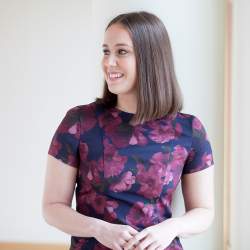
Claire Winiarski T’18
Before coming to Tuck, I spent six years in the health care industry in a variety of product manager roles. I was able to take ownership, run my own product line, and work across different functions. I was really learning a lot and was passionate about what I was doing, but I felt that if I wanted to advance in my career, I had to solidify my foundation in business.
I looked at a few different programs that had a healthcare focus and chose to pursue an MBA from Tuck and an MPH from The Dartmouth Institute. Tuck stood out to me because I figured if I’m going to go back and invest two years of my life in my education, I want a fully immersive experience. Tuck is unique in that way: you’re in a rural area, but I viewed that as an advantage. Few people have an existing network in place in Hanover, so everyone is open to making new connections.
I had high expectations coming to Tuck’s MBA program, and it’s surpassed everything I anticipated. When I came here for my interview, my partner and I spent the whole day here, and we were particularly impressed by a Q&A session with two students. They came across as smart yet humble, but most importantly authentic. Since my partner would be relocating to Hanover along with me, we wanted a place where he’d be just as involved in student life as I would. I think Tuck does the best job of that.
I took an economics class as an engineering undergrad, but that was about all the experience I had in business. There were definitely some classes that I felt more confident in, but Accounting, Corporate Finance, and Capital Markets were completely new to me. The study group setting was invaluable because Tuck does a fantastic job of balancing the mix of students’ backgrounds within each group. In one of my groups, someone had more accounting and finance experience than the rest of us, and he would coach our group and answer questions. (Thanks, Chad!)
It’s been an enriching experience to be a part of such a diverse group of people. I have learned as much from my classmates as I have from any course I was in. When we all graduate, we’ll know everyone’s faces and names—you can’t say that for other, much larger MBA programs.
The curriculum is the best of both worlds. You’re locked into the core curriculum your first year, which I think is essential. After that you are able to craft your own path and choose your classes based on gaps in your skillset or interests you knew or discovered during your first year. Professors are constantly updating the curriculum. This past winter I took a new class called Entrepreneurship and Health Care which was taught in part by a Dartmouth alum. In my second year, in addition to my MBA courses, I took MPH classes at The Dartmouth Institute. It was busier than your average MBA, but the fact that I will earn two relevant masters degrees in two years is a huge benefit. It’s not unmanageable at all.
After graduation, I’ll be working for Anthem in its newly established MBA leadership development program, rotating through key parts of the business. I don’t have any experience in the health care insurance space and although I never imagined that’s where I would land, I think it is a fantastic opportunity. There’s lots of consolidation going on in health care, and I think it is much easier to make an impact in the industry when you’re in a position to influence how services are both delivered and reimbursed. Anthem is strongly positioned to lead innovation and change the way we consume health care services in the future. I’m not only leaving Tuck with more than I anticipated, but inspired to drive positive change in the world.
Health Care
Downingtown, PA
Lehigh University, BS Bioengineering, 2010; The Dartmouth Institute, Master of Public Health, 2018
Elsevier, product manager, 2015-2016; Aesculap Implant Systems, product manager, 2012-2014; Olympus America, Olympus fellow, 2010-2012
West Central Behavioral Health Revers Board fellow; Tripod Hockey; Women in Business; Venture Capital Investment Competition 2018 Team
First Year-Project for Borealis Ventures; Revers Board fellow for West Central Behavioral Health
China Global Insight Expedition led by Professor Peter Golder
Medtronic, Peripheral Vascular Marketing, Downstream Marketing Intern
The CEO Experience, taught by former New Hampshire Governor John Lynch; Advanced Management Communications, co-taught by Professors Courtney Hurley Pierson T’01 and Julie Lang T’93; Field Studies in Private Equity and Venture Capital, taught by Professor Philip Freneau D’84, T’96
Anthem Leadership Development Program
I came to Tuck expecting to fill gaps in my existing skillset to solidify my foundation in business, but I’m walking away with more than I could have anticipated. Tuck has given me an opportunity to contribute to and draw upon the strength of a community filled with diverse perspectives, paths, and experiences—a community that has challenged me to elevate my critical thinking, hone my leadership style, and pursue ways to align economic success with social good. I’m honored to call myself a Tuckie and be associated with the smart, thoughtful people that make this place uniquely special. I’m not only walking away with more than I anticipated, but inspired to drive positive change in the world.
Financial Services
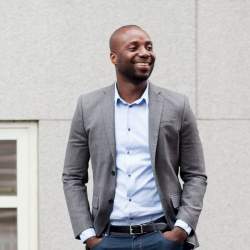
Pascal Mensah T’18
My family migrated to the States when I was 13 and settled in the Bronx. My mother worked two jobs, and so did my father. They worked really hard to bring me to the U.S., and I wanted to take advantage of the opportunity they gave me. I was really good in math, and the teachers at my high school encouraged me to think big, beyond community college. I applied to NYU Stern for my undergraduate degree in business and got in. I worked on Wall Street for a while, then took a trip back to Ghana with my mother that changed my life.
It was so eye-opening. I hadn’t been back to Ghana in 15 years, and I saw that people there were in so much need. Electricity and water supply was erratic. Global warming was taking a toll and severely affecting food supply. I wanted to do something to help, so I packed up my life and moved to Ghana for three years. I started a few businesses, one in the food industry, but I found it really tough to raise money. The government had not created a strong environment for businesses to thrive. Country infrastructure was in poor condition and interest rates were between 30 and 40 percent. Really good businesses and startups were dying because they could not raise money cheaply. That’s when I decided that I wanted to go back to business school to build my network and help businesses in Africa get access to cheap capital.
I knew when I set foot on campus that I made the right decision. Tuck has been a great blend between academia and real-world experience. In one of my GEM classes with Dean Matt Slaughter, we discussed currency risk and the issues that might arise when your costs are in one currency and your revenue in another. I was thinking, “Oh snap, this kept me up all night when I used to run my business. Where was this class when I needed it?”
Starting my business was an isolating experience because I didn’t have connections to tap into. Now my network is much larger. Here, you know everybody by name or by face. You can’t put a price on that. The community is what makes Tuck really unique. I know I can call on a professor or a fellow student for guidance at anytime. As someone who grew up in New York City, when I was doing my summer internship at Bank of America in New York, I found myself hanging out with other Tuckies more than my New York cohorts. When you leave Tuck, you yearn for it.
Being at Tuck has challenged me to ask the right questions. I loved Vijay Govindarajan’s course, Implementing Strategy. Having an idea is one thing but being able to execute it is another. Even if an idea sounds great, you still have to really challenge it to make sure it will work.
Developing a sustainable business strategy is a daunting task for many businesses in the face of fierce competition and theft of intellectual property but implementing that strategy once it has been developed is a whole different ballgame, which in itself can be extremely difficult. Professor Vijay truly challenged us to go against conventional wisdom to find creative solutions to help solve these problems. Yes, businesses should think about their bottom line, but they should think about their people, too. There can be a business solution that addresses both.
Whatever you are passionate about and want to do, it’s here for you to take on. I helped plan the first Global Insight Expedition to Ghana for 26 students. One of my goals is to recruit more students from the continent to be here. I’m helping implement a strategy so that Tuck can have a dedicated recruiting presence in Africa. I’d like to see the youngest and brightest minds come from the continent to become part of the Tuck cohort.
I’ll be leaving Tuck with what it takes to be an entrepreneur. After graduation, I’ll be working for Bank of America in investment banking. This is the gateway to my ultimate goal, which is to go back to Africa and get a startup going. Access to cheap capital is an essential key to economic growth in Africa, and I hope to start a fund that will help small businesses raise money on a seed level and link them to investors so they can scale their business. That’s my true calling.
Investment Banking
Kumasi, Ghana
NYU Stern School of Business, BS
Entrepreneur/self-employed running a food distribution business focusing on Sub-Saharan Africa
Co-chair, Tuck Africa Club; co-chair, BSAT (Black Students at Tuck); co-chair, Diversity Conference; OPS leader, helped spearhead the Ghana Global Insight Expedition (GIX); Finance Club
First-Year Project with JM HUBER, Atlanta to help develop a quantifiable metric around sustainability to incorporate into their business decision-making
China GIX, 2017; OPS leader, Ghana GIX; traveled extensively through Europe, East Asia and Africa
Investment banking summer associate, Consumer & Retail Group, Bank of America
Implementing Strategy with Vijay Govindarajan; Sustainable Business with Andy King
Watching the race forum for the 2016 U.S senate seat for New Hampshire between then Governor Maggie Hassan and then Senator Kelly Ayotte. It was a surreal experience watching both women speak about issues concerning New Hampshire and America as a whole while I sat less than six feet away.
Associate Investment Banker, Consumer and Retail Group, Bank of America
Tuck provides a wonderful blend of academia and real-world experience—it also teaches you about yourself. I didn’t understand what self-awareness was until I came to Tuck, and the last place I thought I’d learn about myself was in business school. This experience has been truly transformational because I know myself much better now—both my strengths and weakness.
Energy and Sustainability
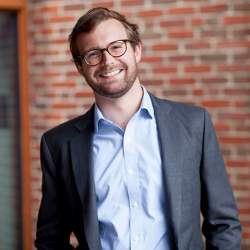
Mathew O’Sullivan T’19
Business school is an opportunity to strengthen my finance skillset and expand my knowledge of infrastructure investments beyond frontier markets. I was an English and politics major at Washington & Lee University, and shortly after graduation I found myself working at a Mongolian bank—with no finance experience whatsoever. I taught myself some rudimentary modeling, and after spending over a year in Mongolia I continued to pursue my interest in infrastructure finance by joining CrossBoundary, a frontier markets investment firm with offices across Africa and in Washington, DC. I learned a lot at CrossBoundary. And I discovered that if I wanted to have a deeper understanding of the transactions I was advising on, I needed an MBA.
Even before applying, I was overwhelmed by the warmth and enthusiasm of the Tuck community. The alumni I spoke with were eager to offer advice, share their Tuck memories, and guide me through the application process. I wasn’t even a Tuckie yet, but if that was the experience I was getting just as I applied, it was easy to understand how powerful the network becomes once you’re actually in it.
Tuck’s location and size are central to that sense of community. I’ve engaged with my classmates and gotten to know them better than I would have in a larger environment. Our class has so many shared experiences that bind us together—between navigating the core curriculum, escaping out to the Dartmouth cabins, recruiting, and playing late-night hockey. Those constant touchpoints—particularly in Tuck’s consciously reflective environment in the Upper Valley—engender trust, allow for honest feedback, and provide opportunities to learn from one another and grow together.
When I arrived at Tuck, I didn’t know what path I wanted to pursue. All I knew was that I wanted to build my knowledge of infrastructure finance, but I wasn’t sure if that would be through banking, consulting, private equity, or asset management. I came in knowing that all of those were options and quickly decided that banking was the route I wanted to take.
It was stressful, but I honestly loved the recruiting process. I got to speak with and learn from investment bankers at almost every power & utilities group on Wall Street. And beyond that, I got to navigate the process alongside two dozen other T’19s—building friendships along the way as we shared rides to New York, supported one another through interviews, and attended company receptions. I ultimately chose Citi for my summer internship. The Tuckies who were there were incredibly supportive, introducing me to their colleagues on the Power team and helping me to secure an offer.
Having worked abroad and not knowing anything about U.S. utilities markets, the Revers Center for Energy was instrumental in enhancing my understanding of the U.S. power sector. I attended workshops on electricity wholesale markets, met energy investors and utilities executives visiting campus, and ultimately was better prepared to discuss the industry. One of my favorite courses, Corporate Valuation, is getting me ready for the job itself. It combines the accounting and corporate finance courses I took during the core curriculum—bringing them together in a workable, applicable way that will allow me to hit the ground running at Citi. I’m working through a valuations and models to formalize my understanding of finance, which is exactly what I wanted to do when I came to Tuck.
What I’m learning, I’m putting into practice. In 2017, Hanover committed to achieving 100 percent dependence on renewable energy for electricity by 2030. Under a project facilitated by the Revers Center, another classmate and I are working with the town to assess several potential sites for a community solar installation that would help the Town reach that goal. I’m also advancing my knowledge of renewable energy through my First-Year Project: our team is analyzing wholesale electricity prices and building forward curves for a leading solar developer.
I’ve also been able to do side projects and explore ideas I’m interested in. Two of my classmates and I submitted an infrastructure fund concept to the Kellogg-Morgan Stanley Sustainable Investing Challenge. Our proposal was for a series of community-based investment vehicles, which would raise and invest local capital into small-scale infrastructure Public-Private Partnerships—ultimately bundling these into asset-backed securities that would be attractive to secondary investors. In the process of developing our concept, we spoke with Tuckies working in public finance, directors of municipal infrastructure offices, and private equity investors.
We were selected as finalists, and Morgan Stanley flew us to London to present our concept. Although we didn’t win, the learning process from developing the proposal, the chance to present to leading impact investors in London, and the fun we had as a team all made it one of the most memorable experiences from my first year at Tuck.
Finance, with a focus on energy and infrastructure
Dallas, TX
Washington & Lee University
CrossBoundary, a frontier markets investment firm; Princeton in Asia Fellow at XacBank, a Mongolian financial institution
Revers Center for Energy Fellow; Center for Business, Government & Society Fellow
Revers Center for Energy: working with the Town of Hanover to assess opportunities for community solar. First-Year Project: working with Cypress Creek Renewables to examine trends affecting wholesale electricity prices.
I lived in Mongolia between 2012 and 2013. After joining CrossBoundary, I worked across Africa and in Haiti. At Tuck, I participated in the Ghana GIX. In addition, a classmate and I traveled to London to present at the Kellogg-Morgan Stanley Sustainable Investing Challenge.
Citigroup, Power & Utilities investment banking
Corporate Valuation. It ties together and builds on core classes including Corporate Finance; Financial Measurement, Analysis, & Reporting; and Capital Markets.
I came to Tuck with a clear career goal: I want to build better cities through infrastructure finance. But in my time on campus, I haven’t just become a more qualified professional—I’ve grown as a person. Tuck’s community of trust, its intense learning environment, and its emphasis on reflection all made that possible.
Health Care
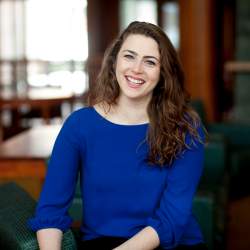
Julia Rosenbaum T’18
I pursued both an MBA from Tuck and a master’s in public administration (MPA) at the Harvard Kennedy School. With a dual degree, I not only got the policy and the nonprofit perspective that comes with an MPA, but I also gained business and management skills with an MBA. Prior to Tuck, I was happily working in the nonprofit space, but I knew I wanted to go back to school to further develop my leadership skills and feel comfortable taking on more projects and leading teams.
I think the private sector has immense resources to help solve some of the world's most pressing problems. One of my goals is to figure out how to leverage those resources and market-based solutions to help create a world we all want to live in. The most impact is achieved, in my opinion, when collaboration happens across the private and public sectors, so having the opportunity to speak both languages through the dual-degree program is a huge value-add for what I'd like to do next.
I feel really fortunate to have been so involved with the Center for Business, Government & Society. One of my favorite parts of my Tuck experience was serving as a fellow with the CBGS. The fellows meet weekly to discuss and debate topics ranging from CEO activism to income equality and tax policy—it's been wonderful to work with people who are also interested in the intersection of business, government, and society. I also enjoyed working on a Tuck Community Consulting project where I got to advise a local nonprofit on their strategic plan and vision.
One of my favorite parts about Tuck is that it fosters an environment that makes you feel comfortable taking risks and pushing yourself outside your comfort zone. That's where I feel real learning happens. I took on an entrepreneurial FYP because it's outside anything I've ever done. I wanted to know what it's like to not just be told what to do, but own the creative process as well. I think real leadership isn't just following the protocol but trying to create your own., I think there's a really important skillset you gain from thinking about where the need really is and how you can thoughtfully meet it in a creative way that's not already being done.
Though I came to Tuck with a more nontraditional background, I found myself surprisingly comfortable in the finance and accounting classes. I think that's a testament to professors being so accessible and classmates being so supportive in helping to talk through issues. What I've really enjoyed is being surrounded by people who are equally as committed to learning the material. Being a truly curious person, I'm here to learn, and I'm surrounded by similarly motivated people who constantly push me to think in new ways.
I think what's so remarkable about Tuck is that you're paying it forward in small ways all the time. I've been so humbled by the fact that any Tuck alum I reach out to responds immediately, and so I've tried to pay it forward as well. Whether it’s letting someone borrow notes when they miss class, taking that extra time to talk about the job search process, or answering responses to prospective Tuckies whenever they reach out—it’s all part of Tuck’s ethos of paying it forward.
At Tuck, I’ve gained confidence in my ability to interpret data and make decisions off of imperfect information, from a more quantitative perspective. Then, on the interpersonal level, having had the opportunity to work with a diverse range of backgrounds and a diverse range of interests and working together on complex problems—I feel comfortable speaking my mind and leading teams in a way I didn't before coming to school.
I am leaving Tuck as a more confident leader who is ready to continue pushing myself outside my comfort zone and take on whatever comes next. I'm leaving with a foundation that will help propel my learning moving forward. I don’t think I’ll ever stop learning—the tools Tuck has given me will allow me to continue to grow and learn even though I'll no longer be formally in the classroom.
Nonprofit, health-care consulting, and city government
Churchville, PA
University of Pennsylvania, BA, Psychology and Hispanic Studies; Harvard Kennedy School of Government, MPA (Dual Degree)
Clinton Global Initiative, 2012-2015; Advisory Board Company, 2010-2012
Forté Fellow; Tuck Community Consulting; MBA Impact Investing Network; Center for Business Government and Society Fellow; Co-chair of Business and Politics Club; Tripod Hockey
Entrepreneurial First-Year Project: supported the redesign and launch of a women’s health medical device; MIINT: created an impact investment pitch by sourcing and conducting diligence on a socially driven business solution; Tuck Community Consulting: provided consultative services to develop mission and value proposition for a local nonprofit.
Bloomberg Harvard City Leadership Initiative, Inaugural Fellow; Mayor’s Office of Philadelphia
Business & Society, Entrepreneurial Thinking, Corporate Social Responsibility
I came to Tuck to develop my analytical, management, and strategy skills. Beyond better understanding the magical powers of Excel, I am walking away with a confidence in my ability to lead and manage diverse teams around complex problems.
I plan to leverage the practical and analytic skills I’ve developed here with the policy and leadership skills I’ve developed at the Harvard Kennedy School to find solutions to our world’s most intractable problems by bringing together the best of the private, public, and non-profit sectors.
Financial Services
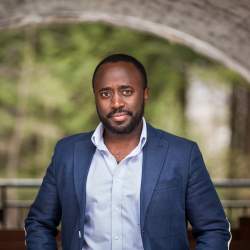
Muyambi Muyambi T’18
I really came to Tuck for the education. Prior to Tuck, I was an engineer, but I didn’t know much about finance or business strategy. I wanted to gain experience in those areas so I took as many finance courses as I could. Studying finance isn’t necessarily about wanting to earn more money. For me, I wanted to ensure that, when I join a company, I understand every facet of it.
I also knew being in business school would give me the time I needed to think about what more I could be doing for the organization I founded, Bicycles Against Poverty. People are now pushing businesses to do right by their communities in addition to doing well financially. Coming to Tuck, I already had the social knowledge and experience, but I didn’t have the finance experience to be able to merge those two things together and be effective.
The finance industry has a lot of impact in this world. I don’t see why we can’t have more people within the industry who are mission- and socially-driven—people who will really help move the tide.
I started Bicycles Against Poverty as a freshman at Bucknell University. I came into college with a desire to empower people in Uganda, my home country. I knew the only way to do that was to find something not only impactful, but that also empowered people. Bicycles really aligned with my life experiences—what I’d seen but also gone through—in Uganda. I grew up in a rural area that didn’t have any transportation. That meant you walked everywhere. Cars were very uncommon which made transportation difficult—whether you were going to the hospital, school, the market. I saw that the people who had bikes led slightly easier lives.
In light of empowerment, Bicycles Against Poverty finances bicycles for lower-income entrepreneurs. That entails raising money here in the U.S. and then buying bicycles in Uganda. We identify communities that need bikes and are also able to use them effectively to generate more income so they can pay back the bikes. The bike costs about 100 dollars, and people have about 8 – 12 months to pay back the bike once we give it to them. People who otherwise would not be able to take their sick children to hospitals are now able to take them—we’re helping to facilitate access to drugs and care. We’ve also seen people who were able to increase their income after receiving a bike. It facilitates every facet of life.
At Tuck, I’ve really been able to focus on strategy for my organization. Every class at Tuck helps me tell the message of our organization better and better. Professor Paul Argenti, for example, talked a lot about core competency and identifying what you’re really good at. It made me think, Are we really good at distributing bikes? Or are we better at financing bikes? That message really resonated with what we were trying to do and reinforced when we were taking the right approach.
My interaction with the Center for Business, Government & Society has also been really helpful in introducing me to people who have a background or interest in social ventures and entrepreneurship and can share insights on how to grow.
I engaged in a conversation with Professor Leslie Robinson about doing a long bike ride from Boston to Hanover months before I even arrived at Tuck. A bunch of people from Tuck came out to support us on the ride. It was such a cool experience. Sometimes you have a fantasy view of a place and you’re not sure if it’s going to live up to your expectations. So it was refreshing and amazing to have an experience like that a few days before even having class together. It’s also made our class time together better, because it’s easier for her to relate to me in class, but also easier for me to have a connection with a professor. It just makes everything simpler. And we’re still in contact all the time. I had a Thanksgiving dinner at her home. She’s my accounting professor so I’m constantly at her door, asking her questions.
I did a First-Year Project with PERI, an industrial company in Germany. We spent a weekend in Germany with our client—the head of the company is actually a Tuck alumnus. Having hands-on experience and getting to interact with the client is always a great opportunity. And beyond that, I got to know my classmates better and what they were able to bring to a team. Every time you’re with people who are really good at what they do, they just bring up the level of the group. They give you something to aspire to, and they’re people you can learn from.
That’s one of the great things about Tuck: if you want to learn about something, you can bring people together to learn. They just teach you.
Finance
Rukungiri, Uganda
Bucknell University, dual degree, civil engineering & economics
Clark Construction, engineer
Tuck Social Venture Fund (TSVF); Tuck Africa Club; Orientation; Investment Club; Finance Club; ACE; Tripod Hockey
PeepTrade Case Competition; First-Year Project (FYP) with PERI industrials
FYPGO in Germany with PERI industrials
UBS Asset Management, analyst, Chicago
Riding from Boston to Hanover with Professor Leslie Robinson. It was a one-of-a-kind experience that I hope to keep replicating whenever I can.
Tax, Business, and Strategy; Structuring Mergers & Acquisitions
Professor Leslie Robinson
I came to Tuck eager to learn everything I could about the finance industry. I’ve had great opportunities to do that, outside and inside the classroom. Every finance and accounting class I have taken has served to put my interests in perspective. By the end of my time at Tuck, I will be a well-balanced engineer, economist, and wise business leader.
Energy and Sustainability
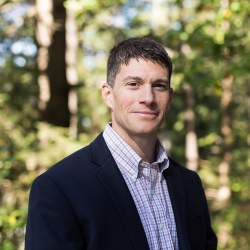
Josh Hotvet T’18
I came to Tuck from the military, the United States Marine Corps, where I spent my entire adult life. I learned so many important skills and I loved every second of my time in the Marine Corps. But I didn’t get the hard business and quantitative skills I needed. I wanted to be able to bolster the experiences I had in the military, which were very heavy in leadership and analytical problem solving, with the hard quantitative skills—finance, accounting, marketing—that an MBA offers. I also wanted the time and space to explore the renewable industry, which has always interested me. Coming to a full-time MBA program like Tuck gave me the opportunity to fully explore the industry and to gain a very solid foundation of business knowledge and experience. I came to Tuck with zero experience in energy.
The Tuck community shares a whole lot of values with the military community. One of the main reasons why Tuck was my number one choice for getting my MBA was because of its community values. It’s collaborative. It’s team-based. It’s honest. Everyone acts with integrity here. We all respect each other. Don’t get me wrong—we’re highly competitive, purpose-driven people, but at the same time, we acknowledge that there’s a community, and that there’s more than just ourselves in the world. We try to actively support that community and make it better—just like the military. There’s a fundamental alignment in values. And now, I’m going to be able to go out and make a difference in the world sooner than if I had gone straight into industry from the Marine Corps.
Tuck has exceeded all my expectations, not just when it comes to hard business skills, but also giving me the space to explore my targeted industry and how I fit in."
I knew I wanted to go into the renewable energy industry. But I didn’t have any clue what role I would play, what function I would be in, or what kind of company I wanted to be in. My job in the Marine Corps was always very mission driven. It was a mission I was passionate about and could get behind 100 percent. I would wake up every morning, go into work, and be excited to be there. And at the end of the day, I felt fulfilled in what I was doing. I think I’m the kind of person who needs that in all aspects of my life. So leaving the Marine Corps, I wanted to transition into something that I could be equally passionate about. I have a deep-rooted passion for land and water conservation. Renewable energy is one of the best ways we can help conserve our lands and water. I think climate change is perhaps the most important issue of our time, and renewable energy is a powerful tool to combat it. In addition to all the idealistic reasons, renewable energy is a great business to be in right now.
Since coming to Tuck, I’ve tied myself with all things energy. I’ve worked closely with the Revers Center for Energy. I’m co-chair of the Energy Club. I’ve attended energy conferences, such as the Global Energy Forum in Beaver Creek, CO. I’ve gone on career treks sponsored by the Revers Center where I’ve visited everything from large businesses like Pacific Gas and Electric, to tiny startups and companies like Green Mountain Power Energy. Experiential learning sponsored by the Revers Center facilitated my personal path towards not only gaining the right business skills, but the energy knowledge I needed to succeed in a career in energy. Last year, in addition to the core curriculum, I did an independent study with two of my classmates sponsored by Revers. We worked with a private equity firm that invests solely in renewable energy. We created a greenhouse gas emissions offset impact report for their investors. It gave me a good look behind the curtain. The Revers Center for Energy also facilitated my First-Year Project. I teamed up with a couple of classmates and we sourced our own FYP with AMBRI, a utility scale battery storage company based in Cambridge, MA. That experience helped me build confidence going into my internship with Cypress Creek Renewables. I was staffed on a battery storage project right away. And I felt very comfortable to be able to go in and talk the talk—I dove right in.
Before I came to Tuck, I had never even put an equal sign into an Excel spreadsheet. In college, I never took any finance or accounting courses. Through the military, I developed a very strong foundation in analytical problem solving. But it wasn’t quantitative. So my learning curve coming into Tuck was pretty steep. Just about everything at Tuck is team-based. The school is built on this close-knit collaborative community, and that extends into its academics. I felt compelled to make sure I was pulling my weight for my team. I learned as much from my study group as I did from the courses themselves. One of the things that makes Tuck most distinctive is the access we have to faculty and staff—and I think that’s not always obvious to prospective students. For example, accounting was a challenge for me. My accounting professor Dirk Black spent a significant amount of time away from his family to help me after hours. I struggled on the midterm, and then I did well above average on the final, and I owe that to the work he put in personally for me.
Energy
Albany, NY
State University of New York at Oswego, BA, economics, 2004
United States Marine Corps
Fellow at the Revers Center for Energy, Co-chair Tuck Energy Club
Independent Study Project with New Energy Capital; First-Year Project with a utility-scale battery technology startup
Argentina GIX; Prior to Tuck, I worked all over Asia and the Pacific with the Marine Corps
Cypress Creek Renewables, a utility-scale solar and storage developer
April Salas, executive director of the Revers Center for Energy, has been fundamental to my professional development in the energy industry. Being introduced to the leadership of New Energy Capital, a private equity firm that invests solely in renewable energy, was also essential to my transition from the Marine Corps to energy.
Energy Economics
Dean Matthew J. Slaughter
I arrived at Tuck with a passion for renewable energy, but zero knowledge or experience in the industry. Tuck facilitated my professional development by sending me to industry workshops, energy conferences, the Global Energy Forum (!), and allowed me to complete two experiential projects in energy during my first year. I went on industry treks to San Francisco and Vermont, met with executives from two energy companies in Argentina, and was given access to CEOs, board members, managing directors, and policy-makers throughout the United States. My internship at Cypress Creek Renewables exposed me to energy project development and project finance in the solar and storage space. As a fellow in the Revers Center for Energy, I will spend my second year at Tuck completing a center project in renewable energy and helping others along their energy career pathways.
Entrepreneurship

Ed Warren T’17
I served in the military for five years, which was a fantastic leadership experience. After the military, I went directly into the private sector and worked for a startup in Boston. It was a great experience, but I discovered that there were certain things I didn't know, and if I was going to be an executive at a company, or make strategic-level decisions, I needed to further understand the fundamentals of business. That’s why I came to Tuck. I came to business school truly for the school. I wanted to be more business savvy if I was going to run and grow businesses.
It's such an amazing program, to be able to go to Tuck and get a business school perspective and then go to Kennedy and get a public policy perspective. They're very different places, and the student bodies have very different norms and goals. Spanning those two worlds is fascinating, and I found when I came to Kennedy that those who were doing the dual-degree between the MBA and MPA had a really great reputation as people who looked at issues holistically and analytically.
I got to live in a place where people tend to focus on idealism exclusively, and then come to Tuck where people focus on the pragmatic reality of growing and scaling a business. Having both those skill sets I think is incredibly important to leading wisely.
One of the major goals I had at Tuck was to understand how technology is changing labor markets and how to run a company that still employs people well and helps the economy grow in a sustainable way.
I interned with Amazon Robotics which is automating jobs that people do in Amazon warehouses, because labor is one of its biggest concerns. I think the proper way to solve the labor problem is not to stifle innovation. We can't tell companies to stop innovating to find more efficient ways of doing things. But, if we're going to unleash our private sector to do whatever it takes to drive down labor costs, we need a social contract that protects those who are losing their jobs.
It was fascinating to get an inside look at Amazon and then go back to Tuck to start a company (Zippity) that is labor intensive—there is no machine that can clean a car or do an oil change at this point in time. That means you need to hire people and try to create a company with national scale ambitions that requires boots on the ground. My operation is attacking the same issue that I saw at Amazon Robotics, but with the opposite approach.
Starting a business was a much more accelerated version of that goal than I expected. I've always been entrepreneurial, but if you told me I would be running an organization by the time I graduated from Tuck, I wouldn't have believed you. All those long-term goals have gotten condensed into my two years at Tuck, and it has been a huge challenge to try to both learn and practice simultaneously.
Russ (Walker T’17) and I wanted to start a company because we're both hungry entrepreneurs—the idea of being able to disrupt an industry with a service that provides a better customer experience on a national scale is exciting. Because we created a startup while at Tuck, we were able to take advantage of several resources on campus, including meeting with professors one-on-one to discuss fundraising implications. Our operations courses were helpful in understanding how we could increase the unit economics and the profitability of the trailer.
This blending of academia with the reality of our business allowed us to take a lesson learned, test it on our company, learn from it, and go back to our professors for advice and support. That experience expanded our horizons and gave us pragmatic tools to make it happen. Normally when you're starting a business, you're alone, but it never felt that way at Tuck. We had resources at our fingertips the whole time.
Military, cleantech, entrepreneurship
West Lebanon, NH
Tufts University, BA, political science, 2008; Harvard Kennedy School of Government, 2017
U.S. Air Force; Digital Lumens, manager of customer service and engineering support, Boston, MA
Creating my own car-care startup, Zippity; Building a cabin with huge help from my classmates in Bethlehem, NH. I broke ground on a cabin right before coming to Tuck. My classmates came nearly every weekend throughout Fall A and B to help build the cabin from the ground up.
Global Insight Expedition to Turkey and Israel
Amazon Robotics, program management and planning, North Reading, MA
Meeting my Zippity co-founder, Russ Walker T’17; Having my Tuck classmates spend thousands of hours helping me build my cabin in NH
Managerial Accounting; Global Economics for Managers (GEM); Professional Decision Modeling (PDM)
Professors Andrew Bernard, Joseph Gerakos D’90, and Joseph Hall
Zippity, a service providing car maintenance at your workplace.
My greatest passion is to create a merit-based economy in America that provides opportunity to all Americans—not just those in urban enclaves. I believe rural and middle-America has been overlooked by elites, and I hope to help create a more inclusive economy. My hope is that Zippity is one small way I can help do that, and is the first step in a longer journey to improve job prospects for average Americans.
My military experience provided me with an excellent leadership foundation, but without basic business fundamentals. My subsequent private sector experience at Digital Lumens helped significantly, but I found myself stagnating without the advanced business knowledge that is necessary to be a business executive and leader. My explicit goal at Tuck was to learn the necessary skills I would need to one day lead a company.
That opportunity came sooner than I expected when my startup idea, Zippity, quickly gained momentum and grew into a viable business. Tuck was critical to Zippity’s success in two ways: it taught me the skills to found and grow a business, and it was critical to the growth and success of Zippity. If not for Tuck, I would have never been prepared to run a company capable of disrupting an industry and scaling quickly.
Financial Services
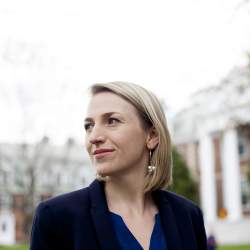
Martina Ravelli T’18
I was born and raised in Italy and lived there for 21 years before moving to Germany, which is where most of my work experience has been. I worked for Deloitte for six years which was an amazing experience. But after a while I felt that my area of expertise was too narrow and was focused in an area which I wasn’t very passionate about. I started considering an MBA so I could be better equipped to switch careers to a different type of job. I wanted to see what that would look like. I wanted to transform my leadership skills. I knew I had a solid foundation in some of the hard skills of business—finance, accounting—but working at Deloitte, I met some really amazing leaders. I saw how they were motivating their teams and empowering people. I didn’t want to leave that to serendipity. I wanted to learn, and grow, and experiment.
I chose Tuck for a few reasons. First, for the general management approach. Second, I wanted to be prepared to lead a team, a division, or a department. I wanted to see how the different pieces of a company work together to make decisions around strategy, for example. Lastly, I had a very close-knit, international community when I was in Germany, and when I moved to Boston, I really missed that and saw it in Tuck right away.
The Revers Board program involves one or two Tuck students who are non-voting members of the board of a local NGO. What we really gain from the experience is to be able to sit in board meetings and see how board members operate, which is normally an experience that you have much later in your career. It is an honor to be on the board but what is most important for me is seeing how an NGO operates—see if it gives me more meaning, see if I could get involved in that world without necessarily working for an NGO. What those organizations get from us, hopefully, is some good insight and some good questions.
Tuck offers three leadership classes in the first year, which I took, as well as second-year electives, so there’s a formalized offering around leadership. But outside of the classroom, when I had questions or faced challenges, I reached out to professors who taught my leadership classes and had one-on-one sessions with them where they gave me some really helpful insights and practical tips on tactics I could try to employ to refine my leadership style.
It was also extremely helpful to have two formalized leadership assessments, one in the first term and one in the spring term. I had an idea as to what my strengths and weaknesses were, but the assessments helped put it all into a more formalized framework that helped me categorize.
I think one of the interesting things about my FYP is how it started—it was one of those typical Tuck stories. Another classmate and I decided we would like to do something in the automotive space, but there wasn’t an FYP offering around that yet. Since we’re always free to source our own projects, we researched Tuck alumni in the automotive industry and discovered a prominent alumnus at a top automotive company. Because of his title, we were worried he would be difficult to get a hold of. But, from the moment of finding him and reaching out, it was just one hour until he responded. The very next day we met him in person because he was actually on campus.
I had heard about the Tuck alumni network and I thought, “Oh yeah, that’s cool, that’s interesting,” but I don’t think I really understood the power of it until I had that experience. It was a great start to the project, and it just got better from there. We received great feedback, he put us to work with his team, they actually gave us a highly strategic project, and we visited the company and spent an entire day up there with them. We really felt like we were part of the team. From the level of conversations we had to the feedback they gave us, we knew that this was something that mattered to them. That made it a really big and meaningful experience.
Corporate Finance / General Management / Tech
Trento, Italy
U. Catolica del Sacro Cuore, BA, Business; Fachhochschule Pforzheim, MA, Finance
Manager at Deloitte Advisory
Revers Board Fellow; McGowan Fellow; General Management Club Co-chair; 2017 Diversity Conference Co-Chair; Tuck Pride; Tripod Hockey; Teaching Assistant
Allwin Community Outreach Day, First-Year-Project with a top Fortune 500 company, Revers Board Fellowship, Personal Leadership Initiative
Lived outside of my home country for 10 years (Germany and USA); India GIX in spring 2017
Microsoft, Finance Intern
Dean Matthew Slaughter who will never pass up an opportunity to combine excellent academic content with lessons on how to think as a wise leader in each situation. I found my interactions with Dean Slaughter to always be extremely insightful. He helped push me out of my comfort zone and gave me the confidence and the implicit support I needed to try new things. I feel like every professor, in their own little way, has helped me.
If I had to pick names, the list would be too long..! From my exceptional classmates, who bring a breadth of experience and a willingness to put themselves to the test; to the administration and staff, always ready to lend a hand or a listening ear; to the faculty, who are ready to provide support and guidance in and outside of the classroom—each day I am humbled by the amazing people I am surrounded by and by the learning opportunities I am offered.
One of my goals at Tuck was to push myself out of my comfort zone and do things I never thought I would do—and my first year has provided me with countless opportunities to do so. Each day, I am striving to think outside of the box, enhance my empathy, and learn from diverse perspectives, with the goal of becoming an inspiring, respected leader of tomorrow. I will use the lessons I learned at Tuck to always strive and be an example of a wise, empathetic leader both in my professional and in my personal life.
Entrepreneurship
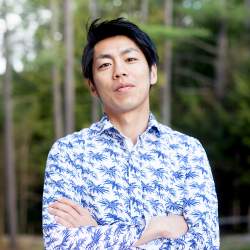
Yuki Aoyama T’17
Coming to Tuck was an opportunity to focus on my purpose and harness my passion, which has resulted in the founding of a company, Splink. Before coming to Tuck, I started thinking about a way to address neurological diseases. The idea was the result of witnessing my father discover a neurological disease that had gone undiagnosed for entirely too long. This discovery sparked a deep commitment to exploring this gap in the health care service, but it wasn’t until working at the summer internship and engaging with a peer group of aspiring entrepreneurs that I was able to construct and test hypotheses around potential solutions. After nearly a year and a half of experimentation, I am now committed and confident in my ability to address this social issue. I am now determined to ensure people lead better lives through neuroscience technology.
My internship experience at Draper Nexus has elevated my professional and personal capabilities exponentially. While at Draper, I met amazing mentors and top-notch venture capitalists in Silicon Valley who gave me great feedback on my entrepreneurial journey and personal life. I also managed to build a relationship with my co-founder, an award winning and internationally renowned neuroscientist. Without my internship experience, I wouldn’t be where I am today having celebrated the launch of Splink!
Going on the Global Insight Expedition to the Netherlands allowed me to engage with an influential global network of health-care industry practitioners. During the course, I networked with local doctors, venture capitalists, and hospital managers. I began to understand the workings of a leading international health-care market, which is the second biggest after the U.S. Now I’m able to reach out to those contacts further down the road while working on my company and I recognize some of the unique challenges and opportunities that international entrepreneurs face. I can also leverage the strengths of Japan’s market and develop innovative healthcare technology for the rest of the world.
I always envisioned success as being a CEO, but I’m leaving Tuck with a greater appreciation for the importance of connections with others and a balanced life.
Being honest, approachable and having a deeper sense of gratitude allows me to open myself up to greater connections. I no longer feel the need to hide my weaknesses. Whether in my previous career as a global business manager at Keyence, or as a boxer, I have always been a fierce competitor. At Tuck, I learned the importance of being well rounded and for me that has involved thinking about my emotional intelligence as it relates to my ability to lead others. After taking leadership courses with Professor Ella Bell for example, I’ve learned that it’s okay to be vulnerable. I now appreciate that rather than an aggressive fighter, I depend on and need to rely on others.
I have also been able to apply what I’ve learned about leadership and the importance of emotional intelligence to my personal life. Leadership starts with me being a better husband, father, son, and human—which is a shift in the way that I previously defined success. Beyond all of the tools, networks and opportunities that my Tuck experience has provided me with, I am most grateful for this shift to a more the holistic outlook on leadership and success.
Entrepreneurship
Yokohama, Japan
Keio University, BA, Law and International Politics
Keyence Corporation; Boxer
Entrepreneurship Club, co-chair; Center for Digital Strategies, fellow; Tripod Hockey
First-Year Project for developing prototype of Internet of Things device; Founding a digital health startup, Splink,
The Netherlands Global Insight Expedition “Health Care Reform: Lessons from the Netherlands and Europe” led by Professor Bob Hansen; Exchange Program at IESE in Barcelona, Spain
Draper Nexus Venture Partners, early-stage Venture Capital firm based in Silicon Valley
Fall Study Group; Spring Study Group; Outward Bound Trip; Japan FUN Trek
Entrepreneurship Innovation Strategy with Professor Ron Adner; Personal Leadership with Professor Ella Bell Smith
Ron Adner
Splink, CEO
I have become who I am, rather than who I wanted to be. Tuck has given me the courage to embrace vulnerability in my communication, my outlook, and my leadership. This has increased the gratitude I have for my life, and for my family and friends.
With a Tuck degree, I will foster professional excellence, well-being, and a happy life. It will allow me to pursue a greater sense of purpose and direction in my entrepreneurial pursuits.
Marketing
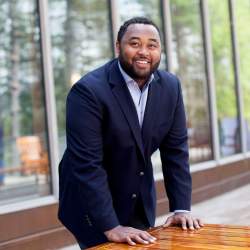
Brian Cook T’17
Before coming to Tuck, I worked in the social sector at a nonprofit called Teach for America (TFA). I served for two years as an English teacher for seventh and eighth graders and then transitioned to the management side of TFA where I focused on operations and finance and ultimately ended up on the recruitment team as a national director.
I came to Tuck for three main reasons. First, the general management focus. I knew because I was coming from the social sector and working for a nonprofit, I really had a sense of some of the levers in that world, but I wanted to learn how to manage a business. So the general management focus and the core curriculum here was really important to me—I wanted the education. Second, the community. Relationships are important to me and I didn’t want to be fighting to be recognized in a crowd of thousands of classmates among MBAs and other graduate programs. I wanted to be a part of a community that was willing to get to know my story and be willing to share their stories. Third, I wanted to attend a business school that was really going to allow me to experience the world—so the TuckGO requirement was an important part of my decision.
With the TuckGO requirement, I was able to take on many experiential learning opportunities, but I also had a blast just being able to travel with my classmates. With direction from world-renown scholars Vijay Govindarajan and Praveen Kopalle, I went on a Global Insight Expedition to India where we looked at the innovation ecosystem of large multinationals moving their R&D centers to India. I studied abroad with one of Tuck’s partner universities, IESE in Barcelona, Spain. I also had the opportunity to go to Kuwait City on an OnSite Global Consulting project with the American University of Kuwait. I got to spend three weeks on the ground in a country I had never seen before. And beyond that, I was able to add develop client interaction skills and add value by helping the client think through all the options before making a well-informed recommendation to the university.
I also traveled to several countries with classmates. During my term at IESE I visited countries all over Europe. Before the second year, I went on a fun trek led by Japanese classmates and I even got a chance to compete on the sailing team at Tuck during the MBA Regatta in Portofino, Italy against forty other MBA programs across the globe.
Global experiences are really important to me. I think this connects to how I grew up: I went to a different school every three years or so through high school. Although that was really tough, I think it helped develop a quality I’m most proud of which is the ability to be a sponge, learn from people, and soak up new cultures. It’s one of the main reasons I chose Tuck: I wanted to be in an environment where we would be focused on learning and getting to know each other.
Being able to go abroad has really allowed me to scratch the itch to explore, but it’s also helped in thinking about becoming a global leader and having a global career. After Tuck, I’m going to work for Colgate-Palmolive which is a multinational consumer-products company with 80 percent of business outside of the United States. That excites me. I didn’t know coming into Tuck how much that would matter and how excited I would be at the opportunity to work abroad—but global experiences at Tuck really shaped that desire.
I think storytelling is vital to leadership. It’s important that we’re able to not only be fluent literally in the languages we speak, but also able to listen and understand what motivates people who might be different from ourselves. The global experiences at Tuck have made me confident that I won’t land in another country thinking I have the answers, but instead I’ll be ready to ask the right questions and listen and learn.
One of the most memorable experiences I’ve had at Tuck has been being a part of Tuck Talks. A Tuck Talk is kind of like a TED Talk, but instead of presenting an idea worth sharing, people share personal stories that have impacted their worldview and sense of self. It’s an opportunity for the Tuck community to share those stories and be a bit vulnerable. Those tough stories and the things we’ve been through are what define us and give us purpose.
It’s been such an important part of my experience here because I see how storytelling connects to being an effective leader: it’s the ability to listen and glean insights from the people we work with; being be able to manage across lines of difference; and being able to inspire people in a real way. Tuck Talks has allowed me to help coach people across the Tuck community to bring their amazing stories to life.
I will miss the natural mechanisms in place that bring people who look, sound, eat, talk completely different from each other into common spaces with a desire to get to know one another. When we go back into the real world, it will be easy for so many of us to fall back into those groups that we’re most comfortable in. Being at Tuck—away from the big city—allows us to invest in building a community here. It’s a place where it’s harder to be wallflower. Tuckies opt into this culture because they want to be here. When I leave this place, I realize just how important it will be to try to create those spaces intentionally and continue to push myself out of my comfort zone.
Brand/General Management
Washington, DC
Georgetown University, AB, English & Sociology
Teach For America, Corps Member, 2010-2012; Director of Operations and Financial Compliance, 2012; National Director, Recruitment, 2012-2015
Black Students of Tuck, Co-founder/Chair; Tuck Talks, Co-chair; Center for Leadership, Fellow
First-Year Project with a family-owned hot chocolate producer
Global Insight Expedition, India; Student Trek, Japan; Sailing Team MBA Regatta, Italy; Onsite Global Consulting, Kuwait; Winter Term Abroad, IESE, Spain; Independent Study, Peru
Colgate-Palmolive, Global Marketing Rotation—Tom’s of Maine, Portland, ME
Colgate-Palmolive, Global Marketing Development Program, Global HQ, NYC
In the haze of innovation buzzwords and frameworks, Ron Adner’s work on innovation ecosystems was a breath of inspiring, intellectually rigorous fresh air.
The CEO Experience with John Lynch was the perfect classroom capstone—it reminded me that the “why” and the “how” are just as important as what an enterprise achieves in terms of financial viability.
Working as part of the leadership of Black Students at Tuck to bring attention and catalyze discourse around issues of police brutality resulting in over 300 community members wearing black on the steps of Tuck Hall; Working as part of the leadership of Tuck Talks to recruit and coach speakers to share powerful stories on the experiences and relationships that define us and bringing this tradition to alumni events; Admitted Students Weekend; Tuck Diversity Conference; Women in Business Conference; Competing with an incredibly diverse set of classmates at the 2016 Rolex MBA Regatta in Portofino, Italy was one of the most amazing opportunities to practice teamwork, but it also typified the tight-knit bonding of a random group of Tuckies that makes our culture so special.
Tuck was my dream school because I knew it would push me out of my comfort zone in many ways while providing a community invested in the iterative process of reflection and learning. As an applicant from the social sector, my Tuck journey has, among other things, been a path to greater confidence in my quantitative problem solving abilities and discerning a strong desire to pursue a global career trajectory as a general manager.
As a person with a great appreciation for the role of empathy in leadership, Tuck has provided me with a community training ground for bringing diverse groups of people together and working towards a shared vision. My experience has empowered me to bring balance to teams, to keep people (consumers, employees, communities) in mind and while I don’t know when or if I will return to the social sector, I feel empowered to find more ways to bring my personal values and professional aspirations into greater alignment.
Real Estate
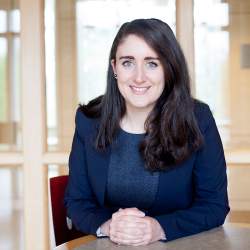
Courtney Miller T’17
Being a co-chair of Tuck Talks, where students spend tens of hours preparing a 10-minute talk to answer the question “What is a relationship or experience that fundamentally changed the way you see the world?” has been a particularly meaningful experience for me. At Tuck Talks, we operate under the assumption that everyone has a unique story to tell. These are stories you don’t necessarily hear or see on a daily basis, and we’ve been able to provide this forum where people are comfortable sharing their authentic and vulnerable viewpoints to 300 or more of their peers. Every time I sit down to talk with someone about their story, I’m both humbled and amazed by the experiences they bring with them to this institution and their willingness to share.
After this experience, I know that to harness the full potential of the people within your organization, whether they’re part of your sales force or are your CEO, you have to operate under that same assumption that every single person has a rich past—a personal history that’s filled with their life experiences and their hopes. And if we refused to acknowledge that and choose instead to see people as one-dimensional, as defined by their job, or their rank, or their class, gender, nationality, race, or some other marker of their background, we’re doing them a disservice. Our ability to develop that empathy and understanding at Tuck will directly reflect our capabilities as we move into leadership roles in the business world.
Professor John Vogel has been instrumental in guiding me in the real estate industry. I don’t think I realized when I came to Tuck how uniquely positioned we are as students to be able to benefit from the experience and intuition of the faculty here. Many of the Tuck faculty and staff, like Professor Vogel, take the time to understand the full perspective of what you’re looking for within your personal and professional life and are able to glean the experience you’ve had in the past in order to most effectively advise you on your future. I have certainly benefited from this type of authentic engagement on my path into real estate.
When I was in Afghanistan, I managed contracts that built infrastructure within Afghan National Army compounds. That experience really showed me how, if you built a shower facility for soldiers, for example, it impacted the way they viewed their lives and their environment—it had this distinct impact on their confidence and security and how they saw the world. I realized that working in real estate investment banking and wanting to be closer to the assets as I was when I was in Afghanistan would be a great opportunity to see the impact of the built environment in a city like Washington D.C.
The attitude at Tuck towards veterans is overwhelmingly positive and accommodating and generous and I sincerely appreciate that part of my experience here. I was astonished and humbled when about half of the school showed up to an event that the Veterans Club puts on called “Microbrews and the Military.” It is an evening where Dean Slaughter moderates a fireside chat with a small group of Tuck vets and opens it up for questions. My classmates asked incredibly thoughtful questions and it sparked some great conversation.
The vets club at Tuck represents every service. There’s a huge range in the amount of time served, and there are many different trajectories after Tuck. There are people who will go back to serve in their respective branch, or teach at a service academy, and of course there are an entire group of us making the jump into the private space. It makes the experience and the time we spend together even more enlightening and enjoyable, because we have so much in common in our past, but we have so much difference in the way we see our futures.
Real Estate
New York
United States Military Academy at West Point, BS
United States Army Officer
Tuck Talks Co-Chair; Crew Team Co-Captain; Co-Founder Tuck Food and Sustainable Agriculture Club; Real Estate Club; Visiting Executive Host Fellow; Armed Forces Alumni Association
Mississippi Global Insight Expedition (GIX); Social Entrepreneurship First-Year Project (FYP)
Combat deployments to Iraq and Afghanistan; the Israel/Turkey GIX
Barclays Investment Banking Division (Real Estate Group), summer associate, New York, N.Y.
Elyse Allan D’79, T’84, CEO of GE Canada; Bill McNabb D’79, CEO of Vanguard; Bashar Masri, Real Estate entrepreneur
Real Estate with Professor John Vogel; Research-to-Practice Seminar with Professor Adam Kleinbaum
Professors Daniella Reichstetter T'07 and John Vogel
Hines, associate, Washington, D.C.
I came to Tuck for the business education, and I’ve certainly found that. But it was really my peers, mentors, and role models at Tuck who have showed me that you can do good while doing well. That expression might be a bit trite, but I’ve seen first-hand people who have taken their business knowledge and their own values and personal integrity and applied them to something in the world that they feel passionate about. The outcome can benefit society and their own personal interests in ways that can have a profound impact. I’ve been both educated and inspired by this community.
Consulting

Neeti Bandodker T’17
During my undergrad, I started becoming interested in the social sector. My college was very far away from home in an underdeveloped part of the country. For the first time, I was exposed to the harsh reality of poverty in India. I got interested in the social sector and was intrigued by micro-finance—offering small loans to women entrepreneurs so they could make better lives for themselves and their families. After college, I worked for a consulting company in the social sector which I really enjoyed. But after a couple of years, I felt I was plateauing in terms of learning and growing professionally. I also realized that many of my colleagues had a business background—whether in consulting, investing, or an MBA degree—and I could see how they added a lot of value to the conversation. Their skillset was highly valued in the social sector. That planted the seed. I wanted to complement my knowledge of social issues with a business background.
My first interaction with Tuck was with a T’14, Stephanie O’Brien, who was in India for an OnSite Global Consulting project. She attended a health conference in India, and I just happened to be at the same conference. I was very impressed by her and how friendly and warm she was, and the way in which she described Tuck was alluring. I did more research and was interested in the idea of being in an immersive community away from the city, which was similar to the experience I had during my undergrad. I also knew that Tuck had a strong reputation in consulting, which was the industry I knew I wanted to head into after Tuck.
I worked with the Center for Business, Government & Society (CBGS) as a fellow. Although I already had a background in the social sector, I wanted exposure to the government and regulatory perspective. CBGS fellows are required to conduct an independent study on a topic of their interest. I worked with Professor Curt Welling and chose to focus on GMOs because I knew it was a space where there’s a lot of misconception—it’s a murky area. People don’t understand the science, but food demand globally is growing, and the only way to meet the demand is scientific innovation when it comes to how we grow our foods. Yet there is a contrasting opinion that food needs to be organic and a question of whether GMOs are bad for you. My group looked at how a business operating in that space deals with all these challenges. How do you deal with consumer demand and regulations and still do well as a company? We looked at the U.S. which has a pretty open approach to GMOs as well as Europe which has more of a “guilty until proven innocent” approach when it comes to GMOs—they’re not allowed. We looked at why the approaches are different and how global business can deal with those regulations. We learned that a lot of smaller companies that are non-GMO and offer more organic products are becoming stronger and have more political clout. They’re able to influence the market.
A highlight of my time at Tuck was organizing the 4th annual Initiative for Women Symposium. Kirstyn Lipson (T’17) and I were co-chairs and our biggest objective was to create more awareness about the event at Tuck. It’s very new, and it still suffers from a branding and recognition problem. I think we were successful in creating buzz around the event. Another objective we had was to get more men involved. This is not just a women’s issue. It’s a problem that all of us need to address and we need to think about it together. We worked with the “Manbassador Initiative,” which was launched this year, to get more men involved in the conversation. Lastly, we wanted to focus on the content of the Symposium and make it a bigger event. We had a greater number of panels and speakers and topics that appealed to a wide range of people: a panel on entrepreneurship, a panel on senior female leaders in the corporate sector, a male perspective panel. We also organized WIB Week for the first time which included various activities throughout the week to create buzz leading up to the Symposium.
I’ve achieved my goals in terms of learning and growing. The best thing about Tuck has been the community. I’ve been constantly amazed by not only how smart and passionate my classmates are, but also how grounded and helpful they are. When I first came to Tuck, I was intimidated by how accomplished they were. But throughout my time at Tuck, I have been overwhelmed by their thoughtfulness and support. Being surrounded by such peers has made me a more self-aware and empathetic person.
Consulting
Goa, India
Birla Institute of Technology & Science, Pilani; MS, Information Systems; 2011
Non-profit strategy consulting at Dasra, Mumbai, India, Portfolio Analyst, 2011-14; Portfolio Associate 2014-15
Center for Business, Government & Society Fellow; Initiative for Women Symposium Co-Chair; India Fun Trek Lead
First-Year Project with Boston Public Schools District focused on optimizing transportation network and costs; Independent study project to understand the regulatory landscape facing businesses in the GMO industry
Global Insight Expedition (GIX) to China; internships at the United Nations Headquarters, New York and INSEAD Business School, Singapore during undergraduate study
A. T. Kearney, Summer Associate, New York
Organizing the 4th Annual Initiative for Women Symposium and interacting with all the inspiring speakers; traveling across India with 45 Tuckies; small group dinners
Entrepreneurship & Innovation Strategy (Ron Adner); Real Time Global Economics (Andrew Bernard), Corporate Valuation (Anant Sundaram)
Professors Scott Neslin, Anant Sundaram, Andrew Bernard
For me, Tuck has been about the brilliant, passionate and kind people I’ve been lucky to call my classmates and friends over the past two years. It has been an incredible experience to explore, learn and grow in the company of such peers, and I leave Tuck as a more self-aware, empathetic, and confident person.
I’m passionate about the power of business to drive social impact, and hope to use my learnings from Tuck and my post-Tuck experience in consulting to return to the social sector in India in a few years.
A. T. Kearney, Associate, New York
Consulting
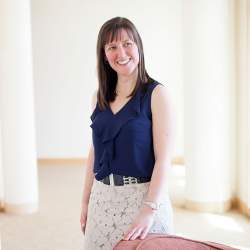
Danielle Musa T’17
The central thread in my Tuck experience is what I’d call values-driven business. I believe most people would like to “do well while doing good.” I wanted to dive deep into what that meant, understanding the many ways businesses aim to do this, and developing my own definition.
Experiential courses were a powerful way for me to explore this topic. For my first-year project, I worked with an outdoor apparel manufacturer to develop a sustainability marketing and communications strategy. They were already focused on sustainable and responsible business practices, but were unsure of how to communicate their values to customers. A key experiential course during my second year was an independent study where I wrote a case on NPR for Tuck’s core strategy class. It was a great opportunity to explore how a not-for-profit organization can sustain competitive advantage in a rapidly transforming industry.
Both of my Global Insight Expeditions (GIX) supported my goals as well. During my first-year GIX to Brazil, we studied resiliency from the perspective of business, government, and social services. We spent a lot of time discussing how to build systems that build more vibrant and resilient communities over the long run. My second-year GIX explored a similar theme, but focused domestically on the Deep South and regional economic development. It was one of the most challenging and thought-provoking experiences I’ve had at Tuck—and it was created by a fellow classmate!
Before orientation, I attended an energy career trek in the Bay Area. This trek covered a broad spectrum of careers in energy—from a small startup in project finance, to a mid-sized clean-tech company, to a large utility or power generator. I love the complexity of the industry, especially as it’s undergoing so much technological change today. Combined with the potential for social and environmental impact, this was an area that I wanted to explore in more depth, so I applied to the Revers Center for Energy as a fellow. Our new mentorship program pairs each fellow with an experienced manager or executive who has worked in the energy industry. I’m paired with Elyse Allan, CEO of GE Canada. Not only has she been a tremendous resource in thinking about my career, she is also a wonderful person. The Revers Energy Fellowship has also introduced me to other exceptional leaders in the energy industry and it has allowed me to attend an amazing set of conferences, case competitions, site visits, and workshops.
My OnSite project offered another perspective on using business to transform people’s lives and is definitely one of my top Tuck experiences. I was really drawn to this project because of its social impact focus. My client’s mission is to help people who have been out of the workforce for an extended period of time transition back in. The company originally provided employment services in the UK and Australia, and had more recently entered Asia by opening its South Korea business. My team’s project answered two questions: how to grow the South Korean market, and how to expand into Singapore. We learned so much from being on the ground in both countries and, as a result, were able to provide valuable recommendations to the client.
In addition to the excellent project experience, this project was also a great opportunity to learn about business and culture in a part of the world I’d never visited. South Korea and Singapore were such different places that it made the cultural learnings from each place even more distinct. The other element of the project that made it so special was the great team. We each brought diverse skills and we created a team culture that was high-achieving, fun, and supportive. As the team coordinator, I reflected a lot about how best I could support my team. As I look ahead, I am confident that the experience will make me a stronger global leader.
Business school offers a unique opportunity to explore and develop leadership skills. In addition to the case discussions and projects, I’ve learned so much from conversations with classmates and visiting executives, as well as reflecting on my own skills and experiences. I’m currently serving as a Dean’s Fellow on a leadership development task force. My team has interviewed top organizations to study how they develop leaders. We’re now developing recommendations to incorporate the best practices here at Tuck.
I believe the impact a business can have is directly related to leadership within the organization. In the long term, I see myself in a general management role at a company that is committed to improving people’s lives. My goal is to demonstrate how business can be responsible to its community and its shareholders.
For me, it’s always been about connecting to people and making an impact. My undergraduate degree gave me a strong set of quantitative skills that I employed as a consultant, but I realized this wasn’t enough. Pursuing my MBA has provided another set of skills—managing organizations and reaching people at scale. I’m focused on becoming the most effective leader I can be by empowering those around me and positively impacting the communities that we touch through business.
General Management/Social Impact/Energy
Neversink, NY
Cornell University, BS, Biological and Environmental Engineering, 2010
The Cadmus Group, 2010 – 2012; Environmental Resources Management, 2012 – 2015
Revers Center for Energy Fellow; Center for Business, Government & Society Fellow; Dean’s Fellow, leadership development taskforce; Tripod Hockey; Yoga & Meditation
OnSite Global Consulting; Personal Leadership Initiative; Global Insight Expeditions (GIX) to Brazil and Mississippi; Interpersonal Group Dynamics workshop; First-Year Project; Tuck Community Consulting
OnSite Global Consulting in South Korea and Singapore; Brazil GIX
EnerNOC, Boston, commercialization strategy for distributed energy resources
Tuck’s annual Business & Society Conference; getting to know so many amazing classmates, faculty, and staff
The CEO Experience (former NH governor John Lynch); Real Estate (John Vogel); Negotiations (Daniel Feiler); Corporate Valuations (Anant Sundaram); and Writing a Strategy Case Study (Giovanni Gavetti and Curt Welling)
John Vogel, for his mentorship during my OnSite Consulting Project and for developing a general management mindset in his Real Estate elective
Tuck has so much to offer, if you’re open to experiencing it. I’m constantly amazed by the accomplishments of my fellow Tuckies. And I’ve learned so much from the community—about business management, my own abilities, and other people’s perspectives. Tuck has given me the confidence and humility to be an authentic leader and to ask meaningful questions.
Associate Brand Manager, Seventh Generation
Entrepreneurship
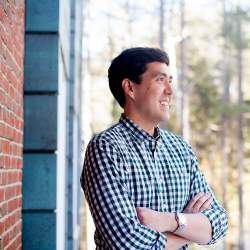
Ken Martin T’17
I realized to scale my new company, Simple Science Juices, I needed to expand my skillset. I decided to pause my investment banking career and come to a place where I had access to a broad range of resources including advisers who were experts in subject matter that I lacked experience in. I knew the finance world well, but skills like marketing, corporate communications, strategy, were greatly enhanced by my experience at Tuck.
There is a strong alumni network at both Dartmouth and Tuck in the entrepreneurship, technology, and venture capital spaces. The tight-knit community is valuable as an aspiring entrepreneur. There is tremendous access to successful individuals who are willing to go out of their way to help you—I think that’s something incredibly unique about the Tuck experience.
Tuck attracts the best and the brightest to tiny Hanover, New Hampshire, yet the small size of both the school and community lends itself to unparalleled access to executives and thought leaders.
Since Tuck is such a small school, you get to know everyone pretty quickly. But sometimes that can be a bit of a disadvantage: you spend so much time with people that you think you should know them already. And if you don’t, it can be difficult or uncomfortable to reach out. Small Group Dinners are a great way to hang out with people who you wouldn’t otherwise get to know. You learn about people on a deeper level—amazing things about them that you wouldn’t otherwise have known.
Entrepreneurship/investment banking
Dallas, TX
BSc Georgetown University; MSc London School of Economics; CFA charterholder
Barclays, vice president, TMT Investment Banking
Dartmouth Entrepreneurship Network (DEN); Tripod Hockey
First-Year Project (FYP) GO, PayPal in Paris
GE Ventures, venture capital investments in cleantech and Internet of Things (IoT)
The CEO Experience with former governor and senior lecturer John Lynch
Professor Curt Welling
My professional experience before Tuck was almost exclusively in investment banking. Tuck provided a platform to explore new but related fields such as technology, venture capital, and entrepreneurship.
Joint and Dual Degree
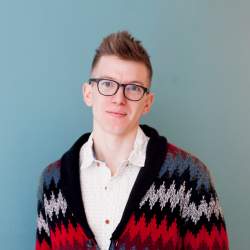
David Washer T’17
Prior to Tuck, I had done some public health casework, strengthening social safety net health care systems. Of all my casework, it was the most confusing. That was when I got a better sense of how complicated the U.S. health care system is. It made me think more about pursuing a master’s of public health degree, especially at Dartmouth which is focused on health care systems and unwarranted variation across them.
A lot of the tools used in public health, like biostatistics, epidemiology, being able to critically evaluate research papers and clinical trials—that type of toolkit is very applicable to almost anything in the social sector. I wanted to be able to dedicate academic time to developing those skills and take them back to the social sector in my work for Bridgespan.
Because I was working on a joint degree, that helped direct me toward ClearPay and health care as a place to think about a startup. I have been very fortunate that faculty in both programs have been very supportive.
I knew getting my MBA would be a great time to try launch something or explore something entrepreneurial. Tuck has a lot of great experiential learning opportunities where you can actually work on your venture for credit and have support, rather than study people who have tried to start ventures. I was looking for an opportunity where I could do some direct work.
In my Entrepreneurial Thinking course, we learned about this notion of lean canvases or creating a quick business model on a page. If an idea comes to mind, just put it down, flesh it out, and see if it has legs. I have a college friend who also wanted to start a business, so I introduced him to this canvas concept and we started sketching out ideas.
We are developing an app that helps patients avoid surprise medical bills by enabling them to search for providers or health care services on the basis of price and quality. They’ll also be able to book appointments. In the long term, the team aims to lock in the price up front and even facilitate payment.
Like many people, I’ve received a few surprise medical bills where I thought my insurance was going to cover a procedure or lab test. Health care seemed like a good place to intervene in a positive way that would benefit all players involved—patients, providers, and insurers.
I pitched the idea in my Building Entrepreneurial Ventures course in the fall with professor Steve Kahl D’91 and Daniella Reichstetter T’07. We started building out the business plan on paper, and some of the financial modeling—but the really cool thing about this class was moving beyond that. We interacted with potential customers and conducted interviews with patients, payers, and providers. All of this culminated into the pitch we delivered at the end of the term. We entered the Dartmouth pitch competition called “The Pitch” which is hosted by the Dartmouth Entrepreneurship Network and the Dartmouth Digital Arts, Leadership, & Innovation Lab (DALI). We won the People’s Choice Award out of roughly 20 participating teams and received a small grant as well as a term’s worth of tech support from DALI.
Working on ClearPay has been a huge learning experience for me, just to be exposed to the world of product development and product management. To have the opportunity to manage a team of twelve and get that type of management experience while at business school is really valuable—it’s not just classroom learning.
Nonprofit Strategy Consulting/Social Sector
Borger, TX
Yale University, BA, Religious Studies and International Studies; The Dartmouth Institute at the Geisel School of Medicine, MPH, 2017
McKinsey & Company Investment Office, MIO Partners, Junior Analyst, 2011-2013; Ford Foundation, Program Analyst, Economic Opportunity, Summer 2013; The Bridgespan Group, Senior Associate Consultant, 2013-2015
Association of Christian Tuck Students; Dartmouth Entrepreneurial Network
Founding a health care startup, ClearPay Health, and winning the People’s Choice Award at the Dartmouth Pitch; Serving on the founding team of an education social enterprise in Abidjan, Côte d’Ivoire
First-Year Project: Education social enterprise in Abidjan, Côte d’Ivoire
Save the Children, Child Health Strategy, Guyer fellow
Fall A Study Group; Travelling to Côte d’Ivoire with my FYP team; Developing the ClearPay app with my team; Leadership advice from Curt Welling T’77 who helped facilitate my internship with Save the Children
RTP: Time in the Consumer Mind with Professor Ellie Kyung; Building Entrepreneurial Ventures with Professor Steve Kahl D’91 and Executive Director of Entrepreneurship Daniella Reichstetter T’07
Developing my health care business idea with Professors Steve Kahl, Daniella Reichstetter, and Mike Zubkoff
Tuck provided me with a supportive community that encouraged me to take entrepreneurial risks. I don’t think I would have ever tried to start a business (let alone two) if I hadn’t come to Tuck. Regardless of what happens with these ventures, I will take my entrepreneurial mindset wherever I go.
I plan to use the knowledge and skills I developed at Tuck to help solve complex social problems as a consultant at The Bridgespan Group. In uncertain times, it helps to have tried and trusted analytical tools to help tackle tough challenges.
The Bridgespan Group, consultant
Financial Services
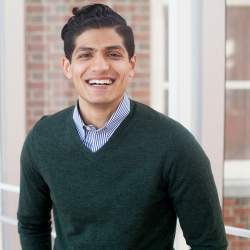
Kiz Syed T’17
At the beginning of the fall of 2016, we decided to create a diversity and inclusion representative on the Tuck student board. We began programming events and developing other initiatives to celebrate diversity and inclusion. I was really proud of this because 1. It represents the values of Tuck—of celebrating our differences and creating wise business leaders. 2. It was a complete student-led initiative. 3. It was a collaboration between the first- and second-year students.
One event students organized was a small group dinner with a great mix of people. Students were asked specific questions that got to the heart of who they are, like “What’s an event that was a critical moment in your life?” For me, that would be coming to this country from Pakistan, and then 9/11. People walked away from that dinner with a new perspective on their classmates—some walked away in tears. If you give people an opportunity to share things about themselves, they will.
If you look at people who have been successful 20 or 30 years down the road, the one thing they always have in common is incredible personal awareness and development. That’s something business school gives you, and it’s hard to get anywhere else. You’re with people from completely different cultures and countries than your own, and they all bring different perspectives. Whether you’re in a study group with different people, or in a classroom being exposed to different ideas and constructively arguing about things—that component of personal development is really hard to develop outside of a rigorous, residential two-year program where you are thrown into the fire.
You build these incredible bonds with people—they’re bonds for life. The Tuck experience is just not replicable.
What Tuck really gives you extends beyond just the fundamentals of business—it gives you leadership training. The business skills you receive form the basis for leadership development and for how to structure problems. In my past life, I was on the board of a nonprofit that worked in affordable housing. As an immigrant, it was cathartic to help others achieve what I thought was a part of the American dream: owning a home. However, with my Tuck degree, there are so many more ways in which I could have been a better board member—from the way to look at marketing campaigns to how we interacted with our community. I hope to apply the principles I have learned at Tuck to better the world of business and society.
Financial Services/Investments
Boston, MA
Boston University, BA, cum laude, international relations, 2009
U.S. Congress, 2009 – 2014; Beacon Global Strategies, 2014 – 2015
President, Class of 2017; Capital Markets TA; Co-captain, Tuck Rowing Club; Tuck Bridge Associate; Tuck Next Step Program, MBA Fellow; Smart Woman Securities Seminar Leader; Search Committee, Executive Director of Admissions
First-Year Project, Under Armour
Turkey/Israel Global Insight Expedition (GIX)
Vanguard Leadership Development Program
All the staff who keep this place running, all the faculty who make this place engaging, all the alumni who give back so much, and all the students who inspire me daily
Real Estate, Field Studies in Private Equity and Venture Capital, Financial Reporting and Statement Analysis, Ethics in Action
Professor John Vogel for showing me that you can do good for the world and for yourself
Tuck has been a transformational experience for me, professionally and personally. As someone from a non-business background, I’ve gained an incredible business skillset, industry exposure, and professional opportunities. More importantly, I’ve met some of the smartest, most creative, and kind people in my life. The bonds I’ve formed and the experiences I have gained here are ones that I will cherish for life.
Vanguard Leadership Development Program
Financial Services
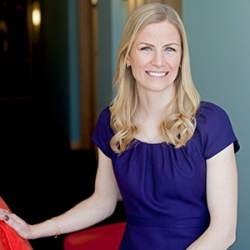
Elena Laird T’17
When I was working at Cambridge Associates prior to Tuck, I predominantly worked with family clients, many of whom were focused on private investments. As a result, I learned a lot about private equity and became interested in it. It is fairly unusual to transition directly from the limited partner side to the general partner side—from wealth management to private equity. I felt that I had many of the necessary soft skills already but needed to go back to school to round out my technical skillset. I also knew an MBA would strengthen my leadership skills and give me the opportunity to take a somewhat unusual jump in my career.
I grew up outside of a major city and consider myself a city person. But when I am in school—I went to college in Middlebury, Vt.—I like to be 100 percent focused on school and away from the distractions of the city. Hanover was an important driver of my decision to apply to Tuck. In Hanover, I am not constantly juggling family, work friends, college friends and high school friends. As a result, not only am I completely focused on my experience at Tuck, but also, I am just so much more invested in it. It sounds so cliché to say that the community is what makes Tuck, but a lot of that stems from the fact that the bonds are just stronger here—because everyone is focused 100 percent on their experience.
I am invested in recruiting the next generation of Tuckies, which is why I chose to apply for the Tuck Admissions associate program. Hands down, the most meaningful aspect of my Tuck experience has been the people. As a result, I feel passionate about sustaining Tuck’s enduring community. I have loved the opportunity to get to know prospective Tuck students, hear about why they want to come here, what about Tuck excites them, and help them through the process I was in only a year and a half ago. I still remember what it was like being in their shoes.
I think it is a no-brainer to have a global experience requirement. Tuck stresses the importance of developing global leaders—many schools do, but very few have a requirement. My Global Insight Expedition (GIX) was one of the most enjoyable and memorable parts of my first year at Tuck. I went to South Africa, where corruption is rampant, businesses face seemingly endless challenges, and the social and political landscape remains complex due to the Apartheid history. The theme of the trip was “Rescuing the Renaissance,” and it was led by Professor Phillip Stocken who organized an incredible itinerary for us while we were there.
Well evaluated private equity opportunities are important growth drivers within an investment portfolio. Despite the superior performance provided by private investments, when it comes to investing in emerging and frontier markets, risks are foremost in investors’ minds. Investors want to know if it is safe to invest. This interested me, so I evaluated the investment landscape in South Africa for my final research paper.
When you travel at Tuck, you get a different kind of travel experience. You are motivated to understand the place where you are and the drivers of the economy. It was a trip unlike any I had ever taken.
When I arrived at Tuck, a First-Year Project with the Dartmouth College Investment Office had never been pursued. A classmate and I reached out to the CIO of the Dartmouth Endowment and said “We have this great idea!” We wanted to focus on emerging market private equity opportunities, a more niche investment strategy. We asked the CIO whether it would be additive to her team if we took a deep dive on evaluating emerging market private equity opportunities from a research standpoint. The Dartmouth Investment Office was on board with our project proposal and remained fully engaged and involved throughout the process. We focused on three regions: India, Latin America, and Africa, so it was a nice segue from my GIX.
Private Equity
Cambridge, Massachusetts
Middlebury College, BA, economics, 2012
Cambridge Associates, associate investment director and management team leader, 2012-2015; LearnLaunch, accelerator associate, pre-Tuck summer internship
Tuck Private Equity Club co-chair; Tuck Admissions associate; Tripod Hockey
First Year Project with Dartmouth’s Investment Office
South Africa Global Insight Expedition with Professor Phillip Stocken
The Riverside Company, Strategic Capital Fund
Working closely with the other Tuck Private Equity Club co-chairs to plan and host the 12th annual Tuck Private Equity Conference
The CEO Experience with senior lecturer and former N.H. governor John Lynch
Professor Anant Sundaram who taught me corporate valuation
The Riverside Company, Strategic Capital Fund
Tuck has given me necessary skills and experiences—and has exposed me to new perspectives and uncomfortable challenges—all of which have fueled my desire to continue learning and equipped me with the confidence to always set high expectations for myself and my career.
Technology
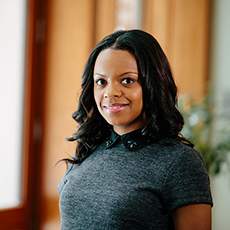
Nicole Burns T’17
THE PIVOT
I came to Tuck with a passion for social impact consulting. I wanted to see if pursuing an internship in management consulting would be the first best step for me to enter this very niche market of social impact work. I realized after going through the recruiting process that I actually had other passions. I fell in love with technology and wound up getting an internship at Google working on payments which worked really well with my background in finance.
EXPLORING A PASSION
Although I was going into tech, I found different avenues at Tuck that allowed me to explore my passion for social impact. Tuck has a strong partnership with an education reform program at Columbia Law. I spent an entire semester away at Columbia in a program called Managing Transformation and Change in K-12 Education Reform. I had the opportunity to dive deeply into the history of the U.S. education system, as well as consult for a charter school and help determine a post-secondary support model for its students. Additionally, I serve as a board fellow for a nonprofit in Hanover called Positive Tracks. I love the opportunities that Tuck has for students to really explore all of their passions—whether it’s the first thing they’re going to pursue directly out of Tuck or something they’re thinking about long term.
WORKING FOR A CAUSE
I will use my Tuck degree to stand up as a leader for change. I will work to understand how technology can provide payment solutions for people of all socio-economic backgrounds around the world and how technology can support closing education achievement gaps for U.S. minority children. Everything I do in my life, both personally and professionally, will be aligned with the causes I believe in.
Technology
Newburgh, New York
Brown University, BA, commerce, organizations, and entrepreneurship
JPMorgan Chase & Co., business operations manager, 2014; strategy associate, 2011-2014; financial analyst, 2009-2011
Admissions interview associate; Elevate Tuck Diversity Initiatives; Black Students at Tuck co-chair; Positive Tracks board fellow; Consulting Project Management teaching assistant; Consortium for Graduate Study in Management fellow
Public Sector Structural Change in K-12 Education program at Columbia Law’s Center for Public Research and Leadership; First-Year Project for Clean Marine Energy; Revers Board Fellow for Positive Tracks
South Africa Global Insight Expedition, “South African Mission: Rescuing the Renaissance,” led by Professor Phil Stocken
Google, Emerging Products, business development intern, 2016
Working closely with administrators, faculty, and students to develop equity and inclusion initiatives; Traveling to Japan with classmates; Tuck alumnae Joya Zuber T’13 and Jasmin Herrera T’16 who helped me land my summer internship
Consulting Project Management with Professor Julie Lang has been a favorite hands-on class
Nan Stone, Managing for Social Impact; Julie Lang, Consulting Project Management; Paul Argenti, Analysis for General Managers, Corporate Communications; John Marshall, Marketing in the Networked Economy
Google, Emerging Business Development, strategic partner manager
Learning from my classmates and realizing the true value of Tuck’s close-knit community has been invaluable. Tuckies believe in paying it forward. Tuckies believe that no one should be left behind, inside or outside the classroom. I have grown academically, professionally, and personally with the support of my classmates, Tuck alumni, and Tuck faculty and staff. Every day I am challenged to think bigger about what impact I hope to have in my own life. I have transformed into a leader who not only thinks about developing a strategic approach, but also about the social impact of my work and how I can contribute to causes I stand for.
Energy and Sustainability
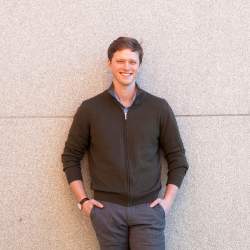
Nick Ritter T’17
Before Tuck, I worked in a very technical field: electrical engineering. Many of my managers were MBAs, and they told me the value of taking a step back for a couple years to get an eagle eye view of the industry, the many roles that exist within each industry, and have a chance to focus on what the perfect fit is for me in terms of a career. Beyond that, I wanted to be able to round out my education and develop myself as a person.
The first year at Tuck, you're put on the spot in many different ways. You're cold-called. There are high expectations for preparation for class. You have to deliver your answer in a very coherent way. Coming from a more technical, closed-space background where you're a team of scientists working on crunching numbers, it was very different for me. Trying to learn how to articulate what I was thinking was actually a big challenge for me.
Since I was going into sales at Watson, I needed to be able to craft a story on why someone should buy the product. When you’re recruiting, you’re essentially selling yourself for a whole year. Once I learned how to sell myself, I knew I could go to a company and sell a product. Additionally, in our classrooms, we’re trying to sell an idea or come up with a compelling reason why we reached a certain conclusion. That was also helpful in learning how to add some meat behind not only the story, but also the reason why someone should buy a Watson product. All of these things really helped me articulate and craft compelling stories so I could jump into the job at Watson.
Tuck has already allowed me to make a social, transformational impact during my summer internship. At IBM Watson, we helped pharmaceutical companies accelerate drug discovery, oncologists make better informed recommendations for treatment, and even uncovered previously unknown connections between patients’ diseases and potential treatment options. On the sales team, I had the opportunity to see firsthand how technology is saving lives. And this only scratches the surface of what technologies such as natural language processing and machine learning can achieve. Whether it be through sales, marketing, or product development, I plan to leverage my degree to continuously reach those who need help and discover how technology can further fulfill their needs.
Technology
Huntsville, Alabama
Brown University, BSC, electrical engineering, 2010
Nabsys, Inc., senior product engineer, 2014–2015, product engineer, 2013–2014, electrical engineer, 2010–2013; Saha Global, fellow leader, 2014, fellow, 2012
Tuck Admissions associate; Revers Center for Energy Fellow; Tripod Hockey captain
Volunteer at Dartmouth Rowing; Tuck Community Consulting; TuckGO FYP, helping a German construction services company enter the Middle East
TuckGO FYP 2016 Germany
IBM Watson Health, New York, Sales & Transformation
Louisa Roberts T’08 who helped facilitate my summer internship opportunity; Independent study with Mike Zubkoff and Jennifer Emond building on summer internship; San Francisco Energy Trek 2015
The CEO Experience, former governor and senior lecturer John Lynch
IBM Watson Health, offering manager, Cambridge, Massachusetts
Tuck has given me the opportunity to connect with and learn from so many extraordinary students and alumni. The community has been a key factor in my own career and personal development and will be a critical component for a lifetime of learning beyond the classroom.
Consulting

Sintha Rajasingham T’16
Consulting
Bethesda, Maryland
University of Pennsylvania, AB psychology
New York City Economic Development Corporation, senior project manager, strategic planning, 2011-14; LaSalle Investment Management, Chicago, Illinois, analyst, research and strategy, 2010-11
Center for Global Business and Government MBA fellow
Revers Board fellow
OnSite Global Consulting project in Addis Ababa, Ethiopia
Boston Consulting Group, New York, New York
Presidential candidates Hillary Clinton, Lindsey Graham, John Kasich, George Pataki, and Bernie Sanders
Women and Leadership with Barbara Kellerman; The CEO Experience with former N.H. Governor John Lynch; Corporate Responsibility with Paul Argenti
Tuck’s size allowed me to work with and ultimately become best friends with people who are so different from my own background. The opportunity to hear their different perspectives on various business topics influenced how I approach situations and will ultimately make me a more effective and empathetic business leader.
Boston Consulting Group, consultant
Financial Services
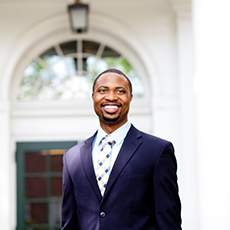
Alex Brewer T’16
I love music and have played drums since I was eleven or twelve, so when I came to Admitted Students Weekend and saw the band playing, and how supportive the Tuck community is, I knew it was for me. I played drums at the next two annual Admitted Students Weekends. It feels good knowing that I have helped show prospective students one of the many reasons that made me feel that connection to Tuck.
I was assigned to go out and have a deep conversation with a classmate, and then give a two-minute narrative to the class about that person. My background couldn’t have been more different than my partner’s so we had a lot to learn from each other. I’m not a very emotional person but when she told the class my story—my love of music and family—I felt it in my heart. Because of one assignment, a lifelong friendship had developed.
Professor Kusum Ailawadi introduced marketing principles and a framework that gave me a new way of evaluating how products are brought to market, and how to navigate and negotiate with channel partners effectively. What sets her apart is how she breaks down the complexities that can sometimes go with managing multiple evolving marketing channels so students learn to develop optimal strategies for managing the marketing channel.
General Management
Hartwell, Georgia
Fort Valley State University, BS, agricultural economics
U.S. Department of Agriculture, agricultural statistician, Athens, Georgia, 2007-14; Elbert County School System, music teacher, Elberton, Georgia., 2011-14
Tuck Center for Leadership MBA fellow; Consortium for Graduate Study in Management fellow; Tuck African Ancestry Business Association
First-Year Project at Chinle Hospital in Arizona on the economic feasibility of an orthopedic clinic for the Navajo Nation and Indian Health Services
IESE Business School exchange student, Barcelona, Spain, 2015
Land O'Lakes, marketing manager, Minneapolis, Minnesota, 2015
Prospective students during Admitted Students Weekend; Derrick Deese T’12 and other Tuck and Dartmouth graduate students; my classmates
Implementing Strategy with Professor Vijay Govindarajan
I’ve achieved a huge boost of confidence thanks to the Tuck curriculum and the overall Tuck experience. But it is also humbling to be a part of such a successful and talented group of leaders—people who want to learn as much from me as I want to learn from them.
Thomson Reuters, senior financial analyst, Minneapolis
Education
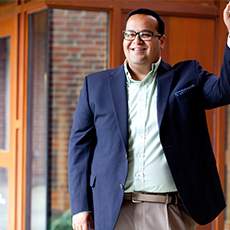
Aviran Sethi T’16
I came to Tuck interested in learning how to be a leader and a change-agent. I wanted to know how I could apply more rigorous business acumen and leadership to identify, invest in, and scale innovations to positively affect students growing up in underserved communities whose current school systems are not adequately providing for their needs. Despite the specificity, complexity, and non-traditional nature of my goals, as soon as I said this was what I wanted, everyone at Tuck went out of their way to support me on my journey.
I helped start the Tuck Social Venture Fund, led the development of panels at the Private Equity and Business & Society Conferences, and served as co-chair of the PE/VC, Education, and Golf Clubs. All of these disparate leadership opportunities helped me feel a lot more confident in who I am. Now that I'm going back into the real world, I'm fully equipped to be the change agent I wanted to be when I came here.
CHANGING A BROKEN SYSTEM
I'm the first-born son of immigrant parents who came to the U.S. to give my sisters and I better educational and economic opportunities. My middle-class upbringing, my parents' education levels, and the fact that I grew up in a safe community with strong public schools, made my understanding of the American Dream everything Hollywood and Madison Ave sold it as—a simple equation in which hard work = success. But it was my first-hand experiences through Teach For America that showed me life outcomes had a lot more to do with “birth-right” than I originally thought. Despite the constant challenges and lack of opportunities in front of them, the students I was teaching were working harder than I ever had; their work ethic and willingness to take any chance to improve their standing in life is what inspires me to make real system level change in how we support all students, regardless of demography.
General Management
Rochester, Minnesota
University of Minnesota Carlson School of Management, BS, finance & marketing, 2009
NewSchools Venture Fund, venture associate, Palo Alto, Calif. (pre-MBA internship); Accenture Strategy, senior business analyst, New York, NY, 2011 – 2014; Teach For America, corps member, high school math teacher, Charlotte, NC, 2009 – 2011
Tuck Social Venture Fund, co-founder/director; Center for Business, Government & Society, fellow; Center For Private Equity & Entrepreneurship, Maynard scholar; Venture Capital trek, co-organizer; Private Equity & Venture Capital Club, co-chair; Tuck for Education Club; Golf Club
Tuck Student Consulting Services; the United Way; First-Year Project; Tuck Social Venture Fund
Global Insight Expedition to Japan, "Through the Lens of the 2011 Tohoku Triple Disaster"
Zaya Learning Labs - Pearson Affordable Learning Fund, strategy & business development manager, New York, NY, and Mumbai, India
Deval Patrick, partner, Bain Capital Social Impact Fund and former Governor of Massachusetts; Michael Ward T'92, managing director, CFO, COO, Bain Capital; Scott Kupor, managing partner, Andreessen Horowitz; Peter Barris T'77, managing partner, New Enterprise Associates; Jeff Crowe D'78, managing partner, Norwest Venture Partners; Amy Houston T'97, managing director, Robin Hood Foundation; John Lynch, Tuck professor and former Governor of N.H.; Ken French, Tuck professor and namesake of the Fama-French Model
Entrepreneurship and Innovation Strategy, Ron Adner
More than anything, Tuck has given me the confidence to take risks and reach for my dreams.
Boston Public Schools, Broad resident: strategic projects manager
Entrepreneurship
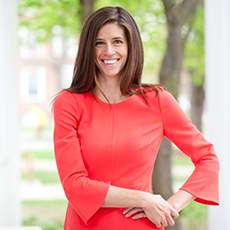
Ema Reid T’17
At Tuck everyone is present—they’re fully engaged and are genuinely there to learn and grow from one another. As overused as the term may be, Tuck is a community unlike any other. During my decision process, I truly felt that I would be supported in everything that I pursued at this school and, I was right! The student body, our professors, and the faculty really care about me and my success. I am not just a number.
Zippity is an entrepreneurial First Year Project (FYP) that provides a subscription car-care service at one’s place of work. During this FYP, I applied everything that I had learned in my first-year core courses to solve real-world-problems in a “safe” learning environment.
Because of this FYP experience, I’m starting my internship with more confidence and excitement. I’m ready to (again) put these skills to valuable use.
I knew I wanted to build my career in the technology sector, so before school started, I attended the Career Insight and Expedition trip to Silicon Valley coordinated by the Career Development Office. We interacted with a number of companies in the tech space including Facebook, Google/Nest, Pandora, and EnerNOC to name a few. It was access unlike any other.
Tuck teaches you how multi-dimensional business is done: I experienced it first-hand through my core courses which help you build on your weaknesses and expand upon your strengths. The school exposes you to a wide variety of opportunities and lets you decide what you want to focus on.
Marketing Strategy
Sarajevo, Bosnia / Louisville, Kentucky
Northwestern University, BA, 2008; Majors: Political Science and International Studies, Minor: Business Institutions
Brand Networks, account and business development director, 2011 – 2015; product manager, 2011 – 2013, Boston; DraftFCB, account executive, 2009 – 2011, Chicago; Chicago 2016 Olympic Bid, associate, 2008 – 2009, Chicago
FortéFoundation fellow; Admitted Students Weekend (ASW) co-chair; Technology Club co-chair; Tuck Admissions associate
Entrepreneurial First-Year Project founding Zippity, a subscription car-care service at one’s place of work.
South Africa Global Insight Expedition with Professor Phil Stocken
New Balance, direct-to-consumer / digital strategy MBA associate, Boston, 2016
The Tuck Admissions team while planning ASW; incredible interactions with alumni throughout the entire recruitment process
Professor Paul Argenti’s “Corporate Social Responsibility” course and Advanced Management Communications co-taught by Professors Courtney Hurley Pierson T’01 and Julie Lang T’93
Professor Felipe Severino (teaches the Corporate Finance course) who hosted a small group dinner for 20 students at his home.
Before Tuck, I frequently doubted my capabilities. This place has given me the confidence to succeed, it has molded me into a strong business leader and has put me on a path to a bright future.
What I love most about Tuck is how it makes me feel: it is my home.

Eric Giles T’16
Health Care
Gaithersburg, Maryland
Dartmouth College, MPH, 2016; Clemson University Honors College, BA, economics, and BA, political science, 2009
Teach for America, recruitment director, 2011-14, 7th grade math and science teacher, Baton Rouge, Louisiana 2009-11
Health Care Club, co-chair; Tuck Meditation Club, co-chair/founder; Tuck Builds pre-term program; Allwin Community Day speaker
Tuck Student Consulting Services with a local critical-access hospital; Entrepreneurial First-Year Project starting a telemedicine application; first place in General Electric Case Competition
Global Insight Expedition in the Netherlands focused on European health care
DaVita HealthCare Partners
Sir Malcolm Grant, chairman, National Health Service
Financial Statement Reporting & Analysis with Anup Srivastava; The CEO Experience with former N.H. Governor John Lynch
I came to Tuck to better understand my values, goals, and motivations. I am leaving with such clarity around not just my professional ambitions, but also around the type of person I want to be. It has truly been a transformational experience that has put my life on a more enriching track.
DaVita Inc.
Consulting
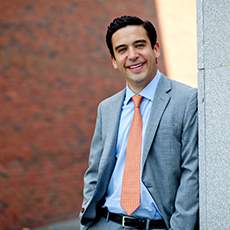
Enrique Aguilar Fernandez T’16
“When I came for my interview, I had forgotten my tie, and a student I didn't even know made the trip to my hotel room in Lebanon to give me one of his. The next day when I arrived on campus, a fellow Mexican was there to greet me and take me through the whole process. My mind was completely blown away by the way I was treated. For someone who had barely lived in the U.S. before coming to Tuck, this was nothing like how I thought about business school in America. Tuck opened my eyes to a whole new set of values that will stay with me forever.
Tuck's core curriculum completely redefined my way of picturing an MBA. Forcing you to take classes that you would not choose otherwise broadens your perspective, and allows you to explore new paths. For example, the Statistics for Managers course by Professor Scott Neslin is the best approach to general statistics that I have ever seen in my life, even with my engineering background and my studies in public administration at UPenn. In addition, Professor Giovanni Gavetti, who taught Competitive and Corporate Strategy, got rid of all the mumbo-jumbo that strategy sometimes entails, and showed us that strategy does not have to be abstract. And in my Operations Management course, Professor Joe Hall easily transmitted the job of a COO, and how it contributes to the overall strategy of a business and industry.
After spending almost three years working in management consulting at Bain & Co., I had never even heard of Professor Vijay Govindarajan's approach to strategy. But in his class, Implementing Strategy, he shifted my entire perspective on strategy, from leadership, to business model execution, to reverse innovation. We tend to see strategy as a holistic approach to operating a business, but in this course I was able to see the intricacies of implementation and the importance of aligning all relevant factors. The importance of implementing strategy—taking your thoughts to actions—was one of the most useful career concepts I developed. The class was absolutely fantastic.
It is very difficult to lead unless you speak from the heart. I learned the importance of speaking from your true self to inspire and motivate people, and to drive a business in the way you think is best.
General Management
Mexico City, Mexico
University of Pennsylvania, Master of Public Administration 2013-2015; Universidad Iberoamericana Mexico City, BS Industrial Engineering, 2005-2009
Rocket Internet GMBH (Linio.com.mx), head of customer care, Mexico City Mexico, 2013; Bain & Company Inc., senior associate consultant, Mexico City, Mexico, 2010 - 2012
Awarded John Boyer Memorial Scholarship by U.S. National Guard FTPCC; Tuck Soccer Club, co-chair; Hockey B-Team, co-chair; Tuck Talks first generation of speakers
First-Year Project: I was part of an entrepreneurial team building an app called FliQ, a start-up by one of my classmates who is also one of my best friends. He put together a diverse team to create a real pitch deck and applied the LEAN star-up model to launch the company. It was one of the best experiences because it not only helped me develop new skills, but opened my eyes to the entrepreneurship community at Dartmouth.
Goldman Sachs & Co., summer associate, investment banking, Mexico City, Mexico
One of the most memorable moments of my MBA was when Federico Minoli, former CEO of Ducati, visited our Competitive & Corporate Strategy course. His vision and practical tips on turn-arounds and management completely redefined the way I see the competitive game within business.
Tuck has taught me many things, but most importantly the sense of community and possibility. By community, I mean understanding that no matter where you are it is important to stick together and never betray your values. I intend to bring this to wherever I go and contribute in any way I can. By possibility, I mean Tuck gave me the security to trust myself and be certain that if I work hard and truly believe in what I do, I will be able to achieve something bigger than myself.
Cargill, Corporate Strategy and Development, Minneapolis, Minn.; Current: PayPal, head of SMBs Mexico
Marketing
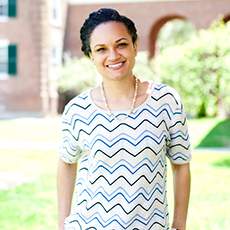
Ashley Cousins T’17
I want to go into the beauty industry, which is a non-traditional path for business school. You always hear about how great Tuck alumni are, so I wanted to test this out. I reached out to alumni at all the schools where I was accepted and I was really impressed by Tuck. I talked to an alumnus at Estée Lauder and, although he worked in a completely different field from marketing, he was more than willing to assist me in learning about the culture of Estée Lauder and if it was a fit for me. He took me to lunch, and showed me store fronts and competitors' store fronts. It was fascinating. Not many people go above and beyond in a situation where they have nothing to gain from it. He didn’t really have to do what he did, but Tuck alumni do way more than I expected, so that really sealed the deal for me.
I think the number one thing is admitting when you need help. You’d be amazed at how many people are willing to help you when you need it. At Tuck, there were times when I couldn't get my head around certain things, and then I studied with my study group. One time I was on the phone until 2 a.m. with a friend, working on problems in a class that he wasn’t even in. I had told him I was struggling and he helped me. In turn, I helped out others in the classes that I was strong in. I also learned that it is really important for you to take time for yourself—even if it’s only five or 10 minutes—and sit and do nothing to process your own thoughts. There are times where I pencil in things on my calendar where it’s just “me time.”
We had a nineties party that was so great, especially because for most of us that decade was really meaningful. I went with a few friends as the Spice Girls, and it was just a great way to bond as a class and dance and feel nostalgic.
As a first generation college student, people tried to put a lot of limits on me. I wanted to prove everyone wrong, so in high school, and at Spelman, I was practically on every page of the yearbook. At Tuck, it was the first time I realized I can't do everything, which has been a healthy learning experience. I'll be better at managing my time in a way that will serve me in my career and with a family.
Marketing
Charlottesville, Virginia
Spelman College, bachelor's degree in economics
Delta, senior account manager, 2013-15; Google, associate account manager, 2012-13, Google, account coordinator, 2011-12
Academic representative for the Tuck Student Board; Tuck Diversity Conference co-chair, co-chair, Black Students at Tuck (BSAT)
For my First-Year Project, I worked on a coffee farm located on a volcano in El Salvador with the goal of increasing profit margins. Prior to Tuck I visited 10 countries.
Estée Lauder Presidential Management Associate
Mattel, Inc., associate marketing manager
Going into the beauty industry, my optimal goal is to shift how people perceive beauty. I want to help young girls see early on how their differences are their strengths, and that beauty starts with self-love. I honestly think beauty is in the eye of the beholder, but each person has power over what that beholder sees. If you focus on who you are as a person and the best you can be, others will see you that way, too.
Technology
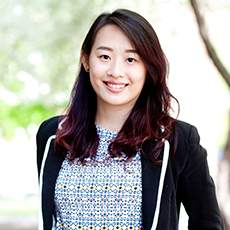
Ying Li T’16
It started because I’m a big fan of “Grey’s Anatomy” and the show’s creator, Shonda Rhimes, went to Dartmouth, so when I was looking for grad schools and found Tuck, I wanted to check it out. Then I talked to some alums who were all helpful and inspired me. Plus, it’s beautiful here, the people as well as the community.
I participated in Tuck’s Silicon Valley Boot Camp, and was exposed to all these cool companies and high-tech innovations. I thought, that's the industry where I want to work. I got lots of help to land an internship with HP, where we worked on how to set the right strategy for a new product, and now I will be joining the company full-time. All that Tuck love made a difference.
I’m from Beijing, and the legacy of the single child policy is that a lot of us are self-centered. At Tuck, I lived with four other girls, which gave me meaningful connections, and helped me grow personally. I also was exposed to a lot of social work, and am more sensitive to what is happening around us, and how to give back to society.
Year one, I thought, all my classmates are so smart, and successful in their past experiences. I needed to catch up, I worked hard, and talking to Jonathan Masland, director of the Career Development Office, made me feel I belonged. I feel I’ve grown into a more confident woman in international business who can and will make a difference.
Technology
Beijing, China
Capital University of Economics and Business (China), BA, 2010
PricewaterhouseCoopers, Beijing, China, senior associate in assurance, 2011-14; BMCE Bank, Beijing, assistant to chief representative, 2010-11
#TuckEats, co-chair; Tuck Tech Club; Tuck Student Consulting Services
First-Year Project with PERI, a German construction company, to develop a market-entry strategy plan and business case for a new product; Tuck Student Consulting Services, helping a client identify opportunities for linking nonprofit foundations with for-profit organizations
OnSite Global Consulting project in Singapore with Cognizant Technology Solutions for a feasibility study of a new network
HP, Palo Alto, California, business strategy and planning summer associate
HP, Palo Alto, California, engineering project specialist
Rama Oruganti T’09, director of highly immersive platforms at HP
The CEO Experience (former N.H. Governor John Lynch); Advanced Competitive Strategy (Richard D'Aveni); Entrepreneurship and Innovation Strategy (Ron Adner)
I came to Tuck for a career transition into something completely different from my background. Tuck has helped me in every way I could imagine to get through the process and finally reach my goal. Tuck has also made me the person I always wanted to become: a confident woman in international business who can and will make a difference.
Financial Services
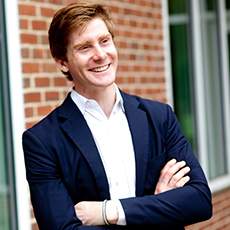
Jared Pomerance T’16
Getting to be a student here, I feel like I stole something; there’s this opportunity to learn in such a tight-knit, intentional way from classmates who have so much industry and life experience.
Hosting Errik Anderson (T'07) as a visiting executive, and again as a panelist on the Student Advisory Board's philanthropy panel, was phenomenal. I’ve been fortunate to get to know him a bit since, outside these events, as well. He has founded six companies, prioritizes his family, and still makes the time to engage deeply with students and the Tuck community.
Late in second year, I was in Stell Hall working on a job search in investment banking, a field in which MBAs aren't necessarily valued. Professor Peter Fisher, Senior Director of the BlackRock Investment Institute, tapped me on the shoulder and invited me to stop by his office. “You're going to get this,” he told me when I got there. He could see I needed a pep talk. He's not only a great teacher, but something of a mentor.
I was fortunate to play on Tuck’s A hockey team, which was a great way to be part of a tight-knit group and get those hyper-competitive juices flowing. However, the most fun I had was in Mini League, in which the teams are a mix of all Tuck players from every league and level, and my goal was often to try to assist people’s first goal ever. It was just such a fun experience for someone who has grown up loving the game.
I've learned just how intense I am, even for a type-A MBA student. You build close, real relationships here, so you're constantly getting real feedback delivered well. It's made me much more self-aware, which has helped me learn how to marry my intentions with my actions.
I hope to be an investor, but exactly where and how is hard to say. I do know that I’d love to be philanthropically involved regardless, particularly in addressing issues of inequality, something about which I’ve always been passionate. That is something I feel I can't not do.
Financial Services
Weston, MA
Middlebury College, BA in economics, 2011
Audax Group Private Equity, Analyst / Associate, 2011-2014
Tuck A Team Hockey; Fellow, Center for Business & Government; Ayers Fellow, Center for Private Equity & Entrepreneurship; Managing Director, Tuck Capital Partners; Board Member; Student Advisory Board; Mentor, CDO Mentor Program; Club Member, Tuck Asset Management; Teaching Assistant, Statistics; Teaching Assistant, Managerial Economics; Research Assistant, Professor Peteraf; Co-Commissioner, Mini-League Hockey
Entrepreneurship First-Year Project exploring a smart, mobile competitor to Craigslist; Center For Global Business & Government fellows project; Tuck Capital Partners setting up student-led private equity fund
Athenahealth, Watertown, MA
During my First year, two friends and I had dinner with Professor Andrew King to discuss his paper on disruptive innovation. I felt I began to understand the didactic process and difficulty with which research is done. He wound up thanking us in the paper, which was really generous of him and pretty cool.
The Arrhythmia of Finance; Countries and Companies in the International Economy
Tuck has given me the global perspective, Swiss army knife-like tools, and confidence to ask the right questions and think critically about the answers.
Pamplona Capital Management, senior associate, TMT
Technology
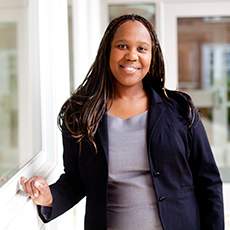
Monique Alves T’17
I was born and raised in New York City where everything is go, go, go, so the small size and location of Tuck, and the time to focus on being a student here was instrumental. Plus, I went to a reception and information session with Jacques-Philippe Piverger T'07, and his openness and willingness to share his personal experience was invaluable.
I thought a Tuck MBA would only prepare me for the traditional functions and careers in banking or consulting. The elective Entrepreneurial Thinking showed me alternative entrepreneurial careers. The course spoke to my personal interest in technology and disruption and how innovators turn their ideas into reality. Now I'm looking at technology entrepreneurship. I made my dream bigger.
Professor Ella Bell's Personal Leadership course showcased how work environments are moving from a top-down management environment to a buy-in environment. She pushed me to think about myself in a holistic way as a person, employee, and future manager. Professor Bell also opened her office and home for any chats or dinner. She’s an example of the thought-provoking instruction and open community Tuck provides.
I've learned to be more empathetic to other people's perspectives, and to see more clearly my own contributions. Before, my perception was that I dominated conversations. In fact, I learned I need to contribute more; to have a strong voice and ensure people stop and hear me.
Technology
New York, New York
Columbia University, BA, economics, 2009
Barclays, New York, New York, project manager, derivatives clearing operations, 2012-15; Morgan Stanley, New York, business analyst, derivatives clearing operations, 2011-12; Societe Generale, New York, business analyst, derivatives confirmations operations, 2010; CUNY Baruch College Adult Education, New York, grant administrator, 2009-10; AmeriCorps-City Year, New York, corps member, 2009
Consortium for Graduate Study in Management fellow; Tuck Center for Digital Strategies fellow; Entrepreneurship Club, co-chair, 2016-17; 2016 Tuck Admitted Students Weekend, sponsorship committee lead; Technology Club member; Deloitte Case Competition participant, 2015
ZNews Africa, mobile Africa news app startup, COO, Jan. 2015-present; RedCarpet Mexico, an entrepreneurial First-Year Project in market validation and testing; Tech Trek, Aug. 2015; New York/San Francisco Tech Treks, Dec. 2016; San Francisco Venture Capital Trek, April 2016
India Global Insight Expedition, 2016
IBM Global Business Services, New York, summer consultant
Elisabeth Hartley T'05 of Beats by Dr. Dre; Jeff Blackburn, SVP worldwide business development, Amazon; David Weisburd T’12, managing director, Growth Technology Partners; Jacques-Philippe Piverger T’07, founder, The Soleil Group; Professors Peter Regan and Scott Neslin; Deans Matthew Slaughter, Praveen Kopalle, and Sally Jaeger; my study group, fellow Consortium members, and my classmates
Entrepreneurial Thinking
Since starting at Tuck, I am a more strategic big-picture thinker, I communicate with improved clarity, and I more readily embrace opportunities to engage with global cultures.
Retail Category Marketing Manager, Microsoft, Seattle, Wash.
Social Enterprise
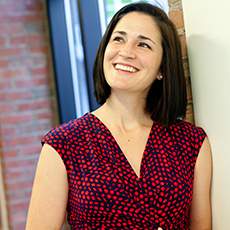
Mollie Naber T’16
I was pregnant and at an MBA career fair in Belgium where a recruiter overheard me talking about what I wanted—a small community where you can be outdoors; a place where people take care of their neighbors, the opportunity to explore public policy issues. The recruiter recommended Tuck, which hadn't been my radar. My husband matched at Dartmouth for residency; I was waitlisted and enrolled at Tuck the following year. This extra time gave me a chance to enjoy hiking and snowshoeing in the Upper Valley with my newborn while clarifying my career goals through consulting work.
The professor who taught me the most is actually the professor whose class I missed taking, Peter Fisher. I'll never forget the points he shared with me through our interactions: “Question your null hypothesis.” “You can question someone's judgment but not their motives.” “Politics is a war of objectives.” “Do you want that job in your gut?” Also of note: Emily Blanchard’s Research-to-Practice Seminar, Firms and Trade Policy, changed my professional trajectory. By analyzing data, diving into gray areas, and considering the long-term implications of policies, I have a better sense of where community and economic development can, and cannot, move the needle in our country. In addition to inspiring me intellectually, Emily is a role model: she’s found her own formula for navigating career and family. I’m working on doing the same.
I gave a Tuck Talk just recently about my journey as a professional wife and mother, and different ways I’ve learned to manage my life. I opened up more than I ever have. A lot of classmates came up to me and said things like, “Moments like this make me proud to be at Tuck!” It was great to celebrate my story at the end of this journey at Tuck.
I now know how to solve big problems by breaking them into small problems, staying organized, communicating effectively and working in teams. I'm so excited to apply my skills to tackling community and economic development challenges, starting with affordable housing in the Bay Area.
Social Enterprise
Modesto, California
Georgetown University, BS, foreign service, 2006
Independent Economic Development Consultant, Hartford, Vermont, and Pittsburgh, Pennsylvania, 2012-14; Strategy Consultant, Company Companions, Hamburg, Germany, 2011-12; Economic Development Consultant, JE Austin Associates, Cairo, Egypt, Riyadh, Saudi Arabia, Washington, D.C., 2009-11; Market Analyst, British Petroleum, Los Angeles, California, 2008
Business and Politics Club, president; Center for Global Business and Government MBA fellow; UNC Real Estate Challenge Case Competition; Real Estate Club, member
Center for Global Business and Government MBA fellows project on capital flows into early-stage medical device companies; First-Year Project on improving access to acute care in Haiti; Green Mountain Economic Development Corporation board member, 2014-15
Traveled to more than 70 countries, worked in nine (Germany, U.S., Egypt, Pakistan, Armenia, Qatar, Saudi Arabia, Mexico, Haiti), and lived in seven (Germany, U.S., Saudi Arabia, Qatar, Argentina, India, Mexico); while at Tuck, studied abroad at the Indian School of Business in Hyderabad, India; undergraduate study at Universidad de Ciencias Sociales in Buenos Aires, Argentina
Twin Pines Housing Trust, White River Junction, Vermont, project manager
Professors Emily Blanchard, Peter Fisher, Teresa Fort, John Vogel, and Curt Welling; health care policy leaders at the White House; global leaders in the medical-device industry; my Indian Tuck friends in particular during my study abroad at the ISB; all my Tuck friends
Firms and Trade Policy Research-to-Practice Seminar (Emily Blanchard)
I now see how strong I am. I had a one-year-old when I started Tuck and a second child in the middle of my summer internship. While I was at Tuck, my husband was in residency at Dartmouth-Hitchcock Medical Center, so he was even busier than my peers and I. I’ve learned that I can accomplish anything when I’m driven by passion.
Eden Housing, Hayward, California, project manager
Consulting
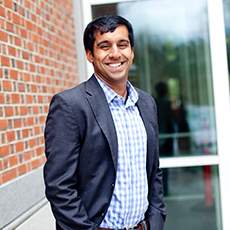
Neil Kulkarni T’16
Getting an MBA was a chance for me to take a step back and figure out where I wanted to go in my career. I saw an MBA at Tuck as an opportunity to explore an area that I was interested in and had a passion for: tech. I wanted to test the hypothesis: Would this be the right fit for me in the long term, career-wise?
I also wanted a smaller school where I could get to know each and every one of my classmates—not just their names and their jobs prior to Tuck, but to understand each of their philosophies about things like leadership and innovation. Lastly, I realized that Tuck’s size allows students to jump in and work directly with professors and deans to implement changes that have a significant and lasting impact on the fabric of Tuck.
I knew when I came to Tuck, I wanted to explore tech as much as I could. I was elected technology chair on the Student Board which really allowed me to work on product management. For example, I worked with IT at Tuck to develop and launch a new SafeRides app, a ride-share service that helps students get home safely.
My fellowship with the Center for Digital Strategies was another opportunity to explore my interest and engage with speakers and individuals who came to campus from the tech space. My final research project focused on the key success factors that technology firms from a developed market could use to enter a developing market.
I also worked with Praveen Kopalle and Dean Matthew Slaughter to launch programming courses at Tuck, which was a real need I saw. When you go to a tech company, if you can talk the talk, or at least understand some of the challenges and difficulties that programmers face, you will be more successful in the long term.
During my first year, I organized a trip to Costa Rica with other students. It started with only eight people who were interested in going. Before I knew it, there were 62 people who had signed up (over 20 percent of our class). First, we went to San Francisco, did a tech trek where we met with tech companies including Intel, Facebook, and Square, and then we headed to Costa Rica. It was a really unique bonding experience for a group of that size to travel together. It set the stage for the next year and a half at Tuck.
For my FYP, we were focused on helping the Skinny Pancake think through a lot of strategic issues. We had phenomenal conversations with people like the President of Union Square Hospitality Group (creators of Shake Shack) and the founder of Kigo Kitchen, a T’11, who shared some of their pitfalls and best practices. A lot of these conversations were coordinated through alumni, which showed that the alumni network is very supportive and responsive even outside of recruiting.
It was great to work on this type of a project—to think about growth strategy and help the Skinny Pancake think through new markets. When they expanded and added a new location right here in Hanover, it was just awesome to see that full picture and see the impact of your work.
Consulting
Atlanta, Georgia
Emory University, BBA, 2010
World Bicycle Relief & Buffalo Bicycles, consultant, Lusaka, Zambia, 2014; Deloitte Consulting, consultant, Atlanta, GA, 2010-2014
Student Board, technology chair; Center for Digital Strategies, MBA Fellow; Tripod Hockey captain; B.101; Glen Tuck; Ski & Snowboard Club; Southern Appreciation Society
Tuck Student Consulting Services, Good Neighbor Health Clinic; First-Year Project with the Skinny Pancake working on restaurant expansion and new market strategy
Groupon, business operations MBA summer associate, Chicago, IL
Jeff Blackburn, SVP Business Development at Amazon and Jeff Bezos' heir apparent; Errik Anderson T’07, Adimab; Russell Wolff T’94, EVP ESPN International; Iqbal Quadir, founder of Grameen Phone and co-founder of B-Kash
Innovation Execution with Chris Trimble; Negotiations with Daniel Feiler; Managing Strategic Business Relationships with Leonard Greenhalgh
Praveen Kopalle (PK), Retail Pricing Strategies and Tactics; Although PK is a great professor inside the classroom, what makes him amazing is the support he provides students outside the classroom. He truly cares about the academic and social experience of each and every student.
Nearly all the experiences I’ve had at Tuck have been transformational. From pursuing my passion and interest in technology, developing life-long friendships, to helping develop and refine my management skillset—Tuck is truly a unique and special place.
Monitor Deloitte, senior consultant, Boston, Mass.

Emanuel Siragusa T’17
Leaving Italy and coming to the U.S. was not an easy choice. So I got in touch with other business schools and alumni. What struck me is that alumni from other schools kept telling me, “With an MBA my career has really skyrocketed. It’s a great opportunity to speed up your career. I learned a lot.” But then, when I heard from Tuck alumni, the first thing they would say is, “I fell in love with the place.” So I visited Tuck and I fell in love with the place. It’s a big choice, and sometimes it’s scary. But failure lies in not trying and not trying and failing. So I took a chance in order to become a better person and a better professional—and I’m very proud of my choice. It’s a great place to be.
Coming here from Europe is very challenging. It’s a new culture and you’re immersed in a totally new environment. But what I found right away was that the community is very tight-knit—it’s not just legend. It’s real. All my U.S. classmates were willing to help me with any red tape I was going through or anything I didn’t know how to approach. They helped me navigate the U.S. and navigate Tuck. Tuck has a lot of resources to help as well—the Career Development Office was very helpful. Whenever I was met with a challenge, I felt like everyone was always on my side willing to help. That’s really invaluable. You are allowed to make mistakes because everyone is supportive of you.
For my First-Year Project course, we consulted with Worldfund, a nongovernmental organization in the education sector, to help them develop a new fundraising strategy. It was my first time going to Brazil and it was a bit of a cultural shock. There were parts of Sao Paulo that were very impoverished. We visited a local school where the children thought their destinies had already been written, and they could only succeed if they came from a rich family. Seeing all of this really reinforced my desire to make an impact in the world. When we came back, it was the first time we were able to work together as a team on a single topic, on a single issue. It was great because I had the opportunity to test some of the skills I had already learned at Tuck.
Enjoy the experience. It’s a transformational process—it’s something that changes you not only from a professional perspective, but a personal perspective. So, come here, study hard, find a job, but more than that, get to know people and enjoy the MBA experience. For the last two years of my life, I’ve had the opportunity to focus on myself which is really a precious gift.
General Management
Lucca, Italy
University of Pisa, Italy, BS telecommunications engineering, 2005; University of Pisa, Italy, MS telecommunications engineering, 2007
Cromology, product lifecycle manager, 2014 – 2015, Lucca, Italy; Cromology, forecast and inventory manager, 2013 – 2014, Lucca, Italy; Cromology, demand planner, 2009 – 2013, Lucca, Italy; Reply, consultant, 2008 – 2009, Milan, Italy
Tech Club; International Club; Consulting Club; Deloitte Case Competition, 2015
Consulting First-Year Project for Worldfund, an educational NGO
Global First-Year Project for Worldfund in Sao Paulo, Brazil
Danaher Corporation, general management summer associate, Orange County, California
Marco Di Liberto T’98 and Marco Bongiovanni T’00, two Tuck alumni in Italy, spoke highly of their Tuck experience, encouraged me to apply, and have been mentoring me ever since; Ivan Ardemagni T’13, a Tuck alumnus in London, also provided advice before applying to Tuck
Corporate Responsibility with Professor Paul Argenti
At Tuck, I’ve had the incredible opportunity to interact—whether through my study groups or through social activities—with friends from China, Japan, South America, Russia, and the United States. More than anything, this has helped expand my global mindset and equip me with the skills I need to compete in the global marketplace. Before Tuck, I felt like an Italian citizen. Now, I feel like a citizen of the world.

Katelyn Baldwin T’17
I wanted a program where, beyond gaining the education and skills to change careers, I could really get to know my classmates in an intimate environment, and build relationships with the faculty. I wanted a place where we'd all be in it together. Tuck is everything I hoped for and more. I’m challenged and inspired every day.
I was brand new to Tuck and had the opportunity to join a small group dinner at the Norwich Inn with Bill McNabb D'79, chairman and CEO of The Vanguard Group. It was amazing to observe this very genuine and adept CEO with a strong moral compass in action, talking about ethics in business and his decision-making processes. It just reinforced that Tuck was exactly where I wanted to be.
Growing up in Alaska, where the majority of the state is inaccessible except by plane, I’ve always had this passion to pursue flying as a life hobby, and explore the world by air. After months of training, I finished my private pilot’s license at the end of May! Eventually I would love to support Civil Air Patrol missions. My love for Tuck extends to the skies above Dartmouth and around New England.
One of the skills I’m working to improve at Tuck is listening. We’re all incredibly busy here, but I’ve learned that it’s important when you are having a conversation to be present, and recognize that every interaction has value. Multi-tasking is also a skill, but if you’re always thinking three steps ahead while engaging with another human being, it diminishes the interaction and you miss out on a lot.
I hope to be in a senior leadership position for a global organization whose mission I believe in and whose values align with my own, where I can recognize and feel the impact of my work. Everything at Tuck has inspired me to want to make a difference, to take all these opportunities I've been given and pay it forward.
Global Business
Wasilla, Alaska
Stanford University, BA, international relations, 2009
Chemonics International—manager and senior manager, business development, West Africa and Haiti Region (Washington, D.C.), 2013-15; Liberia country representative (Monrovia, Liberia), 2012-13; associate and senior associate, business development, Asia Region (Washington, D.C.), 2010-12
Center for Global Business and Government MBA fellow; Visiting Executive Program host fellow; Business and Politics Club, co-chair; Tuck Student Consulting Services; Africa Business Club; Admissions blogger; Women in Business; 2016 IPADE Global Case Competition, second place
First-Year Project in São Paulo, providing the Brazilian program of the Latin American NGO Worldfund with a fundraising and development strategy; Tuck Student Consulting Services, supporting WorkReadyNH program at River Valley Community College
First-Year Project, Brazil; IPADE case competition, Mexico City; work travel to Liberia, Ghana, Senegal, Nigeria, Nepal, and Sri Lanka; advanced Swahili coursework, University of Dar es Salaam; study abroad, Oxford University; study abroad, Italy; Congolese refugee camp work, northern Zambia
Siemens USA, Washington, D.C., strategy and business development for Eric Spiegel T'87, U.S. CEO
Bill McNabb D’79, CEO, The Vanguard Group
Managers and the Law (U.S. District Judge Paul Barbadoro)
Consulting
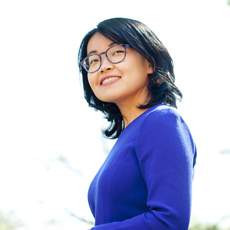
Nancy Yang T’17
My reason for coming to business school was to learn. It’s what I love and where I am in my career: I wanted to learn new tools, new ways of thinking, new ideas. When I was getting to know the different schools, I felt Tuck took the learning and development of its students really seriously, and that stood out to me. The core curriculum was really coherent, and professors seemed really accessible. I came for the opportunities and recruiting successes, but primarily for the chance to really learn and expand my intellectual horizons.
Energy Economics is the toughest class I’ve taken, both because I have no background in energy, and because the way the professor runs the class: he expects you to keep up. So in terms of the content and the professor’s expectations it’s really challenging, but I feel like a learn a lot every time I’m in class—new knowledge and new frameworks. We do a lot of simulations. We just wrapped up an OPEC simulation—imagine business school students in teams of three trying to keep the cartel together. It’s fun.
My parents were visiting that weekend, and I brought them to the meeting with Chemerow, who funded a scholarship that I received. My parents felt a lot of gratitude for the scholarship, and being there made them feel like they could participate in the Tuck community. David is also just incredibly warm and very accessible. He talked a lot about his experiences after Tuck. I remember him saying that in the long run, it’s all about how you can mentor others, how you can lead a team, guide people, and that’s the kind of skill you begin building in your first-year study groups.
Cote D’Ivoire has a standardized test comparable to the SAT, and if you pass it you graduate from high school and get into college. If you don’t pass it, you can’t do either. The pass rate is about 40 percent, which really limits opportunities for people, so our thinking was if we could increase people’s success and open up that bottleneck, we would be creating opportunities for individuals and society as a whole. I hadn’t really traveled internationally before the trip, so it was eye opening to see different norms for conducting business, and it was really humbling to not speak the language and to rely on my team and the kindness of strangers. All of that challenged my preconceptions of not only Cote D’Ivoire but myself and what I think leadership is. It was a great experience.
Consulting
Dallas, Texas
Harvard College, AB, cum laude, East Asian studies, 2009
Teach for America, Dallas, Texas—managing director, 2014-15; director, design and innovation, 2013-14; manager, 2011-13; Dallas Independent School District, 6th grade math teacher, 2009-11
Revers Board fellowship 2016-17; Tuck Student Consulting Services; Center for Business & Society Conference education panel committee; Deloitte National Case Competition, second-place finish
Tuck Student Consulting Services work for an area nonprofit specializing in legal services for refugees; entrepreneurial First-Year Project aimed at increasing the college entrance rate in Cote d’Ivoire and Francophone Africa through low-cost test-prep services
First-Year Project in Cote d’Ivoire; travel with part of the FYP team beforehand for fun to Paris, the south of France, Monaco, and Rome
McKinsey & Co., Seattle, Washington, summer associate
David Chemerow T'75, chief revenue officer, comScore, and my scholarship donor; the First-Year Project and MBA Program Office staff
Energy Economics (Erin Mansur)
Tuck is about community: it has been a joy to find, with each new project or study group, a bunch of passionate, brilliant, and, above all, kind and generous people I could learn from and learn with. And being in this kind of environment invites me to be a better version of myself for the people around me. It's the best kind of feedback loop.
Social Enterprise
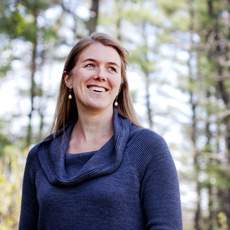
Whitney Flynn T’16
I had the benefit of spending four years in Hanover as a Dartmouth undergraduate and knew that there’s something really special that happens in this setting. The DNA of an educational experience here is totally unique—everyone is completely invested in the community. I knew that would be the setting through which I'd have the strongest community experience with my Tuck classmates and professors and others. For a lot of people, this setting is a big step outside of their comfort zone in a way that creates an open mindset for new experiences. As a Dartmouth alum and outdoor enthusiast, Tuck wasn’t outside of my comfort zone. I was excited to share what this environment has to offer with my peers.
I worked for Patagonia for several years right of out college. For me, that was a pivotal, transformational experience: to see that there are a lot of different ways for a company to exist in the business landscape as stewards of environmental and social good, and if you do it well you can be outrageously successful. Patagonia taught me how rewarding it can be to work in an organization where people are so driven by the purpose, not the paycheck or the title. They’re motivated by a sense of doing good, and as we’ve learned here at Tuck, when your organization has a strong culture of purpose, you’re always more successful on core business performance metrics as well.
There’s something really special about Georgian culture, where meals are a shared experience. It wasn’t just about finding food or taking a break, it was a chance for us to get to know each other at a level that none of us was expecting. There’s this tradition called “supra” of toasting and people speaking about things important to them. The supra created a setting where every night, the 20 of us were being vulnerable with one another. It was the most intimacy I’ve ever felt with a group of 20 people. I know that those connections will endure. We got together a year later and I knew I could be myself with these people whom I trust completely.
Social Enterprise
Anchorage, Alaska
Dartmouth College, BA, biology and ecology, 2007
Sequoia Capital, strategic marketing lead, spring and summer 2014; Stanford Graduate School of Business–Center for Entrepreneurial Studies, assistant director for student programs, 2011-14; Stanford University–Alumni Relations, marketing and programs officer, 2010-11; Patagonia, sales and partnerships manager, 2007-10 (all positions in the San Francisco Bay Area)
Tuck Centennial Award recipient; Dean’s fellow, committee chair on enhancing inclusiveness at Tuck; Center for Leadership fellow; Elevate Tuck Initiative, co-chair
First-Year Project for Pompanoosuc Mills on marketing strategy; Research-to-Practice Seminar on a retail operations project for Ibex
Global Insight Expedition to Armenia and Georgia—a phenomenal trip
Pete and Gerry's Organics, Monroe, New Hampshire, new product development and marketing
Leadership Out of the Box (Ella Bell Smith); The CEO Experience (former N.H. Governor John Lynch); Tools for Improving Operations (Joe Hall); Database Marketing (Scott Neslin); and Negotiations (Daniel Feiler)
Peter Regan (Professional Decision Modeling, the “math camp” Pre-Enrollment Program)
Founder, Totem Partners
The lessons at Tuck are everywhere, and they come in small and large packages. Most instructive were the instances when I missed the mark somehow. I can still feel the sting of those moments: realizing I was underprepared for a negotiation exercise; sharing unwanted feedback with a classmate; dropping the ball when my study group counted on me. These skills—preparation, tact, follow through—are much harder to master than many of the textbook skills you learn in the classroom. Thankfully Tuck fosters a community where I’ve always felt safe to stretch while honing these competencies and my authentic leadership style.
Consulting
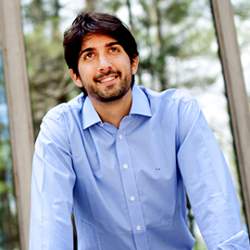
Eduardo Abby T’17
When I came to visit, I left my suit on the Dartmouth Coach and I had an interview the next morning. Tiago Fauth T’16 was kind enough to lend me his suit for the day. I was also impressed when I visited a professor’s class, and I saw him later in the afternoon and he remembered my name. That’s when I knew I wanted to spend two years of my life here. As I come from a different country, I thought it would be very important for me to have a close relationship with faculty and classmates. Here, you know everyone by name and people connect much more with each other. It’s a different MBA experience than other schools.
I loved Global Economics for Managers with professor Emily Blanchard. It gave me the basis to start understanding political policies and what to expect when big events happen. I got fascinated with how political attitudes shape what happens in countries and we are experiencing turmoil now in my home country of Brazil. GEM gave me the ability to critically analyze what’s going on, and what we should we expect.
I was advised to choose one extracurricular activity that I wouldn’t give up. I chose soccer, which I have played since I was a kid. It’s been an escape valve, and great for getting to know people I otherwise wouldn’t have. We play an MBA World Cup tournament, and indoor games every Tuesday night. I don’t consider myself a very social person, and I’m trying to work on that. So this gave me a comfortable place to leave my comfort zone.
I’m trained as a medical doctor, and after Tuck I want to stay related to health care. I’m starting a business to provide health care to people who can’t afford health insurance or have lost their coverage—it’s called a “popular clinic.” With the crisis in Brazil, lots of people are in that position, and private practice is too expensive. These clinics are interesting because you can make money and also help people. This is what I want to try do in my life: to manage creating impact and having a successful business.
Consulting
Rio de Janeiro, Brazil
Faculdade de Medicina Souza Marques (Brazil), MD
Médecins Sans Frontières (Doctors Without Borders), medical doctor, missions in Cambodia (2015) and South Sudan (2014); Hospital Federal de Ipanema, Rio de Janeiro, Brazil, internal medicine resident, 2011-13
Member, soccer team, Jewish Club; Founder, Ping-Pong Club
First-Year Project with a Native American tribe in Arizona to improve elder care, with a focus on palliative care
Global Insight Expedition in the Netherlands focused on the country’s health care system; missions with Doctors Without Borders in Cambodia (2015) and South Sudan (2014)
BCG, São Paulo, Brazil
Paul Mango, McKinsey director; Bashar Masri, Palestinian entrepreneur; Errik Anderson D’00, T’07, Tuck alum and entrepreneur
Tuck made me aware of how powerful the combination of good education and high motivation can be.
No pathways found matching your search criteria. Try adjusting your search terms or filters.
100 Tuck Hall
Hanover, NH 03755
USA
©, The Trustees of Dartmouth College. All rights reserved. | Privacy